|
| H.E. Jelena Čukić Matić, Ambassador of the Republic of Serbia to the Republic of Latvia, Presented the Letters of Credence to Lat-vian President Edgars Rinkēvičs |
|
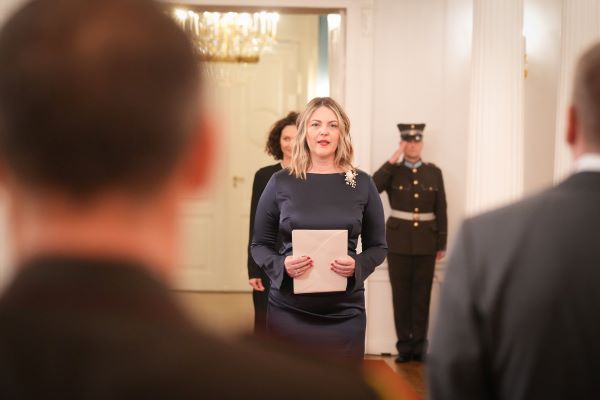
H.E. Jelena Čukić Matić, Ambassador of the Republic of Serbia to the Republic of Latvia on a non-residential basis with residence in Stock-holm, presented the Letters of Credence from the President of the Re-public of Serbia, H.E. Mr. Aleksandar Vučić to the President of the Re-public of Latvia, H.E. Mr. Edgars Rinkēvičs, at a formal ceremony held at the Riga Castle.
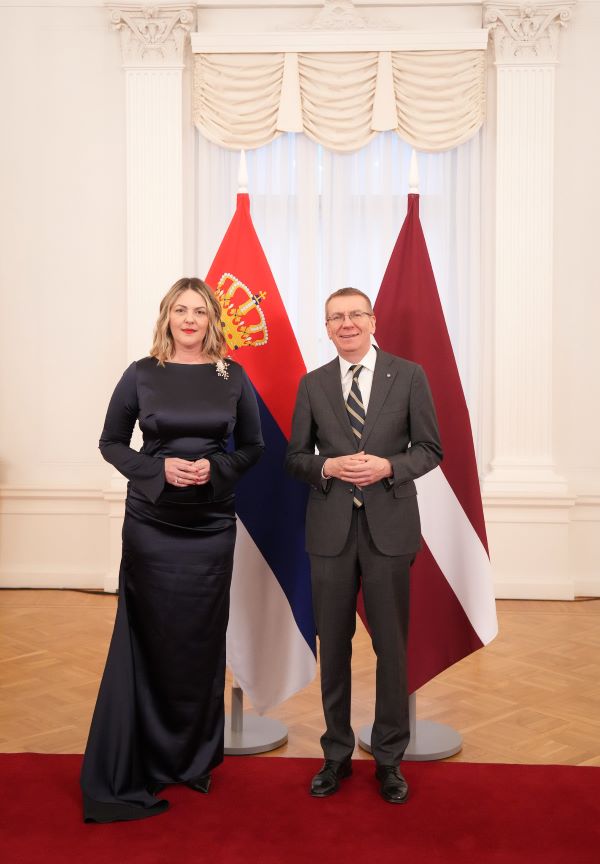
During the cordial meeting on this occasion, the readiness of the Re-public of Serbia and the Republic of Latvia to strengthen bilateral politi-cal dialogue, develop economic cooperation, and exchange experiences in the process of European integration of the Republic of Serbia was conveyed. Ambassador Čukić Matić expressed Serbia’s commitment to enhancing overall bilateral relations and ties with the Baltic region, par-ticularly with the Republic of Latvia.
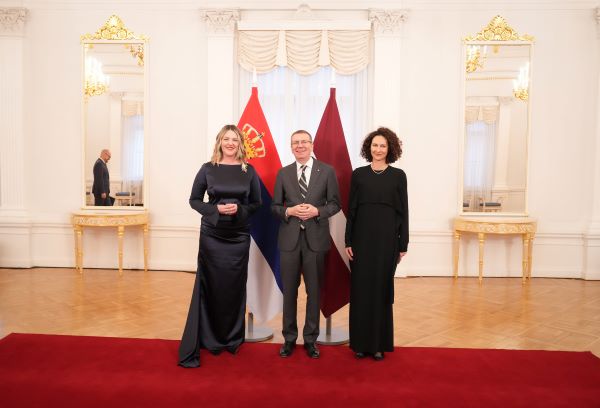 |
|
|
| Visit of Ambassador Jelena Čukić-Matić to Kiruna |
|
The Embassy of Hungary in Stockholm within the framework of the Hungarian presidency of the Council of the European Union has organized a business trip to Kiruna in which Ambassador Jelena Čukić-Matić participated.
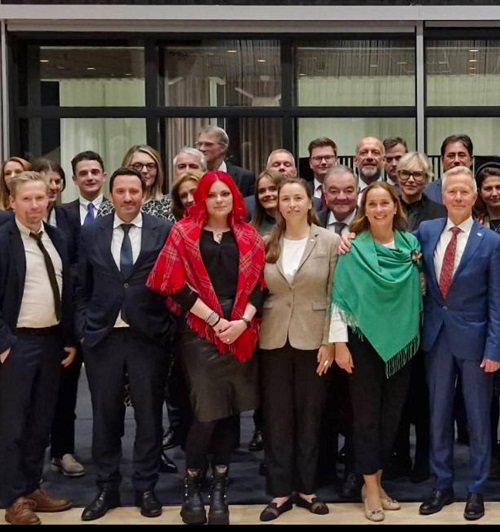
At the beginning of the visit the ambassadors from the EU member states and candidate countries had meetings with high-ranking officials of the City of Kiruna, including its Mayor Mats Taveniku, as well as strategic managers for city development and culture.
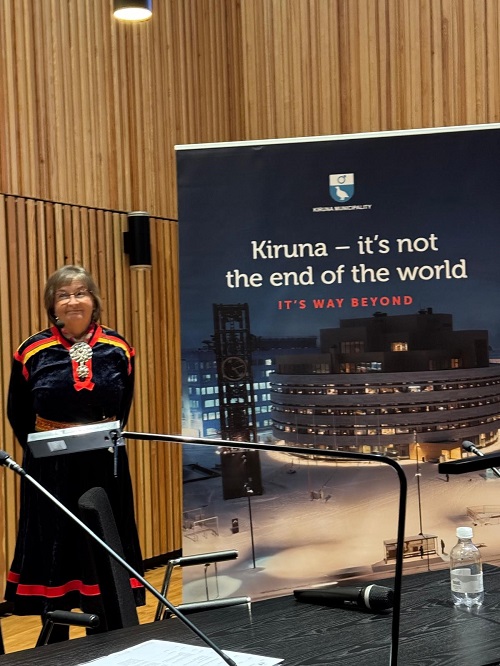
The ambassadors were presented with the ongoing plan for urban transformation of Kiruna and informed about Kiruna's candidacy for the European Capital of Culture in 2029. The group also had an opportunity to get an insight into the institutional organization and self-management of the indigenous Sami people in the north of Sweden and to meet with the representatives of the Sami Parliament.
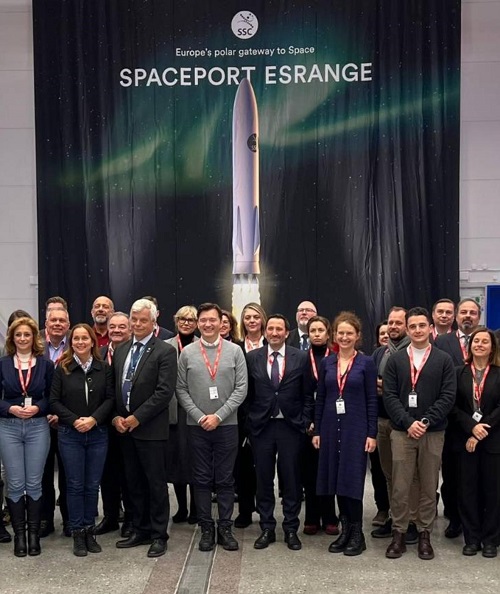
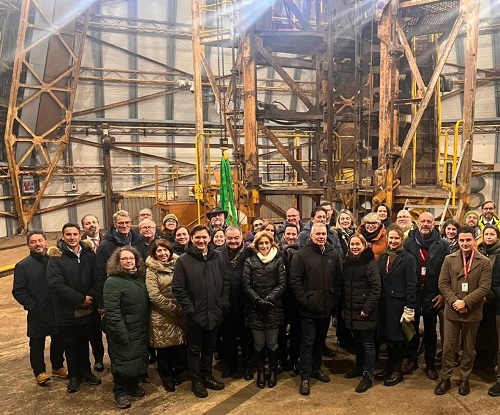

During the visit, Ambassador Jelena Čukić-Matić visited LKAB Group and its Kiruna Mines, the company that was founded in 1890 and is one of the oldest industrial companies in Sweden, as well as the Esrange Space Center owned by the Swedish Space Corporation where rocket tests take place and future satellite launches for the EU will be.
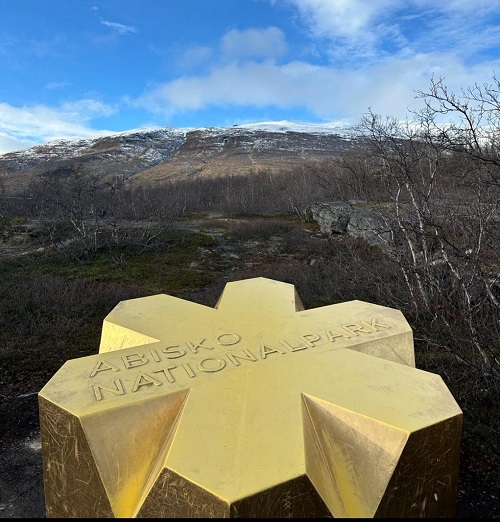
The trip also included a visit to the Abisko National Park as well as the Abisko Border Defense Museum, where the ambassadors attended a presentation about the geopolitical situation in the Arctic region with special reference to Sweden's membership in NATO. Afterwards, they visited the Swedish Polar Research Secretariat which has a mandate to organize and support research expeditions to Polar Regions. |
|
|
| Ambassador-Designate of the Republic of the Republic of Serbia to the Republic of Latvia Jelena Čukić-Matić, presented copies of credentials |
|
Ambassador-Designate of the Republic of the Republic of Serbia to the Republic of Latvia Jelena Čukić-Matić, presented copies of credentials to the Deputy Chief of Protocol of the Ministry of Foreign Affairs of the Republic of Latvia Zani Ventere
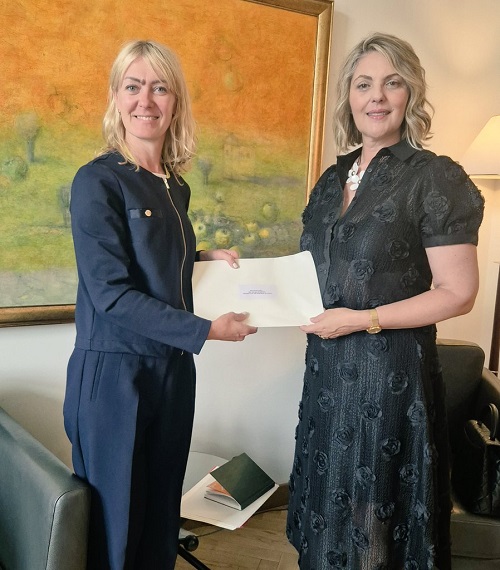
After submitting a copy of the credentials, Ambassador Jelena Čukić-Matić had a meeting with State Secretary in theMinistry of Foreign Affairs of Latvia Andzejs Vilumson.
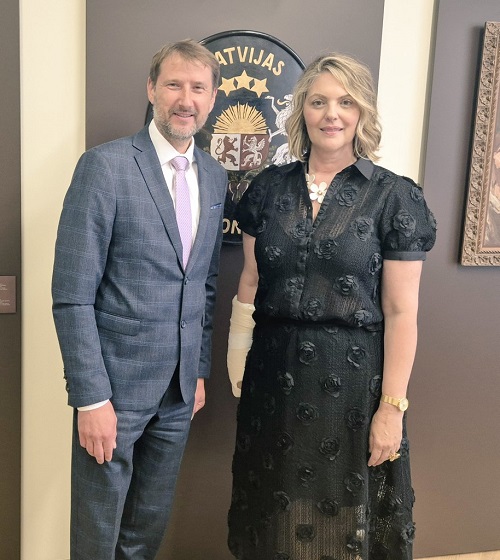
During the conversation with the State Secretary they discussed issues of importance for overall bilateral cooperation between the Republic of Serbia and the Republic of Latvia, as well as for cooperation within the European integration of the Republic of Serbia.
On this occasion, the importance of encouraging official visits at the working, high and highest level between the two countries was highlighted and the possibilities of developing economic cooperation were discussed, as well as the strengthening of parliamentary cooperation and cooperation in international organizations between the Republic of Serbia and the Republic of Latvia. |
|
|
| Ambassador Jelena Čukić Matić met with Stockholm City Council President Ole Burel |
|
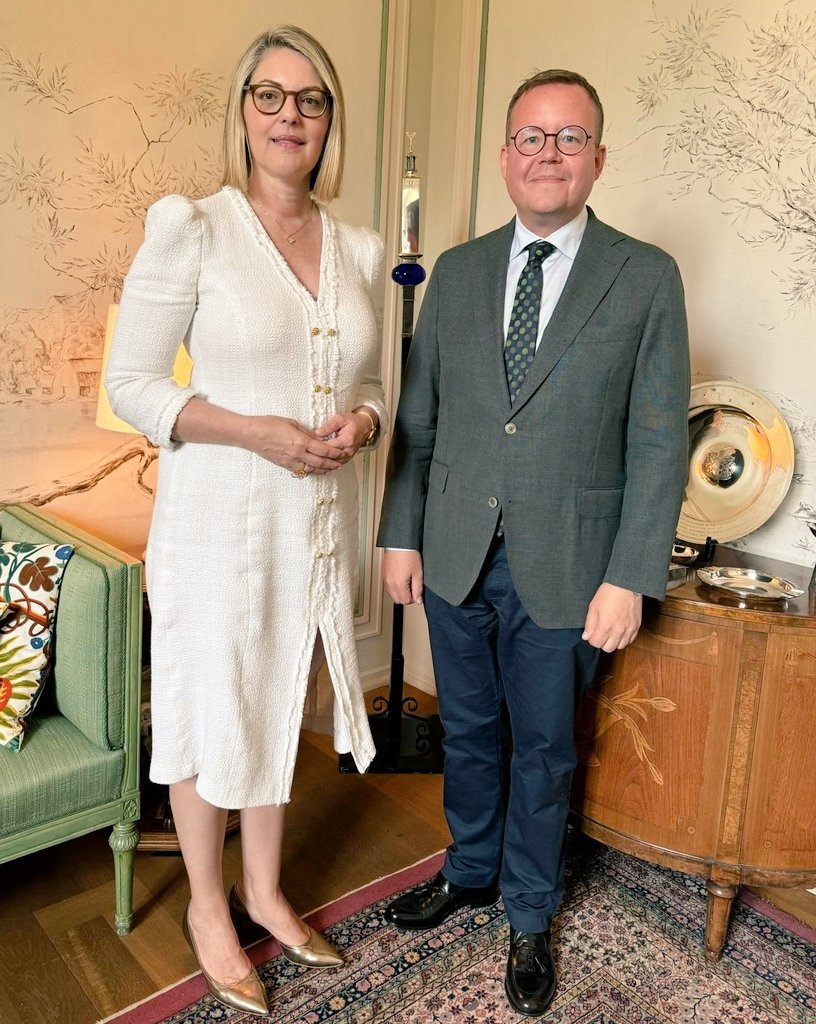
The President of the Stockholm City Council Ole Burrell received the Ambassador of the Republic of Serbia to the Kingdom of Sweden Jelena Čukić Matić. During the cordial conversation held in the landmark building of the City Hall of Stockholm, the potentials for strengthening dialogue and cooperation between Stockholm and Serbian municipalities were discussed.
The President of the Stockholm City Council Ole Burrell informed about Stockholm’s achievements and results in the area of green transition. He also expressed readiness of the City Council of Stockholm to host representatives of Belgrade and other cities in Serbia in order to share experience, knowledge and innovative solutions applied by the City of Stockholm in achieving the Green Agenda goals. |
|
|
| The Ambassador of the Republic of Serbia, Jelena Čukić Matić, at a meeting with the Minister of Foreign Affairs of the Kingdom of Sweden Tobias Billström |
|
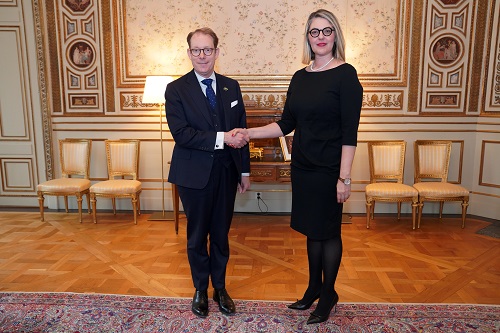
Photo: Protocol MFA of Kingdom of Sweden
H. E. Ms. Jelena Čukić Matić, Ambassador of the Republic of Serbia was received by Swedish Foreign Minister H. E. Mr. Tobias Billström.
“I am highly honored to have had a frank and open discussion on the important bilateral relations topics, Serbia’s future in the EU and Swedish support of EU enlargement, as well as, the current European issues.“ said Ambassador Čukic Matić. |
|
|
| Her Excellency Jelena Čukić Matić, Ambassador of the Republic of Serbia to the Kingdom of Sweden presented the Letters of Credence to His Majesty King Carl XVI Gustaf of Sweden |
|
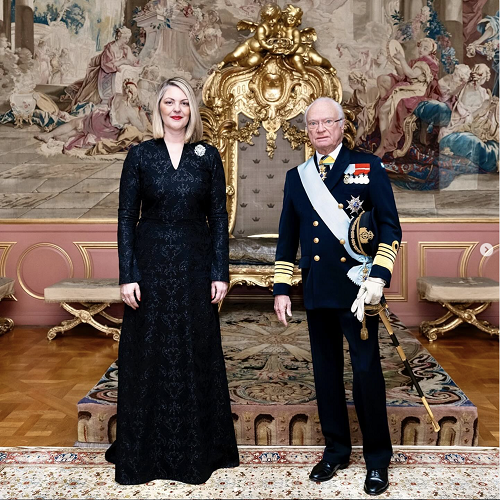
Photo: Protocol MFA of Kingdom of Sweden
Her Excellency Jelena Čukić Matić, Ambassador of the Republic of Serbia to the Kingdom of Sweden presented the Letters of Credence signed by His Excellency Mr. Aleksandar Vučić, President of the Republic of Serbia to His Majesty King Carl XVI Gustaf of Sweden, at the traditional ceremony that preserve the same protocol dating back to the year 1537.
During the cordial conversation, Ambassador Čukić Matić expressed her readiness to work on enhancing bilateral relations between Serbia and Sweden and emphasized the role of the Serbian diaspora in Sweden in promoting bilateral cooperation in the areas of business, science and culture. Regional and European context was also discussed during the audience.
„It is my great honor to be the first Serbian female Ambassador to Sweden in our long history of friendly bilateral relations. I will dedicate my work to deepening the understanding between our two peoples, as well as, promoting bilateral cooperation of our two countries in all areas of mutual interest with the focus on Serbia’s EU integrations”, said Ambassador Čukić Matić.
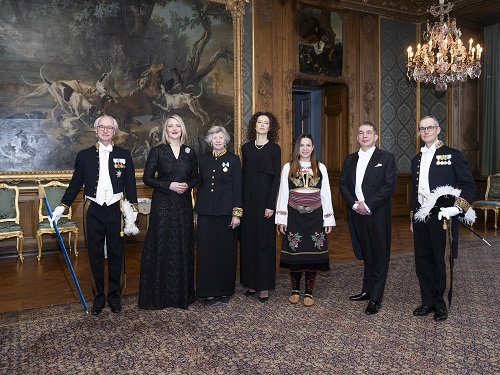
Photo: Protocol MFA of Kingdom of Sweden
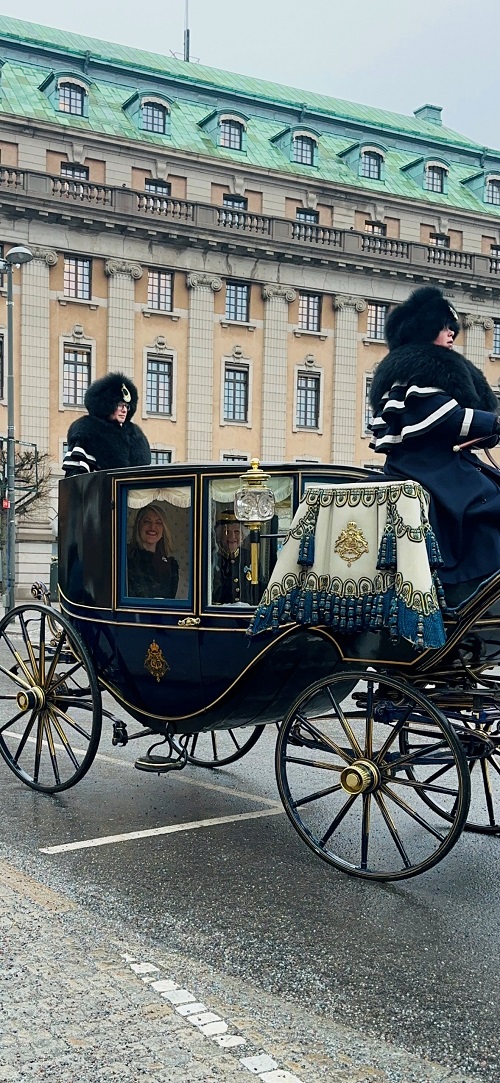
Photo: Protocol MFA of Kingdom of Sweden
|
|
|
| Saint Sava Day in Stockholm |
|
On Saturday, January 27, 2024, St. Sava's Day was solemnly celebrated in Stockholm. The liturgy held in the church of St. Sava in Stockholm, in addition to the clergy of the Stockholm parishes, was also attended by the rector of the St. Sava Seminary in Belgrade, protodeacon Radomir Vrućinić, father Igor Davidović, archbishop for Scandinavia of the British-Scandinavian diocese and the Ambassador of the Republic of Serbia in Stockholm, Jelena Čukić Matić with the team of the Serbian Embassy in Stockholm.
For the first time, due to the great interest of our diaspora in Sweden, the Solemn Academy of Saint Sava was celebrated this year, instead of in the church premises, in a larger space in the center of Stockholm. The ceremonial program of the Sveti Sava Academy lasted for two hours, and the gathered were greeted by the priest of the Stockholm parishes, father Dušan Raković, who thanked the diaspora who came in large numbers and welcomed the Ambassador of the Republic of Serbia, Jelena Čukić Matić, to the Kingdom of Sweden.
Radomir Vrućinić, rector of the St. Sava Seminary, also addressed the Diaspora, reminding the audience of the most important merits of St. Sava. Folkloric associations from three Stockholm municipalities - Sodertelje, Solna and Haningе - took part in the festive program. During the program, scholarships were awarded by the Stockholm parishes to three students from Stockholm.
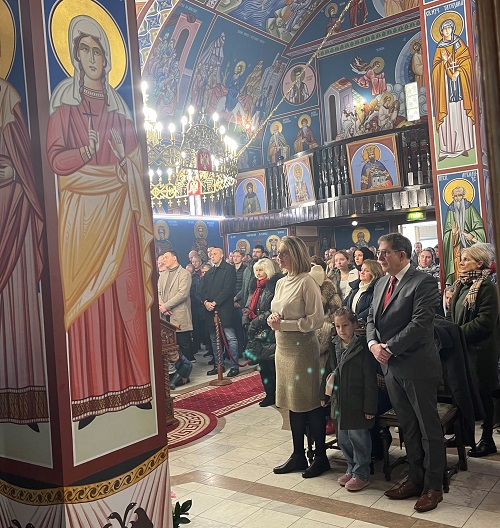
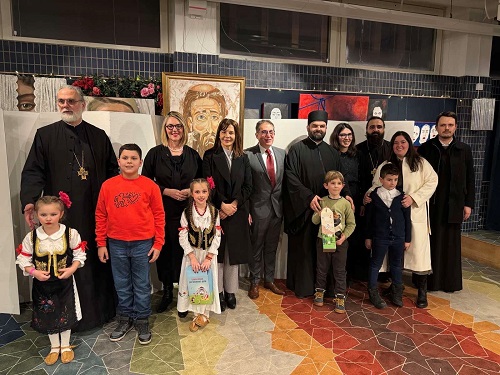
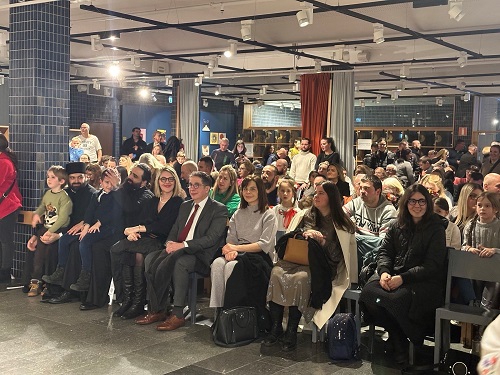
|
|
|
| NON-WORKING DAY |
|
The Embassy of the Republic of Serbia in Stockholm will be closed on Monday 8 January 2024 in observance of Christmas celebration.
The consular section of the Embassy could be reached by phone only for urgent matters. |
|
|
| Stockholm: Оpening ceremony of the photo exhibition „Applied Nostalgia“ at the European House in Stockholm |
|
At the European House in Stockholm, the exhibition of photographs of Belgrade and Stockholm called “Applied Nostalgia” was officially opened on 30 May 2023. This exhibition presents photographs of two authors, one from Serbia and one from Sweden, taken during their recent visits to Belgrade and Stockholm аs a result of the joined project of the Ministry of European Integration of Serbia, Ministry of Foreign Affairs of Serbia and the Embassy of the Republic of Serbia in Stockholm, with the support of the European Commission Representation in Sweden. Minister of European Integration of Serbia, Tanja Miscevic along with the State Secretary of the Ministry of Culture of Sweden, Karin Svanborg-Sjövall opened the exhibition.
The ceremonial opening was followed by reception which was attended by more than 120 guests, among others Swedish officials, ambassadors and the representatives of diplomatic corps in Stockholm, as well as members of the Serbian diaspora and media representatives from Serbia.
“Applied Nostalgia” is an ongoing project of the Ministry of European Integration of Serbia that lasts for 16 years. The main goal is cultural exchange and promotion of European values in Serbia.
The exhibition will be opened until 4 June 2023.
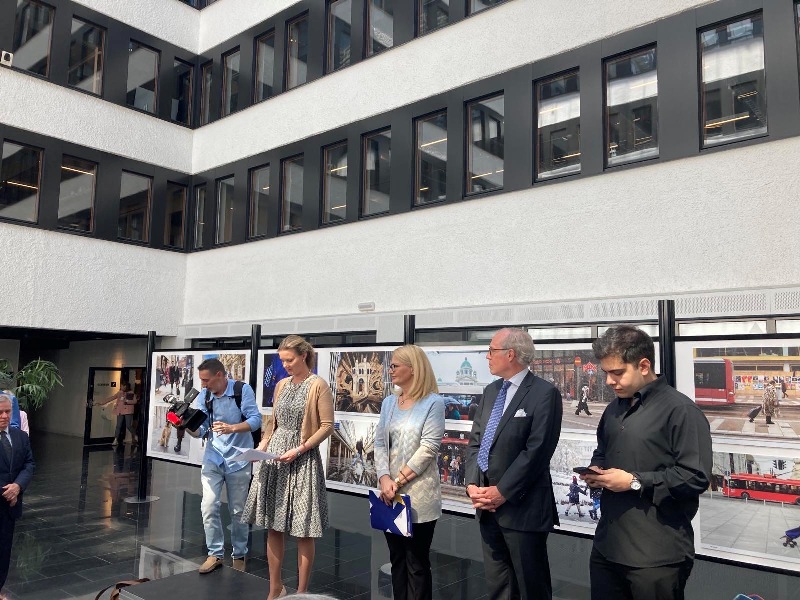
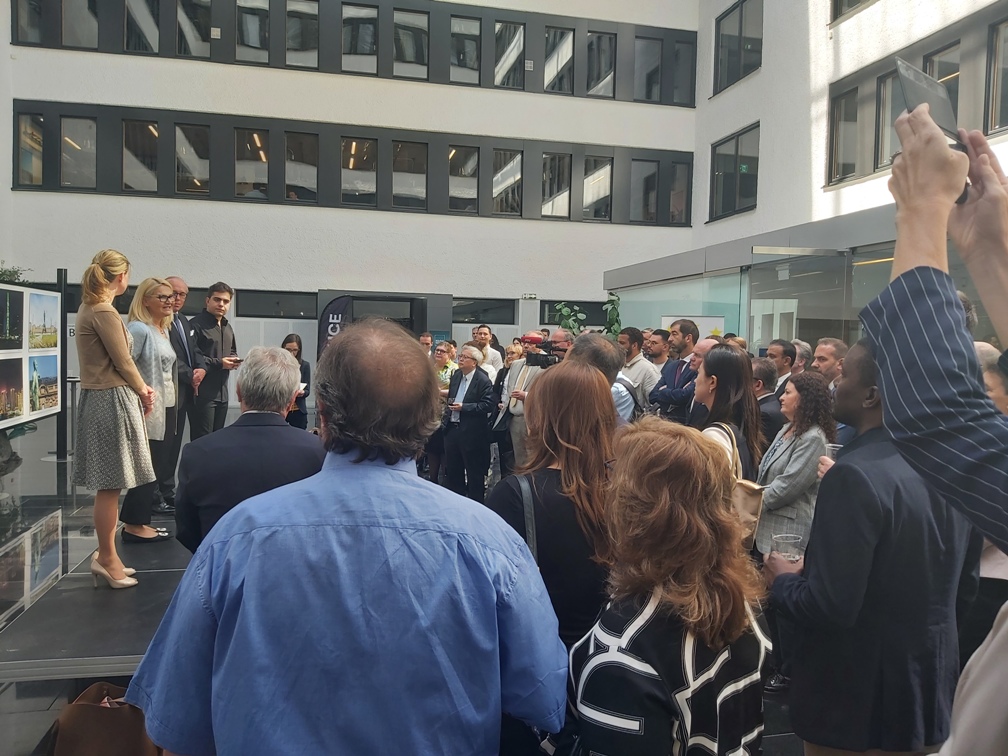
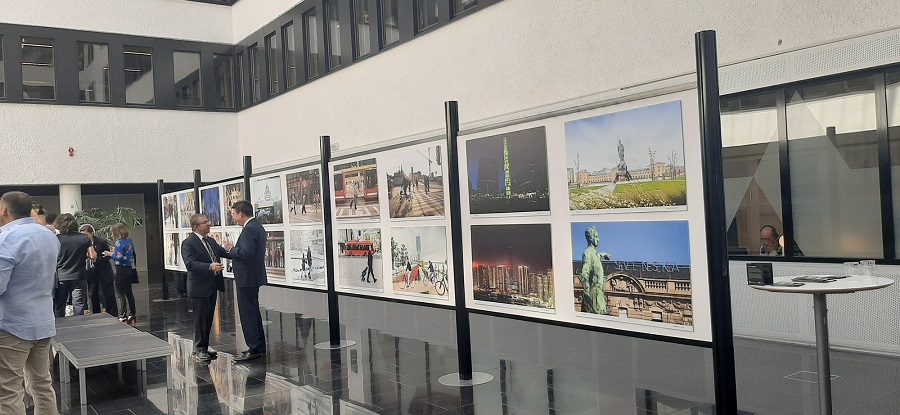
|
|
|
| NON-WORKING DAY |
|
The Embassy of the Republic of Serbia will be closed on Tuesday, 6 June 2023 in observance of the National Day of the Kingdom of Sweden. The consular section of the Embassy will be opened only for urgent matters.
|
|
|
| Stockholm: His Excellency Dragan Momcilovic, Ambassador of the Republic of Serbia in Sweden received in a farewell audience by His Majesty the King of Sweden |
|
23 May 2023
In accordance with the protocolary practice in Sweden, Carl XVI Gustaf, the King of Sweden, received HE Ambassador Dragan Momčilović in a farewell audience on May 23, 2023. During the audience held in the Royal Palace, His Majesty the King expressed interest for development of bilateral relations between Serbia and Sweden and extended a message of condolences over the recent tragic shooting in the elementary school in Belgrade.
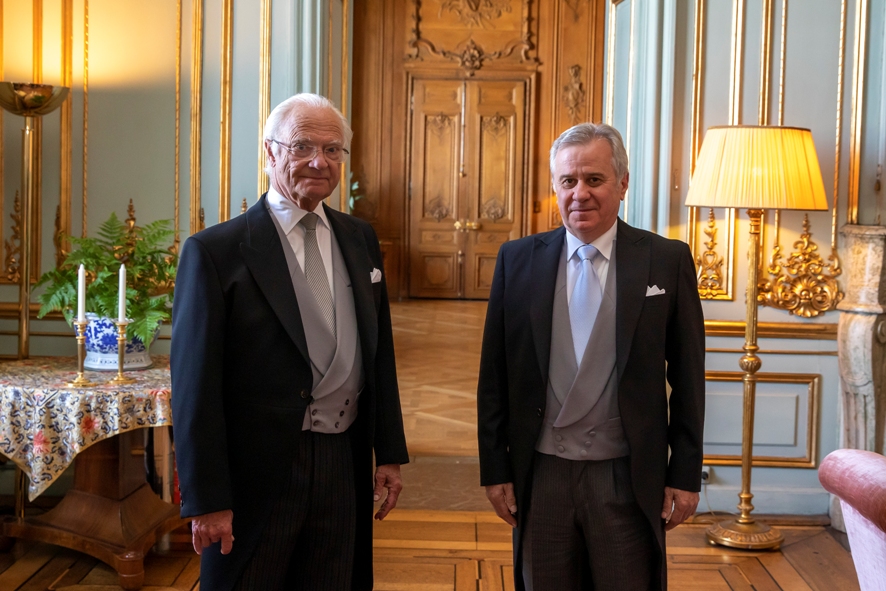 |
|
|
| Non-working day at the Embassy of the RS in Stockholm, May 18, 2023. |
|
The Embassy of the Republic of Serbia will be closed on Thursday, 18 May 2023 in observance of the Ascension Day. The consular section of the Embassy will be opened only for urgent matters. |
|
|
| Stockholm: Concert at the Embassy of the Republic of Serbia |
|
17 of January 2023
26 diplomatic representatives from Europe and Latin American countries attended a classical music concert organized by the Embassy of Serbia, on 17 January 2023. The performers were diplomats from Portugal and Austria, accompanied by Ambassador of Serbia in Sweden Mr. Dragan Momcilovic. The music trio played pieces composed by classical Swedish and Austrian composers, as well as contemporary artist from Spain, Portugal and Serbia. The audience enjoyed the concert followed by cocktail with traditional Serbian dishes.
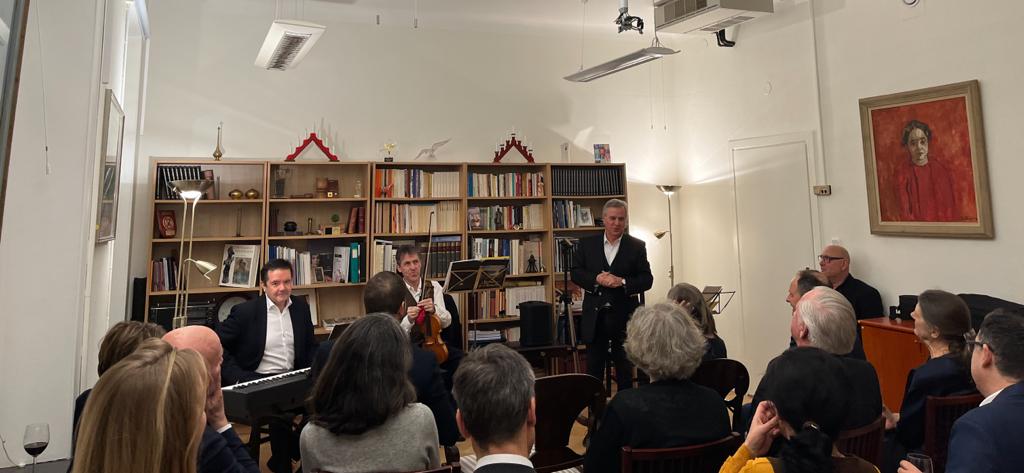
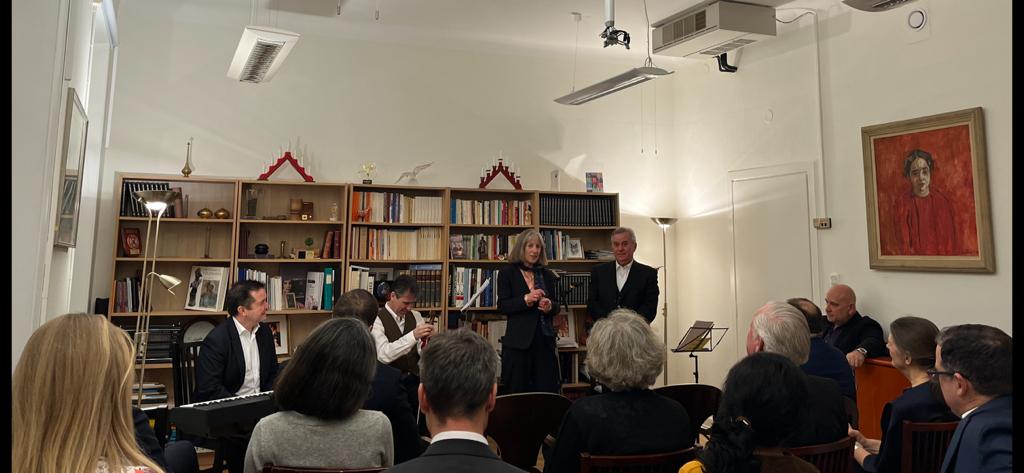
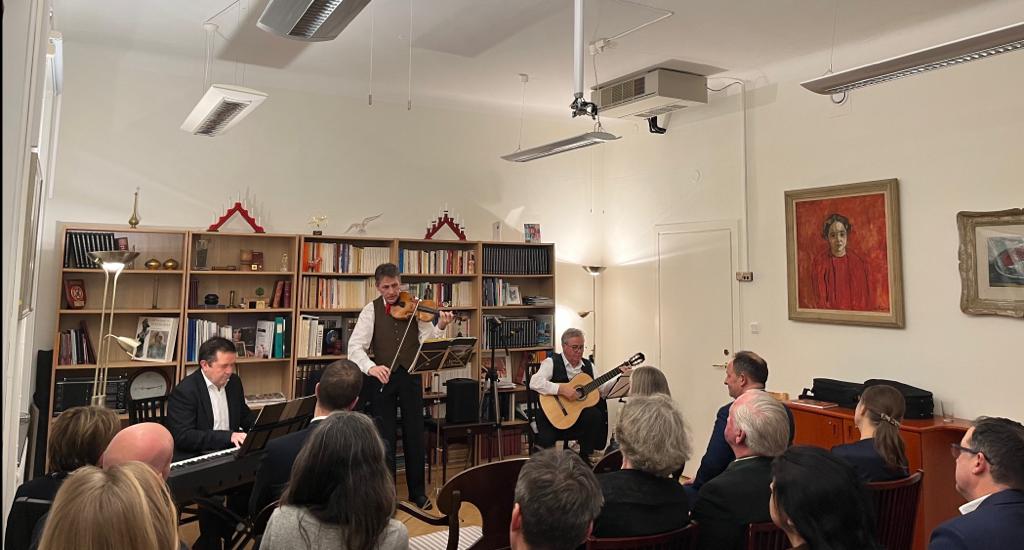
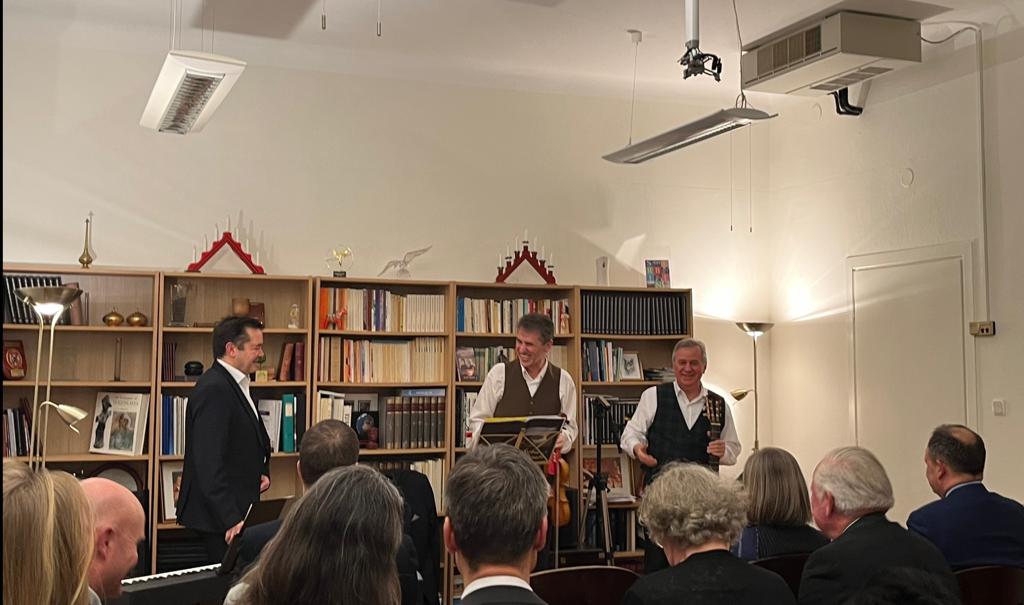
|
|
|
| Stockholm: Ambassador Momcilovic attended the HOMS meeting at the Residence of Swedish Prime Minister Ulf Kristersson |
|
20 December 2022
Ambassador of the Republic of Serbia in Stockholm Mr. Dragan Momcilovic, along with the group of ambassadors of EU member and candidate countries, attended the HOMS meeting at the Residence of Prime Minister of the Kingdom of Sweden Mr. Ulf Kristersson, on 20 December 2022. On that occasion, Prime Minister Kristersson presented the priorities of Swedish Presidency of the Council of the EU, during the first half of 2023, and answered the questions from the diplomatic audience.
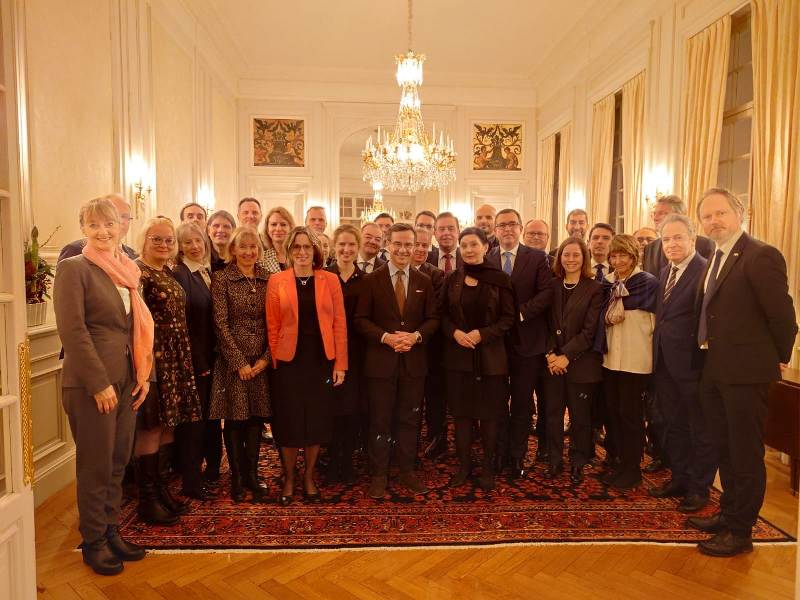
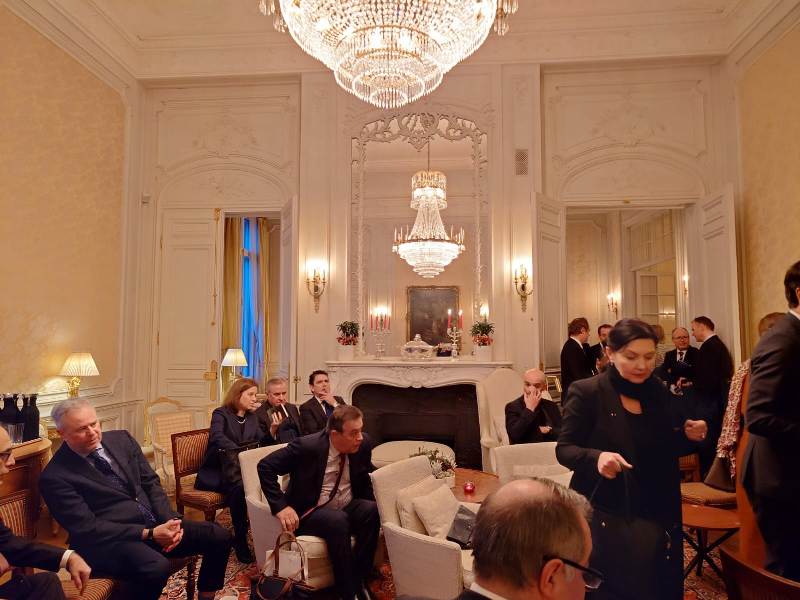 |
|
|
| Stockholm: Ambassador Momcilovic attended the Nobel Prize award ceremony |
|
10 December 2022
Ambassador of the Republic of Serbia in Stockholm Mr. Dragan Momcilovic, attended the Nobel Prize award ceremony, on 10 December 2022, along with other diplomatic representatives accredited to the Kingdom of Sweden.
In accordance with the tradition, King Carl XVI Gustaf has handed out the Prizes to the Nobel laureates, during a ceremony held at the Stockholm Concert Hall.
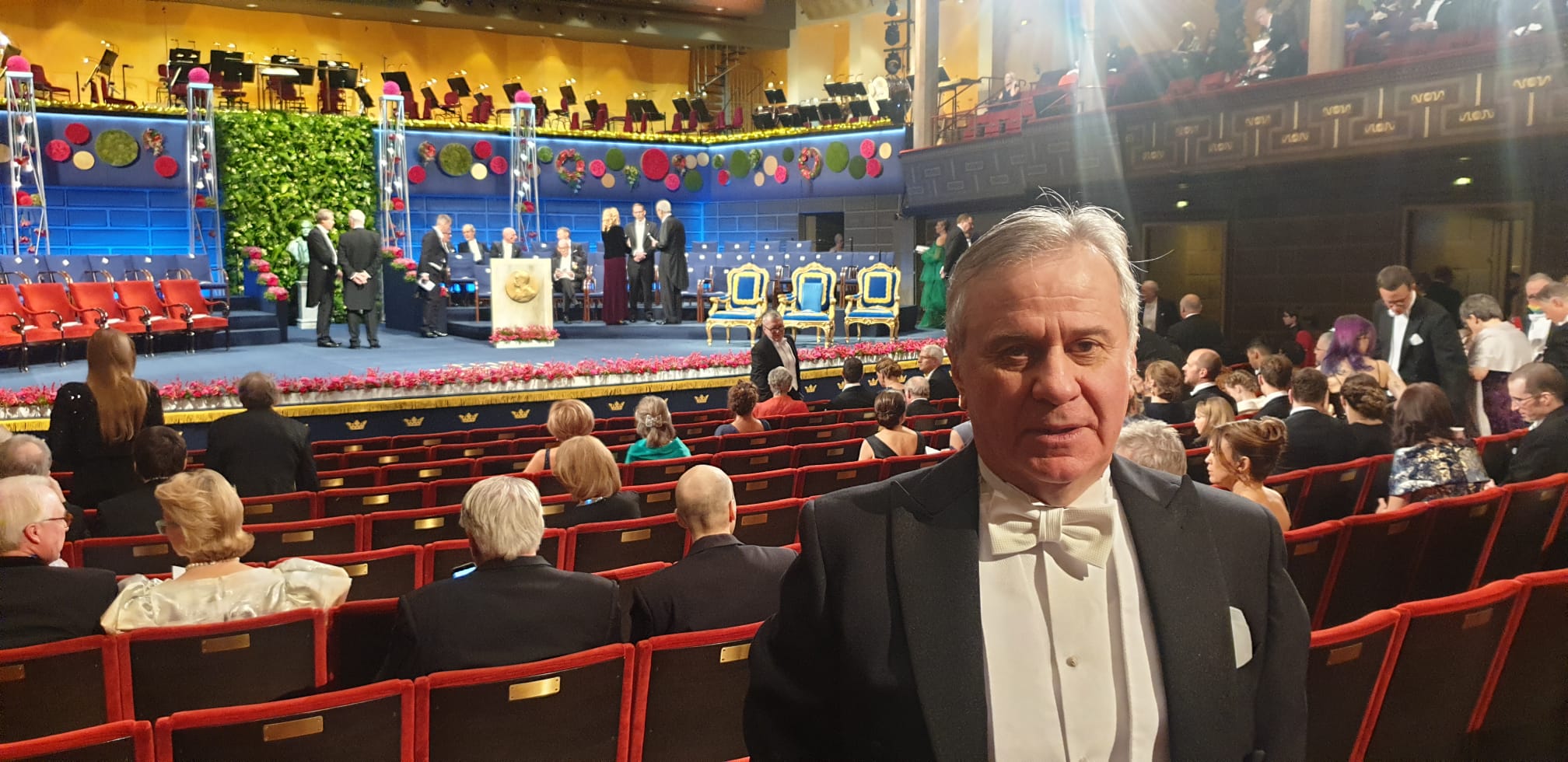
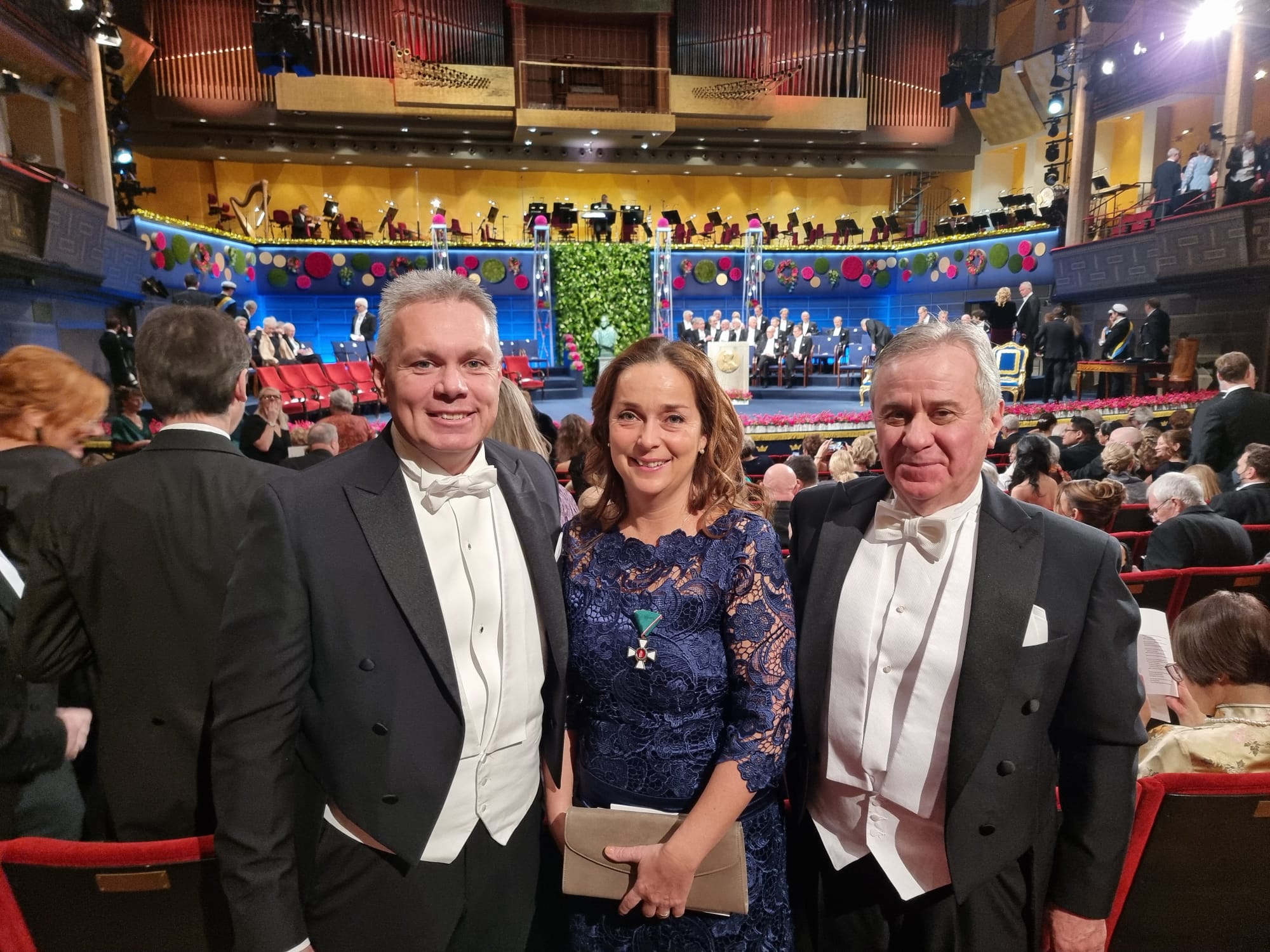
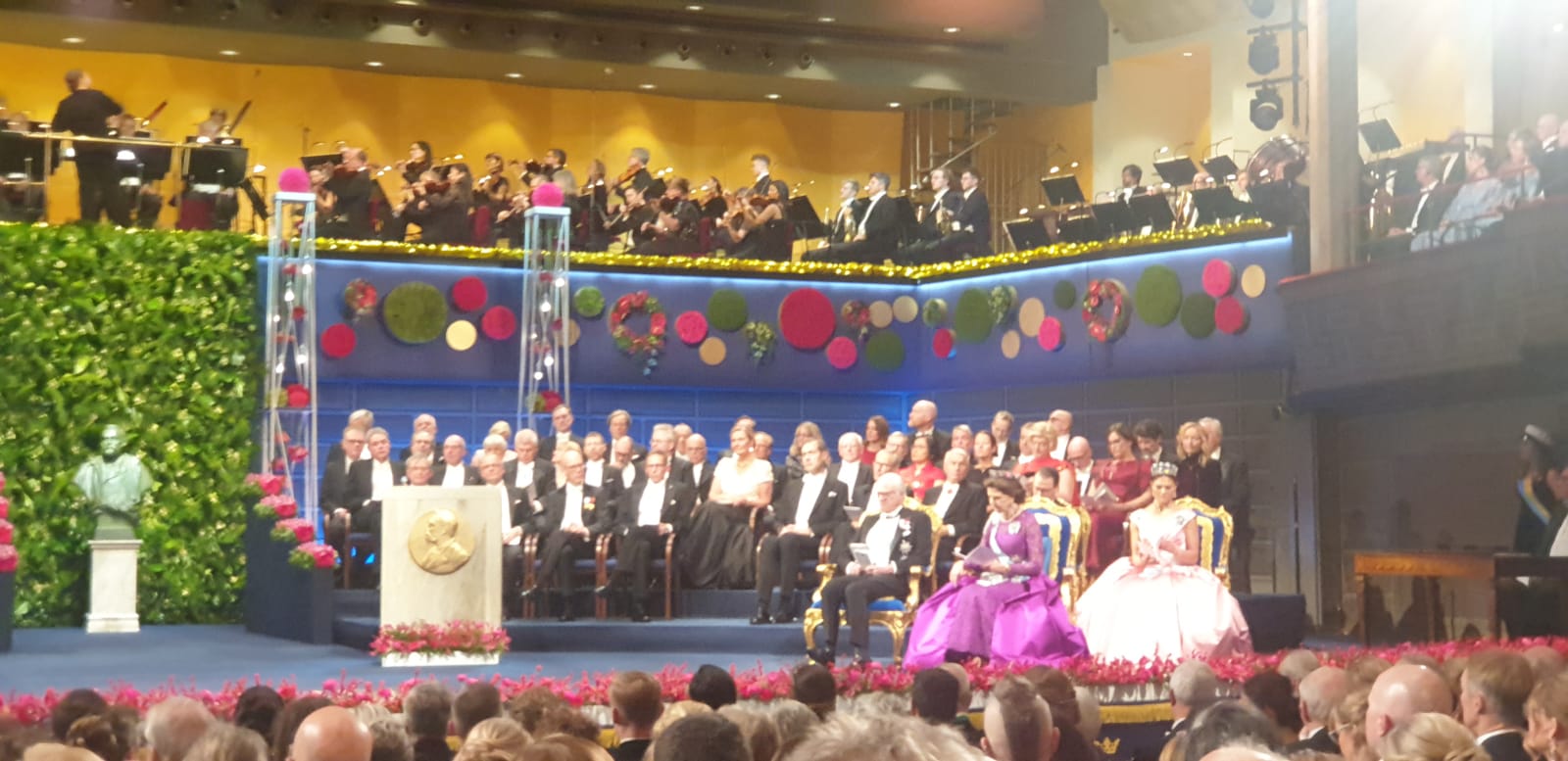
|
|
|
| Gothenburg - Sweden: Serbian delegation headed by Ambassador Dragan Momcilovic has participated at the IHRA Plenary Session |
|
1 December 2022
At the concluding session of the Kingdom of Sweden’s Presidency to the International Holocaust Remembrance Alliance (IHRA), the plenary meeting was held in Gothenburg, from 29 November to 1 December 2022. Serbian delegation headed by Ambassador Dragan Momcilovic participated at the Gothenburg Plenary Session. Among the 35 five delegations that reported about their national pledges, ambassador Momcilovic presented pledges of the Republic of Serbia in accordance with the IHRA activities.
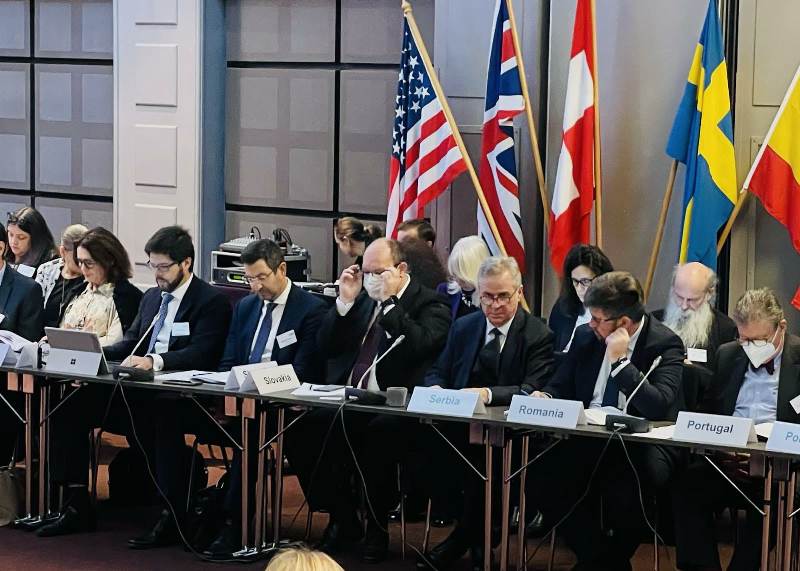
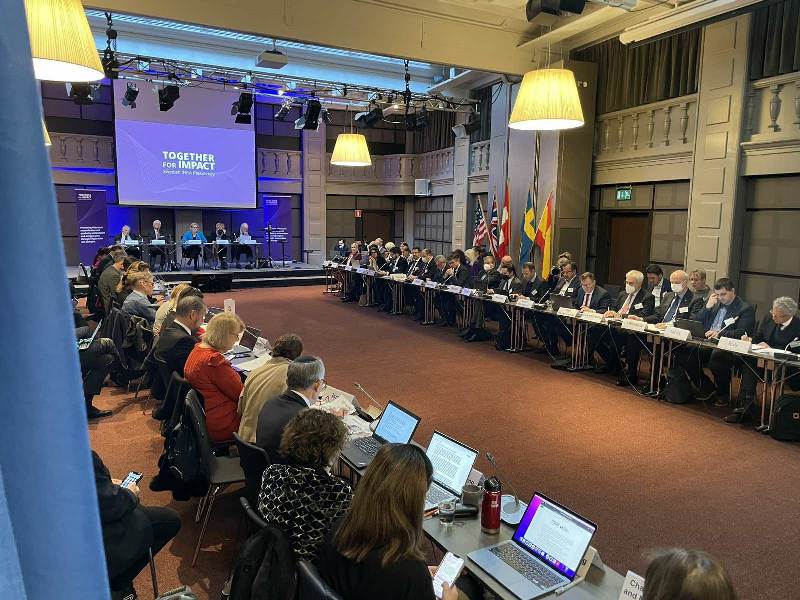
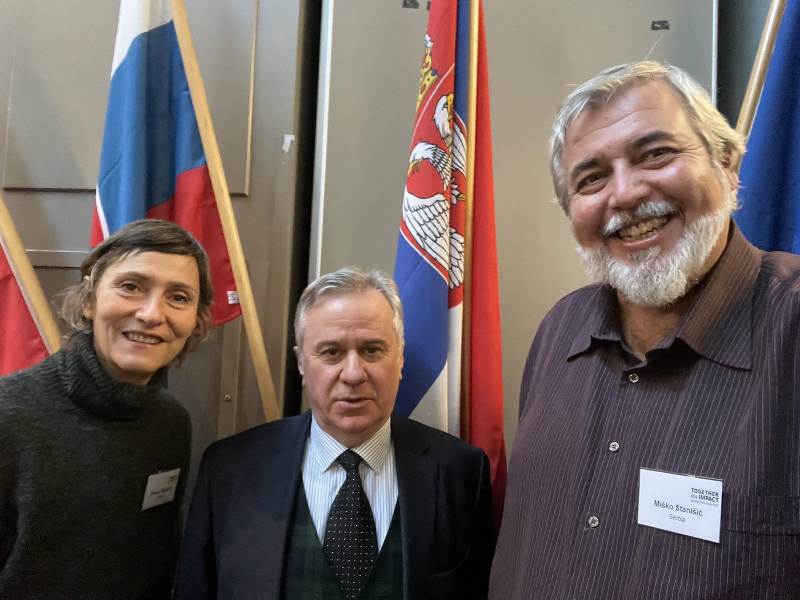 |
|
|
| Riga: Meeting of Ambassdor Momcilovic with Ms Ingrīda Levrence, Undersecretary of State for European affairs at the Ministry of Foreign Affairs of Latvia |
|
November 17, 2022
On the occasion of the National Day of the Republic of Latvia, Ambassador of the Republic of Serbia to the Kingdom of Sweden and the Republic of Latvia Dragan Momcilovic met with Undersecretary of State for European affairs at the Ministry of Foreign Affairs of Latvia Ms Ingrīda Levrence, in Riga, on November 17, 2022. During the meeting, the possibilities for strengthening bilateral dialogue between Serbia and Latvia have been discussed, including political and economic cooperation as well as exchange of bilateral visits of two Ministries of Foreign Affairs during the first part of the 2023.
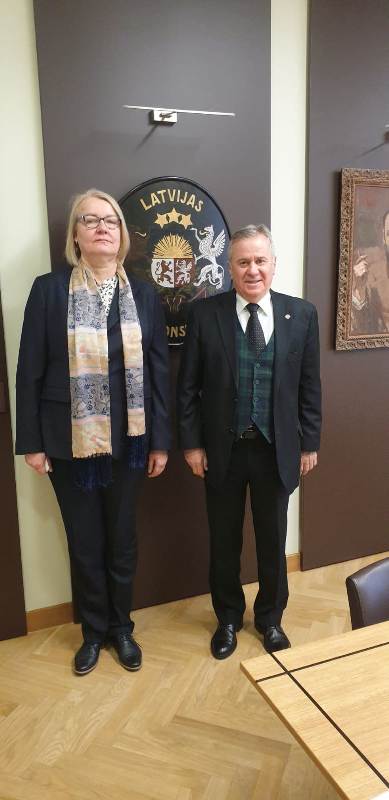 |
|
|
| Stockholm: Ambassador Dragan Momčilović meets with the delegation of the experts of the Serbian government during its study visit in the Kingdom of Sweden |
|
24 October 2022
Ambassador of the Republic of Serbia to the Kingdom of Sweden Dragan Momčilović had a meeting аt the Embassy of the Republic of Serbia in Stockholm with the delegation of the experts from several ministries of the Republic of Serbia, which participates in the three-day program of the Swedish government “Gender Responsive Governance”. During a cordial conversation, there have been exchange of the views about the opportunities for improving the bilateral cooperation with the departments in the Government of the Kingdom of Sweden, with the emphasis on the mutual experiences and practice in the field of gender equality. Within the framework of this program of the Swedish government, it is planned that the delegation from the Serbian government has meetings at the Ministry of Foreign Affairs, the Ministry of Employment, Sweden Innovation Agency, Swedish Agency of Economical and Regional Growth, Swedish Agency for Public Management, Swedish Association of Local Authorities and Regions and the Swedish Women’s Lobby as well.
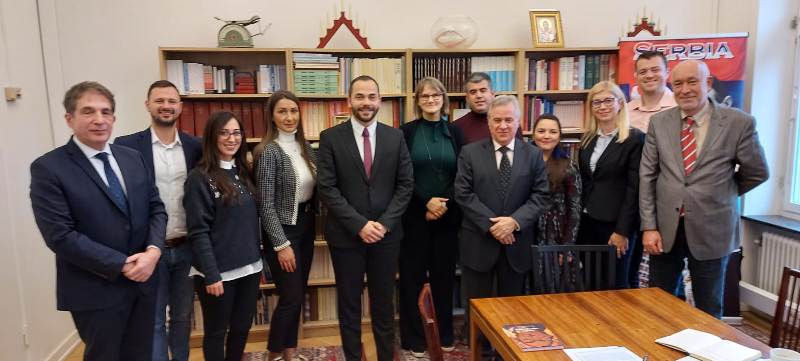
|
|
|
| Non working day |
|
The Embassy of the Republic of Serbia will be closed on Friday, 11 November 2022 in observance of the Armistice Day in the World War I. The consular section of the Embassy will be opened only for urgent matters. |
|
|
| Statement by Minister of Foreign Affairs of the Republic of Serbia Nikola Selaković at the meeting of the UN Security Council on the report on the work of UNMIK |
|
Mr. President,
Madam Special Representative,
Ladies and gentleman,
It gives me honor to address this distinguished body once again and to discuss the latest report of the Secretary-General on the work of the UNMIK.
I would like to thank the Secretary-General and the Special Representative for submitting the report. We take note of the efforts that Ms. Ziadeh makes in performing this very responsible duty, especially bearing in mind the necessity of a comprehensive overview and the complexity of the situation on the ground.
I also take this opportunity to underline that the Republic of Serbia highly values the activities of UNMIK in Kosovo and Metohija, established under UN Security Council Resolution 1244. We advocate for its continued operation in an unchanged and undiminished scope and capacity, especially bearing in mind that the Mission has not yet achieved the main goal of its mandate - a peaceful and normal life for all citizens of our southern province.
Ladies and gentlemen,
Unfortunately, the last few months have not brought more stability in Kosovo and Metohija and the situation in the Province is not exactly as presented in the report. Unilateral moves of Pristina continue to consciously and systematically deepen ethnic differences, causing discrimination against the non-Albanian population. To our knowledge, 105 ethnically motivated attacks have been recorded since the beginning of this year. In addition, Pristina is actively working on administrative and bureaucratic obstacles, by taking measures that were not agreed upon in the dialogue as the basic mechanism for negotiations and reaching solutions between Belgrade and Pristina. Pristina’s approach is problematic in many ways. This irresponsible conduct of Pristina is consciously sabotaging the efforts not only of Belgrade, but also of the EU and other involved parties of the international community, with the clear intention of achieving two goals - the first being to avoid the implementation of assumed commitments. The second, the ultimate and far more alarming goal is the intimidation, marginalization and persecution of Serbs.
In all previous statements before this this distinguished body, Pristina focused on what happened in the past while failing to mention, which is painful to witness, how non-Albanians in Kosovo and Metohija live today. Serbs are still intimidated in different ways, forced to leave their homes, villages and cities. Those displaced are discouraged from returning to where they were born and lived their lives.
The provisional institutions work systematically to remove and erase as much as possible of the cultural and national diversity that is left. At the same time, Pristina is consciously fueling inter-ethnic tensions using all available methods.
Attending religious celebrations seems to be a crime in Kosovo and Methohija. It is the case of Nikola Nedeljković who was arrested for allegedly "inciting ethnic hatred and intolerance", but actually his imprisonment was for attending the St. Vitus Day (Vidovdan) celebration.
Nikola was sentenced to eight months in prison without any material evidence. On the other hand, let me remind you that even to this day there is not a single perpetrator held legally accountable for the more than 1,000 Serbs killed since 1999. Due to planned intimidation, almost all towns and villages in Kosovo and Metohija are ethnically cleansed. Representatives of Pristina are ignoring the suffering, insulting the open wounds of the Serbs who had to leave their ancestral homes, and I underline, there are more than 200,000 of them. Such conduct has not change for last 23 years and is in complete opposite to the democratic values and principles that the provisional institutions of self-government often promote in their statements.
Therefore, I consider it necessary to emphasize that the true political will of the involved international actors and Pristina is necessary in order to create the conditions for the beginning of the end of discrimination on a national basis and common life in the Province.
Esteemed members of the Security Council, I would like to draw your attention to the rigid, problematic and extremely irresponsible conduct of the other negotiating party within the dialogue. In achieving the above-mentioned goals, Pristina applies the so-called policy of reciprocity, a well-thought-out, malicious strategy that, unfortunately, was not constructed independently. By continuously insisting on mutual recognition as a central part of the dialogue, the so-called policy of reciprocity demonstrates the essential unwillingness of the current political leadership of Pristina to find any compromise solution. Let me remind you that the talks between Belgrade and Pristina did not start with last elections in Pristina, but have been in progress for 11 years since the technical dialogue started (8 March 2011). Therefore, we assess as inadmissible attempts to disregard the current format of the dialogue, and annul the agreements only because they are not to the liking of the current political factors. It is unacceptable that the current geopolitical circumstances are being used to simply erase what has been painstakingly worked on for years. Belgrade, I underline, was institutionally involved in the dialogue from the very beginning, while the commitment of the other side has varied and continues to vary depending on the political option that is in power.
The harsher political rhetoric and narrative of the current leadership of the provisional institutions of self-government in Pristina are accompanied by concrete destabilizing steps. In the reporting period, measures on license plates were imposed, disguised as attempts at alleged integration into society.
Let me remind you again, there was no agreement on such measures in the dialogue between Belgrade and Pristina. I believe, ladies and gentlemen, that even today we will hear from the representative of Pristina that their side has fulfilled all obligations, but the decision on re-registration of license plates shows that Pristina is not only failing to fulfill what has been agreed upon, but it nullifies the results of the dialogue, creating a new crisis all over again. The effect of such forcibly imposed measures is best illustrated by the fact that since the decision was made a single-digit number of re-registered vehicles with Serbian license plates has been recorded, of which only two are Serbs from the north of Kosovo and Metohija. This is another indicator that Pristina does not enjoy full support, but that, on the other hand, it continuously provokes the natural reaction of the Serbian population, which cannot endlessly be subject to the arbitrariness of temporary institutions.
I believe that even today we will hear already known narrative of representatives from Pristina who try to present every reaction of the Serbs in Kosovo and Metohija as an activity organized by Belgrade in alleged attempts at destabilization. Such claims are simply not true. Serbia, for its part, cannot in any way contain the revolt present among the non-Albanian population of Kosovo and Metohija. It is an undeniable fact that citizens' protests represent a voice against many years of institutional violence and the deprivation of rights of the non-Albanian population, which, in this case, is denied the right to peaceful enjoyment of private property acquired in a legal manner.
Pristina does not cease in its attempts to confiscate property, and, as is well-known, one of the targets is the Serbian Orthodox Church. By calling into question the return of property to the Dečani Monaster Pristina paradoxically does not execute the decisions of its own so-called Constitutional Court.
Ladies and gentlemen,
I thought for a long time how to best illustrate the true picture of everyday life of the non-Albanian population in Kosovo and Metohija. I will mention only some of the facts. Numerous ethnically motivated incidents, hate speech, intimidation, violations of the right to a fair trial, threats to the right to freedom of movement and religious rights, desecration of churches and graves were recorded in the last reporting period as well. The frequent attacks on the sites of the Serbian Orthodox Church are also unacceptable, and especially the humiliating attitude towards the Serbian cultural and spiritual heritage, including the 4 monuments that have been inscribed on the UNESCO World Heritage List. Numerous administrative and technical barriers are imposed on priests and monastic communities, making it difficult and even impossible for them to survive on church properties.
When it comes to civil rights, try to imagine that the basic political and civil right to vote has been taken away from you.
This is precisely what the Serbs in the Province have experienced along with frequent intimidation and violent incursions of the ROSU special forces, which are an instrument for the implementation of Pristina's goals under the pretext of allegedly fighting crime.
In December last year Bratislav Nikolić the president of municipality of Štrpce has been detained, as suspected of the organized crime and corruption - still not charged, kept in detention unit in Podujevo, only for the reason to make additional and final pressure on the Serbian community living in the enclave of Štrpce. How can this be justified as the fight against crime when special forces are used to raid village festivals, schools and kidnap drivers of ambulance transporting infusion containers and medicines? What are the motives behind and how can one rationalize these actions? Just try to imagine and put yourself in the shoes of Ms. Dragica Gašić, the only Serbian returnee in Djakovica. Imagine that you are still not allowed to buy bread because of your origin and nationality, because you live in a municipality that the local Albanians proudly consider forbidden to non-Albanians. Imagine that as many as eleven Albanian civil society organizations demand your expulsion, as well as a ban on any non-Albanian ever returning to that town. Then you will realize the level of intimidation that Serb returnees are facing. It will be clear to you why the percentage of returnees is below 2% and why it is still one of the lowest in the world. Let me pose a question - are these the characteristics of a society that presents itself to the world as a fully fledged democracy and a factor of stability in the region?
We are aware that the dialogue has a wider dimension and that it can affect the situation in the entire region.
This is reflected in every statement given by Serbian officials, including the President of the Republic of Serbia, Aleksandar Vučić. "It is better to negotiate for a hundred years than to fight for a day" are the words of our President that best describe the policy of peace, reconciliation, and regional cooperation pursued by the Serbian leadership, which is guided by the vision of building a common and prosperous future of the Balkans.
I believe that it is a duty of today's leaders to create a clear common vision for the future generations. Such a vision was shown by the leaders of Belgrade, Skoplje and Tirana by creating Open Balkan, an initiative from the region for the region, which is already producing concrete results. Serbia has on several occasions reached out to Pristina inviting it to join this initiative. We counted on an awareness of the importance of economic connectivity and progress for the benefit of the citizens of the entire Balkans. However, our invitation was not met with understating from the other side.
Ladies and gentlemen,
We categorically reject Pristina's argumentation regarding the alleged unconstitutionality of the formation of the Community of Serb Municipalities. It is clear that Pristina's attitude towards this obligation reflects its attitude towards the Serbian people in the Province. It also indicates that Pristina is against Serbian people being organized as an ethnic community and thus exercising their collective rights.
The aim of their approach, as a preferred model, is a community without Serbs, such as those in Pristina, Djakovica or Pec, or some similar localities in the Province. For our side, it is unacceptable that Pristina has refused to fulfil its obligations and discuss the formation of the Community of Serb Municipalities for as much as 3,470 days but I assure you that, regardless of this fact, Serbia will not give up on its efforts to find a compromise solution for the current situation.
I will remind you that the representatives of Pristina, although they often repeat in their statements that the case of the so-called Kosovo is a fait accompli, continue not to be recognized by the majority of UN member states for 14 years now. If the so-called Kosovo's independence is a reality, how come that we have the dialogue? And how come that Belgrade is faced with increasing pressures as regards the need for mutual recognition? What the current political leadership of Pristina refuses to accept is that Belgrade cannot be left out in the search for a final solution. The same also applies to the case of the increasingly frequent indications about Pristina's upcoming membership in international organizations. Will these moves help to create the necessary atmosphere for dialogue? Are we, in this way, rewarding Pristina's destructive behaviour and refusal of dialogue? Our view is that the attempts of the so-called Kosovo to join international organizations are an unacceptable act and Serbia will work decisively against such steps.
During the last session in April this year, we could hear the calls of some members of the UN Security Council to reduce and even terminate UNMIK, with the explanation that Pristina has its own functional institutions. However, the circumstances I have presented to you and the situation on the ground remind us again that international presence in our southern province is still necessary. In this regard, we support the efforts made by UNMIK, KFOR, EULEX and OMIK within their mandates. The Serbian and other non-Albanian population in Kosovo and Metohija has the highest confidence in the international presence and considers it a guarantor of security, which additionally confirms that international missions need to remain engaged in an undiminished scope and capacity in accordance with UN Security Council Resolution 1244.
In conclusion,
I would like to point out that lately in all international forums we keep hearing calls for respect of the principles of the UN. We support the territorial integrity of all UN member states. But, what about Serbia? I would like to ask the esteemed members of this distinguished body whether the need to implement the principles of the UN Charter applies only to some or all of its members? As a country that consistently respects international law and still suffers the consequences of it being violated, we believe that the UN Charter and international law, including the territorial integrity and sovereignty of states, should be respected by all and apply indiscriminately to all UN member states.
Ladies and gentleman,
It was this body that more than two decades ago adopted Resolution 1244, which confirmed the territorial integrity of Serbia. This fact did not prevent certain countries from recognizing the so-called “Kosovo” and thus violating the UN principles, but also the resolution that they adopted, by adjusting international law to their interests and goals. Precisely because of this, the more and more frequent mentioning of the case of "Kosovo" is an indication that the precedent made opened a Pandora's box, because the strength of each principle rests on its full and universal application and unconditional adherence.
You will notice that I posed a lot of questions in my statement and I express hope that today we will hear answers to at least some of them from you, esteemed members of the UN Security Council and representatives of Pristina, because the inhabitants of Kosovo and Metohija, of any nationality, whether they are Serbs or Albanians deserve it.
All the inhabitants of Kosovo and Metohija have every right to expect an improvement in the atmosphere and the reduction of tensions on the ethnic level, which are a prerequisite for a normal life. For such a step to be made, we need constructiveness, which is not lacking on the Serbian side, genuine support of international actors. I emphasize that Serbia has always been and remains deeply committed to finding a sustainable solution by peaceful means, for the sake of peace, stability and a common future.
Thank you.
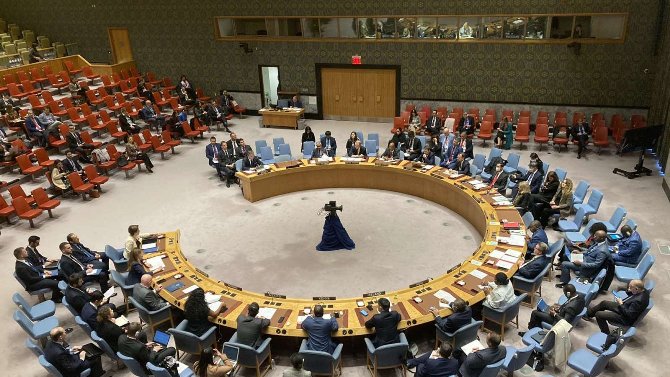 |
|
|
| Selaković: Serbia is actively involved in combating terrorism, radicalism and extremism |
|
11. May 2022.
Today, in Marrakesh, Minister of Foreign Affairs of Serbia Nikola Selaković participated in the Ministerial Meeting of the Global Coalition to Defeat ISIS. Minister Selaković said that Serbia was committed to the multilateral aspect of the fight against terrorism, adding that he firmly believed the United Nations should be the key forum for international cooperation in this field.
Minister Selaković stated that Serbia was fulfilling all international obligations pertaining to the implementation of UN Security Council resolutions, especially those related to the introduction of arms embargoes, including bans aimed at non-state actors, terrorist organisations and related individuals. He emphasised that Serbia was a signatory to 15 international conventions against terrorism. “By participating in multinational UN and EU peacekeeping missions, Serbia is making a concrete contribution to preserving regional and global security,” Minister Selaković said, paying tribute to a member of the Serbian Army, Lieutenant Colonel Dejan Stanojević and his colleagues, who tragically lost their lives on March 29 in the United Nations Mission in the Democratic Republic of the Congo.
“Serbia does not diminish the importance of other international forums, which is why it joined the Global Coalition from the very beginning, and selflessly contributes to international efforts to fight ISIS, primarily through various forms of donations in military equipment, ammunition, and training in Iraqi security forces”, Minister Selaković said. He added that as a candidate country for membership in the European Union, Serbia gave its full contribution through active participation in European policies on the fight against terrorism, and had developed a strategic cooperation with EUROPOL.
Minister Selaković noted that Serbian criminal legislation provided instruments to prevent and punish the encouragement, organisation, and participation of its citizens in wars or conflicts in foreign countries. He explained that the Serbian judicial authorities had completed proceedings against 7 persons engaged in foreign battlefields, and that several investigations against persons connected with terrorist activities were underway.
Minister Selaković said that the fight against terrorism, radicalism and extremism was a priority, and that Serbia was actively involved in combating these challenges and threats at the domestic, regional, and international level.
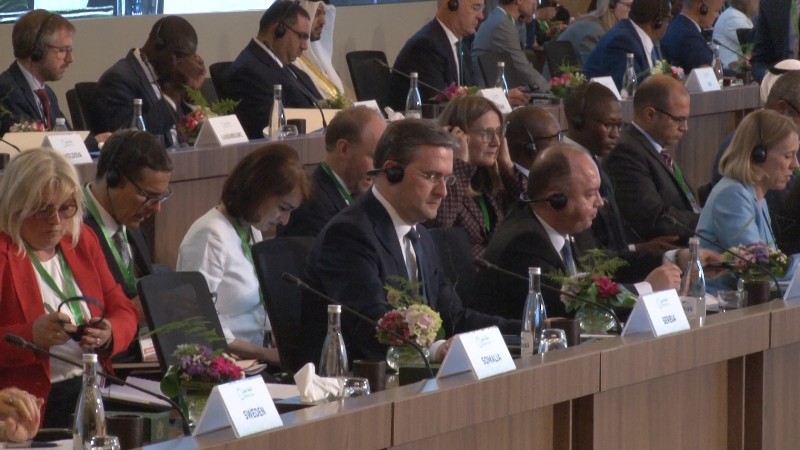
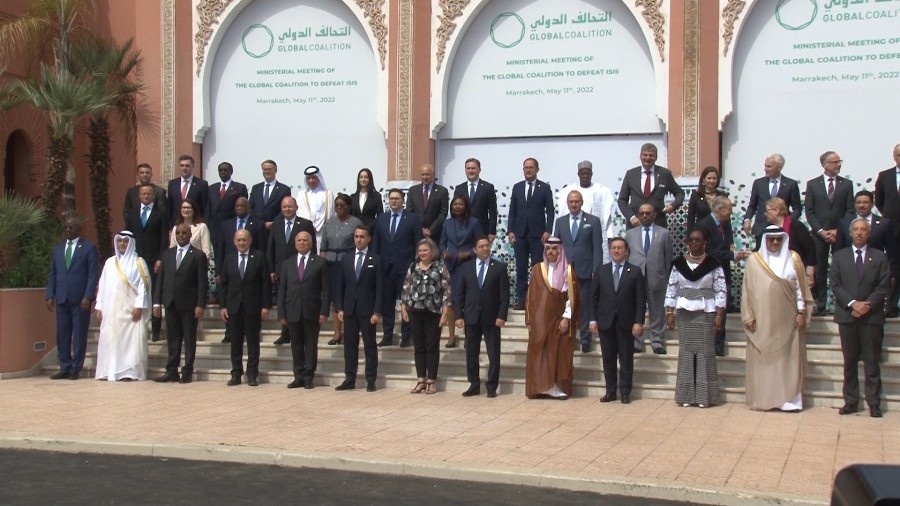 |
|
|
| Latvia to lift ban on entry from April 1, 2022 |
|
As of April 1, 2022, all restrictions on entry into Latvia imposed to prevent the spread of COVID-19 have been lifted. Serbian citizens can enter Latvia, as before, with a valid passport, invitation / guarantee letter, return ticket, travel insurance and proof of financial possession. Test or vaccine on COVID-19 is not required. |
|
|
| Sweden to lift ban on entry from April 1, 2022 |
|
As of April 1, 2022, all restrictions on entry into Sweden imposed to prevent the spread of COVID-19 have been lifted. Serbian citizens can enter Sweden, as before, with a valid passport, invitation / guarantee letter, return ticket, travel insurance and proof of financial possession. Test or vaccine on COVID-19 is not required. |
|
|
| Participation of the Serbian Embassy in Stockholm in the celebration ”Journée de la Francophonie en Suède”, on 24 March, 2022. |
|
The Embassy of the Republic of Serbia in Stockholm participated in the celebration ”Journée de la Francophonie en Suède 2022", within the manifestation "Buffet de la Francophonie", that was organized at the Folkuniversitetet in Stockholm by the Embassies of France and Belgium, in cooperation with the French Cultural Institute.
On that occasion, among the presentations of the Embassies of other participating countries in the Francophonie (France, Canada, Switzerland, Belgium, Egypt, Tunisia, Morocco, Lebanon, Armenia and Rwanda), Serbian Embassy had a remarkable stand with various traditional Serbian culinary specialties and promotional materials of Serbian tourism potentials. In addition to the representatives of the diplomatic corps, the Serbian stand was visited by the Swedish citizens, French language connoisseurs, as well as numerous Swedish students, who have got the brochures in French, with information on study opportunities and academic exchanges with Serbian universities.
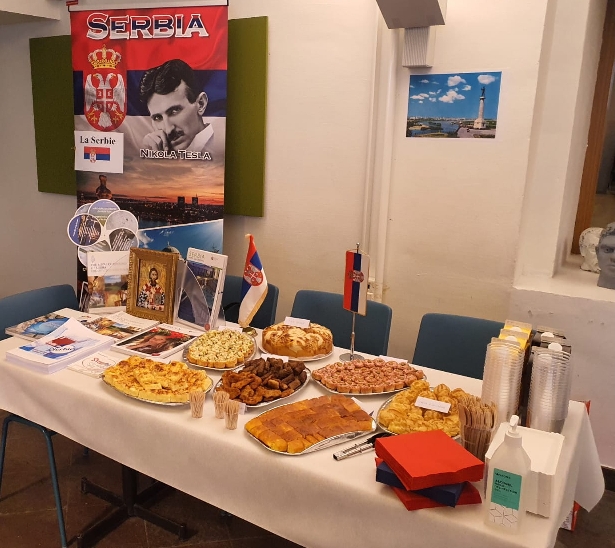
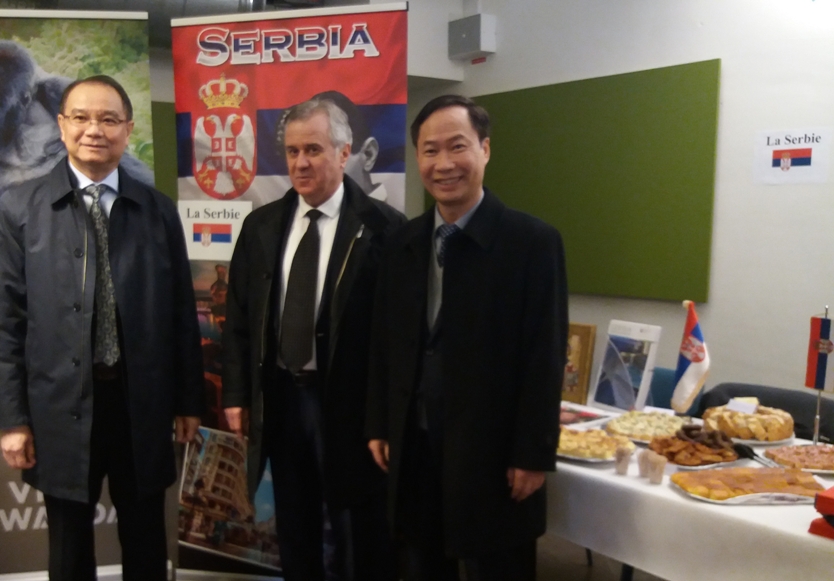 |
|
|
| Foreign Minister Selaković meeting with the Head of the EU Delegation and the Ambassadors of the EU Member States |
|
02. Mar 2022.
The Minister of Foreign Affairs Nikola Selaković met today with the Head of the EU Delegation Emanuel Giofre and the Ambassadors of the EU Member States accredited to Serbia.
Minister Selaković informed the ambassadors present about the Conclusion of the National Security Council, which was adopted by the Government of Serbia on February 27 - regarding the situation in Ukraine.
The Serbian Foreign Minister said that Serbia deems the outbreak of the crisis and conflict in Ukraine deeply regretful, emphasizing that Serbia considers it very wrong to violate the territorial integrity and sovereignty of any state, as in the case of Ukraine. In this regard, Foreign Minister Selaković reiterated that Serbia very clearly insists on the respect for the principles of international law, pointing out that this is the foundation of the Serbian foreign policy.
FM Selaković underscored that Serbia gives fully supports the negotiations between the two sides and all credible international efforts to find a peaceful and political solution to the crisis in Ukraine.
Mr. Selaković pointed out that Serbia will continue to consistently maintain peace and stability in Southeast Europe in these challenging times, emphasizing that modern challenges also show that all disagreements on our continent must be resolved by peaceful means and dialogue.
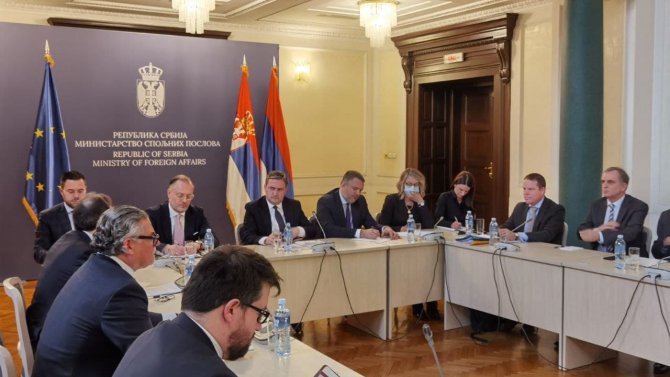 |
|
|
| Statehood Day, 15 February 2022 |
|

The Embassy of the Republic of Serbia to the Kingdom of Sweden
on the Statehood Day of the Republic of Serbia
has a pleasure to invite you
to follow the online presentation
15 February 2022
The link to the presentation is available HERE:
|
|
|
| Selakovic: Deepening cooperation with Latvia on Serbia's path to the EU |
|
31. Jan 2022.
Minister of Foreign Affairs of the Republic of Serbia Nikola Selakovic met today with Minister of Foreign Affairs of the Republic of Latvia Edgars Rinkēvičs and expressed gratitude for the support that Latvia provided to our country on its EU path.
At a joint press conference after the meeting, Minister Selakovic said that he was pleased with the talks which were, among other issues, focused on deepening cooperation with Latvia in the process of European integration.
"Our plans and intentions are evidenced by the Memorandum of Cooperation between the two Ministries of Foreign Affairs that we have just signed, which defines our good will to hold regular political consultations in the coming period, to exchange experiences in the field of European integration, but also to contribute as two ministries to the additional development of economic cooperation", the Head of Serbian diplomacy stated.
According to Minister Selakovic, Serbia’s European path was a constant and a strategic commitment of our citizens and our state.
Minister Selakovic said that he discussed with his Latvian counterpart the political developments in the regions where the two countries are located, the deepening of cooperation, as well as the dialogue between Belgrade and Pristina, the need to continue the dialogue, but also to implement the agreements reached so far, especially when it comes to the establishment of the Community of Serb Municipalities.
He said that more than three thousand days passed since the First Brussels Agreement, and that Pristina had not yet fulfilled its obligations.
"We will continue discussing this topic. I expressed gratitude to my colleague for the readiness of Latvia to increase its contingent within KFOR units, which means a lot to us when it comes to preserving and maintaining security and stability on the ground", Minister Selakovic underlined.
The Serbian Foreign Minister said that he also talked with his Latvian counterpart about cooperation at the multilateral level and the readiness of both countries to mutually support their candidacies in the upcoming period, while welcoming in particular the Latvian colleague's initiative to appoint Bojan Kostic as Honorary Consul in Serbia.
As he stated, they agreed that the economic and trade cooperation between the two countries was at a modest level, that there were many more opportunities for it to develop in the future, and they also touched upon cooperation in the field of IT.
Minister of Foreign Affairs of Latvia Edgars Rinkēvičs noted that Serbia made great progress in the process of European integration in the past years, and congratulated on the successfully held referendum on constitutional amendments.
"It is important for Latvia that there is a credible EU enlargement process in the Western Balkans and that the candidate countries meet all criteria, from agriculture, the rule of law and judiciary, to foreign policy harmonization", Rinkēvičs said.
He added that they agreed that there was a lack of regular high-level dialogue at the bilateral level, but that there was a mutual desire for that to be corrected.
When it comes to economic relations and cooperation, Minister Rinkēvičs stated that there was a lot of room for intensifying cooperation, especially in the IT sector.
He also added that Latvia supported the dialogue between Belgrade and Pristina and that its stance was that all of the agreements reached need to be implemented.
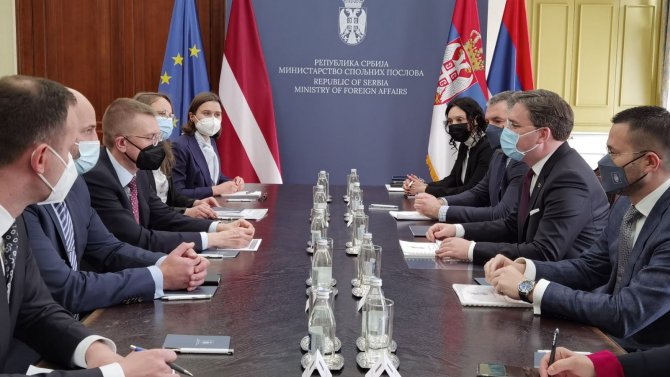 |
|
|
| Belgrade to get Centre for Fourth Industrial Revolution |
|
7 February 2022
Prime Minister Ana Brnabic attended today in Geneva the signing of the Agreement on the Establishment of the World Economic Forum Centre for the Fourth Industrial Revolution in Serbia, the first of its kind in the Western Balkans.
The agreement was signed at the headquarters of that forum by Director of the Office for Information Technologies and eGovernment Mihailo Jovanovic and Managing Director and Head of the Forum's Centre for the Fourth Industrial Revolution Jeremy Jurgens.
The centre in Serbia will be the 16th in the network of centres of the World Economic Forum in the world and the first in the region of the Western Balkans.
The new centre will start operating on 1 March and will function as a non-profit organisation and a platform for public-private partnership and cooperation for the Fourth Industrial Revolution, while the focus of work will be on artificial intelligence and bioengineering.
This centre will work within the Serbian government’s Office for Information Technologies and eGovernment and will cooperate with scientific institutes, state institutions and the private sector.
The signing of this document was also attended by founder and Executive Director of the World Economic Forum Klaus Schwab and President of the World Economic Forum Borge Brende, with whom Brnabic had previously met.
Addressing the press, Brnabic pointed out that this agreement is the result of many years of joint work between Serbia and the World Economic Forum.
We started talking in 2018, signed a Memorandum of Understanding, then 2020 hampered us a bit, but we continued to plan in 2021 and here we are today, she said.
According to her, the centre will be focused on the development of artificial intelligence, biomedicine and biotechnology, and on the ways in which digitalisation can raise the productivity of companies and the entire economy.
This is what further leads to higher salaries, a better standard of living, as well as to an economy that is mainly based on knowledge, creativity and innovation, Brnabic emphasised.
Today, we have received great recognition for everything that Serbia has done in the field of digitalisation, development of high technologies and paradigm shift – from an economy that was based on labour-intensive investments to digital development.
That is why this agreement shows that Serbia has been recognised as one of the leaders in the economy and IT industry in the last six years, the Prime Minister pointed out and assessed that this is the announcement of the beginning of an even closer cooperation between Serbia and WEF.
She added that they will have a joint meeting with the 16 WEF centres for the fourth industrial revolution in the world every month, at which they will talk about what each of them is doing, since each has a different focus.
That is how we will hear what everyone is doing every month, learn from each other and I am sure that the centre in Belgrade will be one of the best, the Prime Minister said.
According to her, this gives us visibility, the opportunity to further establish Serbia as an investment destination, a country good for living and investing in new technologies and knowledge.
Jovanovic said that the ecosystem formed around the centre will use the infrastructure of the National Platform for the Development of Artificial Intelligence, the Centre for Genome Sequencing and the future bioeconomic centre – BIO4 Campus.
Izvor/Foto: Tanjug
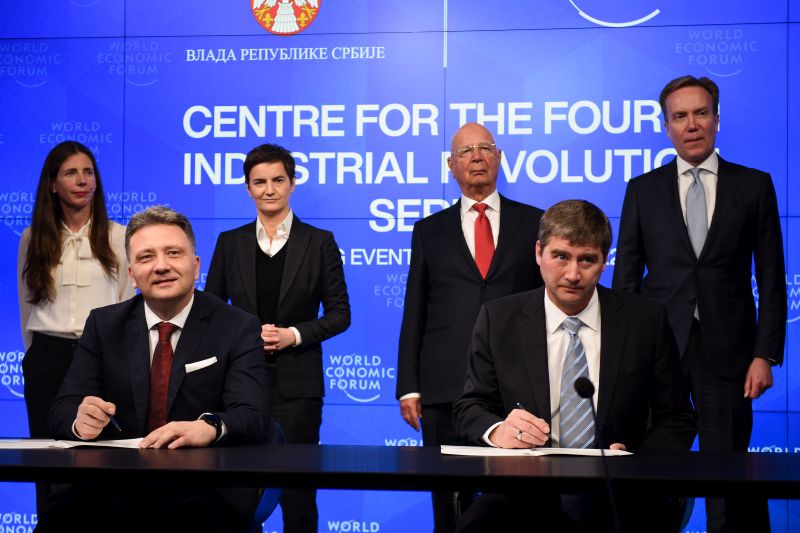 |
|
|
| Considerable room for improving economic cooperation between Serbia, Latvia |
|
31 January 2022
Prime Minister Ana Brnabic spoke today with Minister of Foreign Affairs of Latvia Edgars Rinkevics about bilateral relations, economic and trade cooperation and Serbia’s progress in the process of European integration.
The Prime Minister said that Serbia is committed to joining the EU and underlined that it appreciates very much the support which Latvia gives to our country on its European path, and especially to the opening of Cluster 4 in December last year.
She voiced hope that during the French presidency of the Council of the EU, Serbia will also open Cluster 3, which deals with competitiveness and inclusive growth.
According to her, Serbia advocates progress of the Western Balkans on the European path, which is of essential importance for the region’s stability.
The Prime Minister expressed gratitude to Latvia for its contribution to security in Kosovo and Metohija through significant participation in the KFOR and EULEX missions, assessing that the presence of these missions is still necessary and that it greatly affects the security of citizens.
The Latvian Foreign Minister praised Serbia's progress in the field of European integration and underlined that the successfully conducted referendum on constitutional changes made it possible to make significant steps in the field of judicial reform, which is key to further progress in the field of the rule of law.
He assessed that there is significant space for improving economic cooperation and increasing the volume of foreign trade, adding that Latvia is open for direct contacts between businessmen of the two countries when epidemiological conditions allow it, which could contribute to stronger economic cooperation.
The two sides highlighted the possibilities of cooperation in the field of bioeconomy.
Rinkevics conveyed Latvia's support for the normalisation of relations and progress in the dialogue between Belgrade and Pristina, with full implementation of everything agreed, emphasising that this country strongly supports respect for democratic processes and the position that it is necessary to allow Serbs living in Kosovo and Metohija to vote in the upcoming elections.
The Prime Minister of Serbia and the Minister of Foreign Affairs of Latvia expressed confidence that, after the end of the pandemic, political contacts at the highest level will be intensified in order to deepen bilateral cooperation between the two countries.
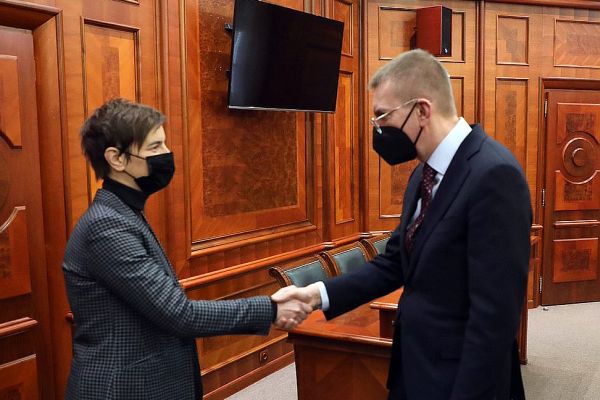 
|
|
|
| Conditions for entry of citizens of the Republic of Serbia into Sweden from January 21, 2022. years |
|
SWEDEN
As of 21 January 2022 citizens of the Republic of Serbia who have a digital certificate of EU vaccination (EU Digital COVID-19 Certificate), issued by the competent authority in Serbia, can enter Sweden and do not need a negative test for COVID-19.
Please note that some vaccines available in the Republic of Serbia are not accepted in the Kingdom of Sweden.
At the present time, accepted vaccines are only the vaccines in accordance with the ordinance EU 726/2004 or approved by WHO for use in emergencies (source - https://polisen.se/en/the-swedish-police/the-coronavirus-and-the-swedish-police/faq/#laws):
Comirnaty (COVID-19 vaccin BioNtech Tozinameran)
Spikevax (COVID-19 Vaccin Moderna)
Vaxzevria (COVID-19 Vaccin AstraZeneca)
COVID-19 Vaccin Janssen
COVID-19 vaccin AstraZeneca/SKBio
COVISHIELD (Serum Institute of India COVID-19 vaccin)
COVID-19 vaccin BIBP/Sinopharm
CoronaVac (COVID-19 vaccin Sinovac).
COVAXIN (COVID19 vaccine Bharat Biotec)
COVOVAX (COVID-19 vaccine Serum Institute of India)
NUVAXOVID (COVID-19 vaccine Novavax).
Please note that the list does not include the vaccine against COVID-19 Sputnjik V.
The following categories of the unvaccinated persons from non-EU countries, including Serbia, may be allowed to enter Sweden, only if they are included in the mentioned exemptions:
• children under the age of 18;
• people with long-term resident status in Sweden;
• people with imperative family reasons;
• people in the transport sector;
• seafarers;
• people covered by Chapter 2, Section 10 of the Aliens Act (2005:716), for example diplomats and consular staff stationed in Sweden, and their families and staff;
• people who have been invited in a separate procedure by the Government Offices;
• people in need of international protection or with other humanitarian grounds;
These persons do not need a negative COVID-19 test result. The Swedish Police Authority reserves the discretion right to decide in each case, especially if the conditions for entry into Sweden are not met. |
|
|
| Non working days |
|
The Embassy of the Republic of Serbia in Stockholm will be closed on Monday, 3 January, Thursday, 6 January and Friday, 7 January 2022 in observance of New Year and Christmas celebrations. The consular section of the Embassy will be opened only for urgent matters. |
|
|
| New regulations on entering the Republic of Latvia for the citizens of the Republic of Serbia |
|
All persons travelling to Latvia must fill out an electronic form on the Covidpass.lv website not earlier than 48 hours before entering Latvia and provide the requested information concerning vaccination, testing, or recovery from COVID-19.
Restrictions on entry to Latvia depend on the country the person is travelling from, as well as of proof of the fact of vaccination, testing or recovery from Covid19. The vaccination, testing or recovery from COVID-19 is confirmed using the interoperable EU COVID certificate (in a smart device, or in paper format) or Certificate of vaccination or recovery issued in USA, Australia and Canada.
Persons who enter Latvia fully vaccinated against COVID-19 in the USA, Australia, or Canada, can receive a short-term vaccination certificate for use in Latvia. The short-term certificate is valid only in the territory of Latvia, it is equivalent to an interoperable vaccination certificate and valid for 30 days from the day it is issued.
In order to restrict the spread of the Omicron variant of Covid-19, all air travellers entering the Republic of Latvia, including persons who have an interoperable vaccination or recovery certificate, is provided with a possibility to undergo free-of-charge COVID-19 testing in the territory of Riga International Airport.
Citizens of the Republic of Serbia with the interoperable EU Covid certificate (in a smart device or in paper form), proof of recovery from Covid19 or testing can enter Latvia if they fill out an electronic form on the Covidpass.lv website not earlier than 48 hours before entering Latvia. They don’t need self-isolation. The airport staff at the Riga Airport or a representative of the State Border Guard or State Police have the right to demand that the arrivals get tested.
Citizens of the Republic of Serbia without the interoperable EU Covid certificate are not allowed to enter Latvia for the purposes of tourism or for private reasons, since Serbia has been categorized as a high risk country.
To enter Latvia from the countries of high risk of infection is allowed to the citizens of Latvia, persons who have a regulated permanent residence in Latvia or a visa type D for a longer stay, with the operable EU Covid certificate and filling out the electronic form.
Persons who enter Latvia from the Republic of Serbia or persons crossing the Republic of Serbia in transit, meeting the conditions for entry into Latvia, are obliged to have a negative Covid19 test result, not older than 72 hours before entering Latvia or an antigen test not older than 48 hours, and to fill out an electronic form on the Covidpass.lv website not earlier than 48 hours before entering Latvia, containing a negative test result. They are also obliged to show their QR code (proof of the filling out the electronic form on Latvian website). After entering Latvia the person registers for a PCR test online and takes a test at their own expense at the nearest testing station within 24 hours. Until the test result is received, the person stays at their place of residence or at any of tourist accommodations indicated on the list of the Investment and Development Agency of Latvia.
The test is not obligatory for children under 12 years of age; employees, crew members of freight and passenger transport service providers, crews of passenger, freight, or technical voyages;seafarers and members of the merchant marine on their way to or returning from a ship; airline passengers who are crossing the territory of the republic of Latvia in transit, without leaving the airport terminals and can present proof of the next flight which takes place within the next 24 hours; the staff of foreign diplomatic and consular missions, international organisations and representations thereof accredited in Latvia, and their family members; persons arriving in Latvia on an invitation from the President, the Saeima, the Cabinet or its member, the Constitutional Court, the Supreme Court, the State Audit Office, or a ministry; diplomatic couriers of Latvia or foreign countries or ad hoc diplomatic couriers; holders of the diplomatic passport of the Republic of Latvia, technical personnel accompanying them, and the civil servants and employees of the diplomatic or consular service when performing the official functions.
From the entry ban are exempted:
- Citizens of EU countries and persons with a permanent residence permit in the EU, as well as members of their families,
- Foreign diplomats and members of their families accredited in Latvia or in transit through the territory of Latvia to the country of service or country of origin,
- Diplomatic couriers or ad hoc diplomatic couriers who present an official document specifying their status and the number of packages constituting their diplomatic pouch,
- Until the time when a certificate compatible with the interoperable certificate used in the European Union is devised in a respective country, a person entering from the United States of America, the United Kingdom, the Australian Commonwealth, New Zealand, or Canada shall attest to the fact of vaccination, recovery or testing with a valid interoperable certificate or other valid documentary proof of vaccination against or recovery from COVID-19, or a test for COVID-19.
- If a person who has the right to vaccination against COVID-19 paid in Latvia has been vaccinated against COVID-19 in a foreign country with a vaccine registered with the European Medicines Agency or a vaccine registered by equivalent regulators or recognized by the World Health Organization, not later than within a month of receiving the person’s application and documentary proof of vaccination performed in a foreign country, the National Health Service shall verify their authenticity and compliance with requirements for mandatory information included in the certificate.
17.01.2022 |
|
|
| New regulations on entering the Kingdom of Sweden for the citizens of the Republic of Serbia |
|
Due to the increased risk of the Covid-19 pandemic spreading, the Swedish Government recently introduced new regulations how foreign citizens could enter the Kingdom of Sweden. According the new decision of the Swedish Government, which is applied from December 28, 2021, the citizens of the Republic of Serbia (with the EU digital COVID-19 certificate issued in Serbia), can enter Sweden under the condition that they have as well a negative test result on Covid-19, not older than 72 hours from the time of sampling. The test is also mandatory for minors aged 12 to 18.
At the request of the Swedish Ministry of Health, the certificate of a negative COVID-19 test result must be in English, French, Swedish, Norwegian or Danish, and must contain the following:
- Name and date of birth of the person tested,
- Date and time the test was taken
- Disease or infectious agent, COVID-19 (SARS-CoV-2 or one of its variants),
- Type of test: antigen test, PCR test, LAMP test or TMA test,
- Negative test result,
- Name, telephone number and address of the institution that issued the certificate, or of the laboratory that conducted the test.
Persons coming for urgent treatment or for urgent family reasons may be exempted from the entry ban, with the presentation of evidence and a negative test result on COVID-19, not older than 72 hours. Also exempted from the entry ban into Sweden are persons with a residence permit in Sweden, employees in the transport sector, passengers in transit, diplomats accredited in Sweden, as well as persons who are invited by the Swedish authorities, who are also obliged to have a negative test result.
The new decision of the Swedish Government will be valid until January 31, 2022, when it is expected to be reconsidered depending on the epidemiological situation in the Kingdom of Sweden.
|
|
|
| Non working days |
|
The Embassy of the Republic of Serbia in Stockholm will be closed on Friday, 24 December 2021 and on Friday, 31 December 2021, in observance of Christmas and New Year celebrations. The consular section of the Embassy will be opened only for urgent matters. |
|
|
| Opening of cluster 4 important turning point for Serbia |
|
14 December 2021
Prime Minister Ana Brnabic stated in Brussels today after the Intergovernmental conference on the accession of the Republic of Serbia to the European Union (EU) that today is a very important date and a turning point for Serbia.
Brnabic said that in line with the new methodology, Serbia has opened cluster 4 – Green Agenda and Sustainable Connectivity, and within cluster 4, four chapters have been opened.
The Prime Minister underlined that this is a great success on which she wants to congratulate all citizens of Serbia and she thanked President of Serbia Aleksandar Vucic on the support and understanding he showed.
An important segment of the new methodology is political management of integrations. What we have done in the mandate of the new government is that we manage, together with Minister of European Integration Jadranka Joksimovic, the integration process and all reforms, first and foremost in the field of the rule of law, politically in full, and that yielded results, the Prime Minister said.
She said that the opening of the chapters is a huge motivation for further reforms in the field of the rule of law, public administration and the economy.
I would like to thank all EU Member States, as well as the European Commission, for their support and understanding. They have shown that they are open, that they are ready to see, to listen, to reward everything we have done and therefore this is a great motivation to continue, not even in the same way we have worked so far, but to go faster and to work better, she noted.
Brnabic voiced hope that Serbia will open cluster 3 in 2022, which is ready, and that preparations for the opening of cluster 5 are on the agenda.
The Prime Minister underlined that environmental protection is gaining importance and that this topic is increasingly present and important in Serbia.
Regional stability, dialogue with Pristina and the economy also remain our priorities. I am satisfied, and we talked about that today, about economic results Serbia is achieving. I expect our growth this year to be 7.5 percent, the Prime Minister pointed out.
She said that the degree of harmonisation of Serbia with the foreign and security policy of the EU currently stands at 65.55 percent.
Brnabic also thanked Slovenia for the successful EU presidency, she thanked EU Member States on their support, as well as the European Commission, European Commissioner for Neighbourhood and Enlargement Oliver Varhelyi and European Commission President Ursula von der Leyen.
Source: www.srbija.gov.rs
Photo: Tanju
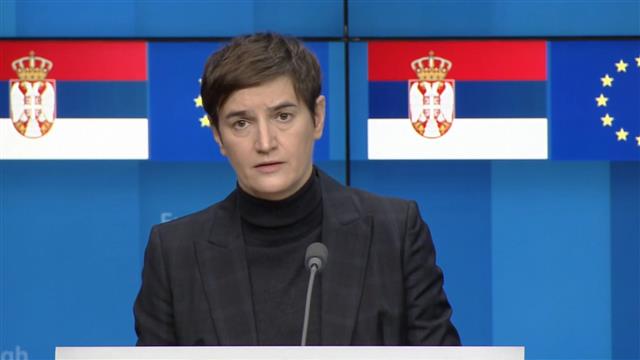 |
|
|
| Selakovic: We need to rely on multilateralism and the principles of the Helsinki Final Act |
|
Minister of Foreign Affairs of the Republic of Serbia Nikola Selakovic stated today in Stockholm, at the 28th OSCE Ministerial Council, that the participating States of that organization should adhere to the principles of the Helsinki Final Act and commit to the preservation of multilateralism.
The Serbian Foreign Minister stated that we needed to be ready for compromise in the process of eliminating or at least reducing security risks and that, in these efforts, multilateralism should be our most important instrument.
“With the outbreak of new and exacerbation of existing conflicts, as well as the constant emergence of additional challenges, the situation is becoming increasingly complicated. Despite our efforts over the years, further widening of the gap, lack of political will and of openness to engage in constructive and substantive dialogue have contributed to undermining the foundations on which this organization was built”, Selakovic said.
Recalling that the fiftieth anniversary of the adoption of the Helsinki Final Act was approaching, Selakovic emphasized that it should be borne in mind that this document, during the “Cold War”, set out ten fundamental principles for regulating relations between states and thus made the world a better and safer place.
“I am convinced that we should show greater responsibility for the future of the organization, political will and readiness for dialogue and compromises, while adhering to the principles and commitments arising from this important document, as well as those undertaken by participating in the work of the OSCE”, Selakovic said.
He noted that despite the challenges and accumulated problems facing the OSCE today, its solid foundations, developed mechanisms and flexibility clearly indicated that it remained an invaluable instrument of collective and comprehensive security.
He said that Serbia believed that the current initiatives and proposals regarding the future of the OSCE should be carefully considered and the best solutions adopted through dialogue and by consensus, which would contribute to strengthening the capacities and visibility of the organization.
Reflecting on the developments in Southeast Europe, Selakovic assessed that the OSCE still had a significant role to play there both in strengthening the democratic capacity and supporting further reforms in the region, and also in strengthening cooperation, and therefore the stability of this part of the European continent.
In the past two decades, he explained, Serbia made the most of the OSCE’s expert support in the process of comprehensive reforms of the society, while cooperating with the OSCE Mission in Kosovo and Metohija, which represented the most visible international status-neutral presence in the Province.
Minister Selakovic stressed that Serbia was committed to European integration and regional cooperation through concrete economic and infrastructure projects, because only through cooperation with neighbours with a readiness to respect the interests of all, can we reach sustainable solutions to the problems in the region.
“On the other hand, I would like to express my deep concern and regret over the security situation in Kosovo and Metohija this year, marked by an increasing number of ethnically motivated attacks and incidents targeting members of the Serb community, as well as institutional discrimination, attacks on religious sites of the Serbian Orthodox Church and undermining the economic sustainability of the Serb community in the Province”, Selakovic said.
The Head of Serbian diplomacy underlined that, despite the efforts that Belgrade made in the process of dialogue and the fact that it had fulfilled the obligations arising from the Brussels Agreement, the politicians from Pristina had shown no readiness so far to fulfill obligations of their own.
“Instead, they have been making unilateral moves, insisting on their agenda of the so-called statehood while refusing, for more than eight years, to implement the obligation to establish the Community of Serb Municipalities, which the Serb community in Kosovo and Metohija sees as a guarantee of its survival in the Province”, Selakovic warned.
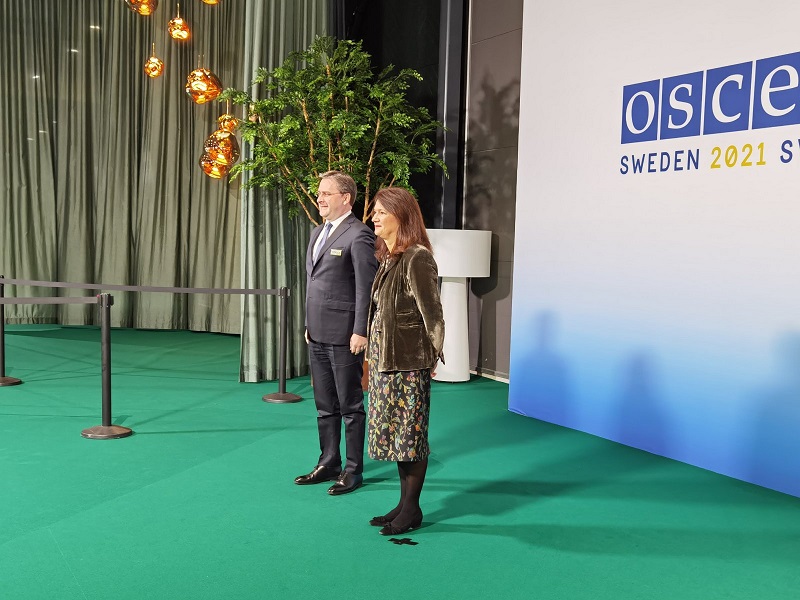 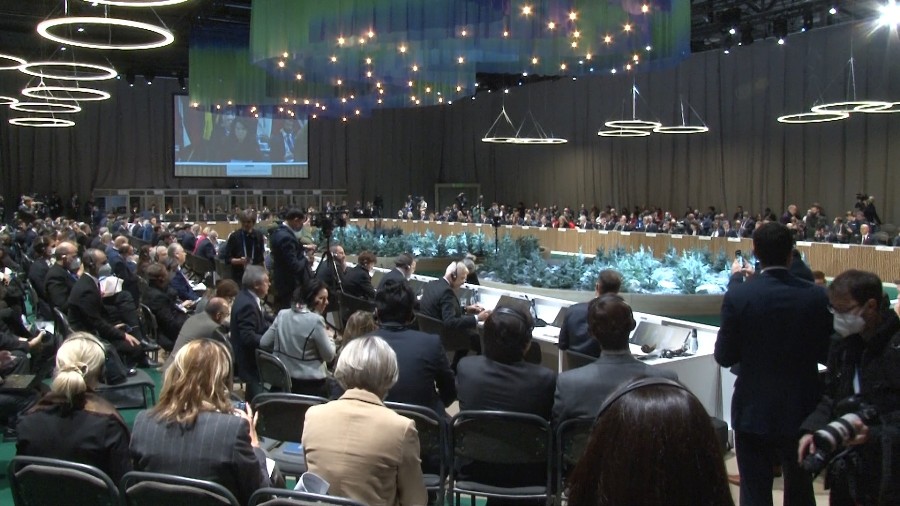 |
|
|
| Entry regime for the citizens of the Republic of Serbia to the Kingdom of Sweden |
|
Due to the increased risk of the spread of the Covid-19 pandemic, the Swedish government decided on 20 September 2021 to impose the entry ban to the Kingdom of Sweden for the Serbian citizens, which applies until 31 January 2022. There are exemptions from this entry ban, people in the need for urgent medical reasons or for urgent family reasons, who are obliged to present the necessary documentation and negative COVID-19 test result, not older than 72 hours.
Due to the new decision of the Swedish Government from 30 November 2021 persons who have an EU digital COVID-19 certificate issued in Serbia can enter Sweden without restrictions. Also, persons with a residence permit in Sweden, employees in the transport sector, passengers in transit, diplomats accredited in Sweden as well as those invited by the Swedish authorities are exempted from the entry ban. |
|
|
| Selaković spoke with Giaufret and EU ambassadors |
|
18. Nov 2021.
The Minister of Foreign Affairs of Serbia, Nikola Selaković, met with the Head of the Delegation of the European Union, Emanuele Giaufret, and the ambassadors of the EU member states accredited in our country.
Selaković emphasized that EU membership is an absolute priority of our foreign policy and strategic commitment, conveying that we are fully committed to the reform process and the improvement of all segments of our society.
He assessed that the dynamics of accession negotiations should be in line with our reform efforts, but that it is encouraging that this year's European Commission report on Serbia's progress has a more positive tone than the previous one, and that, in that sense, we expect that an Intergovernmental Conference will be held by the end of the Slovenian presidency of the EU Council, at which two clusters will be opened.
The Minister said that Serbia maintains an intensive dialogue with EU officials and added that we look very positively at the decision of the Foreign Affairs Council to consider a way to include partners from the Western Balkans in the discussion on foreign and security policy.
The head of Serbian diplomacy emphasized that the EU is Serbia's most important foreign trade partner, informing his interlocutors that the trade exchange between Serbia and the EU has increased by 52% in the last seven years, and the export of Serbian products to the EU increased by 64%, which is a joint result, as he assessed.
Selaković said that Serbia is fully committed to preserving peace and stability in the region through cooperation and open dialogue, emphasizing the "Open Balkans" initiative as a way to connect the region economically.
When it comes to the process of normalization of relations between Belgrade and Pristina, Minister Selaković said that our side is fully committed to dialogue, and that we have fulfilled our obligations, but that Pristina persistently avoids fulfilling its own, citing as an example that for eight and a half years nothing has been done regarding the establishment of the Association of Serbian municipalities. In addition, according to him, Pristina's unilateral moves on the ground, four in the last two months, further endanger peace and stability.
The Minister informed the heads of missions about the fight against the pandemic in Serbia, expressing readiness for further cooperation with partners from Europe and the world in the joint fight against the corona virus.
Ambassador Giaufret thanked the Minister of Foreign Affairs Selaković for the reception of the ambassador of the European Union in the Palace of Serbia. Ambassador Giaufret welcomed the current level of cooperation between the EU and Serbia in the field of common security and defense policy, as well as the important contribution of Serbia to EU missions and operations.
"We really hope that we will be able to further develop the harmonization of Serbia's foreign policy with the European Union", the ambassador said.
The EU Foreign Affairs Council had a strategic conversation on the Western Balkans on Monday, and a political dialogue on foreign and security policy was held in Belgrade two days ago, a couple of weeks after the publication of the Annual Report, Ambassador Giaufret pointed out.
"In the Foreign Affairs Council, there is broad support for the EU's strong engagement in the region and further joining the region in our foreign policy efforts. We had a good exchange of views on that today, and we will work on further integration of Serbia and the region at all levels", the ambassador concluded.
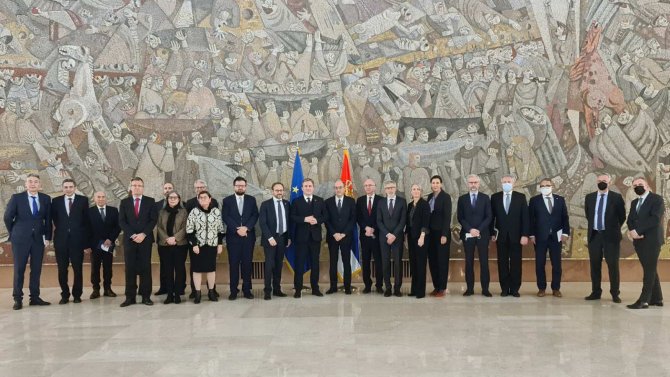 |
|
|
| Serbia expects support for opening clusters by end year |
|
12 November 2021
Prime Minister Ana Brnabic stated today in Paris that she expects positive news and support from France for opening one or two clusters at the intergovernmental conference to be held in December.
At the press conference, Brnabic stated that she talked with French President Emanuel Macron about the situation in Serbia, primarily in the context of European integration, i.e., whether we can count on the country's support for opening a cluster at the December intergovernmental conference.
We have two clusters ready for opening, so I expect positive news and support from France for one or both clusters, but certainly significant support, the Prime Minister said.
She pointed out that Macron told her to convey greetings to the President of the Republic, Aleksandar Vucic, and the whole of Serbia, as well as that he remembers his visit to Belgrade with great joy.
Today, I had good talks with the President of Cyprus, but also with the President of Slovenia, with whom I also talked about European integration, i.e., the country's support, which is clear and unambiguous for opening a cluster and further progress of Serbia towards full EU membership, regional relations and regional cooperation, said Brnabic.
She stated that she also talked with EU High Representative Josep Borrell in Paris.
There were interesting and good talks, it seems to me that we have done good things for our country and I expect it to continue today, the Prime Minister concluded.
Source/Photo: www.srbija.gov.rs
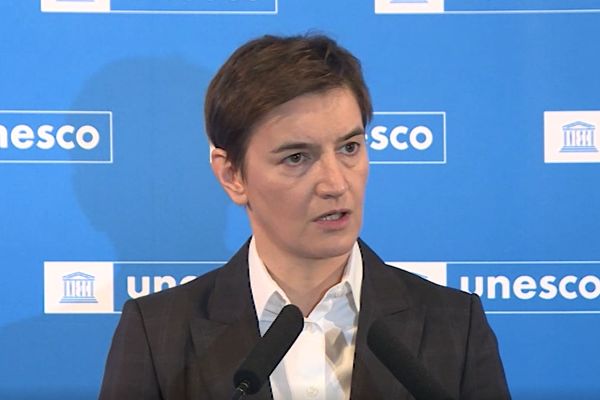
|
|
|
| UNESCO’s role extremely important for preservation of Serbian heritage in Kosovo and Metohija |
|
12 November 2021
Prime Minister Ana Brnabic stated today that severe examples of endangering the Serbian cultural, historical and spiritual heritage in Kosovo and Metohija are proof of the important role of UNESCO in protecting and preserving heritage.
At the 41st session of the General Conference of UNESCO in Paris, Brnabic emphasized that four jewels of the Serbian medieval cultural heritage in Kosovo – Visoki Decani, Pec Patriarchate, Gracanica and Bogorodica Ljeviska, have been preserved thanks to the fact that they are inscribed on the endangered world heritage list. Hundreds of other sites and monuments are endangered.
The Serbian heritage in Kosovo and Metohija is of immeasurable importance, not only for the national identity of Serbia, but also as a part of the esteemed European and world heritage, she underlined.
Source/Photo: www.srbija.gov.rs
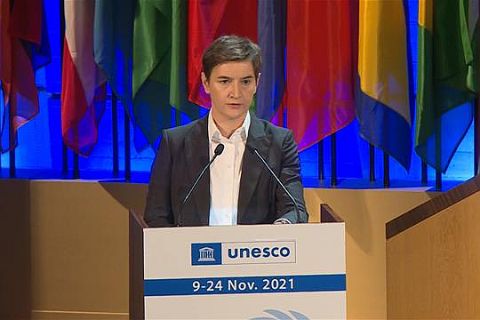
|
|
|
| Non-working day |
|
The Embassy of the Republic of Serbia will be closed on Wednesday, 11 November 2021 in observance of Armistice Day. The consular section of the Embassy will be opened only for urgent matters. |
|
|
| Address of the President of the Republic of Serbia at the United Nations climate change conference COP26 held in Glasgow |
|
2nd November 2021
"Your Excellences,
distinguished delegates,
dear Sarah,
At the very beginning, I feel obliged to thank Prime Minister Boris Johnson and Her Majesty’s Government for exceptional hospitality.
I feel privileged to represent the Republic of Serbia at this important place and at the highest-level world forum, in working on the most important topic of today – promoting climate awareness.
We all agree that we must make investment into climate and environment.
We all, likewise agree, that future generations must be educated in order not to repeat the mistakes we made, by hurting the only Planet that makes life possible.
I am very honoured that the Republic of Serbia is co-chairing this year’s Conference as a Non-EU representative of the Eastern Europe Group.
In concrete terms, we see the special contribution of our expert team in finalising negotiations on the implementation of Article 6 of the Paris Agreement, which refers to the establishment of the global market and non-market mechanisms for reducing greenhouse gas emissions, as well as to remaining provisions referring to advanced transparency framework and common timeframes for Nationally Determined Contributions, which are the key provisions of the Agreement that have not yet been covered by the decision that is to be adopted by the Conference, i.e. all member states.
We, therefore, believe that this is an exceptional opportunity for Serbia to give its full contribution to the finalization of negotiations, which, we hope, will secure full implementation of the Paris Agreement.
As a result of strong economic development, modelled for Serbia by 2050, the impact of the implementation of climate measures to employment will be optimal, through new jobs creation and creation of new industries which have not existed so far.
One billion euros was raised at the first green bonds auction in Serbia, which clearly confirms the trust of international investors in our green agenda, but also to the economic and political stability of our country.
Incomes from green bonds issuance will be used for financing renewables, energy efficiency, sustainable water management, prevention of pollution and circular economy development and biodiversity preservation.
And as you can see, dear friends, my people made a terrific speech for me, but I am going to add a few more words and a few more questions for those that are coming from big powers and that haven’t answered yet several questions:
Number one is: how are we going to finance all these activities?
We’ve heard the story of trillions of dollars that are at our disposal. My question would be: what would be the interest rate, what would be the terms for taking these amounts of money, and actually how are we going to tackle that issue?
Number two: how are we going to treat the nuclear power plants? Are we going to shut them all or are we going to build them more?
Then, how are we going to build more renewables if we already started endorsing populist movements against wind parks, new hydropower plants, and are we going to put in jeopardy the level of our public debt to GDP ratio if we raise huge amounts of money?
How are we going to treat natural gas, and how are we going to secure decent prices of natural gas and electricity power as well?
And, I came here using an electric car from Edinburgh to Glasgow. But, how are we going to do mining and refining of lithium, nickel, cobalt and many other very important minerals?
In the end, we all know what is our final aim, what is our final target. But, it’s not a fairytale – we’ll have to work a lot, we’ll have to be 100 per cent dedicated, and we’ll have to be more honest with each other.
The health of people living in Serbia depends directly on the implementation of this Agenda, just like the health and life of each living being on Earth depends on arrangements that will be reached here and on national implementation of the respective arrangements.
Perhaps it is the right time to listen and hear the cry of Mother Earth because if we lose this race against time, our children will inherit an irreparably polluted Planet.
Thank you very much for listening to me."
Source: www.predsednik.rs
Photo: Dimitrije Goll
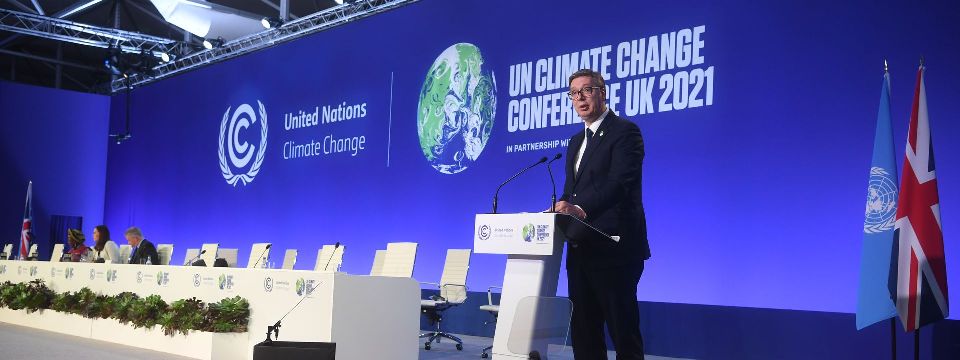 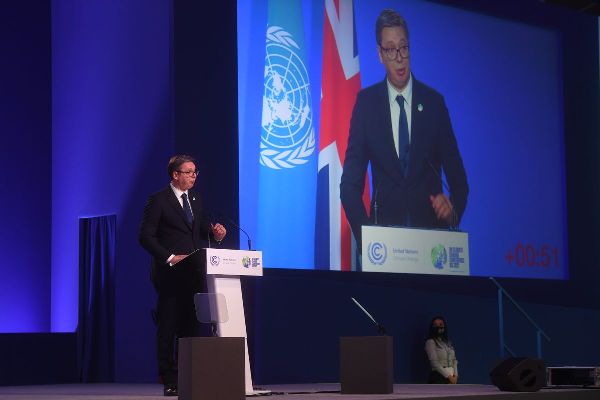 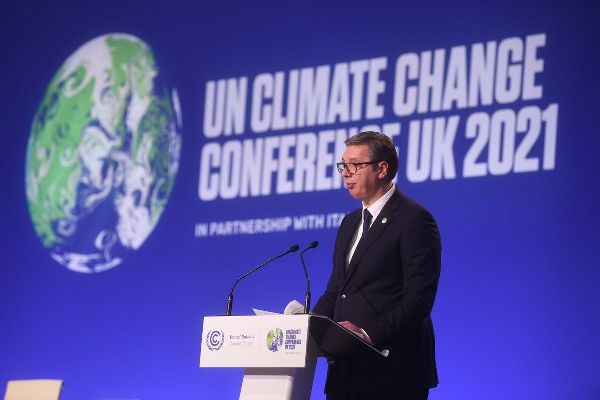
|
|
|
| INFORMATION |
|
The Embassy of the Republic of Serbia in Stockholm will be closed on 17 November 2021, between 8:00 and 13:00 due to the power outages caused by the maintenance work in the building.
|
|
|
| Continuous communication with EU on further reforms |
|
22 October 2021
Prime Minister Ana Brnabic, together with Minister of European Integration and Chief Negotiator Jadranka Joksimovic, met today with Head of the EU Delegation to Serbia Emanuele Giaufret and the ambassadors of the EU Member States.
The topics of the meeting were 2021 EU Enlargement Package and in particular the Report of the European Commission on Serbia for this year, as well as the next steps in the process of accession to the EU.
She underlined that Serbia has continuous communication with the Delegation of the EU and all Member States and that it speaks openly about further reforms, first and foremost in the field of the rule of law.
The Prime Minister assessed that this year’s Report on the progress of Serbia gives an objective evaluation of everything the Serbian government has achieved on speeding up the political and economic reforms, by which one of the strategic priorities has been fulfilled.
According to Brnabic, it is of particular importance that the European Commission has given a clear recommendation that Serbia reached the criteria necessary for opening two clusters of chapters.
Today we have an opportunity to present to you, as representatives of the EU and EU Member States, additional information on the adoption and implementation of all necessary reforms, the Prime Minister stated.
For this reason, it is important that this meeting is being held immediately after the release of the European Commission’s Report and before the final decision of the Member States on whether they will support the opening of clusters, she said.
Brnabic voiced her hope that these additional explanations will contribute to Serbia obtaining consent for the formal continuation of negotiations by the end of this year.
She also underlined that the European Commission’s recommendation for the further opening of clusters is very important politically, not only as an incentive to the government to continue implementing its reform plans with motivation and responsibility, but also to the citizens of Serbia and all in the region, who in this way receive once more a clear confirmation on the perspective of membership in the EU.
The Prime Minister pointed out that Serbia wishes to make additional progress in all areas, especially in the field of the rule of law and that continuous communication with the Delegation of the EU in Serbia and all Member States is of particular importance to that end.
Joksimovic stated that the Report provides the necessary balance in the evaluation of everything Serbia has achieved in the previous period.
According to her, in some segments the implementation of reforms is faster, in some other somewhat slower, but progress has been noticed in all areas and is noted down in the Report itself.
She voiced hope that the general assessments from the European Commission, which speak in favour of honesty, dedication and capability of the Serbian government to implement policies which are important for the accession process in time of pandemic, will be a sufficient orientation for the Member States to agree on the further opening of clusters.
Ambassador Giaufret expressed gratitude to the Serbian government for convening this meeting with ambassadors of the EU Member States, describing it as a positive indication of Serbia’s dedication to strengthening dialogue on reforms for the sake of solving priorities and necessary activities identified in the yearly Report of the European Commission.
Source/Photo: www.srbija.gov.rs
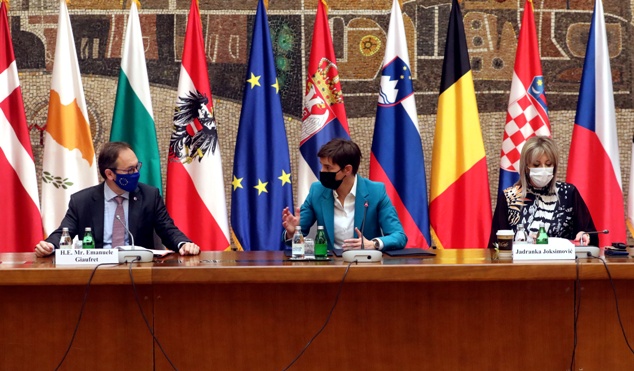 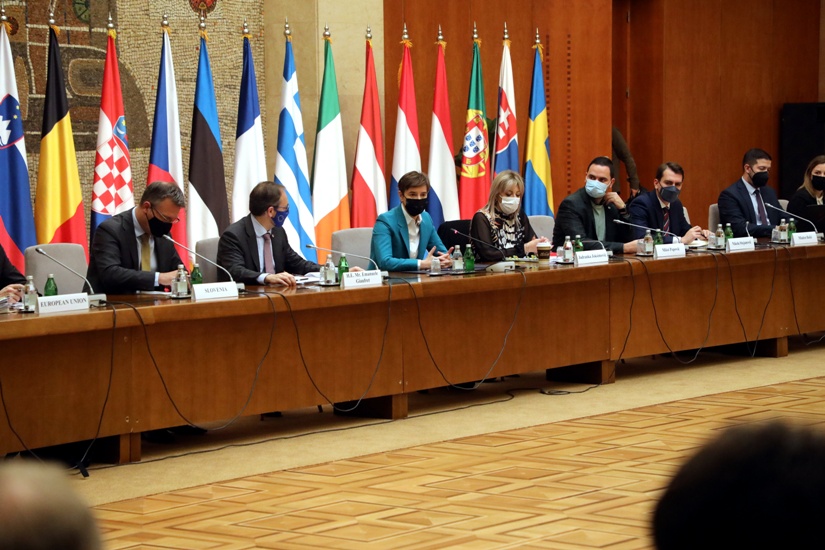 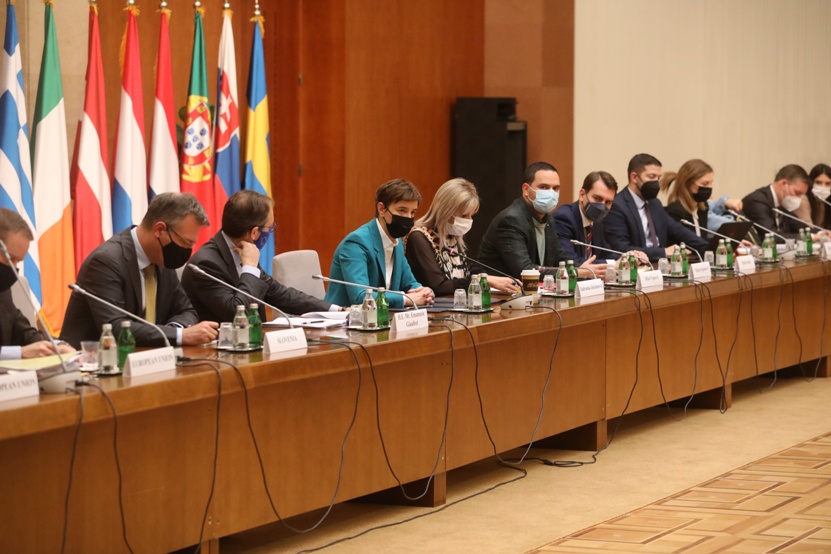 |
|
|
| Selaković in UNSC: Dialogue and the implementation of the agreements reached are the only right way to resolve all open issues |
|
15th October 2021
Distinguished President of the Security Council,
Esteemed members of the Security Council,
Distinguished Special Representative,
I would like to thank Secretary-General of the United Nations Mr. Guterres and Special Representative of the Secretary-General and Head of UNMIK Mr. Tanin for the report submitted and for their efforts made towards the implementation of the UNMIK mandate. I would also like to thank the members of the Security Council for the continued attention they have devoted to the issue of Kosovo and Metohija. The Republic of Serbia highly values the activities of the Mission of the United Nations in Kosovo and Metohija and supports it in carrying out its work as efficiently as possible, pursuant to the UN Security Council Resolution 1244, and undiminished in scope, aiming to build and preserve lasting peace, stability and security in the Province.
Mr. Tanin,
Please accept the expressions of our gratitude for your engagement and the cooperation we achieved during your term of office.
Mr. President,
Deep regret and concerns are raised by the fact that the security situation in Kosovo and Metohija in the past period has been marked by an increasing number of various ethnically motivated attacks and incidents targeting Serbs, which was also stated in the Report; that the provisional institutions of self-government (PISG) in Pristina continue to take unilateral steps and refuse to implement the agreements reached in the Brussels dialogue; and that institutional discrimination against Serbs, attacks on the sites of the Serbian Orthodox Church and the undermining of the economic sustainability of Serb communities in the Province have continued.
We are witnessing that dangerous provocations by Pristina are taking place every day, at an accelerated pace, thus seriously threatening the safety of Serbs in Kosovo and Metohija and directly violating the agreements and arrangements reached within the Brussels dialogue.
The latest violent incursion of the so-called ROSU units into the northern part of Kosovska Mitrovica, on 13 October, is the ninth incursion of its kind. Tear gas, shock bombs and unbridled violence are becoming a matter of everyday life for Serbs in the north of Kosovo and Metohija, and that must be stopped immediately.
In the last attack with firearms and chemicals used by Pristina special forces, 71-year-old Verica Djelic died as a result of chemicals used in the intervention, 10 unarmed civilians were wounded, one of them 36 years old Srećko Sofronijević was critically wounded in the back with of an automatic rifle. A three-month-old baby, who miraculously remained unharmed, was also the target of the shooting.
The false excuse for the latest unilateral action, as EU High Representative for Foreign Affairs and Security Policy Josep Borrell called it, was the fight against organized crime and smuggling. Ladies and gentlemen, Serbia is strongly against organized crime and smuggling, but the members of the UNSC should know that such an important and general global goal, which we all share, was cynically used for an armed attack on unarmed civilians, which began with an automatic rifle raid of pharmacies in which patients of Serbian and other nationalities are supplied with vitally important medicines. Four days before the local elections in Kosovo and Metohija, in order to gain votes in an irresponsible and inhumane way, fully motivated by separatist goals, the current PISG regime used medicines on which people’s lives depend to prove its position on the status contrary to UNSCR 1244.
Only a few days earlier, another provocation on the part of Pristina led to a dangerous crisis, when personnel of the so-called ROSU unit, armed with long firearms and reinforced with armoured vehicles, were deployed to administrative crossings between central Serbia and Kosovo and Metohija - Brnjak and Jarinje – in order to remove Serbian license plates and replace them with temporary ones, thus violently preventing the free movement of citizens.
These events do not fall within the reporting period covered by the latest Report of the UN Secretary General on the work of UNMIK, but it is incumbent upon us to address them on this occasion, in order to have everyone understand how dramatic the situation on the ground has been and how serious the consequences of Pristina's unilateral actions can be.
The incursions of heavily armed Pristina police formations, composed exclusively of Albanians, into the north of Kosovo and Metohija, under various pretexts and motives, with the use of excessive force, are provocations that have an extremely dangerous potential to destabilize the already sensitive security situation on the ground. The goal of the latest incursions of Pristina’s special force personnel into the north of the province was to provoke the Serbs and additionally intimidate them with a demonstration of force, as well as to provoke Belgrade to react hastily in some way.
It is obvious that with such moves Pristina aims to erase the 10 years of dialogue, which is the only way to resolve open issues. These provocations once again demonstrate that the provisional institutions of self-government in Pristina, not only do not intend to implement everything agreed in the Brussels dialogue, but that their goal is to completely deny dialogue as a means of resolving problems. An effective response to Pristina's lack of credibility and their dangerous play with fire, which could have unforeseeable consequences, cannot be provided by calling on "both sides" for constructiveness and restraint, which has long been a manner in public communication of some important factors in the international community. There is only one source of destabilization, it has a name – and that is the provisional institutions of self-government in Pristina - and after the events of 13 October, it is clear that it can and needs to be stopped by urgent and decisive action of the international community. It is now quite obvious that these are no longer sporadic and isolated provocations by Pristina, but that this is an organized campaign of ethnically motivated violence and discrimination against Serbs.
We also express our concern over the latest imposition of tariffs by Pristina on certain products originating from central Serbia, which was made public on 8 October. We remind you that the unilateral decision of Pristina to impose duties on products from central Serbia in November 2018 resulted in a de facto complete trade blockade and a long-term stalemate in the dialogue between Belgrade and Pristina. In contrast to Pristina, which persistently seeks to raise barriers towards central Serbia through unilateral acts, Belgrade is persistently and consistently working to liberalize the flow of people, goods, services and capital, which is the basic goal of our "Open Balkan" initiative. North Macedonia and Albania joined this initiative, but Pristina did not.
Distinguished members of the Security Council,
In the period from March to September this year, which is covered in the latest Report, close to 100 ethnically motivated attacks were carried out against Serbs, their private property, religious and cultural heritage sites. The increase in the frequency of attacks was accompanied by the strengthening of the intensity of ethnically motivated violence, which more and more often targets children, the elderly, women, the few returnees present there, as well as churches and other property of the Serbian Orthodox Church.
This systematically intensifies the ubiquitous sense of insecurity of the remaining Serbs, but also deters potential returnees, who are in fact being told that local Albanian communities can attack them with impunity and prevent them from returning to live in their own homes.
The most striking example of the position of Serbs in Kosovo and Metohija is the case of the displaced person Dragica Gašić, who moved into her apartment in the municipality of Djakovica again in early June. In that town – to which local Albanians proudly refer as a place forbidden to Serbs - Ms. Gašić, on her return, first faced physical and verbal attacks by citizens of Albanian nationality living there. Instead of being provided protection, that seriously ill woman then became a victim of institutional persecution as well, that the local self-government bodies and the police unleashed against her. Since this is a person who is the first and only Serb returnee to Đakovica after more than twenty years, it was to be expected that, at that moment, at least civil society organizations would attempt to protect her rights. However, NGOs from Djakovica soon joined the activities aimed at the expulsion Ms. Gašić, including those receiving funding from international donors for projects related to strengthening democracy and the rule of law.
I must also mention the latest attack on the house of the only remaining Serbian woman in the center of Pec, retired teacher Rumena Ljubić, whose windows were stoned twice in just 24 hours on 13 October.
Dragica's and Rumena’s fate is a frightening reflection of the real situation of human rights that almost every one of over 200,000 displaced Serbs and non-Albanians would face in Kosovo and Metohija - provided that they gather the courage to return to their homes in the Province after more than twenty years. I would like to remind you again that since 1999, only around 1.9% of internally displaced Serbs and other non-Albanians have achieved a sustainable return to Kosovo and Metohija.
Therefore, I believe that the aforementioned will encourage the members of the Security Council and the international presence on the ground to devote priority attention in the future
to the issue of the return of displaced persons, which is an important part of the UNMIK mandate under UN Security Council Resolution 1244.
I therefore thank the Secretary-General in particular for keeping this extremely important issue in focus and for calling again, in the conclusions of his Report, for the creation of conditions for the sustainable return of internally displaced persons and the sustainable reintegration of returnees.
Distinguished members of the Security Council,
Serbian medieval monuments in Kosovo and Metohija, including monuments that, due to their exceptional value but also constantly being subject to threats are inscribed on the UNESCO List of World Heritage in Danger, are still among the most endangered cultural heritage in Europe.
I wish to recall that there are over 1,300 Serbian churches and monasteries in Kosovo and Metohija. Attacks on Serbian cultural and religious heritage are at the same time attacks on the identity of Serbs in the Province and directly affect their sense of safety.
A striking example of disrespect for Serbian cultural and religious monuments in the Province is the case of the Visoki Decani monastery. The monastery, which has been the target of attacks and shelling several times since 2000, is still secured by KFOR forces due to being under a threat. It is faced with a series of hostile actions, and the perpetrators are not deterred by the fact that this is a World Heritage Site. Despite frequent declaratory statements, even the decision of the so-called "constitutional court" of the PISG in Pristina five years ago confirming ownership of Visoki Decani Monastery over 24 hectares, is not respected. We welcome the assessment made by the UN Secretary General in his Report.
Dear Mr. President,
The Republic of Serbia remains committed to finding a compromise political solution, as prescribed under Resolution 1244, which will ensure lasting peace and stability. We firmly believe that dialogue and the implementation of the agreements reached are the only right way to resolve all open issues.
As a state committed to the respect for international law and a member of the United Nations, Serbia opposes any attempt at establishing an artificial balance between the parties in the dialogue, as well as the relativization of responsibility for unilateral acts.
We note with concern that not even eight years after reaching the Brussels Agreement, the establishment of the Community of Serb Municipalities has not been initiated, although Belgrade has fulfilled all its obligations under that agreement.
There are also numerous and repeated examples of Pristina violating or obstructing agreements reached in dialogue, in the areas of energy, justice, freedom of movement and visits by officials.
One such example is the verdict sentencing Ivan Todosijevic to two years in prison, which is also pointed out in the Secretary General's Report. The Brussels Agreement was directly breached, which was also stated by the representatives of the European Union. With its conduct Pristina caused immeasurable damage to the reconciliation process in Kosovo and Metohija.
Despite the interpretation from the European Commission that this is a violation of the Brussels Agreement, because Todosijevic had to be sentenced by a panel consisting of the majority of judges of Serbian ethnicity, Pristina still does not take any action in this regard.
Pristina also continued with the practice of banning Serbian officials from entering the territory of the Autonomous Province of Kosovo and Metohija.
We believe that it is important that the international community, and especially the European Union, as the guarantor of the agreement, firmly insists that the provisional institutions of self-government in Pristina start implementing all the agreements reached.
Distinguished members of the Security Council,
As before, the Republic of Serbia remains fully committed to resolving the issue of missing persons, as also demonstrated through full cooperation with relevant international mechanisms as well as participation in the work of the Working Group on Missing Persons. We expect that the representatives of the provisional institutions of self-government in Pristina will fulfill their obligations.
Bearing in mind everything I delivered here today in my address, we hold the position that the international presence in Kosovo and Metohija, pursuant to UN Security Council Resolution 1244, is still necessary. In addition to UNMIK, the presence of KFOR as the main guarantor of security and EULEX, due to its engagement in the field of the rule of law, is also important. I would like to emphasize once again that Serbia fully supports respect for international law, comprehensive implementation of UN Security Council Resolution 1244 and activities of UNMIK in an undiminished scope and with adequate financial resources, so that the Mission fulfills the mandate entrusted to it under the Resolution.
Thank you.
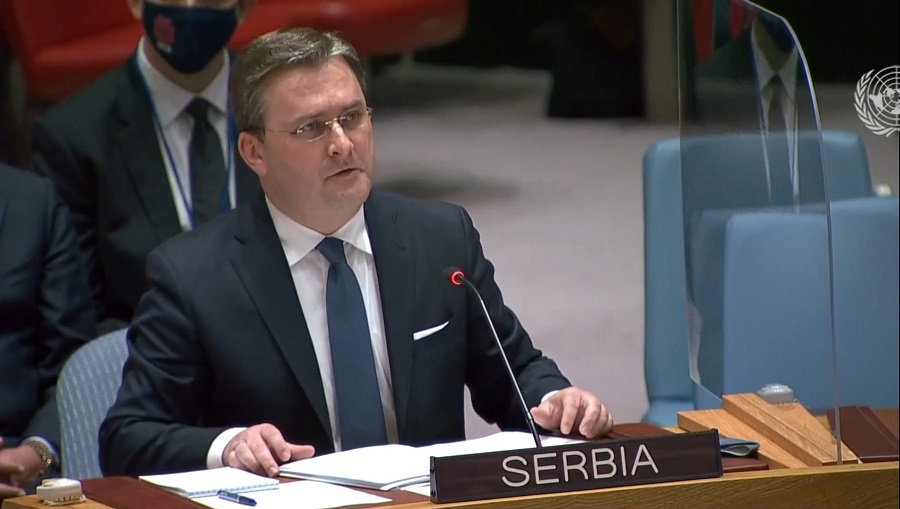
|
|
|
| Serbian Ambassador to Sweden Dragan Momčilović and Deputy Head of Serbian Delegation to IHRA Jovana Marić participated at the Malmö International Forum on Holocaust Remembrance and Combating Antisemitism, on 13 October 2021. |
|
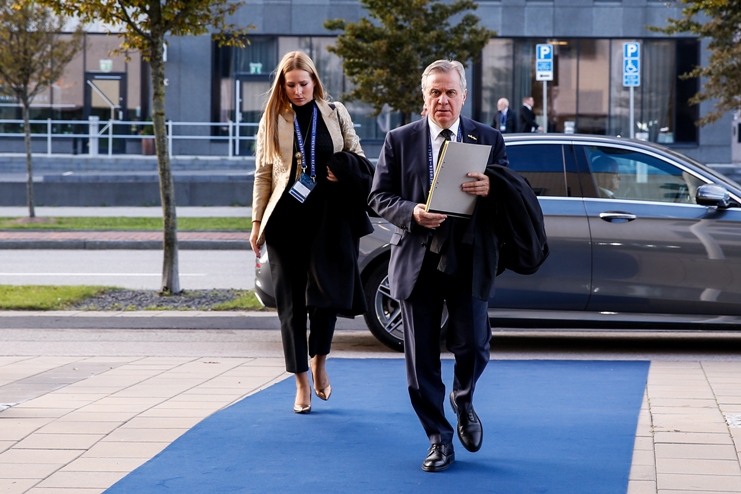 |
|
|
| Serbian Ambassador to Sweden Dragan Momčilović attended the opening ceremony of the Malmö International Forum on Holocaust Remembrance and Combating Antisemitism, hosted by Swedish Prime Minister Stefan Löfven, on 13 October 2021. |
|
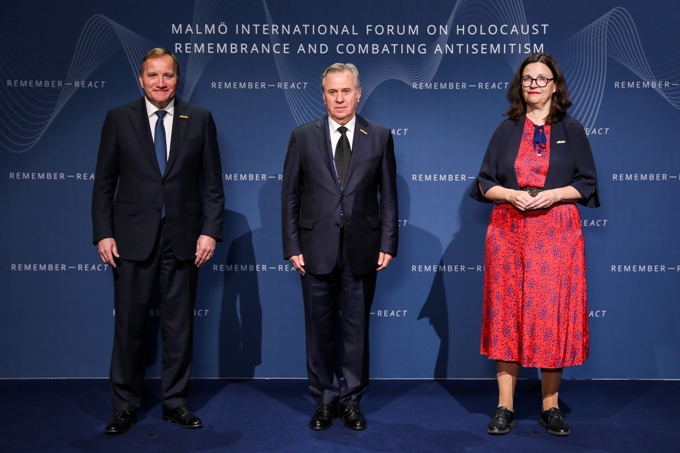 |
|
|
| Selaković: Belgrade is your home |
|
Today, at the closing of the commemorative meeting of the Non-Aligned Movement, the Minister of Foreign Affairs of Serbia, Nikola Selaković, thanked all the participants who came to Belgrade, the birthplace of that movement, and told them that they should feel at home in Belgrade.
Minister Selaković said that the participants of the conference made us proud with their arrival and participation, and that he personally felt the energy of the meeting, good will and a call to action.
“Thank you for coming to Belgrade, for contributing to something that demonstrates a stronger part of humanity, because we are nations that are freedom-loving, respecting of the values defined in the UN Charter and committed to the principles of Bandung and the Belgrade Declaration from 60 years ago, said Minister Selaković.
The head of Serbian diplomacy especially thanked the Minister of Foreign Affairs of Azerbaijan, Jeyhun Bayramov, with whom he worked on organizing the meeting of the NAM on the occasion of the 60th anniversary of the first conference of that movement, which was also held in Belgrade.
“We have shown solidarity of which we need much more to connect us in the future. Thank you for coming to Belgrade, this is your home. Belgrade is the birthplace of the movement and it is something that will remain forever”, said Minister Selaković.
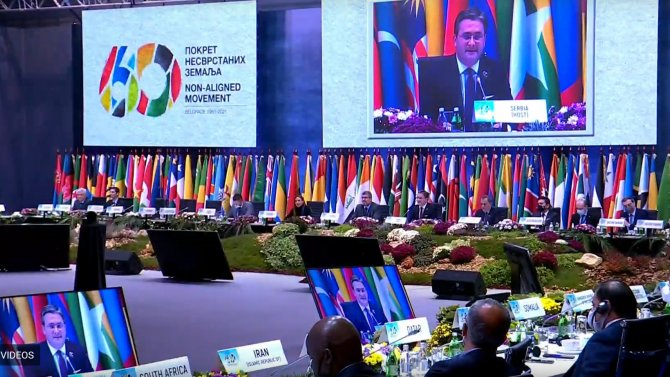 |
|
|
| Exceptional cooperation of Serbia with UN |
|
Belgrade, 11 October 2021
Prime Minister Ana Brnabic met today with President of the 76th session of the United Nations (UN) General Assembly Abdulla Shahid.
At the beginning of the meeting, Shahid praised Serbia’s activities on the donation of coronavirus vaccines to the countries in the region and to African countries, which he sees as an extraordinary act of tolerance and solidarity.
Brnabic underlined that the Republic of Serbia has exceptional cooperation with the UN, which is getting improved year in year out.
The interlocutors noted that the General Debate in the UN Assembly, held in New York last month, at which the Serbian Prime Minister took part, was a great opportunity for the whole world to hear about the challenges which some countries around the world face.
Both sides agreed that the most topical issues in the world at the moment are climate change and the fight against the coronavirus pandemic, with an emphasis on the even distribution of vaccines to all countries of the world.
Shahid underlined that one of the UN priorities during the 76th session, which he presides, is the empowerment of girls and women, with the aim of reaching full equality with men in the whole world.
Both sides agreed that Serbia is an excellent example given that ten ministries have women at their forefront and that almost 40 percent of Serbian MPs are women.
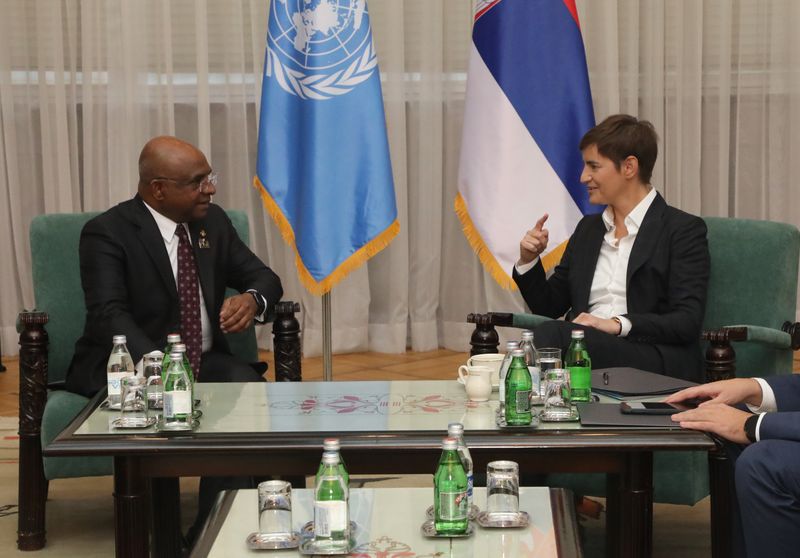 |
|
|
| Selakovic hosts dinner for ministers of NAM member states |
|
Oct 10, 2021
Serbian FM Nikola Selakovic on Sunday hosted a ceremonial dinner for foreign government ministers who will attend the 60th anniversary summit of the Non-Aligned Movement (NAM) in Belgrade.
The dinner was attended by more than 30 foreign guests, heads of delegations in the rank of ministers, as well as by Serbian government ministers.
In his opening speech, Selakovic welcomed the foreign delegations to the birthplace of the NAM.
“Although the world is not the same as six decades ago, we share the same values and want to pay a tribute to the glorious moments of our shared history,” said Selakovic.
The Serbian minister wished the guests and their countries and peoples health, happiness and wisdom in a time when the world is facing growing challenges.
“I hope that, on the basis of friendship, cooperation and the values embodied in the Non-Aligned Movement, we will be able to overcome all the adversities that are ahead of us,” Selakovic stressed.
Besides Selakovic, the dinner was attended by Serbian ministers Maja Gojkovic, Aleksandar Vulin, Jadranka Joksimovic, Tatjana Matic, Tomislav Momirovic, Branko Ruzic, Vanja Udovicic and Branislav Nedimovic.
Before the dinner in the Geozavod building, Selakovic presented to the guests the Belgrade Waterfront project, which he said was the new face of the Serbian capital and the engine of its development.
Source: Tanjug
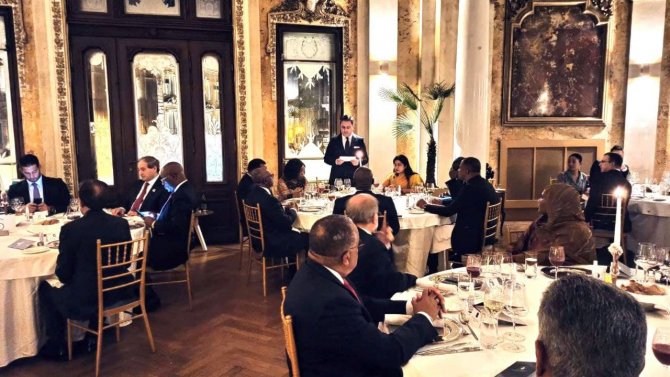 |
|
|
| NAM has returned to its birthplace |
|
Oct 10, 2021
Serbian FM Nikola Selakovic says the October 11-12 60th anniversary summit of the Non-Aligned Movement (NAM) will mark a return of the organisation to its “birthplace.”
In an interview published by Politika on Sunday, Selakovic noted that it could already be said the summit would be very successful, with officials of over 100 countries, including more than 40 FMs, to meet in Belgrade despite the coronavirus pandemic.
“They are the representatives of the very same countries that, to a considerable degree, associate the former Yugoslavia with Tito and Belgrade. Tito is no longer alive but Belgrade remains a symbol of the struggle for the freedom of that part of the world,” Selakovic said.
The policy of Serbia, which is primarily focused on EU membership, is not oblivious to traditional partnerships and friendships, Selakovic said, noting that, besides close ties with Russia and China, Serbia also maintained relationships with countries in the Middle East, Africa, Asia and Latin America.
Source:Tanjug
|
|
|
| President Vučić received the credentials of the newly appointed Ambassador of the Kingdom of Sweden |
|
4 October 2021
The President of the Republic of Serbia, Aleksandar Vučić, received the credentials from the newly appointed Ambassador of the Kingdom of Sweden, Annika Ben David today, welcomed her and wished her success in nurturing relations between the two countries.
President Vučić expressed satisfaction that, at the invitation of the Swedish Prime Minister Löfven, he would participate in the International Forum on Holocaust Remembrance and Combating Antisemitism in Malmo, hoping that he would then have the opportunity to discuss bilateral relations with Swedish officials.
President Vučić and Ambassador Ben David agreed that the priority for the two countries should be to strengthen political dialogue and various forms of cooperation, with special emphasis on economic relations. President Vučić expressed hope that in the future there could be an increase in investments of Swedish companies in the Serbian economy.
The President of Serbia thanked Sweden for its readiness to support Serbia's European path. In this regard, Ambassador Ben David pointed out that her country supports EU enlargement, and that she is ready to share the experiences necessary for reforms in various areas on the European path. She also stressed that Sweden is Serbia's first donor for environmental reforms.
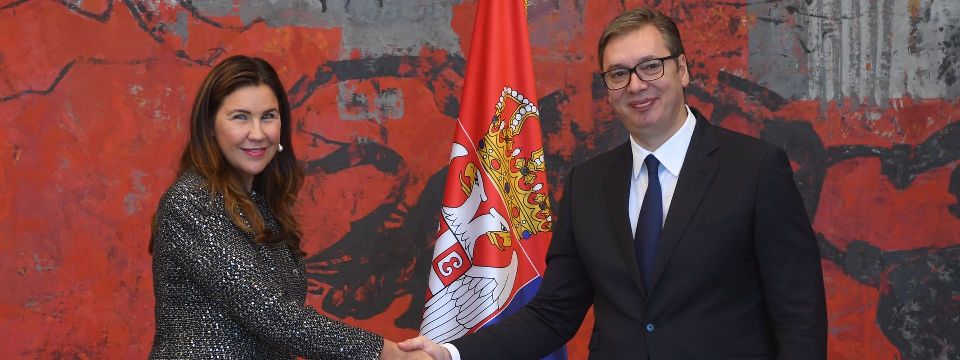
Source/Photo: www.predsednik.rs |
|
|
| President Vučić attended ceremony of the beginning of works on the modernization and rehabilitation of the Niš-Brestovac railway |
|
The President of the Republic of Serbia, Aleksandar Vučić and President of the European Commission, Ursula von der Leyen, have attended today the ceremony of the beginning of works on the modernization and rehabilitation of Niš-Brestovac railway at the international Corridor 10 as well as signing of the agreement between the Public Company Koridori Srbije and Consortium STRABAG AG and STRABAG d.o.o. Beograd on the construction of the first phase of the Highway of peace in the section Merošina – Merošina 1.
“In Donje Međurovo the 23km long railway is build and 75 percent of it will be financed by the European Union. It is enormous money for us, great encouragement and respect. This railway and highway are important both for us and Europe. I am very grateful to Mrs Von der Leyen for coming to Niš today and Niš becomes the center of all Balkan corridors, it becomes the Balkan crossroads”, said President Vučić adding that Serbia was entirely committed to the implementation of the agreements signed so far under the auspices of the EU.
“We will do our best not only to preserve peace, but also to reach more agreements which would mean security of everyone in the Balkans and better life and economy for all of us. We know what our job is. As much as we can, taking into account the difficulties due to the relation with Priština, we will do everything to make progress on the European path”, said President Vučić and thanked the President of the European Commission for kind words and wish to see Serbia in the EU.
The President of the European Commission, Ursula von der Leyen, emphasized that today Serbia had already gone a long way to the EU membership, it had made an incredible progress and efforts in the past years and improved conditions in different sectors. She said that she strongly supports the European integrations of Serbia.
“This is a very special moment. Signing of this agreement is a symbol of our great cooperation and projects of connections through which we jointly build our European future, because the future of Serbia in the European Union is better. The corridor connects Serbia to Austria and Greece and is really the driving force of economy. It is the driving force for the Serbian economy, investments, the economic plan which already functions in Serbia”, said the President of the European Commission.
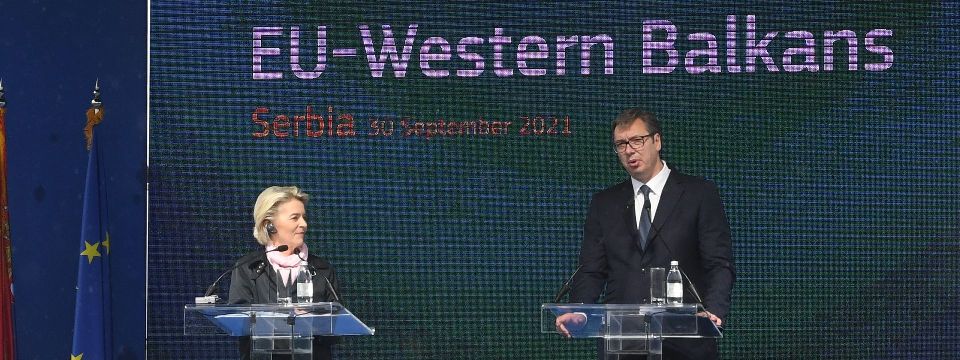 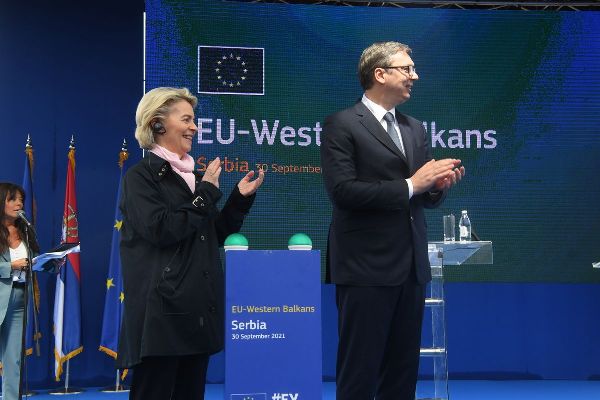
Source: www.predsednik.rs
Photo: Dimitrije Gol
|
|
|
| We expect support of Latvia on our path to EU membership |
|
24 September 2021
The Minister of Foreign Affairs of Serbia, Nikola Selaković, has met in New York today with the Minister of Foreign Affairs of Latvia, Edgars Rinkevics.
The Ministers exchanged experience of the two countries in the fight against the coronavirus pandemic and efforts to bring economy back to normal course as soon as possible.
Selaković stated that the cooperation of our countries was good and that there was a mutual interest of Serbia and Latvia to intensify economic relations, which at this point were at the level below objective potentials of two economies.
Minister Selaković informed his interlocutor on reform processes in Serbia as well as economic results in the previous period of seven years, emphasizing that our country had achieved great progress in the field of the rule of law, which we expected would be recognized and valorized.
The Serbian Foreign Minister said that he expected Latvia to have an objective attitude when it came to the valuation of reform processes in Serbia and that it would provide support to Serbia in the realization of the key strategic goal, that is, full EU membership.
Mentioning the issue of Kosovo and Metohija, Selaković said that, apart from the difference in their stances, he hoped that Latvia, as the country which is a consistent fighter for the rule of law and stability in Europe, would support the process of seeking peaceful and compromised solution in the dialog of Belgrade and Priština.
Selaković informed the interlocutor about the latest attempts of Priština to destabilize the situation in the field as well as with the fact that the current government of temporary self-government institutions publicly refuses to implement reached agreements in the Brussels dialog with the mediation of the EU.
The interlocutors discussed also the cooperation in multilateral organizations and agreed that political consultations of the ministries of foreign affairs should continue.
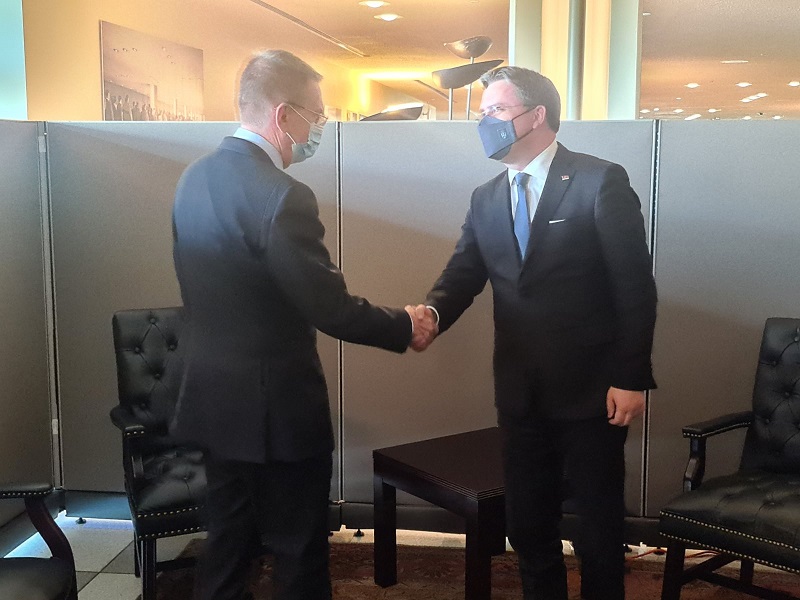 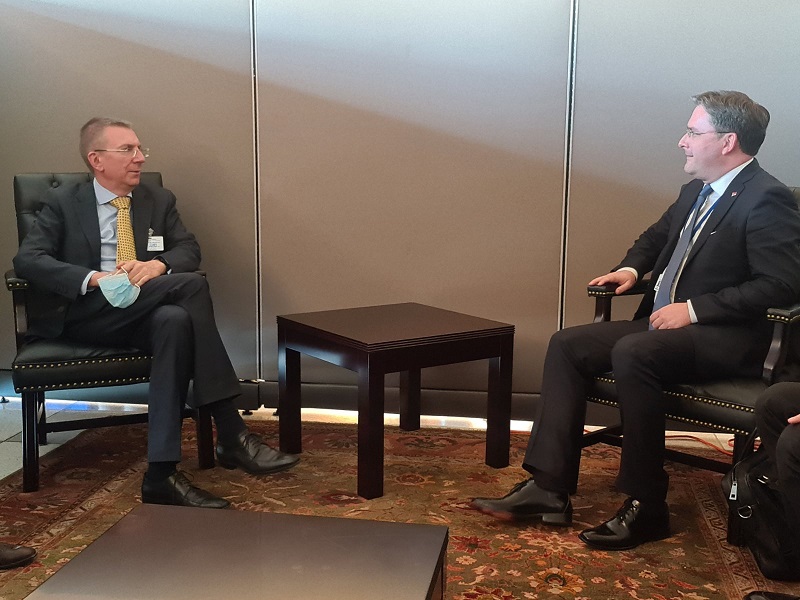 |
|
|
| Telephone conversation of President Vučić and General Secretary of NATO |
|
26 September 2021
The President of the Republic of Serbia, Aleksandar Vučić, has discussed today by phone with the General Secretary of NATO, Jens Stoltenberg about, as the General Secretary said, worrisome situation in northern Kosovo and Metohija.
President Vučić said that Serbia had not violated either Brussels Agreement or Resolution 1244 by anything, by any single move or in any manner jeopardized peace preservation.
“The complete occupation by armored vehicles of northern Kosovo and Metohija has lasted for seven days and it is conducted by Priština and everyone in the international community “are thunderously silent”, said Serbian President. “However, everyone is worried all of a sudden when they spot Serbian helicopters and airplanes at the territory of central Serbia, because apparently they should not exist, or should not take off until they receive the approval from Kurti or someone from the international community”, says President Vučić.
Serbia observes all international agreements it signed, Serbia will always conduct responsibly and seriously, but Serbia is still asking when the formation of SMC will start and when Kurti’s armored units will be withdrawn from northern Kosovo and Metohija.
Finally, with the gratitude to General Secretary Stoltenberg for the fair relation and wish to listen to the Serbian side, President Vučić asked about the norm and international regulation violated by Serbia? Today, yesterday or any time?
The two interlocutors agreed to stay in constant touch due to necessity of the preservation of peace and stability in the entire region.
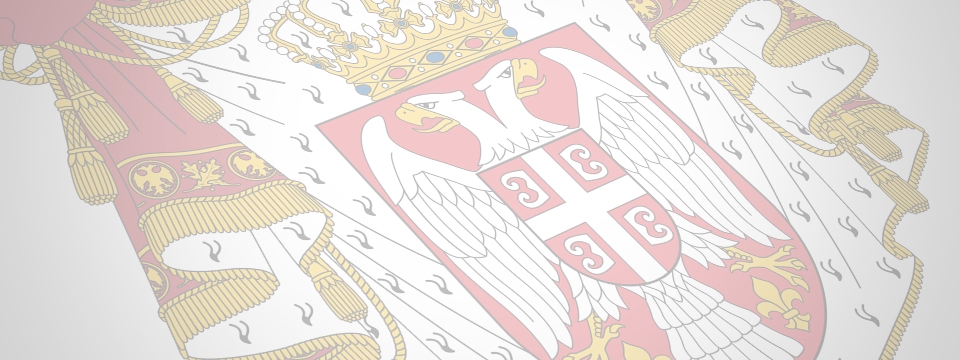
Source/Photo: www.predsednik.rs |
|
|
| Selaković in New York with 28 foreign ministers on economic successes of Serbia and K&M situation |
|
25 September 2021
The Minister of Foreign Affairs of Serbia, Nikola Selaković, has stated that in New York he introduced foreign ministers of 28 countries to economic success of Serbia but also to the situation in Kosovo and Metohija, which he also discussed with the Russian Minister of Foreign Affairs, Sergey Lavrov, who told him that we could count on the support of the Russian Federation, with regards to Serbian interests in K&M.
Summarizing results of his visit to New York within the session of the UN General Assembly, Minister Selaković says that one of the last meetings was with Minister Lavrov, which was their third meeting in the previous nine months.
The Serbian Foreign Minister says that he surely used this opportunity, too, to introduce Minister Lavrov to the latest events in northern Kosovo and Metohija, the situation of the dialog between Belgrade and Priština and very clear and unambiguous attitude of President Aleksandar Vučić regarding the continuation of the dialog and subsequent events in K&M.
“We discussed the principled support of the Russian Federation, which is constantly present not just in Moscow, Belgrade, in the field, but also here in the East River, by the delegation of the Russian Federation as the permanent member of the UN Security Council. Of course, we will continue to maintain this type of dialog. What Minister Lavrov said was that we could count on the support of the Russian Federation in future with regards to our interests in K&M”, highlighted Minister Selaković.
He said that he had had the opportunity in New York to hold 33 meetings, of which 28 with ministers of foreign affairs, whom he had introduced also to topicalities related to the latest events in Kosovo and Metohija, but also to our principled position regarding the observance of the international public law, territorial integrity and sovereignty.
Minister Selaković said that his colleagues at the meetings had praised the substantial and fantastic success of Serbia in the consolidation of the economic sphere and transformation of what had been on the edge of collapse and economic disaster seven years before to the fastest growing economy in Europe, which Serbia was in the past two years.
He said that most of his interlocutors had supported our reforms and expressed great respect toward what President Aleksandar Vučić and Serbia had done in the previous period.
Many of them, says the Serbian Foreign Minister, showed great interest in the manner in which Serbia organized the figth against Covid 19.
“It was a great pleasure and pride to represent the Republic of Serbia in all these meetings. Many of my colleagues confirmed their arrival to Belgrade to the Conference on 11th and 12th October, which is dedicated to the 60th anniversary of the foundation of the Non-Allied Movement”, said Minister Selaković.
He emphasized that it was not just the evidence of how much they had cared to come to Belgrade to the conference, but also to see and witness the Serbia which after several decades of attempts to fight different challenges rose to its feed, was economically consolidated and turned towards its traditional friends.
“That is a great deal and our country will surely during October be one of the spots on Earth of greatest importance for multilateralism, for cooperation among the countries which share the same values, the values entered into the UN Charter and which are based on the promotion and fight for peace, equality, observance of the international public law and rights of every country to pursue its path to happiness and better and more ordered society in compliance with the wishes of its population”, said Minister Selaković.
He said that the Minister of Foreign Affairs of Azerbaijan, Jeyhun Bayramov, would come to Belgrade to the conference on the occasion of the Non-Allied Movement adding that we had strategic cooperation with Azerbaijan and frequent contacts.
“We agreed to realize as soon as possible after the Belgrade conference his bilateral visit to Serbia”, added Minister Selaković.
He said that it had been agreed to intensify the cooperation and finalize the agreements which should be signed and after that realized when the meeting of Serbian President Aleksandar Vučić and Azerbaijan President Ilham Aliyev took place.
Minister Selaković says that the Ministry of Foreign Affairs had recently received its sector for economic diplomacy and there were great expectations from it and one of the tasks was to deepen the cooperation with Azerbaijan.
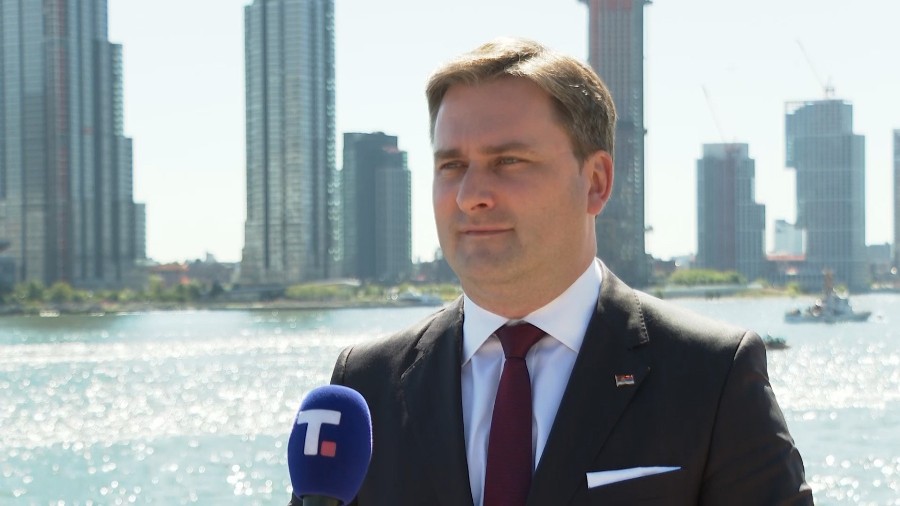
|
|
|
| Pristina seriously jeopardised regional stability |
|
25 September 2021
Prime Minister Ana Brnabic warned today that Pristina has seriously jeopardised local and regional stability after sending heavily armed special units to the north of Kosovo who are exerting ` against the peaceful Serbian population.
Brnabic spoke at the general debate of world leaders, as part of the 76th session of the UN General Assembly in New York.
We bring the Prime Minister's speech in its entirety:
Mr. President,
Mr. Secretary General,
Excellencies,
Ladies and gentlemen,
I have the great honor to address you today on behalf of the citizens of the Republic of Serbia.
Esteemed Excellencies Mr. Abdulla Shahid, Mr. Volkan Bozkir and Mr. António Guterres, I would like thank you for the active engagement, dedication, and leadership you have shown during these difficult times for the United Nations and all of humanity.
Serbia shares your conviction and we remain fully committed to supporting your efforts.
This year, we come together at a decisive moment in our history.
Covid-19 has shaken our foundations to the core.
At the same time, we are increasingly witnessing and experiencing effects of climate change.
And, finally, we are seeing significant shifts in global partnerships and alliances, trade wars between traditional partners and allies, protectionism instead of openness and free market, and overall uncertainty at an unprecedented scale.
Some of the pressing and extremely emotional issues that we have locally, in the Balkans, are still unresolved and while we are trying – and Serbia is especially dedicated to this – to change the future by working together and creating alliances, through initiatives such as the Berlin process or Open Balkan, others are trying to disrupt these processes, and instead of focusing on the future, they want to recreate the past – whatever the cost of that may be.
But, let me start with COVID:
COVID-19 pandemic has exposed critical weaknesses in the architecture of global governance. It has threatened to erase the progress many nations have achieved in recent years.
It has placed nations at a junction between isolation and collaboration, between panic and hope, between chaos and order.
The pandemic questioned some of the basic tenets of the open and cooperative international order.
Global exchanges, international communication, cross-border trade have all seen a vast decrease.
Curfews, restrictions on freedom and lockdowns of entire societies have created uncertainty in many segments of the individual lives of our citizens or – for that matter – our own individual perception of what freedom in today’s world even means.
For Serbia, this pandemic threatened to undermine everything we have been doing for the past 7 years, to crush all of the results and accomplishments of difficult reforms we initiated in 2014, and to propel us back to the times of high unemployment, rising public debt, uncontrollable deficit, and overall desperation.
Much as in any other country, COVID-19 has tested our nations’ resiliency and, this time, unlike during the global financial crisis – which was of much more limited scope and incomparable in consequences to COVID-19 pandemic – Serbia stood strong.
The reforms we undertook in the pre-COVID times made us more resilient than ever.
The fiscal consolidation, the budget surplus we had, efficient and predictable investment environment, became a lifeline that saved us from a recession during the pandemic and one that ensured we could support our citizens and our economy during these, most difficult of times.
Despite the effects of the crisis, Serbia has managed to preserve financial and economic stability. In 2020, we recorded a decline in GDP of only 0.9% – one of the best results in Europe. Our public debt remained below 60% of our GDP, average salary continued to grow by almost 10%, while despite the pandemic the number of people employed increased by over 3%.
The recovery in this year has been stronger than expected – our GDP will grow approximately 7%, and perhaps even stronger.
Prior to the pandemic, we have opened our borders to investment, technology, and ideas, and we managed to create peaceful and stable environment that allowed us to pursue rapid domestic transformation, with innovation and knowledge-based economy as the foundation.
The innovative advances we had made allowed us to diversify our capabilities when the virus hit – through e-Government, online education and digital textbooks, or central software system for a successful vaccination rollout.
We invested heavily in health infrastructure and strengthened the health system in order to respond to the current crisis, eternally grateful to the health care workers for their dedicated struggle.
Our decision to put geopolitics aside, and people at the center of our policies, is the reason we were able to acquire vaccines quicker than most other nations.
We did not discriminate between manufacturers, did not care whether vaccines are from the East or from the West, but chose to negotiate with all vaccine manufacturers deemed safe by regulators. This openness gave us the ability to purchase vaccines from around the world, giving our citizens the unique freedom to choose which vaccine they prefer.
Excellencies,
Serbia believes in solidarity between nations, multilateralism and helping others when in need.
Since the beginning of this year, we have made it our mission to support our neighbors, and all those in need, with COVID-19 vaccines and we have also allowed foreign nationals to come to Serbia to receive the vaccine which will protect their lives.
In total, Serbia has donated or allocated over a million doses of vaccines – of which 230.000 doses to the region; 300.000 doses for foreign nationals which came to Serbia to get vaccinated; and additional 570.000 doses to countries of Africa and Asia.
We will keep doing so, to the greatest extent possible, and until COVID-19 is behind all of us.
That is why we have also taken steps to acquire the technology to produce at least two types of COVID-19 vaccines to help improve global access so we can all be safe and victorious.
However, as stated by dignitaries of some of the largest nations during this General Assembly, there are other pressing issues that all of us need to keep addressing without any delay and in a bold manner – and that is climate change.
Serbia has redoubled its efforts to make our country safer and cleaner for its citizens, and by doing so, contribute to the fight against climate change and for environmental protection.
We are strongly committed to the implementation of the sustainable development goals and the Paris Agreement on Climate Change. We are committed to global efforts and will continue to work actively to meet our obligations under the UN Framework Convention on Climate Change.
We are about to submit our revised Nationally Determined Contributions to contribute to this critical global effort. We have already announced our intention to reduce greenhouse gasses for at least 33.3% compared to 1990, and 13.2% compared to 2010, which we are currently incorporating into our energy and climate strategic documents.
We work strategically on planning and investments in this sector. These investments are extremely expensive, requiring years and decades of commitment and a systemic approach - but we are clearly set on the path of this transformation.
Ladies and gentlemen,
Of all the challenges we face, the most worrisome for Serbia is the maintenance of peace and stability in the southern Serbian province of Kosovo and Metohija.
For more than two decades, we have been constantly drawing international attention to the problems that non-Albanian population is facing in Kosovo and Metohija. Physical safety, respect for and protection of human rights, especially of minority communities, are far from satisfactory.
We are now witnessing a constant increase in the number of attacks targeting Serbs, their property and religious heritage in Kosovo and Metohija.
To illustrate, there were 55 such incidents in 2014, 62 in 2016, 71 in 2020, and 100 since the beginning of this year. The total number of attacks in 2020 has already been surpassed by June of this year.
According to the UN, Kosovo and Metohija is still the territory with the least number of returnees (internally displaced Serbs) of all post-conflict areas in the entire world!
I will give you just a few examples to depict how life of Serbs in Kosovo and Metohija looks like.
On the 11th of May the house of Radoje Pumpalović, 81-years old returnee to Kosovo in the village of Dubrava, in Istok municipality, was attacked. This was the 5th attack on him in the same year. Again… he is 81 years old.
Since June 2021, multiple attacks were carried out against Dragica Gašić, 59-years old woman, the first Serb returnee in Đakovica after 22 years since the end of the conflict. Attacks include stoning of her apartment, banning her from shopping for food in the local store and petitions by civil society organization demanding her eviction from the city.
On 2nd of July, in the village of Gobulji near Vučitrn, a group of Albanians attacked 13-year old Nikola Perić. The attack occurred when he was returning home from the school playground with three friends.
Attacks on Serbian medieval churches, monasteries and monuments in Kosovo and Metohija, make them some of the most endangered cultural heritage sites in Europe.
Monastery Visoki Dečani was recently listed, by Europa Nostra, as one of the 7 Most Endangered Heritage Sites in Europe in 2021. The Advisory Panel of Europa Nostra noted that Dečani is the only monument in Europe under robust military protection for a continuous period of 20 years, although it constitutes a monument of ultimate historical and cultural importance for Europe and the world.
This spiral of violence occurring in Kosovo and Metohija culminated at the beginning of this week. On the pretext of enforcing new license plate rules, Priština dispatched heavily armed special units to the north of the province. This is yet another brutal violation of the Brussels Agreement, and this irrational show of force has ignited a major crisis. It disrupted the supply of food and medication to Serb communities in the north of the province. Local Serbs who peacefully gathered to protest this measure were met with tear gas and police brutality, thus seriously threatening local and regional stability.
Despite of all the challenges and daily provocations, Serbia remains strongly committed to finding a compromise-based solution that will ensure lasting peace and stability.
Dialogue and the implementation of the agreements reached – are the only proper way to resolve all open issues.
However, almost 9 years after reaching the Brussels Agreement, as the 1st agreement on normalization between Belgrade and Priština, the establishment of the Community of Serb Municipalities – the backbone of this agreement – has not yet even begun.
I would like to appeal, once again, to the international community, and especially the European Union, as the guarantor of the Brussels Agreement, to firmly insist that the Provisional Institutions of Self-Government in Priština start implementing all of the agreements reached.
The Republic of Serbia, by defending its sovereignty and territorial integrity, at the same time defends international law, the UN Charter, legally binding UN Security Council Resolution 1244, and the supreme authority of the Security Council when it comes to the preservation of international peace and security.
We attach special importance to the activity of the UN mission in Kosovo and Metohija and expect it to continue to implement its mandate in the Province in accordance with this resolution.
Dear friends,
Our generation shares the common destiny of the modern world, which is becoming increasingly complex in terms of geopolitics, technology, health, climate. In the face of these challenges, Serbia will continue nurturing international partnerships, on a predictable and transparent basis.
We will continue pursuing the rule of law reforms on our EU path, which is our strategic foreign policy goal. We see this as inseparable from achieving sustainable peace, stability and prosperity.
We will host, together with the Republic of Azerbaijan as the current chair of the Non-Aligned Movement, a commemorative high-level event marking the 60th anniversary of the First Non-Aligned Movement Conference, which was held in Belgrade in 1961. We are very much looking forward to hosting our friends from all parts of the world in Belgrade in October this year.
We will further enhance cooperation across the Balkans, through the Open Balkan initiative and Berlin process, by opening borders, harmonizing differences, and further integrating our region.
In conclusion,
Over the past 7 years, Serbia has been transformed: we sparked an economic revival, created opportunities for young people, cultivated a tech boom, and improved Serbia’s position abroad. The progress we have made has allowed Serbia to better face and survive the pandemic.
The world now faces a turning point. The recovery from COVID-19 and sustainable reconstruction will not proceed if issues, new and old, are not handled by joint forces and collaborative international actions.
This pandemic taught us one important lesson: unless all of us are safe, no one is safe – so we can either win together, all of us – regardless of how rich or poor, large or small, from Europe, Asia, Africa, America or Australia, or fail together.
But, if anything, the COVID-19 pandemic, as well as the issue of climate change, should have taught us to stand together.
Thank you.
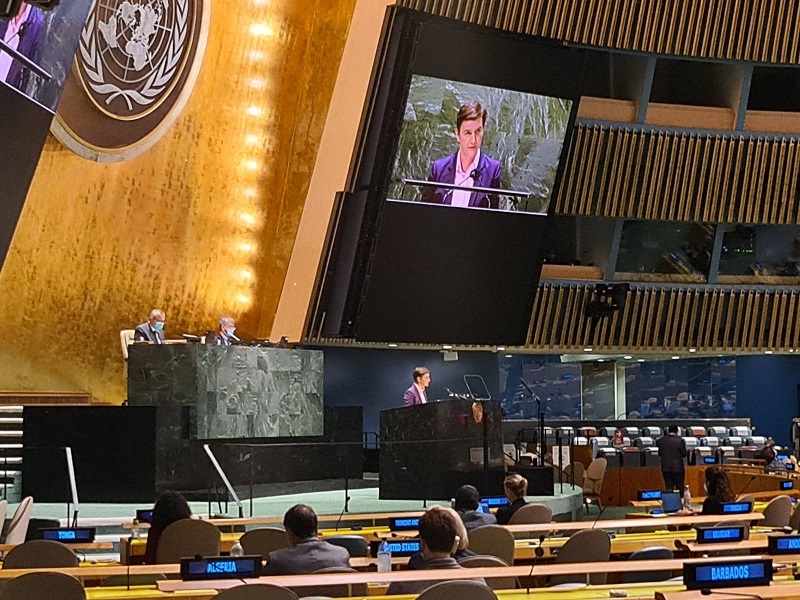 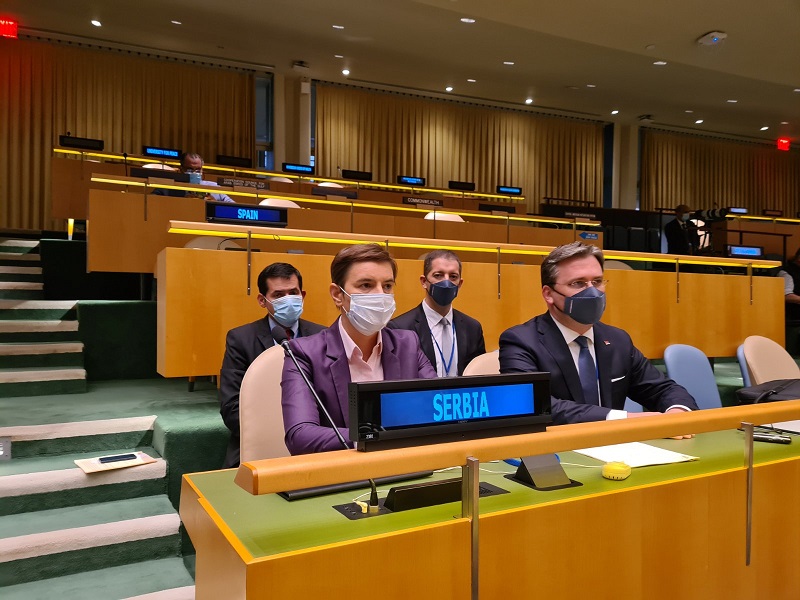 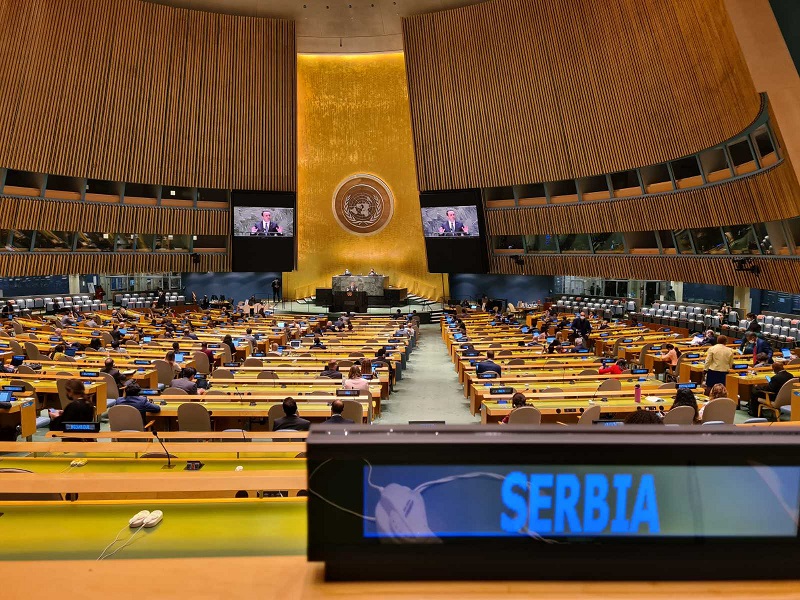
Source: www.srbija.gov.rs
|
|
|
| Prime Minister Brnabic at Global COVID-19 summit organised by White House |
|
22 September 2021
Prime Minister Ana Brnabic participated today at the Global COVID-19 summit, organised by the White House, which was opened by US President Joseph Biden.
The video messages are attended by a large number of world leaders and officials of international organizations, including UN Secretary General Antonio Guterres, European Commission President Ursula von der Leyen, British and Canadian Prime Ministers, Boris Johnson and Justin Trudeau, German Chancellor Angela Merkel and many others.
In the message, the Prime Minister pointed out that Serbia was among the first European countries to procure a covid vaccine, and that she was the first European Prime Minister to receive the vaccine.
Thanks to years of investment in digitalisation and development of eGovernment, we have managed to organise a complicated and complex vaccination process very efficiently and in a way that it is focused on citizens, she explained.
However, as she added, from the very beginning we were aware that this is not just a matter of our citizens and only our struggle. In the fight against the COVID-19 pandemic, we are all safe or no one is safe.
That is why, in addition to procuring vaccines for our citizens, we donated vaccines to the citizens of the Western Balkans, but also to other countries, she reminded and specified that Serbia donated 230,000 doses of vaccines to the region, we vaccinated foreign citizens in Serbia with approximately 300,000 doses and set aside we have 570,000 doses of vaccines for countries in Africa and Asia.
Brnabic mentioned that Serbia has already started the production of covid vaccine from one manufacturer, and that it will start production from another by the end of the year, because in that way we want to help and support all people and countries that need vaccines.
This is a pandemic in which we will either win together or lose together, but we must fight together, the Prime Minister repeated.
That is why Serbia supports the goals of this global summit, she emphasised, and expressed her gratitude to the United States of America and President Biden for organising the summit and supporting joint efforts in the fight against the COVID-19 pandemic.
Vaccines are the only way out in the fight against the pandemic, concluded Brnabic.
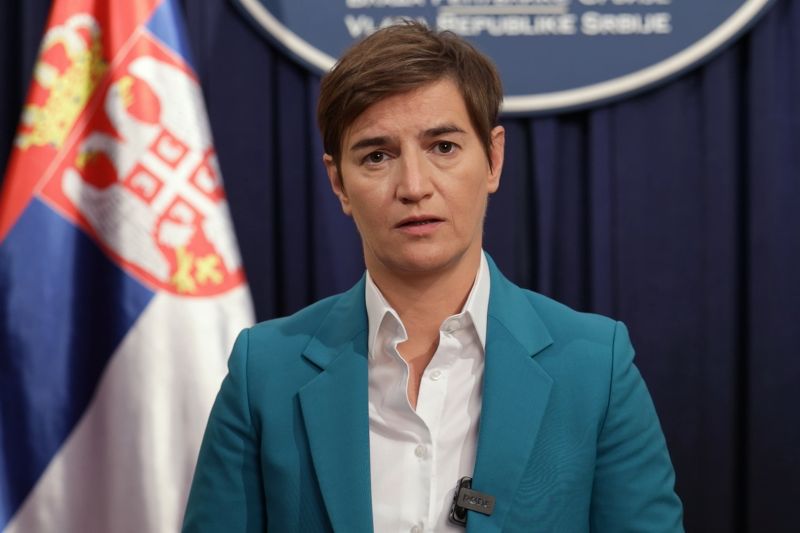 |
|
|
| Entry ban to the Kingdom of Sweden for the citizens of Serbia, starting from 20 September 2021 |
|
Due to the increased risk of the spreading of the Covid-19 pandemic, the Swedish Government has decided to reintroduce the entry ban to the Kingdom of Sweden for the citizens of the Republic of Serbia. This decision applies from the 20th of September 2021 regardless of the vaccination certificate or past illness. This decision also applies to the citizens of Albania, Armenia, Azerbaijan and Japan.
|
|
|
| Children’s Cultural Center Belgrade Invites you to the INTERNATIONAL COMPETITION COMIC STRIP 2021 |
|
Information and application form are available: HERE
(deadline for application 7 November 2021)
|
|
|
| Farewell visit of the Ambassador of the Kingdom of Sweden |
|
27 August 2021
Farewell visit of the Ambassador of the Kingdom of Sweden
The President of the Republic of Serbia, Aleksandar Vučić, received the Ambassador of the Kingdom of Sweden, Jan Lundin, for a farewell visit, to whom he expressed gratitude for the impressive contribution to the development of relations between the two countries during his diplomatic mandate in Belgrade.
President Vučić and Ambassador Lundin agreed that the priority for the two countries should be to strengthen political dialogue and various forms of cooperation, with special emphasis on economic relations. President Vučić expressed hope that more companies from Sweden could decide to invest in Serbia.
Ambassador Lundin said that during his work in our country, he witnessed significant economic progress, as well as Serbia's contribution to regional cooperation.
President Vučić thanked Sweden for its readiness to support Serbia's European path. In that regard, Ambassador Lundin pointed out that his country supports EU enlargement.
On this occasion, President Vučić and Ambassador Lundin also discussed a number of regional and global issues.
President Vučić wished Ambassador Lundin good luck in his future private life, as well as much success in his new position.
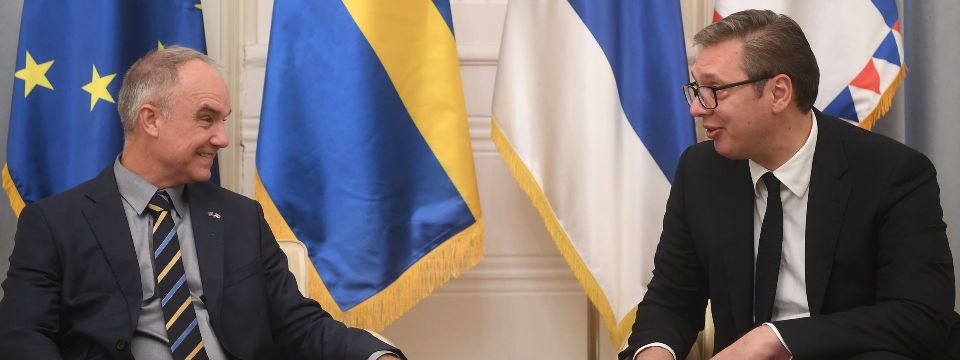 |
|
|
| The official visit of the Speaker of Riksdag, Mr. Andreas Norlen, to Belgrade, 24 August 2021 |
|
At the invitation of the President of the National Assembly of the Republic of Serbia, the Speaker of Riksdag, Mr.Andreas Norlen, has paid an official visit to Belgrade on 24 August 2021, where he is meeting with the President of the Republic of Serbia, Aleksandar Vučić, the Speaker of the National Assembly, Ivica Dačić and the Prime Minister, Ana Brnabić. Those meetings are of particular importance for the further deepening of bilateral ties between Serbia and Sweden, as well as parliamentary cooperation.
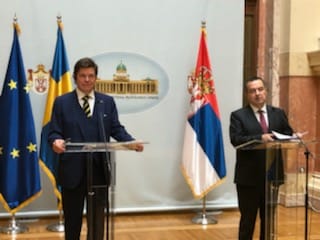 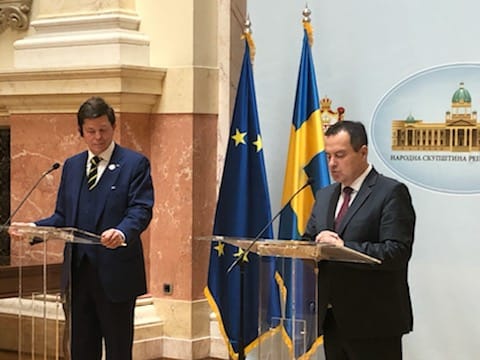 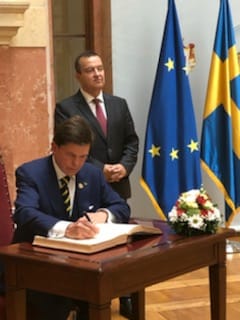
President of the Republic of Serbia, Aleksandar Vučić, met with the Speaker of the Parliament of the Kingdom of Sweden, Andreas Norlen, on 24 August 2021, within the official visit of the Swedish parliamentary delegation to Belgrade.
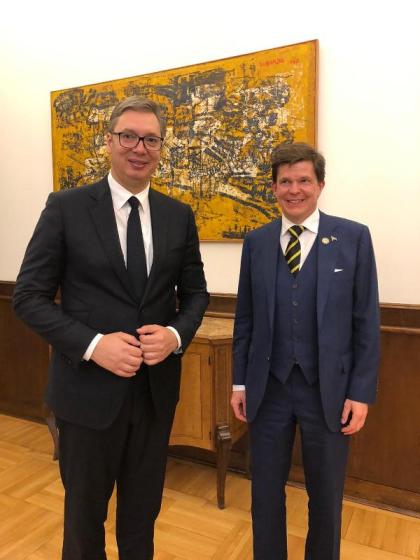
As part of his official visit to Belgrade, the Speaker of the Swedish Parliament Andreas Norlen, with a delegation of MPs, also met with the Minister of Human and Minority Rights and Social Dialogue of the Republic of Serbia Gordana Čomić on August 24, 2021.
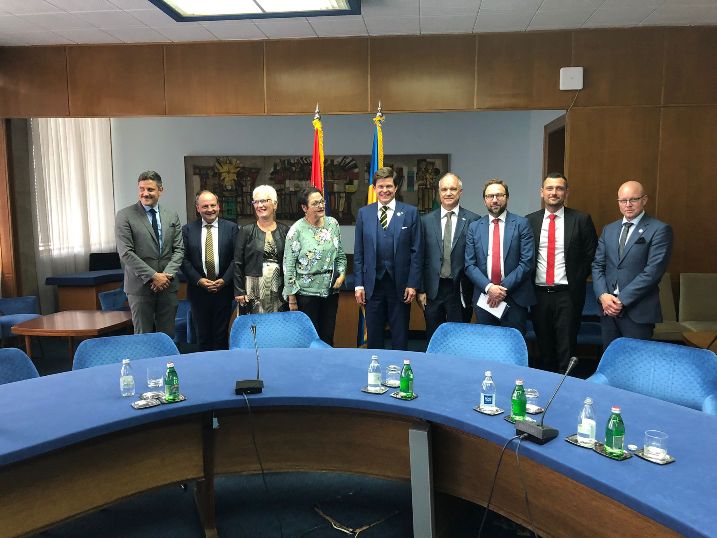
Likewise, on 25 August 2021, the First Vice President of the Swedish Parliament, Asa Lindestam, talked with the Commissioner for the Protection of Equality of the Republic of Serbia, Brankica Janković.
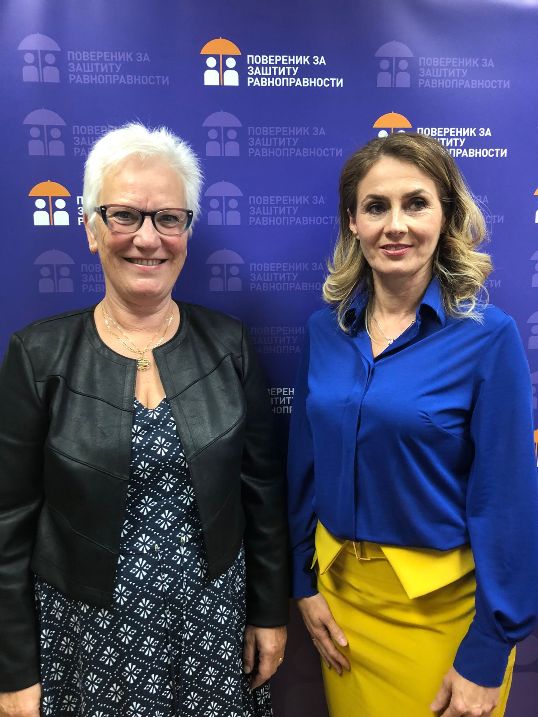 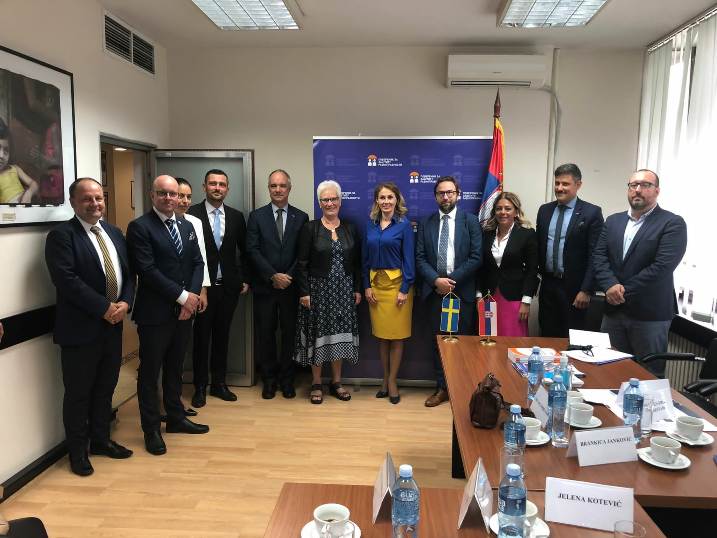 |
|
|
| Marking the Remembrance Day of all Serbs who died and were expelled in the armed operation "Storm" |
|
5 August 2021
The President of the Republic of Serbia, Aleksandar Vučić, attended the marking of Remembrance Day of all the victims and expelled Serbs in the armed operation "Storm" and said that Serbia remembers!
"Today, when we remind ourselves again of what happened in August 1995, the terrible pogrom, the expulsion of more than 250,000 Serbs, the exodus and ethnic cleansing, we, at the same time, and finally, remind ourselves of who we are, what we are, where we come from and where we are going. Thank you all for being here together tonight and for showing how much we love our people", said President Vučić, adding that we will not forget any of the things that the Krajina people had to go through.
"For us, these are not just terrible numbers of victims", said President Vučić and emphasized that Serbia will not forget.
"History has never been rewritten like today. That is why I want to remind us all not only of what others have done to us, not wanting us to exist, but also of what we have done to ourselves, just as if we ourselves did not want to exist", said the President, noting that we must never again allow Serbia to forget its silent heroes.
President Vučić emphasized that we must never again cover our eyes, ears, and mouths in front of something that truly was a pogrom and the downfall of all humanity.
"Pretending that this is not true, avoiding saying it, is a crime not only against the victims, but also against ourselves, every living Serb, people from Krajina, as well as Serbia and its future", said President Vučić and underlined that people can stand up straight and live with themselves and the others without hesitation, fear and doubt, only if they remember.
President Vučić pointed out that Serbia must fight for peace and cradles with children, as well as that not remembering annuls and erases us from the history and the future, depriving us of the right to tomorrow.
"Our mission is a happy future for us and for the new generations! Today's Serbia is based on a clear identity and a culture of remembrance", said President Vučić and reminded that everything that had been neglected for decades had been done, and that a strong Serbia has become the master of its own destiny.
"Eternal glory to you, Serbian martyrs who perished in the "Storm" and all other pogroms. Your children are in their Serbia, taken care of, loved and successful. Sleep peacefully, Serbian falcons, the future of your children is our vow", concluded President Vučić and thanked everyone who showed that night how much they love their country and that Serbia remembers.
Source: www.predsednik.rs
Photo: www.predsednik.rs
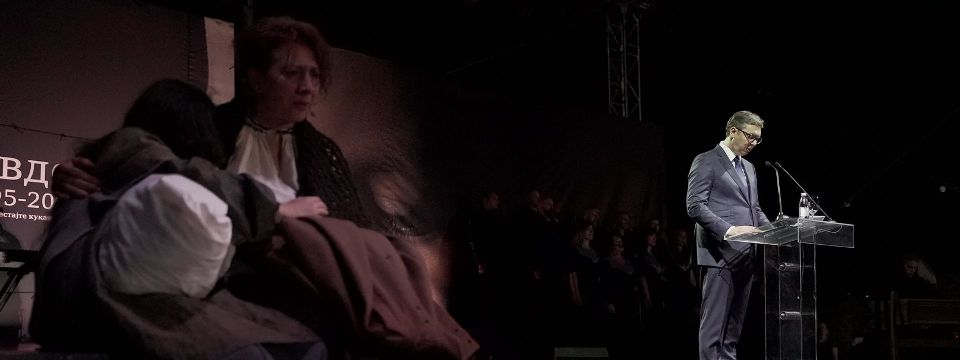 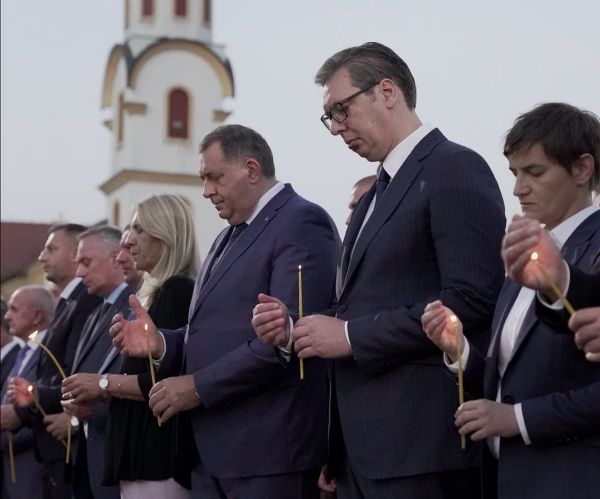 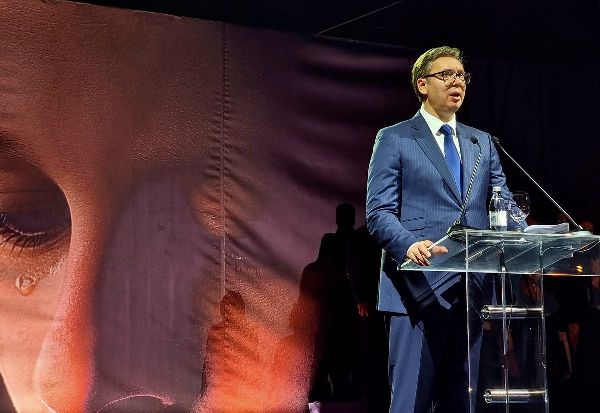 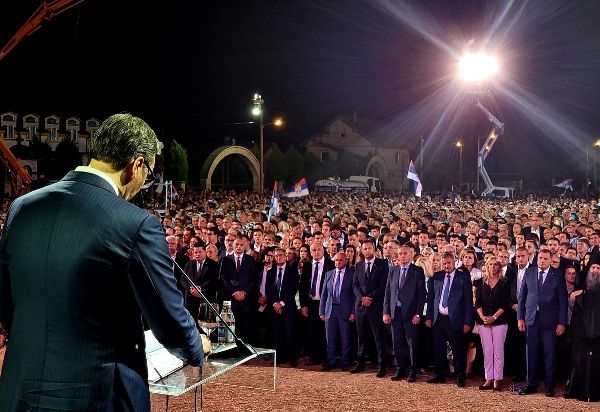 |
|
|
| President Vučić: We have decided – our goal is the EU, but China is an important partner |
|
22 July 2021
We have decided – our goal was and remains the EU, Serbian President Aleksandar Vučić said in an interview with the German daily "Handelsblatt", adding that there is no alternative for Serbia, but also stressing that China is an important partner for Serbia, and that the task of the state is to take care about the interests of its citizens.
He thus answered the question of what Serbia will choose once it has to choose between close relations with Beijing or the EU. Vučić emphasized that Serbia wants to become a full member of the EU.
"We are connected by history, common culture, EU members are already undoubtedly our most important partners", he explained and added that the trade exchange between Germany and China is 3,000 times higher than between Serbia and China, and, as he noted, even despite that, Serbia's business operations with China are portrayed as a problem.
To the statement that the German Chancellor Angela Merkel did not congratulate the 100th anniversary of the Communist Party of China, and that he did so, he replied that Serbia is not Germany, but a small country. On additional insistence on what Serbia will do if it has to choose between the EU and China, he underlined that Serbia has already decided, that its goal was and remains the EU membership.
"Our biggest investors are from the EU. The EU accounts for 67% of our trade while 17 percent of the trade is with countries of the region that are all on the way to the EU. We cannot survive without the EU", he added.
"But can we do a lot of good things with China – of course. And we do that, just like Germany does", Vučić pointed out, and to the remark that the quality of the Silk Road projects was being criticized, primarily because of Chinese workers, he answered that the quality of roads or bridges, which Serbia is building with China, is excellent.
"We give jobs to those who submit the best offer to us. That is why I tell Europeans who criticize Chinese projects in our country – offer us a project for one euro more and you will get it", he emphasized.
In that regard, he pointed out that Serbia is building a railway to Northern Macedonia with 600 million euros of EU aid, stating that that offer was better than China's.
"There is often talk of a 180-kilometer railway to Budapest through the territory of Serbia, which is financed by China. But the railway that is being built with the help of the EU from Belgrade to the northern Macedonian border is twice as long and no one is talking about it. It is all too political", he stated.
Asked whether he welcomes the plans of the EU and the USA regarding an alternative initiative to the Silk Road, Vučić said that he supports everything that brings advantages to our region.
"The Chinese want to expand their presence everywhere, but many processes in the West are, frankly, more efficient and without problems. We still have a lot to learn from the West, but we are getting there", Vučić said.
He pointed out that China was an important partner for Serbia and added that when the consolidation of state finances began in 2014, our country received good conditions from China for development projects.
He also stated that a competition for a copper mine was announced in eastern Serbia, at the request of the EU, that no European company had made an offer for six months, and that it had then been taken over by the Chinese.
"Our job is to take care of our people", he said.
He reminded that the Serbian economy grew by 52% in eight and a half years, which for the EU means that Serbia could be a strong member and engine for the entire region.
Explaining how Serbia is developing so well economically, he pointed out that Serbia has an excellent workforce, which speaks English, that society and administration are digitalized, and that it has the most flexible labor law in Europe, as well as consolidated public finances.
He reminded that previously the public debt was at 78% of GDP, and that today it has been reduced, thanks to the strong growth of the economy, to 52%.
"We can afford to give investors an incentive to come", he added, emphasizing that Serbia offers investment assistance, but that, for example, subsidies were not the motive for the arrival of the development center of the company Continental.
He pointed out that, five or six years ago, only Serbia started using the dual education system in this region, which Germany, Switzerland and Austria also use, that tens of thousands of people are in dual education, and that this is appreciated by foreign investors, who, in addition, can work closely with universities as well.
Germany, he stated, is the most important trade partner and the largest investor.
We started with the arrival of small textile companies from Turkey, and now primarily large German companies are coming. Today, 71,000 people work in German companies in Serbia", he explained.
Vučić said that the European perspective is very important for investors, stating that Nidek, Toyo Tires or Mitsubishi are coming from Japan to Serbia because our country is on a stable European path.
Asked if he believes that Serbia will become an EU member in the foreseeable future, he said that he does not complain.
"It is certain that if we had received 45 billion euros of EU aid, we would have been much further economically. Instead, we received 1.6 billion euros from the EU. We are used to achieving our successes on our own", said Vučić.
The President of Serbia reminded that in Croatia, salaries used to be 2.2 times higher than in Serbia, and today they are only 1.7 times higher.
"We are closing the gap with our own efforts. If we were to become a member of the EU, then we would certainly not ask for the biggest subsidies", he assures.
He said that the Serbian path follows the German path to Europe, and that Serbia wants a fair chance.
"I believe Merkel's words. She is at the end of her term and I would not have to praise her anymore. But she gave us stability, freedom of travel to the EU, helped us with the migrant crisis in 2015, and asked the Minister of Economy Altmeier and others to work closely with us", he reminded.
Asked if there were any indications that the new German government would support Serbia in the same way, Vučić expressed confidence that it would be the same.
"I know Armin Laschet, I talked to him while he was the Minister-President of North Rhine-Westphalia. He is very smart and understands the situation in the Balkans, and he will certainly continue Merkel's policy towards our region as the new chancellor", he added.
Vučić also expressed his belief that Russia, if Serbia's accession to the EU were concretized, would not react similarly as in the case of Ukraine, as this is a sovereign decision of Serbia.
To an additional question in this regard, Vučić pointed out that whenever he met with Vladimir Putin, and there were 18 or 19 meetings, he told him that he was grateful for the traditionally close friendship with Russia, but also that Serbia is on a clear course towards the EU.
"He asked if it was our choice and I answered that EU membership is indeed our goal", he added.
When it comes to "Kosovo", Vučić emphasized that a compromise is needed regarding this issue.
"Only in this way can there be sustainable peace. Serbia wants peace, me as well. Let's stop with the madness of the past. Only then can the whole region become the engine of new growth for Europe", said Vučić.
Source: Tanjug
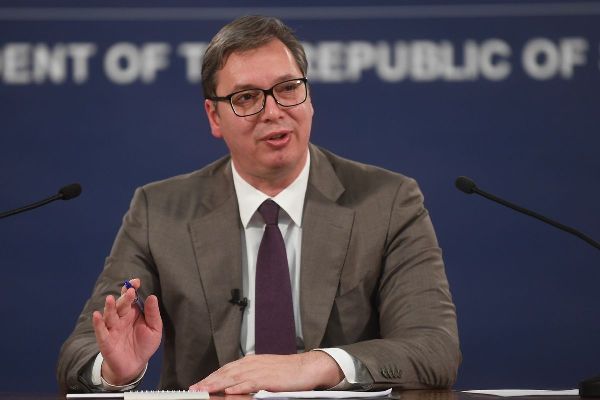 |
|
|
| Serbia has achieved great success in the field of digitalization |
|
20 July 2021
The Prime Minister of the Republic of Serbia, Ana Brnabić, stated at a gathering dedicated to digitalization and the IT sector, which was held in New York, that since she became Prime Minister, she is most proud of Serbia's success in the field of digitalization.
Brnabić, who is on a two-day visit to the United States, said that when she was elected Minister of Public Administration and Local Self-Government in August 2016, she wanted to do everything to change the public administration and what bothered her as a citizen.
She stated that, when she took office as Prime Minister, she knew what her priorities were and that first of all, digitalization needed to be raised to a higher level, that the education reform was supposed to begin, as well as work on strengthening the economy.
I believed in a country that believes in its people, because the Serbian people are creative. From 1 June 2017, we started working as an e-Government, i.e. we started exchanging data electronically, said the Prime Minister.
According to her, our citizens no longer had to go to, say, the Tax Administration, and since then, the public administration has exchanged 50 million documents, which means that citizens did not have to go from office to office for 50 million papers.
Brnabić pointed out that she is proud of what has been done in the field of education since she became the head of the Government, specifying that in September 2017, programming was introduced as a compulsory subject in primary schools.
Nobody believed that we could do that, but we cooperated with the private sector and some social organizations and we succeeded. At the moment, we are far ahead of numerous countries in Europe and the world, said the Prime Minister.
The Prime Minister pointed out that she was most proud when the cornerstone was laid for the science and technology park in southern Serbia, noting that so far, our country has four science and technology parks.
She pointed out that Serbia has since become one of the most successful countries in the world in the field of technology, and that according to some parameters, it is among the ten countries in the world, or among the five, assessing that this is proof that the country can change quickly.
Answering the question about vaccination, the Prime Minister emphasized that our country has never seen it as a geopolitical issue, but as a health issue.
According to her, Serbia talked with producers from both the East and the West and was among the first European countries to sign agreements with the company Pfizer-BioNTech and Sinopharm.
Unfortunately, many countries have viewed this issue as geopolitical. It did not matter to us, as long as the vaccines were safe, the Prime Minister emphasized and added that this was not the end of Serbia's success, because good organization was also needed.
Brnabić explained that the organization is another important thing in vaccination, because it is a logistically very difficult process, adding that, with the help of digitalization, success has been achieved and that everything we did in the previous years has paid off.
She stated that Serbia quickly established a system through which citizens could express interest in vaccination against the coronavirus and choose which vaccine they wanted to receive, as well as to be informed by a message when to go and get vaccinated.
Now I can log in on my phone, to see how many people have received the vaccine, how many more have registered, so that the effects of digitalization are obvious. We have made everything very efficient and easy for our citizens, the Prime Minister explained.
Answering the question of what she can tell other countries of the world about how to progress faster, Brnabić said that it is important to invest as much as possible in digitalization and education.
You need to teach children how to think, not what to think. Not all children will become IT experts, but what they can learn is an algorithmic way of thinking and how to make decisions, she said.
The Prime Minister mentioned investing in high-speed internet and providing infrastructure for start-ups as an important thing for progress, because more and more economies will be based on start-ups and innovations, emphasizing that people should be helped to start companies and implement their ideas.
Speaking about social networks, she pointed out that fake news has become the biggest problem on these networks and that it will remain so for some time.
This is the biggest challenge I face as Prime Minister, especially during the corona virus pandemic, she said, adding that social networks are also a great opportunity for politicians to communicate with citizens.
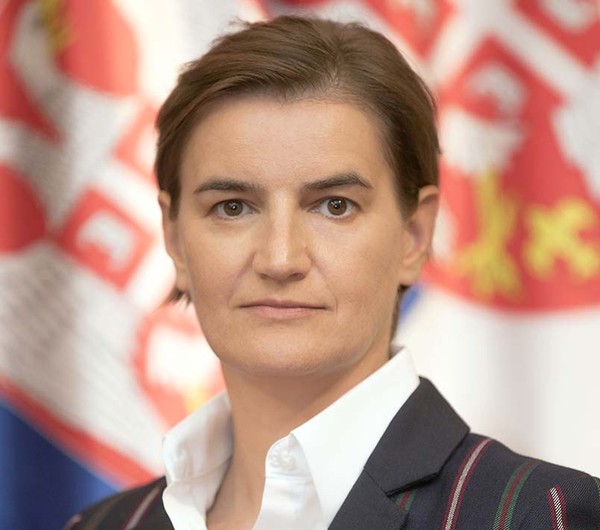
Source: www.srbija.gov.rs
Photo: www.srbija.gov.rs |
|
|
| Incidents in Kosovo and Metohija in 2021 |
|
January
07/01 The Vučković family house in the village of Babin Most was broken into;
13/01 Petar Petković, Director of the Office for Kosovo and Metohija, was not allowed to enter;
16/01 At the “Jarinje” CCP, a bus with 40 passengers carrying season’s gift packages for children was not allowed to enter;
20.01 Inspection raided the Health Center in Štrpce, searching for vaccines;
28.01 Igor Popović, Assistant Director in the OKM, was not allowed to enter;
February
02/02 Two Ristić brothers were wounded by firearms in Laplje Selo;
03/02 KLA graffiti were inscribed on the Krstović family house in Goraždevac;
03/02 The mast and flag by the Monument to Serbian victims in Goraždevac were broken;
04/02 Archeological items were stolen from the Hermitage of St Petar of Korisha, near Prizren;
05/02 The Jovanović family house in the village of Mogila was broken into;
10/02 A KLA Billboard was placed in Čaglavica;
10/02 The Vučković family house in the village of Berkovo was broken into;
13/02 The TV PINK and TV Kraljevo crews were not allowed to enter;
15/02 The RTS crew, filming the series „The Right to Tomorrow“ was not allowed to enter;
26/02 Serbian boy M.M. was stabbed by Albanians in Kosovska Mitrovica;
28/02 Team of the Arilje Handball Club was not allowed to enter;
March
03/03 A Serbian house in Gračanica was broken into, money and personal documents were stolen;
04/03 Two Goranis in Globočica were wounded by two Albanian men;
05/03 Serbian boy L.P. was hit in Gračanica by car with an Albanian driver who fled the scene;
06/03 On All Souls’ Day, Orthodox church of St. Peter in the village of Klokot, Municipality of Kosovska Vitina, was broken into and some money was stolen;
06/03 On All Souls’ Day, Orthodox church of Holy Trinity in the village of Parteš, Municipality of Gnjilane, was broken into, and from it were stolen money, a hand-made shroud and an icon;
07/03 A tombstone in the graveyard of the village of Binač was stolen;
07/03 A Serb restaurant-owner in the village of Šilovo, Municipality of Gnjilane, was shot in the leg by an Albanian;
12/03 From the parish house under construction, next to the Church of the Holy Apostle Luke in the village of Vitomirica, Municipality of Peć, construction material was stolen;
12/03 ROSU members searched the premises of the Municipality of Klokot, then searched the family house of the Municipality President and arrested him;
13/03 Church of 40 Martyrs of Sebastes in the village of Drajkovce, Municipality of Štrpce, was broken into and its money was stolen;
13/03 Church of St. Dimitri in the village of Donja Bitinja, Municipality of Štrpce, was broken into;
15/03 Church of St. Kyriako in the village of Gornja Gušterica, Municipality of Gračanica, was broken into, demolished, and looted;
16/03 At the “Jarinje” CCP, Ms. Svetlana Miladinov, Assistant Director in the OKM, was not allowed to enter;
18/03 Church of St. Marko in the village of Šilovo, Municipality of Gnjilane, was broken into, and its money and sound system were looted;
25/03 KLA graffiti were inscribed on the wall of the Health Center in the village of Suvi Do;
27/03 At the “Tabalije” CCP, the Kosovo Police did not allow 17 football players of the FC „Šumadija“ to enter Kosovo and Metohija;
30/03 Ms. Mila Anđelković, a returnee whose family house has been illegally occupied by the Albanians, was arrested;
April
10/04 Serbian youngsters Marko Nikolić and Miloš Rošić, while sitting in a cafe in the north of Kosovska Mitrovica, were attacked by bottles;
12/04 Health clinic in the village of Gojbulja was broken into;
13/04 Teenager Luka Dimitrijević was attacked in Gračanica;
15/04 Albanian flags were waved followed with an attempt of incursion into the Clinical Hospital Center in the north of Kosovska Mitrovica;
16/04 Petar Petković, Director of the OKM, was not allowed to enter;
18/04 Ms. Tamara Grujić, a RTS journalist, was arrested in Vučitrn;
18/04 The front door of the elementary school in Obilić were demolished;
26/04 Lazar Đoršević and his family were attacked by Albanians, while at their own estate in the village of Gojbulja;
May
03/05 The Jaćović family house in Kosovska Vitina was stoned;
03/05 A window was broken on the car belonging to the deacon in Orahovac;
05/05 Miroslav Lukić from Velika Hoča sustained a broken nose after being physically attacked by three Albanians;
06/05 On the St. George’s Day, a group of thugs attempted to remove the Serbian flag from the Bell tower of the church of Holy Apostles Peter and Paul in Klokot;
06/05 The church of St. John the Baptist, located in the center of the City of Peć, also known as the Metropolitan Church, was stoned and a window got broken;
09/05 The church of St. Petka in Kosovska Vitina was stoned;
09/05 In the village of Suvi Do, Municipality of Kosovska Mitrovica, three shots were fired into the air from the passing vehicle;
10/05 The church of Most Holy Mother of God in Lipljan was stoned;
11/05 The house of returnees Radoje and Miloje Pumpalović in the village of Dubrava, Municipality of Istok, was attacked, for the fifth time within the timeframe of a year;
20/05 The Jaćović family house in Kosovska Vitina was attacked once more;
24/05 In the church of St. Petka in the village of Donja Šipašnica, Municipality of Kosovska Kamenica, front door was burglarized, church was ransacked, and its holy relics were stolen;
26/05 The house of returnee Sreten Stojiljković, near Novo Brdo, was broken into, and his tools and firewood were stolen;
26/05 An outbuilding belonging to Božidar Zdravković from the same village (Ćeranovica Hamlet, returnee village Klobukar, Novo Brdo) was burglarized and a stove was stolen;
30/05 The signpost pointing to the Draganac Monastery in the Municipality of Novo Brdo was shattered.
June
03/06 “Greater Albania” graffiti were inscribed on a Serbian home in Orahovac;
10/06 Kosovo Police raided the Temple of Christ the Savior in Priština, after the liturgy;
11/06 Hate graffiti were inscribed on the Temple of Christ the Savior. Kosovo Police stood by, passively watching the desecration as it went on;
11/06 Ms. Darija Kisić Tepavčević, Minister of Labor, Employment, Veterans' Affairs, and Social Affairs, scheduled to hold lecture to students, was not allowed to enter Kosovo and Metohija;
11/06 A group of 39 Christians believers on pilgrimage were prevented from visiting the monasteries in Kosovo and Metohija;
11/06 Bus carrying Christians believers was kept on hold for more than 5 hours at the “Jarinje” CCP;
12/06 Two buses carrying Serbian athletes and Christians believers was returned from the “Jarinje” CCP
14/06 Graves of families Stojanović and Šarić in Orahovac were desecrated;
19/06 A bus carrying 50 Christians believers from the parts of Central Serbia on route for the All Souls’ Day to Kosovo and Metohija;
20/06 Electrical installation in the church of St. Uroš in Uroševac was stolen;
21/22/06 Minister Vanja Udovičić was not allowed to enter into Kosovo and Metohija;
21/06 The front door of the church of holy Apostles Peter and Paul in the village of Talinovac near Uroševac was shattered, electrical installation taken down, and icons thrown around;
24/06 The family house of Staniša Stojanović in the village of Babin Most, Municipality of Obilić, was broken into, looted, ransacked, and the money was stolen;
26/06 A group of Serbian mountaineers was banned from hiking to the top of the Šar Mountain starting from Štrpce and the Brezovica Ski Center;
27/06 Repeated assaults against Dragica Gašić, the first ever Serbian woman returnee into Đakovica, coupled with the stoning of her apartment, pasting photos of deceased people, and announced protests of NGOs with requests for her eviction;
28/06 Stopping the vehicles with Serbian license plates on the road to Gazimestan while on way to celebrate Vidovdan, seizure of any Serbian symbols; a nun was searched, and a Montenegrin citizen was arrested and, two days later, remanded to a 30-day custody;
On that same day, several Serbian people were arrested just because they were singing the Đurđevdan song and uploading videos to social networks;
29/30/06 In the Gračanica Monastery, the tricolor of the Serbian Orthodox Church was stolen, and the mast on the monastery gate was broken. The photos of the desecrated church were posted on social networks, also depicting a black-clad Albanian holding the flag of “Greater Albania”. Few hours later, there was a video on social networks with that same masked Albanian burning the stolen flag;
30/06 Dragica Gašić was forbidden to install an armored door in her apartment, and the door got confiscated;
30/06 Four persons from Čačak were apprehended at Gazimestan on June 28, brought and interrogated before a prosecutor, over their T-shirts captioned “No Surrender”. According to them, those T-shirts were found in the trunk of their vehicle with Čačak license plates. They were questioned by prosecutor without interpretation, because the alternative to it, as they were informed, was to wait until the next day. They were fined with EUR 400, which they did not pay immediately, so the Kosovo Police system withheld their ID cards;
30/06 In Lipljan, a group of Albanians prevented several Serbian boys and girls to set up a basketball hoop in a local park;
July
01/07 An “ALBANIA UCK” graffiti appeared overnight on a billboard presenting the Monastery of Gračanica on the Gračanica – Laplje Selo road;
01/07 A group of Albanians has beaten up a 13-year-old boy, Nikola P, tearing off the cross around his neck and leaving him in bruises and contusions.
|
|
|
| President Vučić participates in the Mini Schengen conference |
|
29th June 2021
President of the Republic of Serbia Aleksandar Vučić participated today via a video link in the conference "Mini Schengen" with the Prime Minister of the Republic of Albania, Edi Rama, and the Prime Minister of the Republic of North Macedonia, Zoran Zaev. The officials discussed further steps in regional cooperation, as a process vital to the progress of the Western Balkans and the European path as a whole.
The interlocutors agreed that the countries of the Western Balkans need membership in the European Union, but also that the European Union needs the Western Balkans just as much since the region is surrounded by EU borders and the countries aspiring to membership share common European values.
The President of Serbia and the Prime Ministers of Albania and North Macedonia have expressed the wish that the four European freedoms - the movement of people, goods, services and capital, begin to be implemented as soon as possible throughout the region, and that in this context they will provide full support to the regional common market at the Berlin Process Summit to be held on the 5th July.
"We are aware that only by working together and accepting regional cooperation within various regional initiatives such as the common market, regional Schengen, green corridors or the Berlin Process, can we bring our economies closer, increase the well-being of our people and bring in large investments that would otherwise not be possible for any of us individually", is one of the joint conclusions of this video conference.
The interlocutors agreed to meet in Skopje on July 29th to review the progress in the implementation of existing initiatives and projects and to sign additional agreements between the three countries related to the implementation of the Berlin Process commitments, as well as cooperation and assistance in the event of natural disasters and relief measures for trade, export and import.
"We call on and encourage our colleagues from the region to sign and implement similar agreements, so that the vision of a common political and economic space across the Western Balkans would soon, through the single market, become an important part of our citizens' daily lives," said the Serbian President and Prime Ministers of Albania and North Macedonia.
The interlocutors pointed out that despite the delays in the enlargement process, they will continue to try to identify new ways, policy areas and financial instruments for all three countries to increase their contribution to Europe, strengthen ties with the European Union and gradually integrate the region into the single European market.
Speaking on the Green Agenda, the interlocutors issued a joint call to the European Union and the United States to join countries across the region to support the development of projects that could be invested as soon as possible to improve environmental protection and increase the widespread use of renewables as part of the EU Economic and Investment Plan implementation and the Green Agenda for the Western Balkans.
"Our countries have a huge potential for sustainable growth and development of this sector. We will ask for practical support to find out which projects can improve our region in terms of renewable energy sources for our citizens and for the green energy future of the EU ", said the interlocutors during the "Mini Schengen" video conference and concluded that only regional connecting, with the EU support, can contribute to the overall stability and progress of the entire region and Europe.
Source: www.predsednik.rs
Photo: www.predsednik.rs
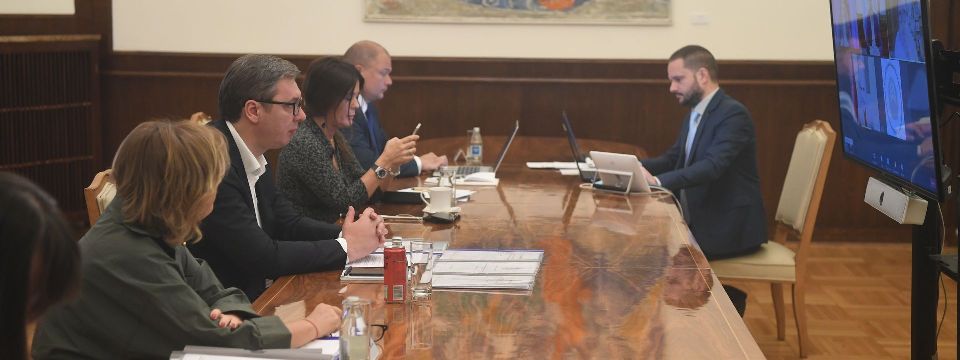 |
|
|
| Address by the President of the Republic of Serbia at the session of the United Nations Security Council |
|
09. June 2021.
Dear Mr. President, ladies and gentlemen, members of the delegations
I would point to a few ongoing issues in my speech that refer to the competences of the Mechanism, namely, the possibility of serving the sentences passed by the ICTY and Mechanism in the Republic of Serbia, with the current practice of disabling early release of the sentenced persons as well as obligation of the Mechanism regarding protection of sentenced persons.
The second part of the speech will be dedicated to issues that are opened by the six –month Report on the work of the Mechanism by Mechanism President Mr. Agius and Report by the Chief Prosecutor Mr. Serge Brammertz, especially regarding current cooperation of the Republic of Serbia and the Mechanism.
The third part of my speech, and I noticed that in many of your statements even today, is going to be the view of Serbia on everything that took place in The Hague Tribunal and what the Tribunal verdicts brought to people in the region of former Yugoslavia.
The Republic of Serbia has initiated before the Security Council, on several occasions, the issue of possibility of serving sentences passed by the ICTY and Mechanism in the Republic of Serbia. Beside the efforts to move this issue from “square one”, not a single response was obtained from the Security Council. The majority of persons that are serving their prison sentences are citizens of the Republic of Serbia, and it comes naturally that the Republic of Serbia is interested in enabling them to serve their prison sentences in the Republic of Serbia.
ICTY and the Mechanism are making references to the Security Council as an institution in charge of dealing with this issue.
I am ready to reiterate here the readiness of the Republic of Serbia to take over obligations and liability for executing prison sentences that the Tribunal or Mechanism passed on the citizens of the Republic of Serbia, under the monitoring of the Mechanism and full respect for the authority of the Mechanism regarding early release.
Mr. President
A particular problem that we are facing with is disturbance by the judicial institutions established in the territory of Kosovo and Metohija, which is within Serbia and which is under Interim Administration of the UN. We are witnesses of attempts of retrial for two citizens that are serving their prison sentences for which they had already been trialed before the ICTY. More concretely, in previous period there was an attempt for hearing of Nebojša Pavković and for obtaining extradition of Vlastimir Đorđević.
I urge on the Mechanism and Security Council to prevent attempts of violation of the principle ne bis in idem, a civilization principle that was confirmed in Article 7 (1) of the Statute of the Mechanism and to disable retrials for persons already convicted by the ICTY, particularly to make sure that it is not done in the territory which is under interim UN administration.
Mr. President,
President of the Mechanism (Mr. Carmel Agius), apart from the regular Report, delivered also on 11 May 2021 a letter to the President of the Security Council, whose subject is the alleged omission of the Republic of Serbia to apprehend and turn over to the Mechanism Petar Jojić and Vjerica Radeta, indicted of contempt of court, claiming that in this way the Republic of Serbia was acting contrary to its obligations towards the UNSC Resolution 1966 (2010) and asking the Security Council to take measures in order to ensure that Serbia meets the alleged obligations in accordance with the Mechanism Statue and Resolution 1966.
The point of the argumentation of the President of the Mechanism comes to that that the Republic of Serbia has the obligation to deprive of liberty and extradite to the Mechanism its citizens accused of contempt of court, regardless of the nature of accusation, circumstances under which such an order was made and consequences that might result from its implementation.
It is about accusations that do not refer to sever violations of international humanitarian law and that are related to a case before the ICTY, which ended in 2018 (Vojislav Šešelj case), by acquitting the defendant in the first instance, and upon the Prosecutor’s complaint the defendant was declared guilty and sentenced to a 10-year imprisonment, which was covered by the time he spent at the UN Detention Unit.
Judge Agius states that Serbia ignores its obligations in accordance with the Resolution 1966 (2010). Quite the opposite- the Republic of Serbia takes seriously its obligations regarding cooperation with the Mechanism. After the warrant for apprehension and extradition of the two persons accused of contempt of court to the Mechanism had been introduced, the Higher Court in Belgrade established that assumptions for their apprehension and extradition to the Mechanism had not been met. The decision is founded on the rules of international law and domestic law of the Republic of Serbia and it is mandatory for holders of the executive power in the Republic of Serbia.
I would remind here that the first decision of a sole judge (Aydin Sefa Akay, 12 June 2018), that was acting in this case was that the criminal prosecution of V. Radeta and P. Jojić for alleged contempt of court was to be forwarded to the judicial authorities of the Republic of Serbia. In procedures that followed, the argument of the alleged unwillingness of the witnesses to cooperate with the judicial authorities of the Republic of Serbia was stated for the first time, and the decision on deprivation of transferring the case to the jurisdiction of the judicial authorities of the Republic of Serbia was based on the respective argument.
The Republic of Serbia expressed its readiness to take over the court procedure against Petar Jojić and Vjerica Radeta on several occasions and it provided appropriate guarantees. Additionally, the Republic of Serbia fully recognizes and accepts the obligation of the Mechanism to monitor trials that were transferred to national courts with the help of international and regional organizations, as well as to take measures envisaged by Article 6 of the Statute of the Mechanism.
I would remind here that the Republic of Serbia extradited to the tribunal all the persons indicted by the Prosecutor’s Office, and among the respective mostly highest political, military and police officials; it enabled presence of vast number of witnesses, delivered extensive documentation. Obligation of the Mechanism, in accordance with the Resolution of this Security Council, is to take measures that enable transfer of cases to national justice system. In previous practice, 13 cases were transferred to Bosnia and Herzegovina, 2 to Croatia and only one to Serbia.
The last but not the least, I want to remind all of you here of the fact that France- of course as a sovereign and independent country- upon request for apprehension and extradition of Florence Altman for publishing documents and contempt of court, refused the request for extradition, with an explanation that it does not extradite its citizens. For far smaller offence you ask as to extradite our citizens Jojic and Radeta, showing both the distrust to Serbian justice and judiciary and Serbian State, as well as a fact that the rule from ancient Rome is still valid – quod licet lovi non licet bovi.
It does not harm to underline that high-level officers and politicians were not trialed for crimes against Serbs, and that crimes against Serbs remained unsanctioned before ICTY and Mechanism. Let me remind you, just as an example that Ademi and Norac case for ferocious crimes against Serb civilians in Medački Džep was left to Croatian justice institutions. Proven crimes against Serbs, like those of Ramuš Haradinaj, Naser Orić, then Ante Gotovina and other indicted for military operation “Storm” that led to a complete ethnic cleansing of Serb population in the big part of today’s Croatia, resulted before the ICTY in acquittals. Many horrible crimes against Serb civilians that were committed in the territory of Bosnia and Herzegovina, Croatia and the Autonomous Province of Kosovo and Metohija, and that resulted in ethnic cleansing, simply were not the subject of interest of the ICTY.
What’s very important and not to leave anything unclear, Serbia is a country that condemns all crimes and all criminals who perpetrated them in the region of former Yugoslavia. However, it is interesting that despite often criticism Serbia is the only one that speaks openly and condemns crimes perpetrated by Serb nationals, while in other regional countries they do not speak at all about crimes that representatives of those nations committed against members of Serbian people.
And I want to emphasize once again here in front of you that Serbia condemns terrible crime in Srebrenica and extends its deepest condolences to the families of all killed in that massacre. And there are no “buts” about the respective.
Nevertheless, we are here to analyze results and penal policy of ICTY and the Mechanism and it was such that it has never gained trust among Serbian people, no matter where they live. And not because we Serbs do not acknowledge crime committed by some of our compatriots, but because The Hague Tribunal, with exceptions, was judging only to Serbs and in all three territories of former Yugoslavia- Croatia, Bosnia and Herzegovina and Kosovo and Metohija, which some of the SC Member States see and name of course, contrary to law and legal norms and UN Resolutions, as an independent state. I would try to plastically prove to you how The Hague justice was tailored even though I know that it will not come to understanding of many of you, but to me it is important because of the history, facts, and school books that will be made in accordance with the facts.
Namely, Serbs were sentenced to totally 1138 years of imprisonment, and to 8 life imprisonments. At the same time, The Hague Tribunal did not sentence a single Croat for crimes against Serbs, neither in actions Medački Džep, nor Flash and Storm. How politically cunning it was done in the Tribunal, and all wrapped in the form of law and justice. Prosecutors of The Hague Tribunal chose on purpose three military and political leaders of Croats, Bosniac Muslims and Albanians, on all three mentioned territories, committed against Serbs. – Ante Gotovina, Naser Orić and Ramuš Haradinaj. It is interesting that following the same pattern, the same pattern, this injustice was shared. Namely, all of them were sentenced in the first instance procedure, with the exception of Ramuš Haradinaj, because not a single witness survived. Gotovina was sentenced to 24 years’ imprisonment in first-instance procedure, while by a mysterious decision of the second instance council and 3:2 judge ratio, the verdict was changed to acquittal. Naser Orić, for crimes against Serbs, was also sentenced in first instance verdict, but by a mysterious decision of the second instance court, and again 3:2 ratio decision was an acquittal and he was set free of any liability. Let me reiterate, all witnesses in process against Ramus Haradinaj, either committed suicide or were killed under very, very strange circumstances.
Let me conclude, I do not want to believe that someone wants to say that there had been no crimes against Serbs, but judging by the verdicts of The Hague Tribunal, no one- absolutely no one- is responsible for those crimes.
Nevertheless, we in Serbia will show responsibility and we will fight for peace, stability and reconciliation in the region.
We ask UN Security Council Member States to help us with rational and pragmatic approach and respect for international law and not by attempts of further humiliation of Serbia. Serbia is a small country, with proud and courageous people, the one that gave the biggest sacrifice during the WWI and WWII; people who wants to leave in peace with their neighbors. And when I am asking you for this, I do not think I am asking for too much.
At the very end, Serbia is the fastest growing country of the Western Balkans region and we cannot progress unless our relations with neighbors, friends and other countries are good, solid and better. That is why- despite the selective justice that was applied in The Hague Tribunal- we will be open for any dialogue, any kind of cooperation and we will look towards the future and not towards the past. And I have only one message for the citizens of Serbia and citizens of Serbian nationality in the entire region- keep your heads up, neither Serbia nor Serbian people are convicted of anything and it is up to us to work even more diligently, to open factories and to fight for our children and our future.
Long Live Serbia!
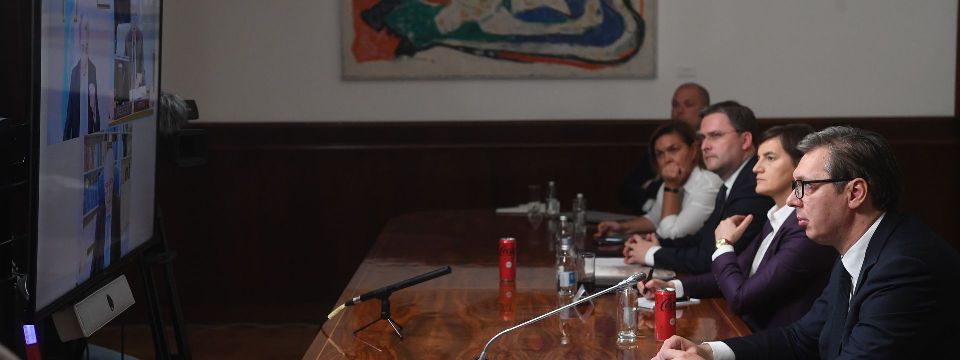 |
|
|
| INFORMATION ON VACCINATION AGAINST CORONAVIRUS IN SERBIA |
|
(updated: 4 JUNE 2021)
Vaccination (immunization) in Serbia began on 24 December (earlier than in the majority of European countries). Prime Minister Ana Brnabic received the first vaccine. She was also the first Prime Minister in Europe to receive the vaccine shot.
Serbia was the third country in Europe, after Britain and Switzerland, to start the vaccination. In Serbia, mass vaccination of the population in the fight against Covid-19 launched on 19 January.
Medical staff was the first to receive the vaccine, the immunization of geriatric centres' patrons followed, and the vaccines were then administered to the personnel of the Ministry of the Interior, Serbian Army and other security services, media representatives and others.
In Serbia, citizens express interest to be vaccinated against Covid-19 through the e-Government portal or by phone - via the contact center, upon which they receive a message with the date and time of vaccination appointment.
The Serbian Government informed that it enabled registering for vaccination against coronavirus via Viber app, starting 6 April, which is available through the official info service of the Serbian Government launched on Viber.
As of 9 April, all local governments will start arranging open vaccination posts where citizens will be able to get vaccine shots without prior registration, while the immunization of citizens who registered via e-Government portal or the Viber app will also be carried out at the same time.
Between 10,000 and 15,000 citizens apply for vaccination daily through the e-Government portal.
Citizens are able choose the vaccine they wish to receive, and the following are available: Pfizer-BioNTech, Chinese Sinopharm, Russian Sputnik V and AstraZeneca.
Serbia is one of the few countries that has four vaccines at its disposal.
According to the data, 70 percent of those vaccinated received the Sinopharm vaccine (more than a million citizens), 12 percent received the Pfizer vaccine, 9 percent Sputnik V and 9 percent the AstraZeneca vaccine.
The elderly are constantly pleaded with and invited to apply for the vaccine if they have not already, considering that citizens over 70 years of age are a priority. At the same time, citizens of all ages are invited to register and get vaccinated, since immunization has also begun of those who are not in the priority groups. Medical workers have also been vaccinating residents of smaller and rural areas, who have not registered via e-Government.
The importance of vaccination is constantly emphasized, as well as the fact that it is the only solution in the fight against the Covid-19 virus.
* On 26 April - Director of the Office for e-Government Mihailo Jovanovic said that from tomorrow, vaccination without making an appointment will be possible at all vaccination posts throughout Serbia, with three vaccines available - Pfizer, Sputnik V and Sinopharm.
*There are more than 222 vaccination posts in Serbia, where citizens can appear without an appointment and be vaccinated with any of the four types of vaccine.
*On 6 May - The Government of the Republic of Serbia adopted the Decree on Incentive Measures for Immunization and Prevention and Suppression of the Infectious Disease COVID-19, in order to additionally motivate citizens to get vaccinated and thus achieve collective immunity sooner, which aims to suppress the epidemic, restore basic functions of the health care system and open the economy.
Additional financial support in the amount of RSD 3,000 is planned for all citizens of Serbia who have been vaccinated so far and all those who will receive at least the first dose of the vaccine by 31 May.
As of 12 May, all citizens of Serbia can download the digital green certificate, i.e. the certificate on the vaccination against Covid-19 and the results of various tests for this infectious disease.
The digital green certificate, in addition to personal data - name, surname, personal identity number, gender and passport number, also contains data on whether the person has been vaccinated, the number of doses received, as well as the date of receipt of the first and second dose. Also, this certificate contains the results of PCR, antigen and serological tests, and in order to obtain that certificate it is necessary for citizens to be registered on the eGovernment portal.
*From 3 to 15 June, citizens older than the age of 16 who received at least one dose of the vaccine by 31 May are able to register on the website of the Treasury Administration and receive 3,000 dinars.
According to the latest data, 4.730.000 doses of vaccines were administered in Serbia 2.583.000 received the first dose, while 2.147.000 received both doses.
In percentage terms, 46 percent of the adult population received one dose, while about 35 percent were revaccinated.
Currently, we have enough vaccines in Serbia to immunize 3,115,000 citizens. It is expected that by the end of June, 50 percent of the population will be revaccinated, that is, around 2,800,000 adult citizens of Serbia.
25,000 citizens are vaccinated in Serbia every day.
Belgrade, Nis, Uzice are at the top of the list, according to the number of vaccinated adult citizens.
* Example of Belgrade - 712.923 people were vaccinated, which is 51.2 percent of the adult population, and 616.868 people were revaccinated, which is 44.3 percent of the adult population. In the population between the ages of 65 and 74, 80.4 percent of people have been vaccinated. A total of 1.329.791 doses of vaccines were administered in Belgrade.
*On April 6, President Vucic was vaccinated in Rudna Glava, receiving the Chinese Sinopharm vaccine.
On Thursday, 8 April, Serbia broke its own record for the number of persons vaccinated, when more than 75,000 people were vaccinated. This is a result that, in proportion to the number of citizens, even the most developed countries in Europe and the world cannot take pride in.
PROCUREMENT OF VACCINES
*On 22 December, the first quantities of Pfizer-BioNTech vaccine were delivered to Serbia. Serbia is the second country in Europe, after Great Britain, to receive the Pfizer vaccine.
*On 16 January, one million doses of the Chinese Sinopharm vaccine arrived.
*On 29 January, 40,000 million doses of the Russian Sputnik V vaccine arrived.
*On 9 February, a new consignment of 50,000 Sputnik V vaccines arrived from Russia.
*On 11 February, Russian experts arrived in Serbia and discussed with Serbian experts how to start the production of Russian vaccines in Serbia as soon as possible. They visited the Torlak Institute in order to assess the technological and personnel capacities of the Institute for the production of the Sputnik V vaccine.
President Vucic announced that our country will invest in new plants, new equipment that would meet all standards, with the goal of producing the vaccine in our country. The Sputnik V vaccine would be distributed to the region from our country, but also to European countries.
* On 10 February, another batch of 500,000 Chinese Sinopharm vaccines arrived in Serbia.
* On 15 February, 40,950 doses of the Pfizer-BioNTech company vaccine against coronavirus arrived in Serbia.
*On 21 February, 150,000 AstraZeneca vaccines arrived in Serbia, which have been available at every vaccination post since 23 February. Serbia was the first country in the Balkans to have this vaccine at that point in time.
*On 22 February, 46,800 more Pfizer vaccines arrived in Serbia.
*On 22 February, 50,000 more Sputnik V vaccines were delivered.
*On 28 February, a new consignment of 100,000 doses of the Sputnik V vaccine arrived (this was a delivery of the second dose of the vaccine - for revaccination), since the first and second doses have a different composition.
*On 1 March, a delivery of 58,500 Pfizer-BioNTech vaccines arrived.
*On 4 March - during his official visit to Berlin, Minister of Foreign Affairs Nikola Selakovic said that German Foreign Minister Heiko Maas informed him that Serbia would soon receive 300,000 vaccines from the COVAX program (the first doses arrived on 2 April).
* On 5 March, 500,000 more Sinopharm vaccines were delivered.
*On 8 March, 28,080 doses of vaccines by Pfizer- BioNTech company arrived.
*On 11 March – Minister Popovic announced that the production of the Russian Sputnik V vaccine at the Torlak Institute will begin in May, and that Serbia will thus become the first country in the territory of Europe where this vaccine is produced.
The first phase of production of the Russian vaccine in Serbia implies transport of the substance, filling of bottles in accordance with the highest technological standards, packaging and distribution of vaccines in our country and region, and after the establishment of the first phase of production, the preparation of a feasibility study will begin on production in the so-called full cycle, which includes the production of the substance in Serbia. This will require the procurement of complex technological equipment and the expansion of Torlak's production capacities, but estimates are that full-cycle production could begin by the end of this year.
*On 11 March – during his visit to the UAE, Serbian President Aleksandar Vucic announced that it had been agreed that, together with the United Arab Emirates and China, a vaccine against the coronavirus of the Chinese company Sinopharm would be produced in Serbia. President Vucic pointed out that, in addition to the timetable made with the competent Russian minister for the production of the Russian vaccine at Torlak, it was agreed that the factory for the Sinopharm vaccine would be completed and start production from 15 October.
*On 15 March - A delivery of 16,380 doses of Pfizer-BioNTech vaccine arrived.
*On 18 March - President Aleksandar Vucic talked via video link with the management of Sinopharm company about the process of procuring vaccines, building a factory of Chinese vaccines in Serbia and building and equipping Serbian hospitals. An agreement on the purchase of another two million doses of Sinopharm vaccines was signed at the meeting.
* On 18 March - President Vucic announced that Serbia will have two vaccine factories and will produce between 30 and 40 million doses a year. The President had talks with the representatives of Sinopharm, while Minister Nenad Popovic discussed the production of the Sputnik V vaccine. (He stated that he expected that in less than a year, the liquid for the vaccine would be produced, and not just packaged.)
*On 22 March - 55,990 doses of Pfizer-BioNTech vaccine were delivered.
*On 23 March - 100,000 doses of the first component of the Sputnik V vaccine arrived in Serbia.
*On 25 March - The Russian Direct Investment Fund and the Institute of Virology, Vaccines and Sera “Torlak” announced that an agreement has been reached on the production of the Sputnik V vaccine in Serbia. This will make our country the first state in Southern Europe to produce Sputnik V, and the vaccine could be exported to other countries in the region at later stages. The production of the vaccine will start by May at Torlak.
*On 29 March - 23,570 doses of Pfizer-BioNTech vaccine arrived.
Serbia paid EUR 4.8 million in advance to the COVAX system, and we donated EUR 2 million for the development of the vaccine through the European Commission. Since no vaccines from the COVAX programme were delivered to Serbia, Serbia procured them bilaterally.
*On 2 April, the first consignment of 57,600 AstraZeneca vaccines arrived through the COVAX mechanism.
*On 5 April, half a million Sinopharm vaccines arrived.
The Prime Minister stated that 2.5 million vaccines were delivered to Serbia from China alone, and that a little less than a million of vaccines were delivered by all other manufacturers.
*On 5 April - The Torlak Institute signed a Technology Transfer Agreement with the Russian Direct Investment Fund and the Russian pharmaceutical company Generium, under which the Russian side will transmit to the Serbian side data on procedures and technologies required for the production of the Sputnik V vaccine in Serbia.
Minister Nenad Popovic announced that three validation series of the Sputnik V vaccine would be produced in April, and that samples from these validation series would be sent for quality control to the Gamaleya Institute, and after the institute confirms the validity of samples produced at Torlak, our institute would start the production of the vaccine. This is expected to materialize by 20 May this year, and in that way Serbia will become the first country in Europe to produce the Sputnik V vaccine.
*On 6 April, 106,420 vaccines manufactured by Pfizer-BioNTech were delivered.
With that delivery, Serbia procured a total of 3.5 million vaccines, paid for all the vaccines, as well as all that we received from the COVAX system.
*On 12 April - 106,470 doses of Pfizer-BioNTech vaccine arrived.
*14 April – The first series of control doses of the Sputnik V vaccine was filled at Torlak. The vaccines produced at Torlak will be released in June this year.
*15 April – President Vucic announced that another 211,000 Pfizer vaccines would arrive on Monday, 19 April, as well as that 50,000 doses of the second component of the Russian vaccine arrived on 14 April, and that on 16 April another batch of same quantity was expected, as are another 100,000 doses of the Sputnik V first component on Monday or Tuesday. Chinese Sinopharm vaccines are also expected by the end of this month.
*19 April - 211,000 doses of the Pfizer vaccine arrived in Serbia, which is the largest single delivery of that vaccine to our country so far.
* On 23 April – President Vucic said that we have enough vaccines and that vaccination in the region is important. He said that Serbia received the largest number of vaccines against the coronavirus from the Chinese company Sinopharm and then from the Pfizer-BioNTech company, that he expected 36,000 vaccines from the EU, and stressed that it was important for Serbia that citizens in the region were also vaccinated.
"Out of the planned 96,000 vaccines from COVAX, we have so far received 57,000. From the EU out of the total quota of 630,000 doses that should arrive by the end of June, Serbia should receive about 270,000 or 260,000 in proportion to the population, and we will receive only 36,000 vaccines", Vucic stated.
He added that Serbia agreed with that because those vaccines were more important to other parts of our region.
„We believe that as important those vaccines are for us, they are equally important for our neighbours. Everything we have been doing is meaningless if they cannot get the vaccine. People who come to Belgrade and have sports, business and other contacts, it is important for us that they cannot transmit the infection", Vucic stated.
He thanked the EU and COVAX, but noted that Serbia received the most vaccines from Sinopharm, and then from Pfizer-BioNTech.
As he said, Serbia received a significantly higher number of vaccines from the US-German company, by as many as 250,000 doses more than the Russian vaccine.
He pointed out that Serbia was the only country outside the EU that started vaccination with the Pfizer vaccine at the same time as the EU and that, when it comes to the delivery of vaccines, vaccines from Sinopharm and Pfizer-BioNTech companies arrived on time, and deliveries of some other manufacturers were late.
Vucic added that Serbia would continue the vaccination, as well as that it managed to provide vaccines through hard work.
*On 26 April - A new batch of 500,000 Chinese Sinopharm vaccines against coronavirus arrived in Serbia.
*On 5 May - 104.130 doses of the Pfizer vaccine arrived in Serbia
* 10. May - 104,130 doses of Pfizer-BioNTech vaccine were delivered
* 10. May - 20,000 doses of Sputnik V vaccine were delivered
* 12. May - 120,000 doses of AstraZeneca vaccine from Covax program were delivered
* 17. May - 104,130 doses of Pfizer-BioNTek vaccine were delivered
* 19. May - 440,000 doses of "Sinofarm" vaccine were delivered
* 19. May - The Russian Gamaleya Research Institute of Epidemiology and Microbiology confirmed the quality of the vaccine produced at Torlak and approved the future production of the "Sputnik V" vaccine at this institute.
* 22. May - 266,000 doses of Sinofarm delivered
* 24. May - 104,130 doses of Pfizer-BioNTek vaccine arrive
* 27. May - 500,000 vaccines "Sinofarm" vaccine delivered
A total of 4.2 million doses of Sinofarm vaccine were delivered, and yesterday's delivery was the last delivery of Sinofarm under contract.
Four million doses of vaccine have been purchased from China and delivered by eight flights since January, and the Chinese Army has donated another 200,000 doses of that vaccine.
Since the beginning of the pandemic, 58 planes have arrived in Serbia, which received medical equipment donated by China and local companies, and, in addition, three more freight trains delivered everything that Serbia bought from that country during the pandemic.
*On 3 June - a plane from Russia with components for the Russian vaccine landed in Belgrade. Production of the Sputnik V vaccine will begin today, on 4 June, at Torlak. The vaccines produced in Serbia could appear at vaccination posts in as little as ten days, as Serbia becomes the first country in Europe to produce that vaccine.
VACCINE DONATIONS TO COUNTRIES IN THE REGION AND VACCINATION OF FOREIGNERS
*On 14 February - President Vucic handed over the first batch of 4,680 Pfizer vaccines to Prime Minister of North Macedonia Zoran Zaev, while on 24 February, Minister Loncar handed over another 3,510 doses of Pfizer vaccine to the Macedonian Minister of Health.
*On 17 February - Serbia donated 2,000 Sputnik V vaccines to Montenegro.
*Approximately 5,000 health care workers from the Republic of Srpska have been vaccinated in Serbia so far, and our country will make the vaccination information system available to the Republic of Srpska so that they can use it when they have enough vaccines.
*On 2 March – Serbian President Aleksandar Vucic handed over to the Chairman and Members of the Presidency of Bosnia and Herzegovina a batch of 5,000 AstraZeneca company vaccines donated by Serbia to Bosnia and Herzegovina, while on 12 March, another 5,000 doses of AstraZeneca vaccine were delivered from Serbia.
* On 15 March – all employees of the Constitutional Court of Bosnia and Herzegovina were vaccinated at a hospital in Uzice, at the request of that court, in cooperation with the Constitutional Court of Serbia, the Ministry of Health, the Ministry of Foreign Affairs and the Serbian Embassy in Sarajevo.
*On 23 March - vaccination of 105 journalists from North Macedonia began at the Public Health Institute in Vranje. AstraZeneca vaccines for Macedonian journalists were provided at the request of the Macedonian Association of Journalists in cooperation with the Journalists' Association of Serbia, and with the support of the Office of the Serbian President.
*On 23 March - President Aleksandar Vucic handed over ventilators and other medical equipment for the Republic of Srpska. The donation was received by Chairman of the Presidency of Bosnia and Herzegovina Milorad Dodik.
*On 24 March - The Chamber of Commerce and Industry of Serbia (PKS) announced that, in cooperation with the Serbian Government, 10,000 vaccines were provided for businessmen from the region and their employees.
*On 29 March - The President of the Chamber of Commerce and Industry of Serbia announced that 8,500 businessmen from the region were vaccinated in Serbia over the weekend (on 27 and 28 March).
*Serbia donated a total of 40,000 doses of the Sputnik V vaccine to North Macedonia, the first batch of 20,000 vaccines for the first dose arrived on 1 April, and it was announced that the revaccination doses would arrive in the following period.
39,000 foreign nationals were vaccinated (using AstraZeneca vaccine), who arrived either at the invitation of the Serbian Chamber of Commerce or registered on their own via the e-Government portal. Prime Minister Brnabic stated that the vaccination of people from the region was a huge success and assessed that this was a way to raise common security, because if people in the region were not safe, people in Serbia were not safe either. The most numerous were citizens of Bosnia and Herzegovina, North Macedonia and Montenegro
*On 8 April - The Prime Minister stated that Serbia was currently focused on vaccinating its citizens, but that we would endeavour to help friends and neighbours in the fight against coronavirus through vaccine donations.
Around 53,000 foreign nationals who do not have a registered residence in Serbia have applied for vaccination in Serbia, by registering for vaccination via the e-Government portal. Foreign nationals are currently not being vaccinated, but Serbian citizens only, and once they have been vaccinated the option of vaccinating registered foreign nationals will be considered. Vaccination is free in Serbia, and the same applies to foreign nationals who get a vaccine shot in our country.
Advertisements for vaccination through agencies have appeared on social media and the internet, however, it is not possible to make a vaccination appointment in Serbia through any foreign or domestic travel agency, and these are internet frauds.
*On 8 April - The Government has decided to send a donation of 20,000 doses of AstraZeneca vaccine to the Canton of Sarajevo.
*On 9 April - 29 journalists from the Sarajevo Canton Television were vaccinated in Novi Pazar.
On 10 April - Chairman of the Presidency of Bosnia and Herzegovina Milorad Dodik stated that he had agreed with the Serbian President that around 20,000 vaccines would be delivered from Serbia to the Republic of Srpska early next week.
*On 23 April – President Vucic said that Serbia had sent 120,000 vaccines to the region so far, as well as that about 65,000 citizens from the countries of the region were vaccinated in Serbia, which made up a total of about 200,000 vaccines for the people in the region.
* The Returning Point programme for establishing ties with the Serbian diaspora, with the support of the Office for Information Technologies and eGovernment of the Government of the Republic of Serbia, ensured a special date for vaccination of Serbian citizens from the diaspora.
Serbian citizens living abroad will be able to be vaccinated on 15 May in Belgrade, and applications for immunization are available on the website of the Returning Point association https://tackapovratka.rs/poziv-za-vakcinaciju-dijaspore/. The applications were open until Friday, 30 April, 11:59 PM, and everyone who applied will receive a confirmation of the vaccination date as well as the exact time when they should appear at the Belgrade Fair.
Serbian citizens from the diaspora will be able to choose among the Pfizer, Sinopharm and Sputnik V vaccines, while they will receive the second dose at the Belgrade Fair on 5 June. The call is only applicable to Serbian citizens living abroad.
*On 31 May, Prime Minister Brnabic and the Czech Ambassador saw off a shipment of vaccines at the Nikola Tesla Airport.
*On 3 June – The Serbian Government adopted a decision enabling the citizens of Bosnia and Herzegovina to be vaccinated in Serbia at any location and at any time, free of charge, and receive a vaccination certificate. The Serbian President requested from the Government to enable free vaccination for the citizens of North Macedonia as well.
NOTE:
Due to the noticeable increased interest and a large number of inquiries made to our diplomatic and consular missions regarding vaccination of foreign nationals in Serbia (without a registered permanent residence in our country), but also the arrival of foreign nationals on their own initiative to be vaccinated in Serbia, it is important, in such situations to unequivocally communicate the following in receiving countries, through the media and in direct contact with interested parties:
"Vaccination of foreign nationals, primarily from the region, is a huge success for Serbia. This is a way to raise common security, because without safe people in the region, people in Serbia are not safe either. Most of the foreign citizens who were vaccinated in Serbia came from Bosnia and Herzegovina, North Macedonia and Montenegro.
In recent days, due to great publicity in the media around the world and the well-organized process of procurement of vaccines and immunization in Serbia, there is a great interest in being vaccinated in our country, not only from the region but also from a large part of Western and Central Europe. A large number of inquiries has also been recorded for "vaccine tourism", both of citizens from those parts of Europe, and of tour operators, travel agencies and airlines.
Serbia is currently focused on vaccinating its citizens, but we will endeavour to help our friends and neighbours in the fight against coronavirus, in the period ahead as well, through vaccine donations.
In recent days, the interest of the domestic population in vaccination has increased, and Serbia is making daily records in vaccinating its own population.
Should the possibility arise in the period ahead for vaccination of interested foreign nationals (without a registered permanent residence in Serbia), Serbia will be very pleased and, to the extent of its capacities, endeavour to accommodate such requests as well. In that case, we will inform the public in a timely manner. But we must note that this is not possible at this moment.
Foreign citizens are able express interest in being vaccinated in Serbia via the eGovernment portal, but it is important to note that this is not enough and that it is necessary to receive a confirmation response and an invitation with the date/time and location of vaccination. For this reason it is not advisable that foreign nationals, having only expressed interest through the eGovernment portal or even without doing so (since there have been such examples at vaccination posts), come to Serbia on their own initiative to be vaccinated and thus expose themselves to unpleasant situations and costs."
VACCINATION OF MEMBERS OF THE DIPLOMATIC CORPS IN SERBIA
The Serbian Government was among the first in the world to enable the immunization of members of the diplomatic corps in Serbia. All four vaccines are available.
Close to 1,300 members of the diplomatic corps, holders of special ID cards (diplomatic, official, consular, etc.), registered and were vaccinated.
*On 13, 18 and 19 February, Sinopharm vaccines were administered. This completed the first round of vaccination. The second round, that is, revaccination with that vaccine, was carried out on 11 and 12 March.
*On 23 February, vaccination with the Pfizer vaccine began. Revaccination using this vaccine was carried out from 16 to 19 March.
Also, vaccination with Sputnik V and AstraZeneca started.
*On 20 March, remaining revaccinations were performed and it was also made possible for members of the diplomatic corps to receive the vaccine, who for certain reasons could not be vaccinated.
VACCINATION OF MIGRANTS
*On 24 March, the vaccination of migrants started in the outpatient clinic of the migrant center in Krnjaca. Around 500 migrants have registered.
Head of UNHCR Office in Serbia Francesca Bonelli pointed out that this UN agency was deeply grateful to the Serbian authorities for including the refugees in the vaccination plan. |
|
|
| Selakovic and Linde: Strong partnership between Serbia and the OSCE |
|
May 24, 2021
Minister of Foreign Affairs Nikola Selakovic met today with the OSCE Chairperson-in-Office and Minister of Foreign Affairs of the Kingdom of Sweden, Ann Linde.
At the joint press conference, Selakovic said that the OSCE was one of the most important international security organizations for Serbia, adding that our country has always been and remains committed to strengthening the OSCE's capacity.
In that regard, he specified that 46 of our citizens are currently engaged with the OSCE missions.
"We are very carefully following the activities and support the priorities set by the Swedish chairpersonship of the OSCE, which Minister Linde had the opportunity to present at the meeting today. We also uphold the efforts of the OSCE aimed at finding a way, in the period ahead, to reach a consensus on the adoption of the OSCE budget for 2021", Selakovic said.
He pointed out that the OSCE was of special importance for Serbia, bearing in mind that there were two OSCE missions on the territory of our country, in Belgrade and Pristina.
"We have exceptional cooperation with the OSCE Mission in Belgrade. OSCE Mission has provided its assistance and support to Serbia's path of reforming its society in the last more than 20 years, and we are convinced that in the period ahead we will have the opportunity to continue this good cooperation," Selakovic said.
He said that a status-neutral approach was extremely important for Belgrade when it comes to Kosovo and Metohija, and added that the OSCE Mission in Kosovo and Metohija was the most visible status-neutral mission in the entire OSCE, including also on the ground, when it comes to our southern Province.
"We received assurances that the well-used practice of respecting this status neutrality by the OSCE will be continued during the Swedish chairpersonship, both in terms of action on the ground and during visits to Kosovo and Metohija and participation of representatives of the provisional institutions of self-government in meetings with OSCE mission in Kosovo and Metohija ", Selakovic said.
He stated that the reforms that are being carried out in Serbian society were also discussed at the meeting.
"We touched on the issues of preserving and protecting human rights, media freedoms, and especially gender equality, greater representation of women in the functioning of our political system and public institutions," Selakovic said.
He said that the dialogue between Belgrade and Pristina was also discussed at the meeting as something that was, as he pointed out, essential for the further functioning of the entire region, and not just for the protection of our state and national interests.
The OSCE Chairperson-in-Office emphasized the strong partnership between the OSCE and Serbia concerning the strategic priorities, stressing that Serbia has made general progress and adding that the focus should now be on independence of the judiciary, promotion of free and independent media and the fight against organized crime.
As she pointed out, the OSCE was ready to continue supporting Serbia's path.
Linde emphasized the role of Serbia in supporting regional security and added that it was highly commendable that Serbia offered vaccination to countries in the region.
She said that Sweden would continue to provide strong support to Serbia's EU integration course, adding that she was looking forward to further strengthening cooperation between the OSCE and Serbia, as well as between Sweden and Serbia.
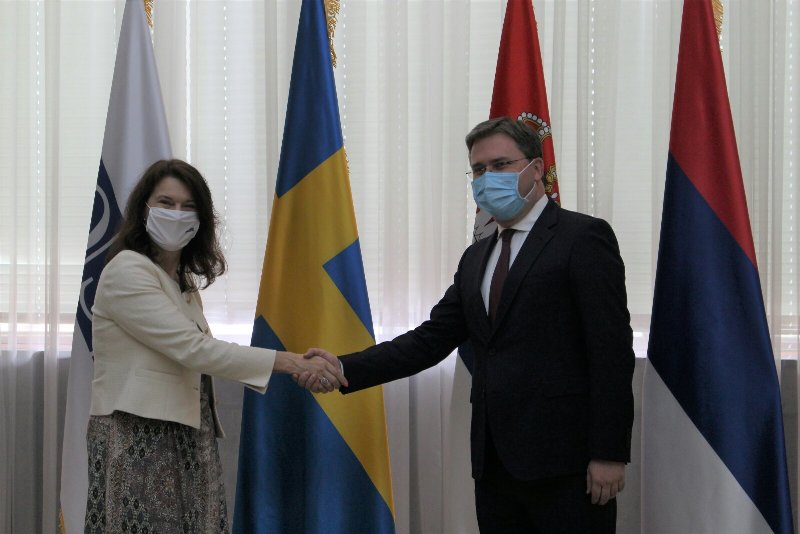
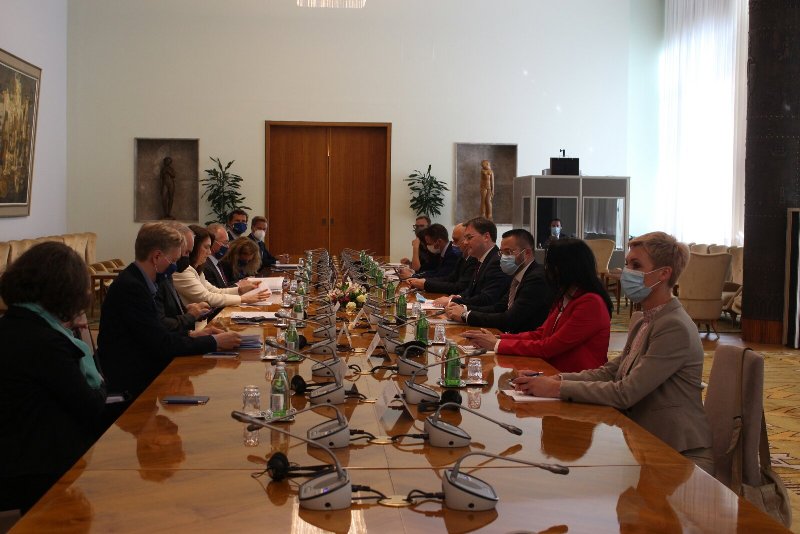 |
|
|
| Minister Selaković presented the new e-Consulate service |
|
20 May 2021
A new service of the Ministry of Foreign Affairs "e-Consulate" was presented in Belgrade today, intended for foreign citizens who apply for a visa and aspire to come to Serbia to work.
On that occasion, Minister of Foreign Affairs of the Republic of Serbia Nikola Selakovic said that this service was one of the indicators of good development of our country, which, as he pointed out, was becoming a magnet for serious foreign companies, which brought a large number of workers from other countries to work in Serbia.
"Not to be pretentious, but completely realistic, this service represents a turning point in the functioning of our system. E-Consulate and digitalization of the procedure for issuing work visas for foreign citizens who want to work in Serbia, is the first electronic service offered by the Foreign Ministry, and I can promise you that this is indeed our first, but by no means the last e-service", Selakovic emphasized.
The Head of Serbian diplomacy pointed out that "e-Consulate" reflected the modernization of an extremely important segment of the activities of diplomatic and consular missions of Serbia, and that we were actually talking about something that was essential for the further development processes of our country.
The Minister recalled that, when the President of the Republic visited the construction site of the Moravian Corridor, he was told that some construction works were delayed because Bechtel company was not issued work visas on time.
“The moment we saw that and heard the President, I alerted the services in the Ministry. We were surprised, as we knew that the issuance of visas in Turkey had a good dynamic, and then we determined that it was actually workers from Bangladesh who applied for a visa through our Embassy in India, where we have a problem with staff shortage”, the Minister explained.
As he added, this is a demanding and laborious task, each of our employees had to receive the documentation on paper, check it, then request additional information, and only then forward it.
"Today, this has been fantastically perfected for our consular officers, all that documentation is submitted in electronic form. We used to have two filters to check the documentation, now we actually have three. And the work is significantly more efficient", Selakovic pointed out.
As he emphasized, this is a service which was promised less than four months ago and it becomes available on Monday, in 95 diplomatic and consular missions of Serbia, i.e. in all our embassies and consulates general.
The biggest result of that endeavor, the Minister pointed out, apart from the advantage it would bring in the future work, was the fact that it was not a project of one state body, but a joint endeavor of the Ministry of Foreign Affairs, IT and eGovernment Office, General Secretariat of the Government, Ministry of the Interior, Ministry of Labor, Employment, Veterans and Social Affairs, National Employment Service.
“We did an extremely good job in record time. This is to the pride of our Ministry, to the pride of the entire state. I am convinced that in the period ahead, we will further modernize our affairs and make Serbia one of the few countries that has such mechanisms and such state-of-the-art provision of consular services", Selakovic said.
Speaking about the "e-Consulate" portal itself, the Minister explained that there is a cartoon of Nikola Tesla and the building of the old railway station with one crane, which actually symbolizes a historical fact - that Tesla was in Belgrade in the year when it was built.
"Today it is the place behind which the Belgrade of the future is rising, and what we managed to do together is an indicator of something that is the future of Serbia, the development of artificial intelligence, IT and creating conditions for more people to live and arrive here in Serbia in the future seeking good life and employment", concluded the Minister.
The Director of the Office for IT and eGovernment, Mihailo Jovanovic, said that this was the first time that e-services were focused on foreign citizens, which was the case with our citizens so far.
In the period from 1 January 2019 to 17 May this year, the most applications for Serbian visas were submitted at the Embassy in Beijing, 6,766 applications, then in New Delhi - 2,973, Shanghai 2,115, Tokyo 1,798, and Cairo 1,756.
In that period, 1,270 requests were submitted in Algiers, 1,095 in Jakarta, and 1,077 in Beirut.
In terms of their nationality, Serbian D visa for employment is most requested by citizens of China - 9,516 applications, followed by India 1,955, and Ukraine - 673.
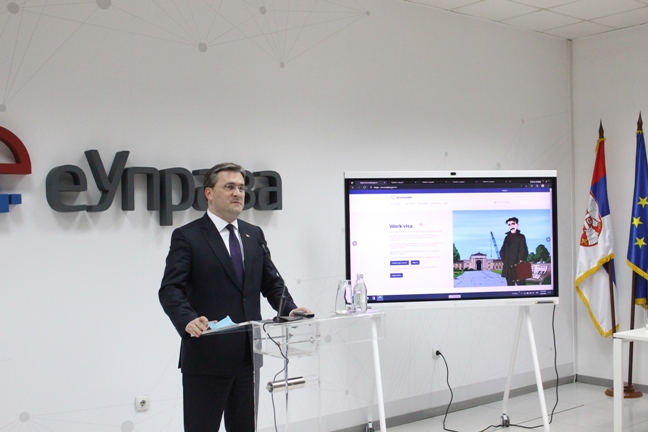
|
|
|
| Vucic: We consider Europe our home |
|
8 May 2021
President Vucic said tonight that the visionary idea of Robert Schuman brought a true victory of the new trust after the Second World War and faith in the unification of differences in peace and solidarity, with the message that Serbia has that faith, as well as hope that it will become a country that will be gladly regarded in the European family of nations.
Congratulating everyone in Serbia and the EU on Europe Day, Vucic reminded that 9 May was also the day when the great victory of freedom is celebrated, which was won with huge sacrifices.
"While the horrors of war were still fresh in memory and Europe was healing the wounds of World War II, it also had people like Robert Schuman who understood that future can only be created based on the reconciliation of nations and their unity", Vucic said at the reception on the occasion of Europe Day.
He pointed out that the European peoples dared to see the recent adversaries as future allies.
"Schuman's visionary idea that peace will be preserved, if the creative forces are commensurate with the dangers that threaten, that Europe will emerge from specific achievements, has brought a true victory of newly found trust and faith in uniting differences in peace and solidarity", Vucic said.
He said that Serbia, although it did not always look like that, had that faith, as well as the hope that our concrete achievements, on the long and not easy path to EU membership, would be adequately valued.
“And that with your help, support and criticism, Serbia will become a country that you will be happy to see in the European community of nations. I believe that with our support, help and criticism, we would also contribute to the EU becoming an even better place to live", Vucic said.
Full membership of the EU, with a compromise solution to the issue of Kosovo and Metohija, is a way to achieve the goal and make Serbia orderly and successful, which would mean that we are on a good, European path, the President of Serbia said.
Vucic said that we still had to make a lot of efforts in reforms, not because someone is asking us to do that, but because we know that it brings us and the country a benefit.
He also pointed out that the reforms in the rule of law were exceptionally important, which were now being approached with much more responsibility.
"In our country, there is a race in who will say that they are more in favour of Europe, while saying under the table that they are the least for Europe. Europe does not belong only to those who would like to use European money, it does not belong to those in the government who say that they are on the European path because they believe that they are in that way preventing the opposition from coming to power, nor to those who think that this is the only way to get hold of power. It belongs to all of us, but we cannot take from Europe only what we like without accepting what we do not like", he explained.
I know, he added, how difficult it is to us in Serbia to hear criticism concerning Kosovo as well as in the field of the rule of law.
"I saw for myself that we are the ones who did not pay enough attention and apply a dedicated approach to the burning problems in that area. I believe that with greater zeal we will be able to change the attitude of the citizens of Serbia and gain greater respect from the EU for what we are doing", he pointed out.
President Vucic also pointed out that the EU was undoubtedly the largest donor, investor, and by far the most important trade partner of Serbia, and recalled that about two-thirds of all trade and even more service activities were EU related and that these were facts, whether someone liked it or not.
He pointed out that seven years ago when he became the Prime Minister, three times fewer people were employed in companies that came from EU countries than today.
"Despite all the problems, it shows how much we managed to do together and make good results, to provide people with life, security at work, to show that we can take care of them more", Vucic said, noting the great EU assistance in the field of education.
He said that during the recent visit to the EU, which he assessed as the best one so far, Serbia received additional support for infrastructure projects, primarily for modernization, i.e. essentially the construction of a new Belgrade-Nis-Presevo railway.
He said that this was confirmed in the letter of the President of the European Commission, Ursula von der Leyen, pointing out that this was the best letter he had ever received from Brussels.
"I am grateful to Von der Leyen for pointing out that this is a game-changer in our relations. It is a turning point because that support exceeds everything we have done together when you look at the scale, strength and significance of that project", he said.
He said that Serbia and its citizens considered Europe as their home and that is why we wanted to give our best contribution to peace through regional connectivity, the Berlin Conference and mini-Schengen.
"Encouraged by the message of European officials, I hope that I will be able to host them soon so that we can discuss the further acceleration of our European path", Vucic concluded.
Head of the Delegation of the European Union to Serbia Sem Fabrizi hosted a reception tonight on the occasion of marking 9 May, Europe Day. In addition to Serbian President Aleksandar Vucic, the reception in the Belgrade City Assembly was attended by Serbian Parliament Speaker Ivica Dacic, Serbian Prime Minister Ana Brnabic, Foreign Minister Nikola Selakovic, European Integration Minister Jadranka Joksimovic, representatives of the diplomatic corps and public figures.
Europe Day was established in memory of the beginning of the creation of the European Union (EU) and the Day of Victory over Fascism in the Second World War. The reception is held in memory of 9 May 1950, when the Schuman Declaration was signed, which laid the foundations of the European Union, a project that brought the longest period without war on the Old Continent.
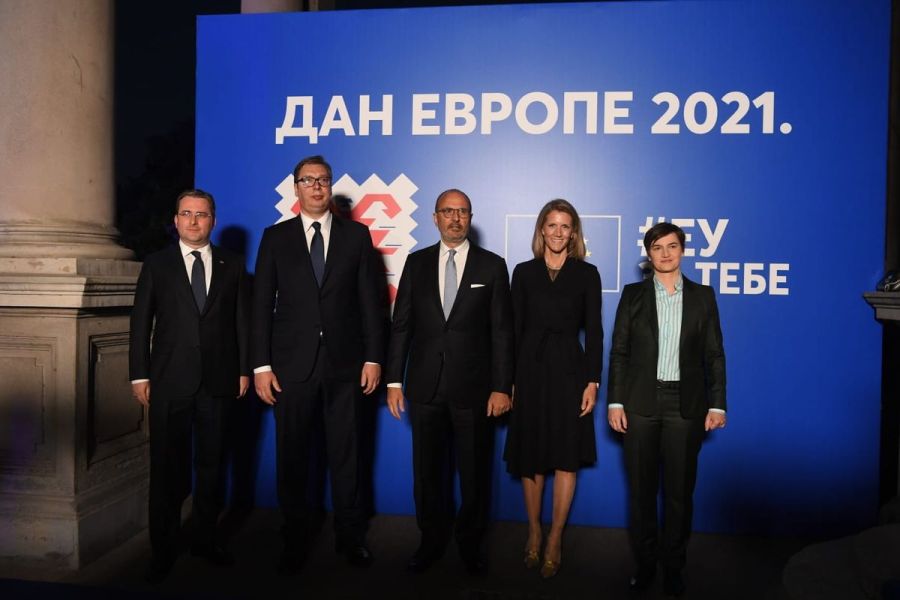
Source: Tanjug
Photo: Tanjug |
|
|
| Selakovic congratulates Josep Borrell on Europe Day |
|
8 May 2021
Minister of Foreign Affairs of the Republic of Serbia Nikola Selakovic extended a congratulatory message on the occasion of 9 May, Europe Day, to High Representative of the EU for Foreign Affairs and Security Policy Josep Borrell, expressing confidence that the idea of uniting in diversity, in peace and solidarity, would continue to be the guiding idea of the European Union.
"I am deeply convinced that the Republic of Serbia, through a policy of peace and good-neighbourly cooperation, can contribute to the European Union becoming an even better place to live, with the sincere belief that our achievements on the path to membership in the European family of nations will be adequately valued", reads the congratulatory message by Minister Selakovic, adding that the European perspective gave a strong impetus for our country to comprehensively implement political, economic and social reforms with the aim of becoming a full member of the European Union in the foreseeable future.
The Serbian Foreign Minister underlined that Serbia historically, culturally and in terms of values, belonged to the circle of countries united under the flag of the European Union and expressed hope that not only our country, but also our neighbours in the Western Balkans, would have the opportunity in the near future to become a part of what is without a doubt the most successful peace, democratic and economic project in the history of our common continent.
Selakovic also took the opportunity to extend gratitude on behalf of Serbia to the European Union for its assistance in the fight against the infectious Covid-19, emphasizing that our country highly appreciated the expressed solidarity and support in the difficult times of the pandemic outbreak and expressing confidence that the period ahead would see us contribute by joint forces to identifying solutions for overcoming the economic consequences of the corona virus pandemic.
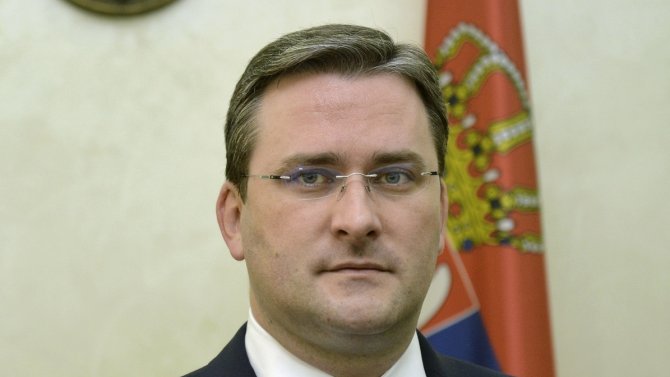
|
|
|
| Non-working day in the embassy |
|
The Embassy of the Republic of Serbia will be closed on Thursday, 13 May 2021 in observance of the Ascension Day. The consular section of the Embassy will be opened only for urgent matters. |
|
|
| INFORMATION ON VACCINATION AGAINST CORONAVIRUS IN SERBIA |
|
(updated: 26 April 2021)
Vaccination (immunization) in Serbia began on 24 December (earlier than in the majority of European countries). Prime Minister Ana Brnabic received the first vaccine. She was also the first Prime Minister in Europe to receive the vaccine shot.
Serbia was the third country in Europe, after Britain and Switzerland, to start the vaccination. In Serbia, mass vaccination of the population in the fight against Covid-19 launched on 19 January.
Medical staff was the first to receive the vaccine, the immunization of geriatric centres' patrons followed, and the vaccines were then administered to the personnel of the Ministry of the Interior, Serbian Army and other security services, media representatives and others.
In Serbia, citizens express interest to be vaccinated against Covid-19 through the e-Government portal or by phone - via the contact center, upon which they receive a message with the date and time of vaccination appointment.
The Serbian Government informed that it enabled registering for vaccination against coronavirus via Viber app, starting 6 April, which is available through the official info service of the Serbian Government launched on Viber.
As of 9 April, all local governments will start arranging open vaccination posts where citizens will be able to get vaccine shots without prior registration, while the immunization of citizens who registered via e-Government portal or the Viber app will also be carried out at the same time.
More than 1,700,000 citizens applied through the e-Government portal or contact centers. Between 10,000 and 15,000 citizens apply for vaccination daily through the e-Government portal.
Citizens are able choose the vaccine they wish to receive, and the following are available: Pfizer-BioNTech, Chinese Sinopharm, Russian Sputnik V and AstraZeneca.
Serbia is one of the few countries that has four vaccines at its disposal.
According to the data, 70 percent of those vaccinated received the Sinopharm vaccine (more than a million citizens), 12 percent received the Pfizer vaccine, 9 percent Sputnik V and 9 percent the AstraZeneca vaccine.
52% of women are immunized, and most citizens received the "Sinofarm" vaccine.
The elderly are constantly pleaded with and invited to apply for the vaccine if they have not already, considering that citizens over 70 years of age are a priority. At the same time, citizens of all ages are invited to register and get vaccinated, since immunization has also begun of those who are not in the priority groups. Medical workers have also been vaccinating residents of smaller and rural areas, who have not registered via e-Government.
The importance of vaccination is constantly emphasized, as well as the fact that it is the only solution in the fight against the Covid-19 virus.
* On 26 April - Director of the Office for e-Government Mihailo Jovanovic said that from tomorrow, vaccination without making an appointment will be possible at all vaccination posts throughout Serbia, with three vaccines available - Pfizer, Sputnik V and Sinopharm.
According to the latest information, 3.255.000 vaccine doses were given in Serbia, out of which fully vaccinated citizens (having received both doses) account for 1.310.000 (a third of the Serbian adult population). It is estimated that by the end of April, we will have about 40 percent of the adult population vaccinated with the first vaccine dose.
1.200,000 citizens were fully immunized - which means that three weeks have passed since their second dose, or 5 weeks since their first dose in the case of AstraZeneca.
In the age group between 65 and 74, more than 51 percent of the population has been vaccinated, and in the age group over 75, we have 42 percent of those vaccinated.
*On April 6, President Vucic was vaccinated in Rudna Glava, receiving the Chinese Sinopharm vaccine.
On Thursday, 8 April, Serbia broke its own record for the number of persons vaccinated, when more than 75,000 people were vaccinated. This is a result that, in proportion to the number of citizens, even the most developed countries in Europe and the world cannot take pride in.
The goal is to have more than 2,800,000 persons vaccinated, and 2,200,000 revaccinated by the end of May, and more than three million vaccinated and revaccinated persons by the end of June.
Belgrade, Novi Sad, Nis, Uzice and Sremska Mitrovica are at the top of the list with about 36 or 37 percent of vaccinated adult citizens.
*Example of Belgrade – *On 26 April - The millionth dose of the coronavirus vaccine was administered in the capital of Serbia.
40,8 percent of adult citizens have been vaccinated (574.729 citizens), out of which fully vaccinated citizens 402.416 or 28,6 percent. There are additional 18 posts in city municipalities where they can be vaccinated without making an appointment. When it comes to senior citizens, aged 65 to 74, more than 70,2 percent of that population was vaccinated.
PROCUREMENT OF VACCINES
*On 22 December, the first quantities of Pfizer-BioNTech vaccine were delivered to Serbia. Serbia is the second country in Europe, after Great Britain, to receive the Pfizer vaccine.
*On 16 January, one million doses of the Chinese Sinopharm vaccine arrived.
*On 29 January, 40,000 million doses of the Russian Sputnik V vaccine arrived.
*On 9 February, a new consignment of 50,000 Sputnik V vaccines arrived from Russia.
*On 11 February, Russian experts arrived in Serbia and discussed with Serbian experts how to start the production of Russian vaccines in Serbia as soon as possible. They visited the Torlak Institute in order to assess the technological and personnel capacities of the Institute for the production of the Sputnik V vaccine.
President Vucic announced that our country will invest in new plants, new equipment that would meet all standards, with the goal of producing the vaccine in our country. The Sputnik V vaccine would be distributed to the region from our country, but also to European countries.
* On 10 February, another batch of 500,000 Chinese Sinopharm vaccines arrived in Serbia.
* On 15 February, 40,950 doses of the Pfizer-BioNTech company vaccine against coronavirus arrived in Serbia.
*On 21 February, 150,000 AstraZeneca vaccines arrived in Serbia, which have been available at every vaccination post since 23 February. Serbia was the first country in the Balkans to have this vaccine at that point in time.
*On 22 February, 46,800 more Pfizer vaccines arrived in Serbia.
*On 22 February, 50,000 more Sputnik V vaccines were delivered.
*On 28 February, a new consignment of 100,000 doses of the Sputnik V vaccine arrived (this was a delivery of the second dose of the vaccine - for revaccination), since the first and second doses have a different composition.
*On 1 March, a delivery of 58,500 Pfizer-BioNTech vaccines arrived.
*On 4 March - during his official visit to Berlin, Minister of Foreign Affairs Nikola Selakovic said that German Foreign Minister Heiko Maas informed him that Serbia would soon receive 300,000 vaccines from the COVAX program (the first doses arrived on 2 April).
* On 5 March, 500,000 more Sinopharm vaccines were delivered.
*On 8 March, 28,080 doses of vaccines by Pfizer- BioNTech company arrived.
*On 11 March – Minister Popovic announced that the production of the Russian Sputnik V vaccine at the Torlak Institute will begin in May, and that Serbia will thus become the first country in the territory of Europe where this vaccine is produced.
The first phase of production of the Russian vaccine in Serbia implies transport of the substance, filling of bottles in accordance with the highest technological standards, packaging and distribution of vaccines in our country and region, and after the establishment of the first phase of production, the preparation of a feasibility study will begin on production in the so-called full cycle, which includes the production of the substance in Serbia. This will require the procurement of complex technological equipment and the expansion of Torlak's production capacities, but estimates are that full-cycle production could begin by the end of this year.
*On 11 March – during his visit to the UAE, Serbian President Aleksandar Vucic announced that it had been agreed that, together with the United Arab Emirates and China, a vaccine against the coronavirus of the Chinese company Sinopharm would be produced in Serbia. President Vucic pointed out that, in addition to the timetable made with the competent Russian minister for the production of the Russian vaccine at Torlak, it was agreed that the factory for the Sinopharm vaccine would be completed and start production from 15 October.
*On 15 March - A delivery of 16,380 doses of Pfizer-BioNTech vaccine arrived.
*On 18 March - President Aleksandar Vucic talked via video link with the management of Sinopharm company about the process of procuring vaccines, building a factory of Chinese vaccines in Serbia and building and equipping Serbian hospitals. An agreement on the purchase of another two million doses of Sinopharm vaccines was signed at the meeting.
* On 18 March - President Vucic announced that Serbia will have two vaccine factories and will produce between 30 and 40 million doses a year. The President had talks with the representatives of Sinopharm, while Minister Nenad Popovic discussed the production of the Sputnik V vaccine. (He stated that he expected that in less than a year, the liquid for the vaccine would be produced, and not just packaged.)
*On 22 March - 55,990 doses of Pfizer-BioNTech vaccine were delivered.
*On 23 March - 100,000 doses of the first component of the Sputnik V vaccine arrived in Serbia.
*On 25 March - The Russian Direct Investment Fund and the Institute of Virology, Vaccines and Sera “Torlak” announced that an agreement has been reached on the production of the Sputnik V vaccine in Serbia. This will make our country the first state in Southern Europe to produce Sputnik V, and the vaccine could be exported to other countries in the region at later stages. The production of the vaccine will start by May at Torlak.
*On 29 March - 23,570 doses of Pfizer-BioNTech vaccine arrived.
Serbia paid EUR 4.8 million in advance to the COVAX system, and we donated EUR 2 million for the development of the vaccine through the European Commission. Since no vaccines from the COVAX programme were delivered to Serbia, Serbia procured them bilaterally.
*On 2 April, the first consignment of 57,600 AstraZeneca vaccines arrived through the COVAX mechanism.
*On 5 April, half a million Sinopharm vaccines arrived.
The Prime Minister stated that 2.5 million vaccines were delivered to Serbia from China alone, and that a little less than a million of vaccines were delivered by all other manufacturers.
*On 5 April - The Torlak Institute signed a Technology Transfer Agreement with the Russian Direct Investment Fund and the Russian pharmaceutical company Generium, under which the Russian side will transmit to the Serbian side data on procedures and technologies required for the production of the Sputnik V vaccine in Serbia.
Minister Nenad Popovic announced that three validation series of the Sputnik V vaccine would be produced in April, and that samples from these validation series would be sent for quality control to the Gamaleya Institute, and after the institute confirms the validity of samples produced at Torlak, our institute would start the production of the vaccine. This is expected to materialize by 20 May this year, and in that way Serbia will become the first country in Europe to produce the Sputnik V vaccine.
*On 6 April, 106,420 vaccines manufactured by Pfizer-BioNTech were delivered.
With that delivery, Serbia procured a total of 3.5 million vaccines, paid for all the vaccines, as well as all that we received from the COVAX system.
*On 12 April - 106,470 doses of Pfizer-BioNTech vaccine arrived.
*14 April – The first series of control doses of the Sputnik V vaccine was filled at Torlak. The vaccines produced at Torlak will be released in June this year.
*15 April – President Vucic announced that another 211,000 Pfizer vaccines would arrive on Monday, 19 April, as well as that 50,000 doses of the second component of the Russian vaccine arrived on 14 April, and that on 16 April another batch of same quantity was expected, as are another 100,000 doses of the Sputnik V first component on Monday or Tuesday. Chinese Sinopharm vaccines are also expected by the end of this month.
*19 April - 211,000 doses of the Pfizer vaccine arrived in Serbia, which is the largest single delivery of that vaccine to our country so far.
* On 23 April – President Vucic said that we have enough vaccines and that vaccination in the region is important. He said that Serbia received the largest number of vaccines against the coronavirus from the Chinese company Sinopharm and then from the Pfizer-BioNTech company, that he expected 36,000 vaccines from the EU, and stressed that it was important for Serbia that citizens in the region were also vaccinated.
"Out of the planned 96,000 vaccines from COVAX, we have so far received 57,000. From the EU out of the total quota of 630,000 doses that should arrive by the end of June, Serbia should receive about 270,000 or 260,000 in proportion to the population, and we will receive only 36,000 vaccines", Vucic stated.
He added that Serbia agreed with that because those vaccines were more important to other parts of our region.
„We believe that as important those vaccines are for us, they are equally important for our neighbours. Everything we have been doing is meaningless if they cannot get the vaccine. People who come to Belgrade and have sports, business and other contacts, it is important for us that they cannot transmit the infection", Vucic stated.
He thanked the EU and COVAX, but noted that Serbia received the most vaccines from Sinopharm, and then from Pfizer-BioNTech.
As he said, Serbia received a significantly higher number of vaccines from the US-German company, by as many as 250,000 doses more than the Russian vaccine.
He pointed out that Serbia was the only country outside the EU that started vaccination with the Pfizer vaccine at the same time as the EU and that, when it comes to the delivery of vaccines, vaccines from Sinopharm and Pfizer-BioNTech companies arrived on time, and deliveries of some other manufacturers were late.
Vucic added that Serbia would continue the vaccination, as well as that it managed to provide vaccines through hard work.
*On 26 April - A new batch of 500,000 Chinese Sinopharm vaccines against coronavirus arrived in Serbia.
VACCINE DONATIONS TO COUNTRIES IN THE REGION AND VACCINATION OF FOREIGNERS
*On 14 February - President Vucic handed over the first batch of 4,680 Pfizer vaccines to Prime Minister of North Macedonia Zoran Zaev, while on 24 February, Minister Loncar handed over another 3,510 doses of Pfizer vaccine to the Macedonian Minister of Health.
*On 17 February - Serbia donated 2,000 Sputnik V vaccines to Montenegro.
*Approximately 5,000 health care workers from the Republic of Srpska have been vaccinated in Serbia so far, and our country will make the vaccination information system available to the Republic of Srpska so that they can use it when they have enough vaccines.
*On 2 March – Serbian President Aleksandar Vucic handed over to the Chairman and Members of the Presidency of Bosnia and Herzegovina a batch of 5,000 AstraZeneca company vaccines donated by Serbia to Bosnia and Herzegovina, while on 12 March, another 5,000 doses of AstraZeneca vaccine were delivered from Serbia.
* On 15 March – all employees of the Constitutional Court of Bosnia and Herzegovina were vaccinated at a hospital in Uzice, at the request of that court, in cooperation with the Constitutional Court of Serbia, the Ministry of Health, the Ministry of Foreign Affairs and the Serbian Embassy in Sarajevo.
*On 23 March - vaccination of 105 journalists from North Macedonia began at the Public Health Institute in Vranje. AstraZeneca vaccines for Macedonian journalists were provided at the request of the Macedonian Association of Journalists in cooperation with the Journalists' Association of Serbia, and with the support of the Office of the Serbian President.
*On 23 March - President Aleksandar Vucic handed over ventilators and other medical equipment for the Republic of Srpska. The donation was received by Chairman of the Presidency of Bosnia and Herzegovina Milorad Dodik.
*On 24 March - The Chamber of Commerce and Industry of Serbia (PKS) announced that, in cooperation with the Serbian Government, 10,000 vaccines were provided for businessmen from the region and their employees.
*On 29 March - The President of the Chamber of Commerce and Industry of Serbia announced that 8,500 businessmen from the region were vaccinated in Serbia over the weekend (on 27 and 28 March).
*Serbia donated a total of 40,000 doses of the Sputnik V vaccine to North Macedonia, the first batch of 20,000 vaccines for the first dose arrived on 1 April, and it was announced that the revaccination doses would arrive in the following period.
39,000 foreign nationals were vaccinated (using AstraZeneca vaccine), who arrived either at the invitation of the Serbian Chamber of Commerce or registered on their own via the e-Government portal. Prime Minister Brnabic stated that the vaccination of people from the region was a huge success and assessed that this was a way to raise common security, because if people in the region were not safe, people in Serbia were not safe either. The most numerous were citizens of Bosnia and Herzegovina, North Macedonia and Montenegro
*On 8 April - The Prime Minister stated that Serbia was currently focused on vaccinating its citizens, but that we would endeavour to help friends and neighbours in the fight against coronavirus through vaccine donations.
Around 53,000 foreign nationals who do not have a registered residence in Serbia have applied for vaccination in Serbia, by registering for vaccination via the e-Government portal. Foreign nationals are currently not being vaccinated, but Serbian citizens only, and once they have been vaccinated the option of vaccinating registered foreign nationals will be considered. Vaccination is free in Serbia, and the same applies to foreign nationals who get a vaccine shot in our country.
Advertisements for vaccination through agencies have appeared on social media and the internet, however, it is not possible to make a vaccination appointment in Serbia through any foreign or domestic travel agency, and these are internet frauds.
*On 8 April - The Government has decided to send a donation of 20,000 doses of AstraZeneca vaccine to the Canton of Sarajevo.
*On 9 April - 29 journalists from the Sarajevo Canton Television were vaccinated in Novi Pazar.
On 10 April - Chairman of the Presidency of Bosnia and Herzegovina Milorad Dodik stated that he had agreed with the Serbian President that around 20,000 vaccines would be delivered from Serbia to the Republic of Srpska early next week.
*On 23 April – President Vucic said that Serbia had sent 120,000 vaccines to the region so far, as well as that about 65,000 citizens from the countries of the region were vaccinated in Serbia, which made up a total of about 200,000 vaccines for the people in the region.
NOTE:
Due to the noticeable increased interest and a large number of inquiries made to our diplomatic and consular missions regarding vaccination of foreign nationals in Serbia (without a registered permanent residence in our country), but also the arrival of foreign nationals on their own initiative to be vaccinated in Serbia, it is important, in such situations to unequivocally communicate the following in receiving countries, through the media and in direct contact with interested parties:
"Vaccination of foreign nationals, primarily from the region, is a huge success for Serbia. This is a way to raise common security, because without safe people in the region, people in Serbia are not safe either. Most of the foreign citizens who were vaccinated in Serbia came from Bosnia and Herzegovina, North Macedonia and Montenegro.
In recent days, due to great publicity in the media around the world and the well-organized process of procurement of vaccines and immunization in Serbia, there is a great interest in being vaccinated in our country, not only from the region but also from a large part of Western and Central Europe. A large number of inquiries has also been recorded for "vaccine tourism", both of citizens from those parts of Europe, and of tour operators, travel agencies and airlines.
Serbia is currently focused on vaccinating its citizens, but we will endeavour to help our friends and neighbours in the fight against coronavirus, in the period ahead as well, through vaccine donations.
In recent days, the interest of the domestic population in vaccination has increased, and Serbia is making daily records in vaccinating its own population.
Should the possibility arise in the period ahead for vaccination of interested foreign nationals (without a registered permanent residence in Serbia), Serbia will be very pleased and, to the extent of its capacities, endeavour to accommodate such requests as well. In that case, we will inform the public in a timely manner. But we must note that this is not possible at this moment.
Foreign citizens are able express interest in being vaccinated in Serbia via the eGovernment portal, but it is important to note that this is not enough and that it is necessary to receive a confirmation response and an invitation with the date/time and location of vaccination. For this reason it is not advisable that foreign nationals, having only expressed interest through the eGovernment portal or even without doing so (since there have been such examples at vaccination posts), come to Serbia on their own initiative to be vaccinated and thus expose themselves to unpleasant situations and costs."
VACCINATION OF MEMBERS OF THE DIPLOMATIC CORPS IN SERBIA
The Serbian Government was among the first in the world to enable the immunization of members of the diplomatic corps in Serbia. All four vaccines are available.
Close to 1,300 members of the diplomatic corps, holders of special ID cards (diplomatic, official, consular, etc.), registered and were vaccinated.
*On 13, 18 and 19 February, Sinopharm vaccines were administered. This completed the first round of vaccination. The second round, that is, revaccination with that vaccine, was carried out on 11 and 12 March.
*On 23 February, vaccination with the Pfizer vaccine began. Revaccination using this vaccine was carried out from 16 to 19 March.
Also, vaccination with Sputnik V and AstraZeneca started.
*On 20 March, remaining revaccinations were performed and it was also made possible for members of the diplomatic corps to receive the vaccine, who for certain reasons could not be vaccinated.
VACCINATION OF MIGRANTS
*On 24 March, the vaccination of migrants started in the outpatient clinic of the migrant center in Krnjaca. Around 500 migrants have registered.
Head of UNHCR Office in Serbia Francesca Bonelli pointed out that this UN agency was deeply grateful to the Serbian authorities for including the refugees in the vaccination plan.
|
|
|
| Non-working days at the Embassy |
|
The Embassy of the Republic of Serbia will be closed on Friday, 30 April, Monday, 3 May and on Tuesday, 4 May 2021 in observance of Easter and International Labour Day. The consular section of the Embassy will be opened only for urgent matters. |
|
|
| INFORMATION ON VACCINATION AGAINST CORONAVIRUS IN SERBIA |
|
(updated: 23 April 2021)
Vaccination (immunization) in Serbia began on 24 December (earlier than in the majority of European countries). Prime Minister Ana Brnabic received the first vaccine. She was also the first Prime Minister in Europe to receive the vaccine shot.
Serbia was the third country in Europe, after Britain and Switzerland, to start the vaccination. In Serbia, mass vaccination of the population in the fight against Covid-19 launched on 19 January.
Medical staff was the first to receive the vaccine, the immunization of geriatric centres' patrons followed, and the vaccines were then administered to the personnel of the Ministry of the Interior, Serbian Army and other security services, media representatives and others.
In Serbia, citizens express interest to be vaccinated against Covid-19 through the e-Government portal or by phone - via the contact center, upon which they receive a message with the date and time of vaccination appointment.
The Serbian Government informed that it enabled registering for vaccination against coronavirus via Viber app, starting 6 April, which is available through the official info service of the Serbian Government launched on Viber.
As of 9 April, all local governments will start arranging open vaccination posts where citizens will be able to get vaccine shots without prior registration, while the immunization of citizens who registered via e-Government portal or the Viber app will also be carried out at the same time.
More than 1,700,000 citizens applied through the e-Government portal or contact centers. Between 10,000 and 15,000 citizens apply for vaccination daily through the e-Government portal.
Citizens are able choose the vaccine they wish to receive, and the following are available: Pfizer-BioNTech, Chinese Sinopharm, Russian Sputnik V and AstraZeneca.
Serbia is one of the few countries that has four vaccines at its disposal.
According to the data, 70 percent of those vaccinated received the Sinopharm vaccine (more than a million citizens), 12 percent received the Pfizer vaccine, 9 percent Sputnik V and 9 percent the AstraZeneca vaccine.
The elderly are constantly pleaded with and invited to apply for the vaccine if they have not already, considering that citizens over 70 years of age are a priority. At the same time, citizens of all ages are invited to register and get vaccinated, since immunization has also begun of those who are not in the priority groups. Medical workers have also been vaccinating residents of smaller and rural areas, who have not registered via e-Government.
The importance of vaccination is constantly emphasized, as well as the fact that it is the only solution in the fight against the Covid-19 virus.
According to the latest information, 3.163.499 vaccine doses were given in Serbia, out of which fully vaccinated citizens (having received both doses) account for 1.282.971 (a third of the Serbian adult population). It is estimated that by the end of April, we will have about 40 percent of the adult population vaccinated with the first vaccine dose.
950,000 citizens were fully immunized - which means that three weeks have passed since their second dose, or 5 weeks since their first dose in the case of AstraZeneca.
In the age group between 65 and 74, more than 51 percent of the population has been vaccinated, and in the age group over 75, we have 42 percent of those vaccinated.
*On April 6, President Vucic was vaccinated in Rudna Glava, receiving the Chinese Sinopharm vaccine.
On Thursday, 8 April, Serbia broke its own record for the number of persons vaccinated, when more than 75,000 people were vaccinated. This is a result that, in proportion to the number of citizens, even the most developed countries in Europe and the world cannot take pride in.
The goal is to have more than 2,800,000 persons vaccinated, and 2,200,000 revaccinated by the end of May, and more than three million vaccinated and revaccinated persons by the end of June.
Belgrade, Novi Sad, Nis, Uzice and Sremska Mitrovica are at the top of the list with about 36 or 37 percent of vaccinated adult citizens.
*Example of Belgrade – 40,8 percent of adult citizens have been vaccinated (574.729 citizens), out of which fully vaccinated citizens 402.416 or 28,6 percent. There are additional 18 posts in city municipalities where they can be vaccinated without making an appointment. When it comes to senior citizens, aged 65 to 74, more than 70,2 percent of that population was vaccinated.
PROCUREMENT OF VACCINES
*On 22 December, the first quantities of Pfizer-BioNTech vaccine were delivered to Serbia. Serbia is the second country in Europe, after Great Britain, to receive the Pfizer vaccine.
*On 16 January, one million doses of the Chinese Sinopharm vaccine arrived.
*On 29 January, 40,000 million doses of the Russian Sputnik V vaccine arrived.
*On 9 February, a new consignment of 50,000 Sputnik V vaccines arrived from Russia.
*On 11 February, Russian experts arrived in Serbia and discussed with Serbian experts how to start the production of Russian vaccines in Serbia as soon as possible. They visited the Torlak Institute in order to assess the technological and personnel capacities of the Institute for the production of the Sputnik V vaccine.
President Vucic announced that our country will invest in new plants, new equipment that would meet all standards, with the goal of producing the vaccine in our country. The Sputnik V vaccine would be distributed to the region from our country, but also to European countries.
* On 10 February, another batch of 500,000 Chinese Sinopharm vaccines arrived in Serbia.
* On 15 February, 40,950 doses of the Pfizer-BioNTech company vaccine against coronavirus arrived in Serbia.
*On 21 February, 150,000 AstraZeneca vaccines arrived in Serbia, which have been available at every vaccination post since 23 February. Serbia was the first country in the Balkans to have this vaccine at that point in time.
*On 22 February, 46,800 more Pfizer vaccines arrived in Serbia.
*On 22 February, 50,000 more Sputnik V vaccines were delivered.
*On 28 February, a new consignment of 100,000 doses of the Sputnik V vaccine arrived (this was a delivery of the second dose of the vaccine - for revaccination), since the first and second doses have a different composition.
*On 1 March, a delivery of 58,500 Pfizer-BioNTech vaccines arrived.
*On 4 March - during his official visit to Berlin, Minister of Foreign Affairs Nikola Selakovic said that German Foreign Minister Heiko Maas informed him that Serbia would soon receive 300,000 vaccines from the COVAX program (the first doses arrived on 2 April).
* On 5 March, 500,000 more Sinopharm vaccines were delivered.
*On 8 March, 28,080 doses of vaccines by Pfizer- BioNTech company arrived.
*On 11 March – Minister Popovic announced that the production of the Russian Sputnik V vaccine at the Torlak Institute will begin in May, and that Serbia will thus become the first country in the territory of Europe where this vaccine is produced.
The first phase of production of the Russian vaccine in Serbia implies transport of the substance, filling of bottles in accordance with the highest technological standards, packaging and distribution of vaccines in our country and region, and after the establishment of the first phase of production, the preparation of a feasibility study will begin on production in the so-called full cycle, which includes the production of the substance in Serbia. This will require the procurement of complex technological equipment and the expansion of Torlak's production capacities, but estimates are that full-cycle production could begin by the end of this year.
*On 11 March – during his visit to the UAE, Serbian President Aleksandar Vucic announced that it had been agreed that, together with the United Arab Emirates and China, a vaccine against the coronavirus of the Chinese company Sinopharm would be produced in Serbia. President Vucic pointed out that, in addition to the timetable made with the competent Russian minister for the production of the Russian vaccine at Torlak, it was agreed that the factory for the Sinopharm vaccine would be completed and start production from 15 October.
*On 15 March - A delivery of 16,380 doses of Pfizer-BioNTech vaccine arrived.
*On 18 March - President Aleksandar Vucic talked via video link with the management of Sinopharm company about the process of procuring vaccines, building a factory of Chinese vaccines in Serbia and building and equipping Serbian hospitals. An agreement on the purchase of another two million doses of Sinopharm vaccines was signed at the meeting.
* On 18 March - President Vucic announced that Serbia will have two vaccine factories and will produce between 30 and 40 million doses a year. The President had talks with the representatives of Sinopharm, while Minister Nenad Popovic discussed the production of the Sputnik V vaccine. (He stated that he expected that in less than a year, the liquid for the vaccine would be produced, and not just packaged.)
*On 22 March - 55,990 doses of Pfizer-BioNTech vaccine were delivered.
*On 23 March - 100,000 doses of the first component of the Sputnik V vaccine arrived in Serbia.
*On 25 March - The Russian Direct Investment Fund and the Institute of Virology, Vaccines and Sera “Torlak” announced that an agreement has been reached on the production of the Sputnik V vaccine in Serbia. This will make our country the first state in Southern Europe to produce Sputnik V, and the vaccine could be exported to other countries in the region at later stages. The production of the vaccine will start by May at Torlak.
*On 29 March - 23,570 doses of Pfizer-BioNTech vaccine arrived.
Serbia paid EUR 4.8 million in advance to the COVAX system, and we donated EUR 2 million for the development of the vaccine through the European Commission. Since no vaccines from the COVAX programme were delivered to Serbia, Serbia procured them bilaterally.
*On 2 April, the first consignment of 57,600 AstraZeneca vaccines arrived through the COVAX mechanism.
*On 5 April, half a million Sinopharm vaccines arrived.
The Prime Minister stated that 2.5 million vaccines were delivered to Serbia from China alone, and that a little less than a million of vaccines were delivered by all other manufacturers.
*On 5 April - The Torlak Institute signed a Technology Transfer Agreement with the Russian Direct Investment Fund and the Russian pharmaceutical company Generium, under which the Russian side will transmit to the Serbian side data on procedures and technologies required for the production of the Sputnik V vaccine in Serbia.
Minister Nenad Popovic announced that three validation series of the Sputnik V vaccine would be produced in April, and that samples from these validation series would be sent for quality control to the Gamaleya Institute, and after the institute confirms the validity of samples produced at Torlak, our institute would start the production of the vaccine. This is expected to materialize by 20 May this year, and in that way Serbia will become the first country in Europe to produce the Sputnik V vaccine.
*On 6 April, 106,420 vaccines manufactured by Pfizer-BioNTech were delivered.
With that delivery, Serbia procured a total of 3.5 million vaccines, paid for all the vaccines, as well as all that we received from the COVAX system.
*On 12 April - 106,470 doses of Pfizer-BioNTech vaccine arrived.
*14 April – The first series of control doses of the Sputnik V vaccine was filled at Torlak. The vaccines produced at Torlak will be released in June this year.
*15 April – President Vucic announced that another 211,000 Pfizer vaccines would arrive on Monday, 19 April, as well as that 50,000 doses of the second component of the Russian vaccine arrived on 14 April, and that on 16 April another batch of same quantity was expected, as are another 100,000 doses of the Sputnik V first component on Monday or Tuesday. Chinese Sinopharm vaccines are also expected by the end of this month.
*19 April - 211,000 doses of the Pfizer vaccine arrived in Serbia, which is the largest single delivery of that vaccine to our country so far.
VACCINATION OF MEMBERS OF THE DIPLOMATIC CORPS IN SERBIA
The Serbian Government was among the first in the world to enable the immunization of members of the diplomatic corps in Serbia. All four vaccines are available.
Close to 1,300 members of the diplomatic corps, holders of special ID cards (diplomatic, official, consular, etc.), registered and were vaccinated.
*On 13, 18 and 19 February, Sinopharm vaccines were administered. This completed the first round of vaccination. The second round, that is, revaccination with that vaccine, was carried out on 11 and 12 March.
*On 23 February, vaccination with the Pfizer vaccine began. Revaccination using this vaccine was carried out from 16 to 19 March.
Also, vaccination with Sputnik V and AstraZeneca started.
*On 20 March, remaining revaccinations were performed and it was also made possible for members of the diplomatic corps to receive the vaccine, who for certain reasons could not be vaccinated.
VACCINE DONATIONS TO COUNTRIES IN THE REGION
*On 14 February - President Vucic handed over the first batch of 4,680 Pfizer vaccines to Prime Minister of North Macedonia Zoran Zaev, while on 24 February, Minister Loncar handed over another 3,510 doses of Pfizer vaccine to the Macedonian Minister of Health.
*On 17 February - Serbia donated 2,000 Sputnik V vaccines to Montenegro.
*Approximately 5,000 health care workers from the Republic of Srpska have been vaccinated in Serbia so far, and our country will make the vaccination information system available to the Republic of Srpska so that they can use it when they have enough vaccines.
*On 2 March – Serbian President Aleksandar Vucic handed over to the Chairman and Members of the Presidency of Bosnia and Herzegovina a batch of 5,000 AstraZeneca company vaccines donated by Serbia to Bosnia and Herzegovina, while on 12 March, another 5,000 doses of AstraZeneca vaccine were delivered from Serbia.
* On 15 March – all employees of the Constitutional Court of Bosnia and Herzegovina were vaccinated at a hospital in Uzice, at the request of that court, in cooperation with the Constitutional Court of Serbia, the Ministry of Health, the Ministry of Foreign Affairs and the Serbian Embassy in Sarajevo.
*On 23 March - vaccination of 105 journalists from North Macedonia began at the Public Health Institute in Vranje. AstraZeneca vaccines for Macedonian journalists were provided at the request of the Macedonian Association of Journalists in cooperation with the Journalists' Association of Serbia, and with the support of the Office of the Serbian President.
*On 23 March - President Aleksandar Vucic handed over ventilators and other medical equipment for the Republic of Srpska. The donation was received by Chairman of the Presidency of Bosnia and Herzegovina Milorad Dodik.
*On 24 March - The Chamber of Commerce and Industry of Serbia (PKS) announced that, in cooperation with the Serbian Government, 10,000 vaccines were provided for businessmen from the region and their employees.
*On 29 March - The President of the Chamber of Commerce and Industry of Serbia announced that 8,500 businessmen from the region were vaccinated in Serbia over the weekend (on 27 and 28 March).
*Serbia donated a total of 40,000 doses of the Sputnik V vaccine to North Macedonia, the first batch of 20,000 vaccines for the first dose arrived on 1 April, and it was announced that the revaccination doses would arrive in the following period.
39,000 foreign nationals were vaccinated (using AstraZeneca vaccine), who arrived either at the invitation of the Serbian Chamber of Commerce or registered on their own via the e-Government portal. Prime Minister Brnabic stated that the vaccination of people from the region was a huge success and assessed that this was a way to raise common security, because if people in the region were not safe, people in Serbia were not safe either. The most numerous were citizens of Bosnia and Herzegovina, North Macedonia and Montenegro
*On 8 April - The Prime Minister stated that Serbia was currently focused on vaccinating its citizens, but that we would endeavour to help friends and neighbours in the fight against coronavirus through vaccine donations.
Around 53,000 foreign nationals who do not have a registered residence in Serbia have applied for vaccination in Serbia, by registering for vaccination via the e-Government portal. Foreign nationals are currently not being vaccinated, but Serbian citizens only, and once they have been vaccinated the option of vaccinating registered foreign nationals will be considered. Vaccination is free in Serbia, and the same applies to foreign nationals who get a vaccine shot in our country.
Advertisements for vaccination through agencies have appeared on social media and the internet, however, it is not possible to make a vaccination appointment in Serbia through any foreign or domestic travel agency, and these are internet frauds.
*On 8 April - The Government has decided to send a donation of 20,000 doses of AstraZeneca vaccine to the Canton of Sarajevo.
*On 9 April - 29 journalists from the Sarajevo Canton Television were vaccinated in Novi Pazar.
On 10 April - Chairman of the Presidency of Bosnia and Herzegovina Milorad Dodik stated that he had agreed with the Serbian President that around 20,000 vaccines would be delivered from Serbia to the Republic of Srpska early next week.
VACCINATION OF MIGRANTS
*On 24 March, the vaccination of migrants started in the outpatient clinic of the migrant center in Krnjaca. Around 500 migrants have registered.
Head of UNHCR Office in Serbia Francesca Bonelli pointed out that this UN agency was deeply grateful to the Serbian authorities for including the refugees in the vaccination plan.
|
|
|
| Meeting with the World Health Organization Regional Director for Europe |
|
20th April 2021
President of the Republic of Serbia Aleksandar Vučić met today with the Regional Director of the World Health Organisation for Europe Hans Kluge, to discuss cooperation in the fight against the COVID-19 pandemic, as well as cooperation in improving health care in our country and other joint activities.
President Vučić thanked Dr Kluge for his personal engagement and support during the current pandemic, especially for technical assistance and expertise. On this occasion, he informed the WHO official about the results of immunisation in Serbia and plans on how to provide the vaccine to all citizens who want to get it.
Dr Kluge congratulated President Vučić on his leadership and personal commitment to provide vaccines. He emphasised that Serbia, with its good immunisation strategy, ranked among the global leaders, thus becoming an example of humanity and solidarity by enabling vaccination of elderly people in rural areas, foreign citizens and donating vaccines to other countries.
"Serbia has accepted the vaccine as a life-saving product and has not looked at it geopolitically", said Dr Kluge.
The two interlocutors agreed that the world should increase production capacities for vaccines, as well as develop new adequate therapies for the fight against COVID-19, and, in this regard, work on increasing the level of citizens' trust in science.
President Vučić informed Dr Kluge about the plans for improving the work of the Institute for Virology, Vaccines and Sera "Torlak".
"We want to make 'Torlak' one of the best vaccine factories in Europe", said President Vučić.
Source: www.predsednik.rs
Photo: www.predsednik.rs
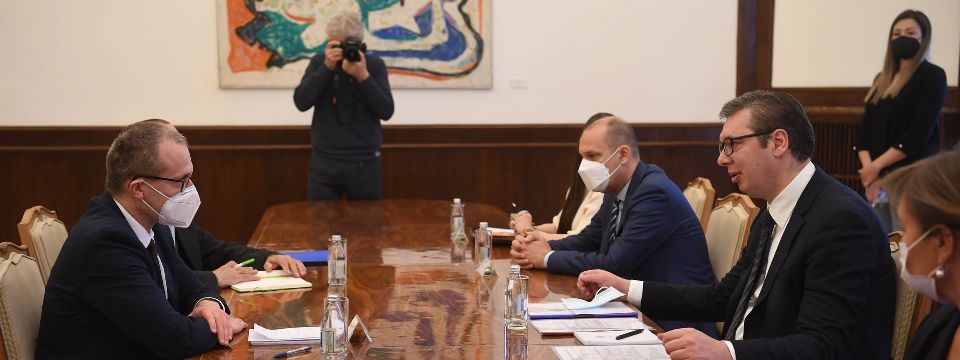
|
|
|
| WHO describes immunisation process in Serbia as impressive |
|
19 April 2021
Prime Minister Ana Brnabic talked today with World Health Organisation (WHO) Regional Director for Europe Hans Kluge about the epidemiological situation and the course of immunisation of citizens in Serbia.
Brnabic expressed gratitude for the cooperation in the fight against the pandemic, technical assistance and expertise, emphasising that the support of this organisation is very important for our country.
She informed the WHO Regional Director for Europe about the course of immunisation of citizens in Serbia, expressing her belief that, thanks to the large number of vaccinated people, we will be able to create collective immunity and return to normal life.
Kluge assessed the immunisation process in Serbia as impressive, and added that Serbia has made a good decision to offer citizens all available vaccines used in the fight against coronavirus.
Expressing concern over the emergence of new strains of the virus, he stressed the need to speed up the immunisation process and show mutual solidarity.
The WHO Regional Director for Europe praised Serbia for the humanity it has shown by donating vaccines to the countries of the region and enabling vaccination for those who do not have a sufficient number of vaccines for their citizens.
The Prime Minister said that Serbia will continue to cooperate with the countries of the region and help in accordance with its capabilities.
When it comes to the project "Roadmap for Health in the Western Balkans 2021-2025", it was stated that, if epidemiological conditions allow, a regional meeting will be held in Belgrade at the end of the year, important for future improvement of cooperation between countries in the field of health challenges.
Source: www.srbija.gov.rs
Photo: www.srbija.gov.rs
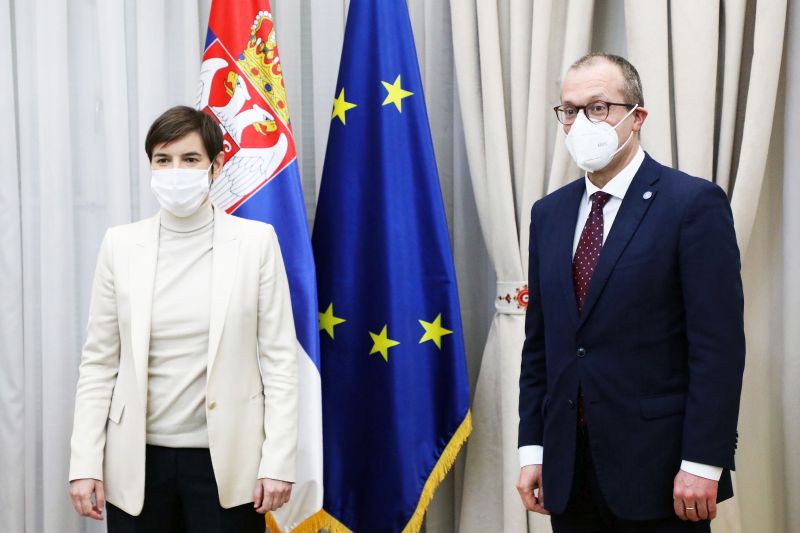 |
|
|
| INFORMATION ON VACCINATION AGAINST CORONAVIRUS IN SERBIA |
|
(updated: 16 April 2021)
Vaccination (immunization) in Serbia began on 24 December (earlier than in the majority of European countries). Prime Minister Ana Brnabic received the first vaccine. She was also the first Prime Minister in Europe to receive the vaccine shot.
Serbia was the third country in Europe, after Britain and Switzerland, to start the vaccination. In Serbia, mass vaccination of the population in the fight against Covid-19 launched on 19 January.
Medical staff was the first to receive the vaccine, the immunization of geriatric centres' patrons followed, and the vaccines were then administered to the personnel of the Ministry of the Interior, Serbian Army and other security services, media representatives and others.
In Serbia, citizens express interest to be vaccinated against Covid-19 through the e-Government portal or by phone - via the contact center, upon which they receive a message with the date and time of vaccination appointment.
The Serbian Government informed that it enabled registering for vaccination against coronavirus via Viber app, starting 6 April, which is available through the official info service of the Serbian Government launched on Viber.
As of 9 April, all local governments will start arranging open vaccination posts where citizens will be able to get vaccine shots without prior registration, while the immunization of citizens who registered via e-Government portal or the Viber app will also be carried out at the same time.
More than 1,700,000 citizens applied through the e-Government portal or contact centers. Between 10,000 and 15,000 citizens apply for vaccination daily through the e-Government portal.
Citizens are able choose the vaccine they wish to receive, and the following are available: Pfizer-BioNTech, Chinese Sinopharm, Russian Sputnik V and AstraZeneca.
Serbia is one of the few countries that has four vaccines at its disposal.
According to the data, 70 percent of those vaccinated received the Sinopharm vaccine (more than a million citizens), 12 percent received the Pfizer vaccine, 9 percent Sputnik V and 9 percent the AstraZeneca vaccine.
The elderly are constantly pleaded with and invited to apply for the vaccine if they have not already, considering that citizens over 70 years of age are a priority. At the same time, citizens of all ages are invited to register and get vaccinated, since immunization has also begun of those who are not in the priority groups. Medical workers have also been vaccinating residents of smaller and rural areas, who have not registered via e-Government.
The importance of vaccination is constantly emphasized, as well as the fact that it is the only solution in the fight against the Covid-19 virus.
According to the latest information, 3.020.401 vaccine doses were given in Serbia, out of which fully vaccinated citizens (having received both doses) account for 1.212.997 (a third of the Serbian adult population). It is estimated that by the end of April, we will have about 40 percent of the adult population vaccinated with the first vaccine dose.
950,000 citizens were fully immunized - which means that three weeks have passed since their second dose, or 5 weeks since their first dose in the case of AstraZeneca.
In the age group between 65 and 74, more than 51 percent of the population has been vaccinated, and in the age group over 75, we have 42 percent of those vaccinated.
*On April 6, President Vucic was vaccinated in Rudna Glava, receiving the Chinese Sinopharm vaccine.
On Thursday, 8 April, Serbia broke its own record for the number of persons vaccinated, when more than 75,000 people were vaccinated. This is a result that, in proportion to the number of citizens, even the most developed countries in Europe and the world cannot take pride in.
The goal is to have more than 2,800,000 persons vaccinated, and 2,200,000 revaccinated by the end of May, and more than three million vaccinated and revaccinated persons by the end of June.
Belgrade, Novi Sad, Nis, Uzice and Sremska Mitrovica are at the top of the list with about 36 or 37 percent of vaccinated adult citizens.
*Example of Belgrade – 39,1 percent of adult citizens have been vaccinated (550.473 citizens), out of which fully vaccinated citizens 376.904 or 26,8 percent. There are additional 18 posts in city municipalities where they can be vaccinated without making an appointment. When it comes to senior citizens, aged 65 to 74, more than 68 percent of that population was vaccinated.
PROCUREMENT OF VACCINES
*On 22 December, the first quantities of Pfizer-BioNTech vaccine were delivered to Serbia. Serbia is the second country in Europe, after Great Britain, to receive the Pfizer vaccine.
*On 16 January, one million doses of the Chinese Sinopharm vaccine arrived.
*On 29 January, 40,000 million doses of the Russian Sputnik V vaccine arrived.
*On 9 February, a new consignment of 50,000 Sputnik V vaccines arrived from Russia.
*On 11 February, Russian experts arrived in Serbia and discussed with Serbian experts how to start the production of Russian vaccines in Serbia as soon as possible. They visited the Torlak Institute in order to assess the technological and personnel capacities of the Institute for the production of the Sputnik V vaccine.
President Vucic announced that our country will invest in new plants, new equipment that would meet all standards, with the goal of producing the vaccine in our country. The Sputnik V vaccine would be distributed to the region from our country, but also to European countries.
* On 10 February, another batch of 500,000 Chinese Sinopharm vaccines arrived in Serbia.
* On 15 February, 40,950 doses of the Pfizer-BioNTech company vaccine against coronavirus arrived in Serbia.
*On 21 February, 150,000 AstraZeneca vaccines arrived in Serbia, which have been available at every vaccination post since 23 February. Serbia was the first country in the Balkans to have this vaccine at that point in time.
*On 22 February, 46,800 more Pfizer vaccines arrived in Serbia.
*On 22 February, 50,000 more Sputnik V vaccines were delivered.
*On 28 February, a new consignment of 100,000 doses of the Sputnik V vaccine arrived (this was a delivery of the second dose of the vaccine - for revaccination), since the first and second doses have a different composition.
*On 1 March, a delivery of 58,500 Pfizer-BioNTech vaccines arrived.
*On 4 March - during his official visit to Berlin, Minister of Foreign Affairs Nikola Selakovic said that German Foreign Minister Heiko Maas informed him that Serbia would soon receive 300,000 vaccines from the COVAX program (the first doses arrived on 2 April).
* On 5 March, 500,000 more Sinopharm vaccines were delivered.
*On 8 March, 28,080 doses of vaccines by Pfizer- BioNTech company arrived.
*On 11 March – Minister Popovic announced that the production of the Russian Sputnik V vaccine at the Torlak Institute will begin in May, and that Serbia will thus become the first country in the territory of Europe where this vaccine is produced.
The first phase of production of the Russian vaccine in Serbia implies transport of the substance, filling of bottles in accordance with the highest technological standards, packaging and distribution of vaccines in our country and region, and after the establishment of the first phase of production, the preparation of a feasibility study will begin on production in the so-called full cycle, which includes the production of the substance in Serbia. This will require the procurement of complex technological equipment and the expansion of Torlak's production capacities, but estimates are that full-cycle production could begin by the end of this year.
*On 11 March – during his visit to the UAE, Serbian President Aleksandar Vucic announced that it had been agreed that, together with the United Arab Emirates and China, a vaccine against the coronavirus of the Chinese company Sinopharm would be produced in Serbia. President Vucic pointed out that, in addition to the timetable made with the competent Russian minister for the production of the Russian vaccine at Torlak, it was agreed that the factory for the Sinopharm vaccine would be completed and start production from 15 October.
*On 15 March - A delivery of 16,380 doses of Pfizer-BioNTech vaccine arrived.
*On 18 March - President Aleksandar Vucic talked via video link with the management of Sinopharm company about the process of procuring vaccines, building a factory of Chinese vaccines in Serbia and building and equipping Serbian hospitals. An agreement on the purchase of another two million doses of Sinopharm vaccines was signed at the meeting.
* On 18 March - President Vucic announced that Serbia will have two vaccine factories and will produce between 30 and 40 million doses a year. The President had talks with the representatives of Sinopharm, while Minister Nenad Popovic discussed the production of the Sputnik V vaccine. (He stated that he expected that in less than a year, the liquid for the vaccine would be produced, and not just packaged.)
*On 22 March - 55,990 doses of Pfizer-BioNTech vaccine were delivered.
*On 23 March - 100,000 doses of the first component of the Sputnik V vaccine arrived in Serbia.
*On 25 March - The Russian Direct Investment Fund and the Institute of Virology, Vaccines and Sera “Torlak” announced that an agreement has been reached on the production of the Sputnik V vaccine in Serbia. This will make our country the first state in Southern Europe to produce Sputnik V, and the vaccine could be exported to other countries in the region at later stages. The production of the vaccine will start by May at Torlak.
*On 29 March - 23,570 doses of Pfizer-BioNTech vaccine arrived.
Serbia paid EUR 4.8 million in advance to the COVAX system, and we donated EUR 2 million for the development of the vaccine through the European Commission. Since no vaccines from the COVAX programme were delivered to Serbia, Serbia procured them bilaterally.
*On 2 April, the first consignment of 57,600 AstraZeneca vaccines arrived through the COVAX mechanism.
*On 5 April, half a million Sinopharm vaccines arrived.
The Prime Minister stated that 2.5 million vaccines were delivered to Serbia from China alone, and that a little less than a million of vaccines were delivered by all other manufacturers.
*On 5 April - The Torlak Institute signed a Technology Transfer Agreement with the Russian Direct Investment Fund and the Russian pharmaceutical company Generium, under which the Russian side will transmit to the Serbian side data on procedures and technologies required for the production of the Sputnik V vaccine in Serbia.
Minister Nenad Popovic announced that three validation series of the Sputnik V vaccine would be produced in April, and that samples from these validation series would be sent for quality control to the Gamaleya Institute, and after the institute confirms the validity of samples produced at Torlak, our institute would start the production of the vaccine. This is expected to materialize by 20 May this year, and in that way Serbia will become the first country in Europe to produce the Sputnik V vaccine.
*On 6 April, 106,420 vaccines manufactured by Pfizer-BioNTech were delivered.
With that delivery, Serbia procured a total of 3.5 million vaccines, paid for all the vaccines, as well as all that we received from the COVAX system.
*On 12 April - 106,470 doses of Pfizer-BioNTech vaccine arrived.
*14 April – The first series of control doses of the Sputnik V vaccine was filled at Torlak. The vaccines produced at Torlak will be released in June this year.
*15 April – President Vucic announced that another 211,000 Pfizer vaccines would arrive on Monday, 19 April, as well as that 50,000 doses of the second component of the Russian vaccine arrived on 14 April, and that on 16 April another batch of same quantity was expected, as are another 100,000 doses of the Sputnik V first component on Monday or Tuesday. Chinese Sinopharm vaccines are also expected by the end of this month.
VACCINATION OF MEMBERS OF THE DIPLOMATIC CORPS IN SERBIA
The Serbian Government was among the first in the world to enable the immunization of members of the diplomatic corps in Serbia. All four vaccines are available.
Close to 1,300 members of the diplomatic corps, holders of special ID cards (diplomatic, official, consular, etc.), registered and were vaccinated.
*On 13, 18 and 19 February, Sinopharm vaccines were administered. This completed the first round of vaccination. The second round, that is, revaccination with that vaccine, was carried out on 11 and 12 March.
*On 23 February, vaccination with the Pfizer vaccine began. Revaccination using this vaccine was carried out from 16 to 19 March.
Also, vaccination with Sputnik V and AstraZeneca started.
*On 20 March, remaining revaccinations were performed and it was also made possible for members of the diplomatic corps to receive the vaccine, who for certain reasons could not be vaccinated.
VACCINE DONATIONS TO COUNTRIES IN THE REGION
*On 14 February - President Vucic handed over the first batch of 4,680 Pfizer vaccines to Prime Minister of North Macedonia Zoran Zaev, while on 24 February, Minister Loncar handed over another 3,510 doses of Pfizer vaccine to the Macedonian Minister of Health.
*On 17 February - Serbia donated 2,000 Sputnik V vaccines to Montenegro.
*Approximately 5,000 health care workers from the Republic of Srpska have been vaccinated in Serbia so far, and our country will make the vaccination information system available to the Republic of Srpska so that they can use it when they have enough vaccines.
*On 2 March – Serbian President Aleksandar Vucic handed over to the Chairman and Members of the Presidency of Bosnia and Herzegovina a batch of 5,000 AstraZeneca company vaccines donated by Serbia to Bosnia and Herzegovina, while on 12 March, another 5,000 doses of AstraZeneca vaccine were delivered from Serbia.
* On 15 March – all employees of the Constitutional Court of Bosnia and Herzegovina were vaccinated at a hospital in Uzice, at the request of that court, in cooperation with the Constitutional Court of Serbia, the Ministry of Health, the Ministry of Foreign Affairs and the Serbian Embassy in Sarajevo.
*On 23 March - vaccination of 105 journalists from North Macedonia began at the Public Health Institute in Vranje. AstraZeneca vaccines for Macedonian journalists were provided at the request of the Macedonian Association of Journalists in cooperation with the Journalists' Association of Serbia, and with the support of the Office of the Serbian President.
*On 23 March - President Aleksandar Vucic handed over ventilators and other medical equipment for the Republic of Srpska. The donation was received by Chairman of the Presidency of Bosnia and Herzegovina Milorad Dodik.
*On 24 March - The Chamber of Commerce and Industry of Serbia (PKS) announced that, in cooperation with the Serbian Government, 10,000 vaccines were provided for businessmen from the region and their employees.
*On 29 March - The President of the Chamber of Commerce and Industry of Serbia announced that 8,500 businessmen from the region were vaccinated in Serbia over the weekend (on 27 and 28 March).
*Serbia donated a total of 40,000 doses of the Sputnik V vaccine to North Macedonia, the first batch of 20,000 vaccines for the first dose arrived on 1 April, and it was announced that the revaccination doses would arrive in the following period.
39,000 foreign nationals were vaccinated (using AstraZeneca vaccine), who arrived either at the invitation of the Serbian Chamber of Commerce or registered on their own via the e-Government portal. Prime Minister Brnabic stated that the vaccination of people from the region was a huge success and assessed that this was a way to raise common security, because if people in the region were not safe, people in Serbia were not safe either. The most numerous were citizens of Bosnia and Herzegovina, North Macedonia and Montenegro
*On 8 April - The Prime Minister stated that Serbia was currently focused on vaccinating its citizens, but that we would endeavour to help friends and neighbours in the fight against coronavirus through vaccine donations.
Around 53,000 foreign nationals who do not have a registered residence in Serbia have applied for vaccination in Serbia, by registering for vaccination via the e-Government portal. Foreign nationals are currently not being vaccinated, but Serbian citizens only, and once they have been vaccinated the option of vaccinating registered foreign nationals will be considered. Vaccination is free in Serbia, and the same applies to foreign nationals who get a vaccine shot in our country.
Advertisements for vaccination through agencies have appeared on social media and the internet, however, it is not possible to make a vaccination appointment in Serbia through any foreign or domestic travel agency, and these are internet frauds.
*On 8 April - The Government has decided to send a donation of 20,000 doses of AstraZeneca vaccine to the Canton of Sarajevo.
*On 9 April - 29 journalists from the Sarajevo Canton Television were vaccinated in Novi Pazar.
On 10 April - Chairman of the Presidency of Bosnia and Herzegovina Milorad Dodik stated that he had agreed with the Serbian President that around 20,000 vaccines would be delivered from Serbia to the Republic of Srpska early next week.
VACCINATION OF MIGRANTS
*On 24 March, the vaccination of migrants started in the outpatient clinic of the migrant center in Krnjaca. Around 500 migrants have registered.
Head of UNHCR Office in Serbia Francesca Bonelli pointed out that this UN agency was deeply grateful to the Serbian authorities for including the refugees in the vaccination plan.
|
|
|
| Selakovic: Political extremism of Albanians in Kosovo and Metohija is becoming stronger |
|
13 April 2021
Minister of Foreign Affairs of Serbia Nikola Selakovic warned, at the United Nations Security Council meeting, that the political extremism among Albanians in Kosovo and Metohija was not decreasing, but on the contrary, was becoming stronger.
At the meeting discussing the Report of the UN Secretary-General on the work of UNMIK, Minister Selakovic recalled that the obligation to form the Community of Serb Municipalities remained unfulfilled for 2,917 days now and that, in fact, 19 April marked eight full years since the agreement was reached in Brussels, while Pristina still refused to follow up on its commitment and enable the formation of the Community of Serb Municipalities.
The Minister reminded that the current Prime Minister of the provisional institutions of self-government in Pristina repeatedly threatened to unite the self-proclaimed Kosovo and Albania, and that he also stated that the dialogue with Belgrade was low on the list of his priorities.
Minister Selakovic pointed out that it was high time for Albanian leaders in Pristina to show responsibility in fulfilling their commitments, but also a sincere commitment to reaching a compromise solution and building mutual trust.
"Serbia is determined and will not give up on identifying a compromise solution, which will be sustainable for future generations as well. The only way to build lasting peace and stability in our region is by working to build trust and insisting on positive political agendas", Selakovic concluded.
According to the Minister, lasting peace and stability can only be achieved if none of the participants in the dialogue pursued maximalist demands and insisted on the complete humiliation of the other.
He pointed out that the Serbian and Albanian peoples, as the two most numerous peoples in the Western Balkans, needed to find a way to reach reconciliation and a basis for cooperation, both in terms of the economy and in achieving shared prospects for membership of the European Union.
"Belgrade has made sincere steps in that direction, by being one of the initiators of the idea of relaxing the flow of people, goods, capital and services, popularly referred to as "mini-Schengen", the Minister underlined.
Pointing out that Serbia had time and time again demonstrated its commitment to dialogue as the only way towards a peaceful, political solution to the problem in Kosovo and Metohija, Selakovic underscored that the recent elections in the Province confirmed that political extremism among Albanians in Kosovo and Metohija was not decreasing, but on the contrary, was becoming stronger, which could be seen during the recent pre-election process.
Minister stressed that political pressures on Serbs continued even after the election process was completed, by denying Serbs fair representation in provisional institutions as the new so-called government in Pristina decided to assign only one ministry to the Serb community.
"Serb returnees represent a particularly vulnerable category, who spend their every day in fear of being attacked. I remind you that the southern Serbian province is still an area with the lowest return rate of displaced persons in the world", the Minister said and emphasized that, in the last year alone, more than 80 attacks and incidents took place in our southern province, targeting Serbs, their property and religious sites.
It is particularly worrying for the Serbian people in Kosovo and Metohija, Selakovic noted, that in the previous period, and especially in March this year, there were frequent physical attacks on the property of the Serbian Orthodox Church.
"A striking example of the disrespectful attitude towards Serbian cultural and religious monuments in the Province, whose exceptional universal value UNESCO confirmed by inscribing them on the World Heritage List, is the case of the Visoki Decani Monastery", the Minister underlined.
Furthermore, the Serbian Foreign Minister assessed as concerning the breaking into the Health Center in Strpce by police inspectors and officers, in January this year, who conducted a search aiming to discover Covid-19 vaccines there, originating from central Serbia.
"Although we consider this to be an intrusion into a health care institution, our reaction was restrained this time as well. We did not want our decisions to cause escalation and politicization of activities that are solely aimed at protecting public health. We organized the vaccination of citizens from Kosovo and Metohija at three locations in central Serbia and thus clearly demonstrated that people's lives are the top priority to us", the Minister stressed.
Minister Selakovic stated that Serbia highly valued the activities of UNMIK mission in Kosovo and Metohija and that it supported it in carrying out its work as efficiently as possible and undiminished in scope, aiming to build and preserve security in the Province.
Selakovic said that the international missions in Kosovo and Metohija - UNMIK, KFOR, EULEX and the OSCE mission, under the administration of the United Nations and in line with UNSC Resolution 1244, played a key role in the preservation of peace and protection of the population.
"We support and respect their engagement and efforts made in the framework of their mandates, with the common goal of creating conditions for a peaceful and safe coexistence of the inhabitants of Kosovo and Metohija. The Serb and other non-Albanian population in Kosovo and Metohija have the utmost confidence in the international presence and consider it a guarantor of security and a barrier against the arbitrariness of the provisional institutions in Pristina", the Minister emphasized.
He said that this demonstrated the need that international missions remain engaged in an undiminished scope, in order to consistently implement UNSC Resolution 1244.
Selakovic further emphasized the importance of KFOR international forces and pointed out that any unilateral attempt to assign to someone else or that someone else assumes a part of KFOR's mandate and responsibilities constitutes a violation of UNSC Resolution 1244.
The Minister also noted as unacceptable the unilateral decisions on the formation of the Pristina "Ministry of Defence" and launching the process of transforming the so-called "Kosovo Security Forces" (KSF) into the so-called "Kosovo Army".
At the beginning of his statement, Minister Selakovic lodged a protest against the abuse of the video format of the session by the representative of Pristina as she had a flag of the self-proclaimed "Kosovo" placed behind her, and the representative of Russia did the same.
Below is an integral version of the speech of the Minister of Foreign Affairs Nikola Selakovic
Distinguished President of the Security Council,
Distinguished Special Representative,
Esteemed members of the Security Council,
At the outset, I have no choice but to lodge a protest against the abuse of the video format of this session on the part of the representatives of Pristina in order to promote the symbols of the so-called statehood of Kosovo. Despite the fact that the representatives of Pristina were warned on several occasions, including by the President of the Security Council at the previous session, that such abuses of Security Council sessions are absolutely unacceptable and constitute a flagrant violation of the Security Council rules on participation of representatives of the provisional institutions of self-government in Pristina, under Rule 39 of the UN Security Council Rules of Procedure, we are again faced with their reckless disregard for the rules of this distinguished body. Let me reiterate our call for the necessary steps to be taken to prevent such abuses.
It is my great pleasure to address this august body at the meeting on the work of the Mission of the United Nations in Kosovo and Metohija. At the outset, I would like to thank Secretary-General of the United Nations Mr. Guterres and Special Representative of the Secretary-General and Head of UNMIK Mr. Tanin for the report submitted and for their efforts made towards the implementation of the UNMIK mandate, and also to the members of the Security Council for the continued attention they have devoted to the issue of Kosovo and Metohija. The Republic of Serbia highly values the activities of the Mission of the United Nations in Kosovo and Metohija and supports it in carrying out its work as efficiently as possible and undiminished in scope, aiming to build and preserve security in the Province.
Mr. President,
In the previous period we have faced political instability in Kosovo and Metohija. We recently had elections in the Province, which unfortunately confirmed that political extremism among Albanians in Kosovo and Metohija is not decreasing, but on the contrary, is becoming stronger. We have witnessed Albanian leaders competing among themselves in efforts to find the best way to provoke an incident in Serb communities, in order to score political points of the Albanian electorate. Under the pretext of amending the voter list, a large number of Serbs in Kosovo and Metohija were deprived of one of their fundamental political rights - the opportunity to elect their political representatives. Out of approximately 140,000 of citizens of Kosovo and Metohija who were removed from the voter list in the latest election process, 85% are Serbs.
Despite numerous challenges and problems, the Serbian people in Kosovo and Metohija have shown, by high turnout and a convincing victory of the Serb List which won all ten seats reserved for Serbian representatives, that nothing can stop them from resolutely defending their position. Political pressures on Serbs continued even after the election process was completed, by denying Serbs fair representation in provisional institutions as the new so-called government in Pristina decided to assign only one ministry to the Serb community.
Distinguished members of the Security Council,
Unfortunately, it was not only during the election activities that we witnessed the unreasonable anti-Serb policy being pursued by the provisional institutions in Pristina. This goes to the length of breaking into the Health Center in Strpce, in the south of Kosovo and Metohija, by police inspectors and officers from Pristina, in January this year, who conducted a search aiming to discover Covid-19 vaccines there, originating from central Serbia, which they did not find. In doing so they demonstrated force and threatened to arrest the director of the Health Center, medical staff and doctors. At a time when the whole world is fighting the pandemic with vaccines being the only way to end this challenge, while Serbia is showing support and solidarity by donating vaccines and medical equipment to all in need in the region, Pristina wants to destroy vaccines only because they originate from central Serbia. As the whole world expresses gratitude to medical doctors, who have made great and heroic sacrifices in combating the virus, the provisional institutions in Pristina are attacking Serbian doctors for doing their job.
Although we believe that intrusions into health care institutions are inadmissible, our reaction was restrained this time as well. We did not want our decisions to cause escalation and politicization of activities that are solely aimed at protecting public health. We organized the vaccination of citizens from Kosovo and Metohija at three locations in central Serbia and thus clearly demonstrated that people's lives are the top priority to us. Serbia continues to be ready to help all in need of assistance, and we call for reason and responsibility, especially in such difficult times.
Mr. President,
Attacks targeting Serbs and their property have been on the rise. In the last year alone, more than 80 attacks and incidents took place in our southern province, targeting Serbs, their property and religious sites. According to the information provided by the OSCE Mission in Kosovo and Metohija, in the second half of last year, the number of incidents increased by more than 30% compared to 2019. Therefore, we cannot agree with the assessment that the "security situation in Kosovo remained stable, with a few incidents reported affecting non-majority communities". Last weekend, for example, an entirely unprovoked physical attack by a group of Albanians on two Serb young men took place in the northern part of Kosovska Mitrovica.
Serb returnees represent a particularly vulnerable category, who spend their every day in fear of being attacked. The fact that one family of returnees was the target of seven attacks clearly indicates the persistence of those who do not want Serbs in Kosovo and Metohija. There is absolutely no trace of political will in Pristina for 212,995 displaced Serbs who have been living outside Kosovo and Metohija for 22 years to return to their homes. Since 1999, the rate of sustainable return of internally displaced persons in Kosovo and Metohija has been only 1.9%, which according to the UN data is officially the lowest percentage of return of expelled population after a conflict anywhere in the world.
At the same time, while arresting internally displaced persons, Pristina authorities are exerting the strongest of pressures on the Specialist Chambers in The Hague. The aim is to completely prevent the further processing of a number of cases against members of the terrorist KLA, on charges of serious crimes committed during the conflict in Kosovo and Metohija against both Serbs and persons belonging to other nationalities. President of the Specialist Chambers Madam Trendafilova recently warned that, should the pressures continue, this would have very dramatic consequences to the trials in progress. President Trendafilova underlined as highly problematic the phenomenon of witness intimidation, who are key for conducting proceedings successfully and rendering a proper verdict.
Although the wait to raise indictments was far too long, we consider it commendable that efforts have finally been made to punish the perpetrators of numerous serious crimes which were committed during the armed conflicts a little over two decades ago, but also upon the arrival of the international forces to Kosovo and Metohija. For example, no one has been held accountable to this day for the killings and abductions of 17 journalists in Kosovo and Metohija, which is currently the largest number of unsolved cases of murdered and kidnapped journalists in Europe. Furthermore, the perpetrators of any of the mass crimes committed against Serb civilians after 1999 have not been brought to justice. I will remind you of only a few of these cases: 14 Serb farmers were killed in the village of Staro Gracko, 12 displaced Serbs were killed and 43 wounded in the attack on the "Niš Express" bus in Livadice near Podujevo, and in Gorazdevac near Pec unknown persons fired automatic weapons on children who were swimming in the Bistrica river. Two Serb children were killed then, and four were seriously injured.
We expect the EULEX Mission to continue to support the Specialist Chambers and the Specialist Prosecutor's Office, as well as its additional engagement in the field of the rule of law. Special attention needs to be devoted to witness protection, and determining the fate of missing persons.
International missions in Kosovo and Metohija - UNMIK, KFOR EULEX and OMIK are an integral part of the international civilian and security presence in our southern province, under the administration of the United Nations and in line with UNSC Resolution 1244 (1999), and play a key role and make an outstanding contribution to the preservation of peace and protection of the population. We support and respect their engagement and efforts made in the framework of their mandates, with the common goal of creating conditions for a peaceful and safe coexistence of the inhabitants of Kosovo and Metohija. The Serb and other non-Albanian population in Kosovo and Metohija have the utmost confidence in the international presence and consider it a guarantor of security and a barrier against the arbitrariness of the provisional institutions in Pristina. This further demonstrates the need that international missions remain engaged in an undiminished scope, in order to consistently implement UNSC Resolution 1244.
I would like to further emphasize the importance of KFOR international forces and point out that any unilateral attempt to assign to someone else or that someone else assumes a part of KFOR's mandate and responsibilities constitutes a violation of the UNSC Resolution 1244, while also being a potential source of instability and tensions. I will remind you that Pristina, contrary to international law and completely ignoring the interests and positions of the Serb community in the Province, would not abandon its plans to install a new security actor in the territory of Kosovo and Metohija. We consider the unilateral decisions on the formation of the "Ministry of Defence" and launching the process of transforming the so-called "Kosovo Security Forces" (KSF) into the so-called "Kosovo Army" to be unacceptable. I would like to reiterate that such unilateral moves on the part of Pristina constitute a gross violation of the UNSC Resolution 1244 and the Military Technical Agreement, according to which only the International Security Forces, that is KFOR, have the mandate for all military aspects of security in the territory of Kosovo and Metohija.
In this context, an additional reason for concern is the announcement of the construction of the largest base of the "Kosovo Security Forces" in the southern part of Kosovska Mitrovica, which Serbs in the north of Kosovo and Metohija perceive as the most open provocation and threat to their physical safety.
Distinguished members of the Security Council,
It is particularly worrying for the Serbian people in Kosovo and Metohija that in the previous period, and especially in March this year, there were frequent physical attacks on the property of the Serbian Orthodox Church. In just two weeks, as many as seven Orthodox landmarks in the province were targeted by vandals, at a time when we all remember the March 2004 pogrom against Serbs and Serbian holy sites in Kosovo and Metohija. The condition of the Serbian cultural and spiritual heritage in Kosovo and Metohija is humiliating, including the four monuments that are inscribed on the UNESCO List of World Heritage in Danger (Visoki Decani, Holy Virgin of Ljevisa, Gracanica and the Patriarchate of Pec). Numerous administrative and technical barriers are imposed on priestly and monastic communities, which makes it more difficult or even impossible for them to survive on church property.
A striking example of the disrespectful attitude towards Serbian cultural and religious monuments in the Province, whose exceptional universal value UNESCO confirmed by inscribing them on the World Heritage List, is the case of the Visoki Decani Monastery.
Distinguished members of the Security Council,
The reason for the nervous behaviour of Pristina is all too obvious, as the project of the so-called independence today fails to be recognized by more than a half of the United Nations Member States, including five members of the European Union. However, it is high time for Albanian leaders in Pristina to show responsibility in fulfilling their commitments, but also a sincere commitment to reaching a compromise solution and building mutual trust.
I will remind you that the current Prime Minister of the provisional institutions of self-government in Pristina has repeatedly threatened to unite the self-proclaimed Kosovo and Albania in the past. A member of his party publicly said last weekend that the self-proclaimed Kosovo and Albania would be united, I quote, "with rifle and gunpowder, or referendum boxes".
I need not explain why such dangerous ideas constitute a direct threat to peace and stability. They violate Resolution 1244, while continuously destabilizing not only our southern province, but the entire region as well, and in no way contribute to the dialogue process, but instead hamper it again.
We have demonstrated time and time again our commitment to dialogue as the only way towards a peaceful, political solution to the problem in Kosovo and Metohija. Even today, after many years of negotiations, but also failure to fulfill what was agreed and constant unilateral moves and provocations on the part of the provisional institutions in Pristina, we are still ready to sit down at the table and talk.
We are ready for dialogue but not to be blackmailed and threatened and especially not for ultimatums recently presented by Prime Minister of the provisional institutions of self-government in Pristina. I will remind you of his statement that the dialogue will be low on the list of priorities of the Pristina authorities. It is bewildering how Pristina refers to ultimatums completely undermining any chance of dialogue, as the European Union also pointed out, as "principles" and how it persistently insists that Belgrade should recognize the unilaterally declared independence of "Kosovo", upon which, they believe, all else would be resolved. What is the purpose of the dialogue then, if Belgrade is only expected to recognize the so-called Kosovo? Does the dialogue imply that one side should give up everything only for the other to win it all? And does the dialogue, in Pristina's opinion, imply that what was agreed should not be fulfilled?
I will remind you that Pristina still refuses to follow up on its obligations arising from the agreements reached so far and does not agree to discuss their implementation within the dialogue. And the situation is quite simple - in April 2013, the first agreement was signed in Brussels, which envisaged four obligations: one for Pristina and three for Belgrade. Belgrade has fulfilled all obligations, while the only obligation that the provisional institutions in Pristina had - to form the Community of Serb Municipalities - has remained unfulfilled for 2,917 days now. In fact, 19 April marks eight full years since the agreement was reached in Brussels, and of Pristina's failure to fulfill the obligation to form the Community of Serb Municipalities.
Distinguished Mr. President,
Regardless of the discouraging messages heard from Pristina and the fact that the dialogue has been in progress for many years, Serbia is determined and will not give up on identifying a compromise solution, which will be sustainable for future generations as well. Lasting peace and stability can only be achieved if none of the participants in the dialogue pursues maximalist demands and insists on the complete humiliation of the other. The Serbian and Albanian peoples, as the two most numerous peoples in the Western Balkans, need to find a way to reach reconciliation and a basis for cooperation, both in terms of the economy and in achieving shared prospects for membership to the European Union.
Belgrade has made sincere steps in that direction, by being one of the initiators of the idea of relaxing the flow of people, goods, capital and services, popularly referred to as "mini-Schengen".
As far as Serbia is concerned, we are convinced that the only way to build lasting peace and stability in our region is by working to build trust and insisting on positive political agendas. The inhabitants of Kosovo and Metohija, of any nationality, whether they are Serbs or Albanians, do not deserve anything less.
Thank you for your attention.
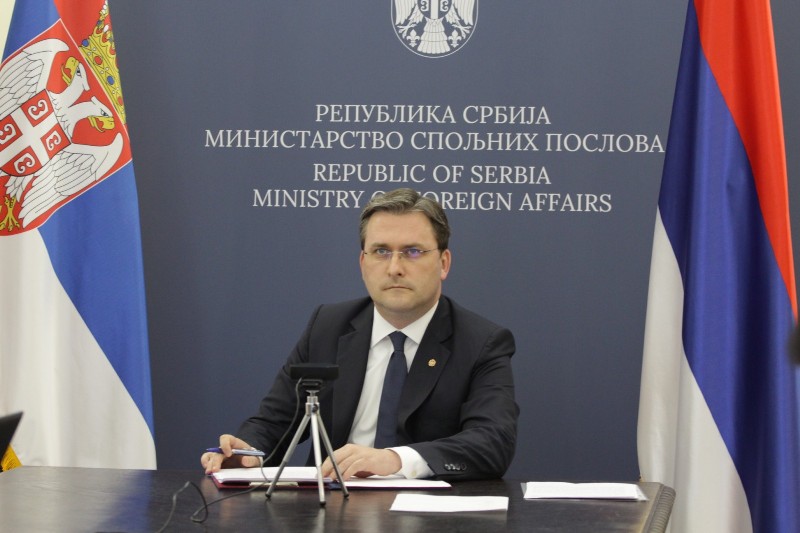 |
|
|
| Selakovic: Pristina persists in its campaign of hatred against the Serbian people |
|
13 April 2021
Minister of Foreign Affairs of Serbia Nikola Selakovic stated today that Pristina further persisted in its campaign of hatred against the Serbian people, which was most drastically seen in the unfounded accusations of mass rapes and genocide.
At the UN Security Council meeting discussing the Report of the UN Secretary-General on the work of UNMIK, Selakovic emphasized that the efforts of the provisional institutions in Kosovo and Metohija to create a narrative about mass rapes of Albanian women were obvious, and that propaganda methods and lies were used for that purpose.
"It is clear that there were victims on all sides in the conflict, as well as that our side has evidence of numerous Serb victims. But the precondition for ensuring the protection of rights that belong to each individual victim is a rational and well-argued approach", Selakovic said responding to the slander of the Pristina representative.
Selakovic underlined that, contrary to the claims of politicians from Pristina about 20,000 raped Albanian women, the information provided by the Commission for the Verification and Recognition of Sexual Violence Victim Status indicates 912 raped persons, however, failing to include in this number the Serb women who were victims of violence.
"Let me emphasize that Serbia condemns every act of sexual violence in conflicts and is committed to achieving justice for all victims. The number of victims certainly does not diminish the horrific effect of this type of violence on each victim individually, but also, speculating on numbers does not contribute to justice being served and leads to politicization and slowing down the reconciliation process", Selakovic said.
Regarding the genocide accusations, Minister Selakovic stated that they only went to prove that Pristina further persisted in its campaign of hatred, propaganda and open hostility towards the Serbian people.
"Through statements given on a daily basis, they attempt to paint a picture that Serbia is to blame for everything and that genocide was committed against Albanians, all in order to hide their own responsibility for the committed crimes", the Serbian Foreign Minister said.
He underlined that anyone who knew what the definition of genocide implied would understand that it was not Serbia that committed something, but that the Serbian people was instead a victim of the "state-building" project of the Kosovo Albanians, based on the dangerous idea of ethnically clean territories, as evidenced by more than 200,000 expelled Serbs from Kosovo and Metohija.
"We are convinced that the civilized world will not agree to be their accomplice in concealing and covering up their crimes, and that a clear message will be sent to them that they must take responsibility for their actions", Selakovic said.
He reminded that until 1999, around 40,000 Serbs lived in Pristina, and that today there were only about twenty of them, that around 17,000 Serbs lived in Pec, and that today there were only the Serbian nuns in the Patriarchate of Pec, that around 12,000 Serbs lived in Prizren before the war, and that today only 17 families remained there, and that in Urosevac, out of 10,000 Serbs who lived there before the war, only the family of a Serbian priest remained.
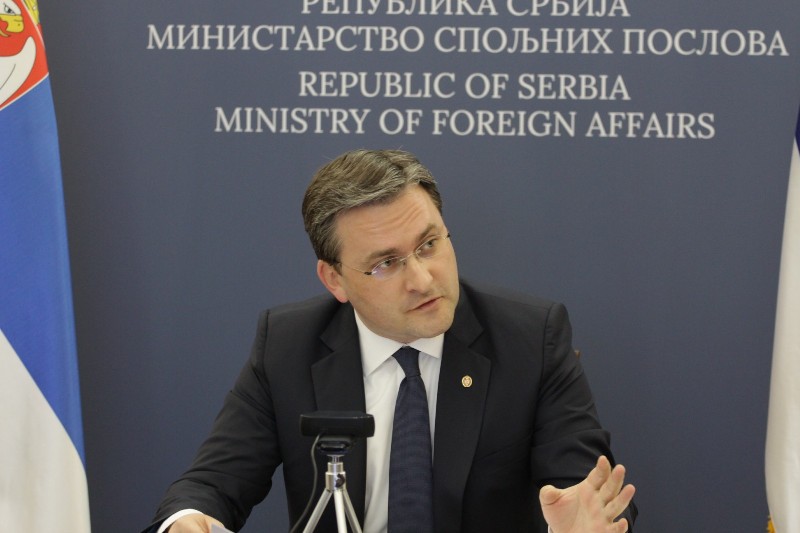 |
|
|
| Marking the Day of Remembrance of the victims of the NATO aggression |
|
President of the Republic of Serbia Aleksandar Vucic made a statement on the occasion of marking the Day of Remembrance of the victims of the NATO aggression.
"Your Holiness, distinguished Chairman of the Presidency of Bosnia and Herzegovina, distinguished Speakers of the National Assemblies of the Republic of Serbia and the Republic of Srpska, distinguished Prime Ministers of the Republic of Serbia and the Republic of Srpska, distinguished Ministers of both Governments, dear guests and friends, representatives of the Serbian People from Montenegro, North Macedonia, Croatia, thank you for the fact that we are all together tonight and that the Serbian spirit is unbreakable and invincible.
One child a day and a little more than that. That is the most difficult, sickening and painful number of the NATO aggression from 1999. Killed, stopped, guilty of nothing, having committed no sin, without the right to defence, without the right to justice and without the right to life.
No one has ever been held accountable for this crime, a crime greater than a crime. No one, for the 2,500 killed civilians, but also soldiers and policemen who were only guilty of guarding, protecting themselves and their homes. No one has ever been held accountable for more than 6,000 persons injured.
Even today, 22 years after the aggression, it is not possible to explain that, there is no universal justification, despite all the work done to that end, there is no reason, it makes no sense, and only names remain, as eternal as sin.
Miljana Milic, fifteen years old,
Vladimir Milic, twelve years old,
Miomir Mladenovic, fourteen years old,
Dragan Dimic, three years old,
Julijana Brudar, ten years,
Olivera Maksimovic, twelve years old,
Miroslav Knezevic, thirteen years old,
Dajana Pavlovic, five years old,
Stevan Pavlovic, eight years old,
Marko Simic, two years old,
Milica Rakic, three years old,
Ivan Ivancic, seven years old,
Marko Ivanovic, three years old...
And the list goes on, eighty nine names, not only Serbian ones...
The senselessness of sheer killing did not choose. Sixteen children, aged two to seventeen, from the Ahmetaj and Hasani families, were killed in a convoy returning home to Prizren.
In one headline in the West, this was simply explained as a "tragic mistake". The deaths of Marko Roglic, Milan Ignjatovic, Gordana Nikolic, Irena Mitic, Milica Stojanovic, Bojana Tosovic, Branimir Stanijanovic, our Sanja Milenkovic...could not expect or get even such an explanation.
Those deaths were not tragic, for those who caused them, much less a mistake. It was just an excuse, a miserable excuse.
They were a result of intent and a clear decision, as a severe judgment against one country, its people, its children.
And that is why today we will refrain from speculation in giving a name to everything that happened during the spring of 1999. Because a crime happened, a heinous and terrible one. And it was an aggression, not a bombing, not an intervention, not a campaign, not an operation. An aggression is what happened. An attack on a sovereign country, without a decision of the United Nations, without a sufficient reason that would justify attacking the then Yugoslavia or a neighbouring or NATO country.
No one was attacked by Serbia or the Federal Republic of Yugoslavia at that time. They attacked us, with one goal. To defeat us, to keep killing us, and in the end to take away a part of our territory.
And no matter how much we analyze things today, no matter how harsh and critical we are towards ourselves, our policy and leadership at the time, it is clear that the Federal Republic of Yugoslavia and Serbia were left with almost no choice then. The choice was horrible, either the loss of territory and people on the one hand, or the complete disappearance of the Serbian state, morals, honour, Serbian spirit, names and surnames. And we could not help but lose. Nineteen big ones attacked one small country, the Federal Republic of Yugoslavia. They attacked both Serbia and Montenegro. And even when they don't talk about it today, in one of the two independent countries, those are the facts. And that small country, and that small nation, to all nineteen of them so great and powerful, held a lesson in what matters most - honour, morals and love for freedom that a nation can have.
Yes, justice, lest we forget justice. All those nineteen great ones today still silently talk about their military success, avoid answering questions, while - can you imagine, one small, only numerically small Serbian people, that small but magnificent nation, with sadness, tears in their eyes, proudly remembers their resistance and struggle against the nineteen cruel and arrogant ones.
We lost a lot, we lost our fathers, brothers, spouses, children, but the honour and Serbian heart are still there, to protect Serbia, which is eternal and indestructible.
We lost children, we lost people, we lost control over a large part of the territory, we lost billions because of the destroyed infrastructure and economy.
And all that was left for us was the body of a tortured, destroyed country, a country in disintegration, mutilated, looted, wounded, deserted, and guilty, condemned for everything that happened not only in the 1990s, but throughout history.
A country that, even ten years after the aggression, did not have the strength to stand up, rise to its feet, and do anything but be silent, or bow its head and obediently apologize, for everything, even for its dead, even for its murdered children.
Today, it is no longer that failed, tortured, devastated, mutilated Serbia.
Today, it is Serbia, which has found its strength and its pride again.
Serbia, which calls things by their real names.
Serbia, which turned its back on war and defeats, and started working.
Serbia, which rose to stand on its own feet and has a voice of its own.
Serbia, which, even when they don't believe it, they listen to. Which is capable, which is growing, and is no longer part of the problem. Serbia, which is and will be, at least we will do our best to this end, the very solution that enables the entire region to live in peace and understanding.
And that Serbia, today, when there are still many more bombs in the world than vaccines, sends not bombs, but precisely those vaccines to the region. Today, it is ready to produce them as well, and in just a few months we will do just that, but not only for ourselves, but also for others, for the entire Balkans.
We are ready, and we are willing to help.
We are not ready to be and we will not be silent, nor be humiliated again.
We draw the right to that not only from the victims we had, but also from the fact that we stopped looking at others only a long time ago, and looking for fault and guilt only in them, and not sometimes in ourselves as well.
We looked at each other and admitted. Every loss, every defeat and every crime that someone committed in our name, every failure and every wrong policy.
And we are no longer doing anything that could endanger anyone.
We continue to work and work, and grow more and more, gaining strength with only one goal - to be the best in economy and education, health, in culture, science, sports...
And we want to be safe, on our own. We want our army to be much stronger than it was in 1999. So that we never again face a situation that someone is killing our children, destroying the country, or expelling our people.
We want to remain free, to decide our own destiny, and for no one to take everything away from us ever again, and give us nothing.
And that nothing today, and I will repeat it as much as necessary, is the idea of some great, powerful ones, but also those who serve them, the idea that "Kosovo" should recognize us, so that we could recognize "Kosovo".
We do not need that recognition. And Serbia will not allow you to walk over our victims, our history, our past, but also to walk over our future. You will get the answer of reasonable, kind and responsible people. We need a compromise. We need all the obligations that we and Pristina have assumed to be fulfilled, but only we have fulfilled them so far.
And this is not our whim. It is not a phantasmagoria about a Serbian world that we want to create.
Even today, when they threaten us with the formation of a Greater Albania, when they say that the Community of Serb Municipalities is not going to happen, it is ours to be calm, to take care of our people in Kosovo and Metohija, but to send a clear message to all those great, powerful ones that we are not as weak as we were, that we will be able to preserve what is our own, not touching anything that belongs to anyone else. After all, Serbia is not and will not be but a handful of oats that every crow from the whole wide world can eat. As for those who used the strength and power of the nineteen arrogant and cruel ones, I only ask them not to threaten us. Please, please, don't threaten us. They should not think that Serbia is broken and that it will not have the strength to respond. Please, please, our Albanian neighbours, do not threaten us. And we ask all others, who have demonstrated their cruelty towards Serbia, not to help you in that. That is all we are asking and nothing more.
And we will respond to calls for peace, calls for compromise, and always with good will, because we do not want to have children killed again. And we do not want the children of others to suffer again. But do not underestimate Serbia, and do not look at Serbia with the same eyes as you did in 1999.
Today, Serbia is much stronger, much more powerful. Today, Serbia is a united country of togetherness, not a divided one. Today, Serbia is incomparably stronger and better in every aspect than it was in 1999, from the economy to our army. And we will never threaten anyone, we just ask you and request from you to respect us and nothing more.
Today, we are building roads that will connect us, among ourselves, with the region and with the world. Until the end of the year, we will work on eight motorways, on eight routes in the entire Balkans, not only Serbia, eight roads of peace and cooperation.
Only a crazy person would trade this for war, for dead children, for demolition and new loss. And yes, we want to have the closest relations with everyone who took part in the aggression against our beautiful Serbia, we have forgiven a long time ago, but no, we will never forget. And don't ask us to. That one day, every year, we will remind both ourselves and you. The nineteen of you, the most powerful, strongest, greatest in terms of might and force, but not so much when it comes to honour and morality. We will keep remind you and ourselves, just so it would never happen again. Not to us only, but to none other freedom-loving people in the world.
And if we have an offer, today it reads as follows: we are ready to make the whole Balkans a winner, for everyone to win, as long as no one tries to make Serbs the only losers.
And the path to this goal is not difficult at all.
We just need to respect and understand each other and not try to humiliate each other.
And not to touch into what everyone paid the highest and bloodies price for. Freedom. And we, Serbs, know the price of freedom.
Into our right to have it, to keep it and to remember all the victims who are part of it.
And our defeats, our lives and our children are built into ours. And the lives of our heroic pilots, and our giants from Kosare and Pastrik, and our children, innocent, completely innocent, and only guilty of living in Serbia.
This is too high a price to be quiet about it.
Because that would mean that we are ready for another defeat, for another humiliation.
And we are not.
And when all go quiet, we will keep repeating.
A child a day, and a little more. This was how much you killed us. In an aggression that even you did not understand why you carried it out.
And we will keep repeating this, just so it does not happen to us again.
With special reverence, we are fulfilling our obligation to pay tribute to all innocent Serbian victims who laid their lives on the altar of the homeland, both civilians and our heroic soldiers and policemen, the heroes of Kosare, Prizren, Mitrovica.
Today, for us Serbs, life in Kosovo and Metohija is like Via Dolorosa, using their last strength on the road to Golgotha, but we would not be Serbs if we were not capable to "exist in a terrible place".
And today, tonight, I can conclude with one important sentence. On the soil of Europe, there was, and today is stronger than ever, an indomitable, unwavering, unconquerable and never conquered Serbia.
May eternal glory be to all the victims of the NATO aggression and let us all exclaim together - long live free and proud Serbia", President Vucic said.
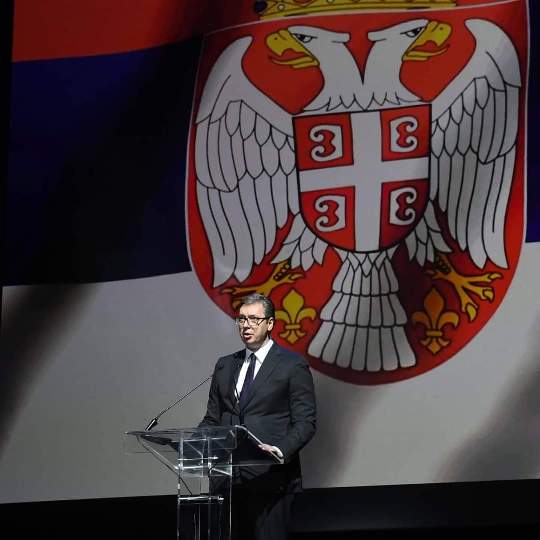
Source:www.predsednik.rs
Photo:www.predsednik.rs
|
|
|
| Non-working days at the Embassy |
|
The Embassy of the Republic of Serbia in Stockholm will be closed on Friday, 2 April and on Monday, 5 April 2021 in observance of the Easter Holiday. The consular section of the Embassy will be opened only for urgent matters. |
|
|
| Participation of the representative of the Republic of Serbia at the Conference within the celebration of the "Month of Francophonie" in Sweden, on 24 March 2021 |
|
On the occasion of the celebration of the "Month of Francophonie" in Stockholm, the digital Conference „Together beyond the crisis – Sustainable developments for the benefit of Business and Society: Insights from Sweden, Switzerland, Canada, Belgium and Serbia“ took place on 24 March, organized by the "Stockholm School of Economics" and the embassies of the mentioned countries in Sweden.
Nikola Krstić, founder and executive director of the startup "Anoris Technologies" from Serbia, delivered a presentation at the Conference. On that occasion, he presented key aspects of the company's business, with the emphasis on the production of the "smart glove Anora", designed for blind people. He also pointed out how the mentioned company successfully overcame difficulties in doing business, that were caused by the Covid-19 pandemic.
The organizers of the event assessed his presentation as particularly useful, with the possibility that this business project could be realized in other members of Francophonie and another interested countries as well.
The Conference can be seen HERE:
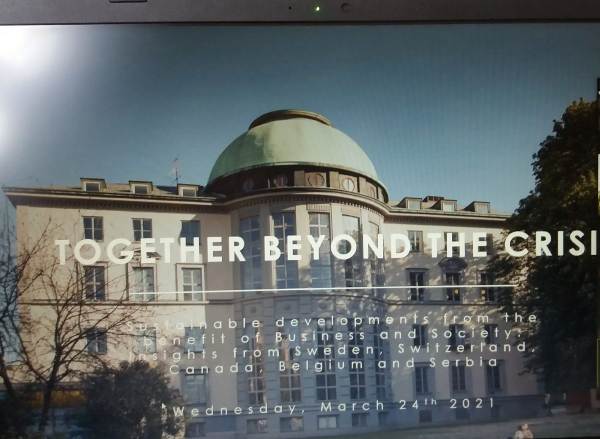 |
|
|
| Commemorating Remembrance Day of 17 March 2004 - Pogrom in Kosovo and Metohija |
|
President of the Republic of Serbia Aleksandar Vucic participated today in the commemoration of the Remembrance Day of 17 March 2004 - Pogrom in Kosovo and Metohija. He said that exactly 17 years ago, a pogrom took place in Kosovo and Metohija, and that pogrom surpassed all other crimes.
"There may be times when we are powerless to prevent injustice, but there must never be a time when we fail to protest, these words of Elie Wiesel, a camp survivor and Nobel laureate, make it forever incumbent upon us not to remain silent against crime, regardless of who and for what reason committed it", President Vucic stated and added that we remembered and learned every lesson in which we were losers, each one in which we were silent to our own victims, and each one when we were ready to forget.
"Serbia is no longer weak today, nor is it a country of losers, it does not threaten, but it does not forget either, it is ready for talks, but not for humiliation. Serbia, just like everyone else, has the right to take care of its people, their safety and well-being. The right to life is a fundamental human right and we will always defend it", President Vucic said.
President Vucic said that pogrom surpasses all other crimes, because it is not only an act, but an intention, a policy, a premediated attempt to forcibly cleanse persons belonging to other peoples and faiths from a region or a country.
"We have no right to remain silent to that", said the President of Serbia, emphasizing that we have an obligation to be winners without blood spilled and war, to be the best in the economy, healthcare, sports, education and everything else that implies development and progress.
"We also wish others to work on themselves and be successful, because we are aware that crime is a tool for losers that winners do not need, as they remember, but forgive and move on, while the losers keep spinning in the same vicious circle. We Serbs do not want to be that anymore, we want a future in which we will remember, but from which we will not return. We know what happened and we call it by its real name", President Vucic concluded.
Photo: Dimitrije Goll
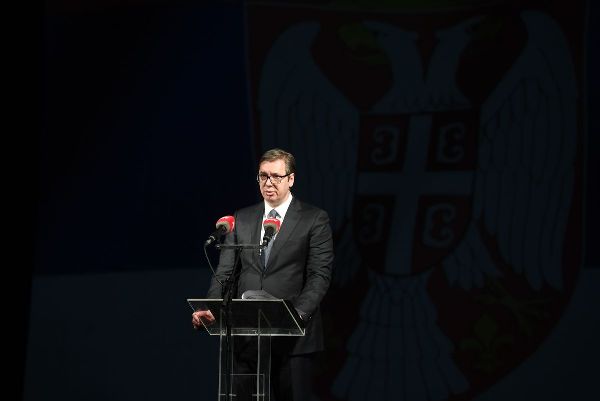 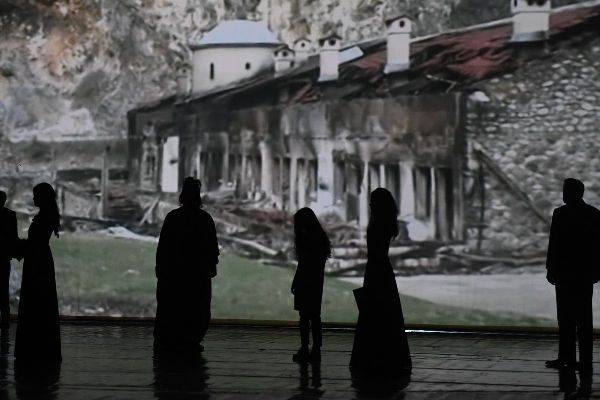 |
|
|
| Metropolitan Porfirije of Zagreb and Ljubljana elected as the new Patriarch of Serbia |
|
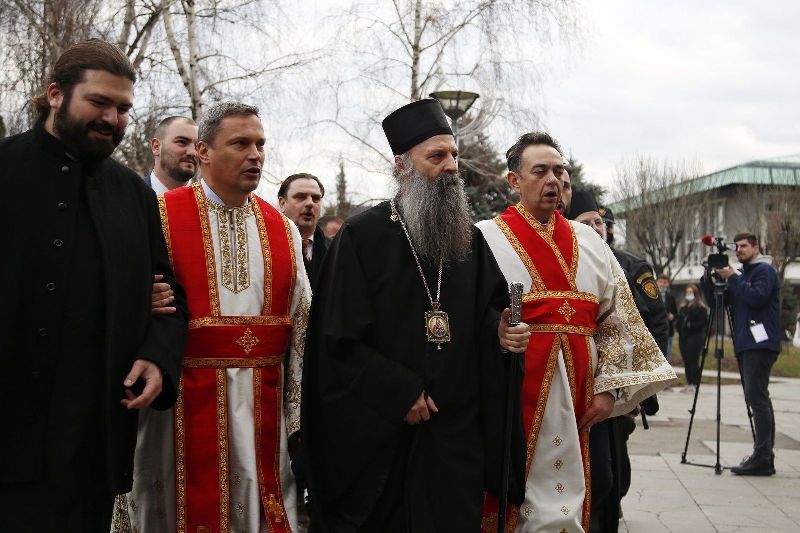 18 February 2021 18 February 2021
Metropolitan Porfirije of Zagreb and Ljubljana elected as the new Patriarch of Serbia
The Holy Assembly of Bishops of the Serbian Orthodox Church elected His Eminence Metropolitan Porfirije of Zagreb-Ljubljana, PhD, as the new Serbian Patriarch, in its convocation in Memorial Cathedral of Saint Sava in Belgrade on 18 February 2021.
Immediately after the election a thanksgiving service was officiated and Many Years was chanted to the Archbishop of Pec, Metropolitan of Belgrade-Karlovci and Serbian Patriarch Porfirije. Bells at Saint Sava Cathedral in the Vracar district of Belgrade rang a few minutes before 4:00 pm indicating that the 46th Patriarch of Serbia was elected.
Newly-elected Archbishop of Pec, Metropolitan of Belgrade-Karlovci and Serbian Patriarch Porfirije (Peric) was born on 22 July 1961 in Becej, to father Radivoje and Mother Radojka. He was baptized as Prvoslav. He finished primary school in Curug, and the “Jovan Jovanovic Zmaj” Grammar School in Novi Sad. He was ordained a monk according to the rite of small schime by his spiritual father, then hieromonk Dr. Irinej (Bulovic), at Decani Monastery on Sunday of St. Thomas in 1985.
He graduated from the Faculty of Orthodox Theology in Belgrade in 1986, when the then Bishop of Raska-Prizren Diocese, future Serbian Patriarch Pavle of blessed memory, ordained him a hierodeacon at the monastery of Holy Trinity in Musutiste.
He attended postgraduate studies in Athens from 1986 until 1990. That year, upon the blessing of Bishop Dr. Irinej of Backa, he joined the monastery of Holy Archangels in Kovilj, where he was ordained as hieromonk and became its abbot.
Many young monks and novices came to the monastery following him. These were the years when the Kovilj Monastery became a spiritual center for many young people: intellectuals, artists, popular actors and rock musicians, especially from Novi Sad and Belgrade. Since then abbot Porfirije has particularly dealt with drug-addicted patients. In 2005, he formed for this purpose a therapeutic community called “The Land of the Living”, which is recognized as the most successful drug-addiction therapy project and, under the leadership of Bishop Porfirije, it has more than a hundred residents in camps throughout Serbia today.
During the ordinary meeting of the Holy Assembly of Bishops of the Serbian Orthodox Church in Belgrade on 14 May 1999 he was elected as Bishop of Jegar, Vicar of the Diocese of Backa.
He defended his PhD thesis Possibility of knowability of God in St. Paul’s understanding according to the interpretation of Saint John Chrysostom at the Faculty of Theology of the University of Athens in 2004.
He became a lecturer at the Faculty of Orthodox Theology - Department of Pastoral Psychology - succeeding famous psychiatrist, academician Dr. Vladeta Jerotic. His lectures have been attended not only by students of the Faculty of Orthodox Theology, but other Belgrade faculties as well.
Together with a group of experts: psychologists, doctors, criminologists, sociologists, Bishop Porfirije founded a civic association that deals with the resocialization of victims of destructive religious sects and cults.
Bishop Porfirije has not been just president of the Steering Board for a decade, but a real spiritus movens of the Humanitarian Fund “Privrednik”, which has provided scholarships for a great number of gifted, but poor pupils and students, regardless of their nationality or religious affiliation.
In 2005, the National Assembly elected him as representative of all Churches and religious communities, to be a member of the Council of the Republic Broadcasting Agency, and in 2008 the RBA elected him its president. As President of the Council of the Republic Broadcasting Agency, Bishop Porfirije supported the long-term interests of society and citizens, unaffected by political influences.
Since then, church radio stations have been heard in the broadcasting spectrum of Serbia. He has made a key contribution to launching of a series of radio and television shows dealing with religious topics.
In 2010, The Holy Assembly of Bishops entrusted him to establish military chaplaincy in the Serbian Armed Forces. The fruits of his labour in that field include not only the suitable legal regulations, but also the selection of military chaplains, the organization and equipping of churches at barracks and performance of the first religious services.
His expert theological works Bishop Porfirije published in magazines both in Serbia and abroad. He participated in a large number of scientific conferences and symposia across the globe.
Bishop Porfirije, as one of the most prominent contemporary Serbian clergymen and intellectuals, has an extremely wide circle of friends, not only in the Homeland, and he fosters personal friendship and close cooperation with priests and representatives of other Churches and religious communities.
He speaks Greek, English, German and uses the Russian language, while his style of communication is always adapted to his interlocutors.
He was enthroned as the Metropolitan of Zagreb and Ljubljana on 13 July 2014 in the Cathedral Church of the Transfiguration of the Lord in Zagreb. The solemn Hierarchal Liturgy was served by Serbian Patriarch Irinej, accompanied by a large number of archbishops of the Serbian Church and other sister Churches, as well as priests and monks, and pious people.
Source: SPC/Serbian Orthodox Church |
|
|
| On the occasion of the Statehood Day of the Republic of Serbia, on the 15th of February 2021, |
|

On the occasion of the Statehood Day of the Republic of Serbia,
on the 15th of February 2021,
The Embassy of the Republic of Serbia to the Kingdom of Sweden
has a pleasure to invite you
to watch the video performance prepared by
the Ministry of Foreign Affairs of the Republic of Serbia
in celebration of this event
Click here for the video performance
|
|
|
| Non-working days at the Embassy |
|
The Embassy of the Republic of Serbia will be closed on Monday, 15 February and on Tuesday, 16 February 2021 in observance of the National Day of the Republic of Serbia. The consular section of the Embassy will be opened only for urgent matters. |
|
|
| THE COMPETITION FOR CO-FINANCING THE PROJECTS IN THE FIELD OF TRANSLATION OF REPRESENTATIVE WORKS OF SERBIAN LITERATURE |
|
The Ministry of Culture and Information of the Republic of Serbia has launched a Competition for co-financing the projects in the field of translation of representative works of Serbian literature abroad in 2021. More information about the Competition can be found   HERE: HERE: |
|
|
| Non-working days at the Embassy |
|
The Embassy of the Republic of Serbia in Stockholm will be closed on Wednesday, 6 January and Thursday, 7 January 2021 in observance of Christmas celebrations. The consular section of the Embassy will be opened only for urgent matters. |
|
|
| Non-working days at the Embassy |
|
The Embassy of the Republic of Serbia in Stockholm will be closed on Thursday, 31 December 2020 and on Friday, 1 January 2021 in observance of New Year celebrations. The consular section of the Embassy will be opened only for urgent matters. |
|
|
| Non-working days at the Embassy |
|
The Embassy of the Republic of Serbia in Stockholm will be closed for clients on Thursday, 24 December 2020 and on Friday, 25 December 2020, in observance of Christmas celebrations. The consular section of the Embassy will be opened only for urgent matters. |
|
|
| Decision of the Government of the Republic of Serbia of 15 December 2020 on new measures regarding the suppression of the COVID-19 pandemic |
|
All information can be found at the link HERE: |
|
|
| J. Joksimović and Roth on Serbia’s negotiations and new methodology |
|
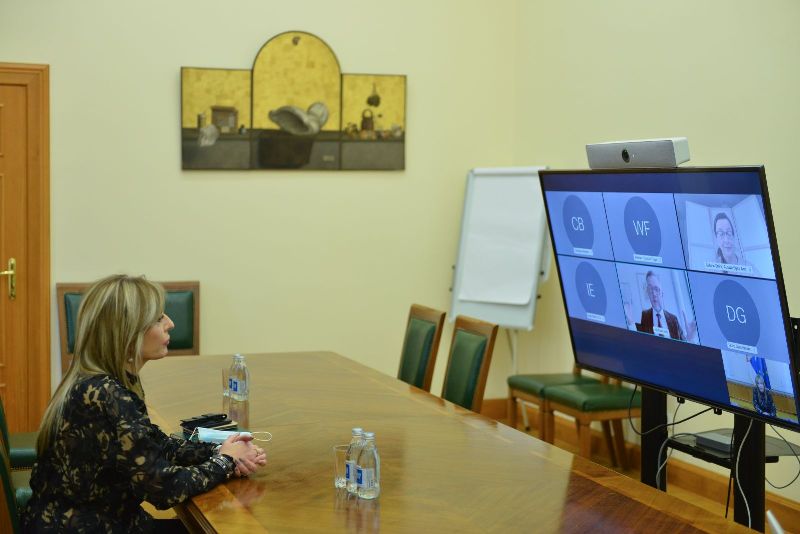
Minister of European Integration Jadranka Joksimović has held a video meeting today with Michael Roth, the Minister of State for Europe at the German Federal Foreign Office. They have discussed the current epidemiological situation in the two countries and the EU, as well as Serbia’s European integration process.
Joksimović and Roth have also talked about the issues related to the EU’s internal situation, particularly regarding the new seven-year budget, the place and the future of the enlargement policy and the Western Balkans, notably about all aspects of Serbia’s accession process, challenges and expectations from the new methodology, which should bring a faster negotiation process that would be better monitored and directed under stronger political steering.
Joksimović has particularly informed Roth about the fact that the Government of Serbia prepared a concrete implementation plan for the first negotiation cluster on the rule of law, which comprises five rule-of-law chapters that have already been opened, adding that the realisation of the plan has already begun.
“This serious implementation plan includes a repeated initiative sent to the National Assembly for the adoption of constitutional amendments, the adoption of the Action Plan for the implementation of the Media Strategy, as well as the Working Group on monitoring the implementation of the Action Plan and the Working Group on journalist safety and protection”, said Joksimović, according to the press release published by the Ministry of European Integration.
She has also stressed that GRECO recommendations for the fight against corruption have been published in a transparent way, and that further actions will be taken in line with them.
She has further presented all other important segments of Serbia’s reform policy in all six clusters, including Green Agenda, digitisation, Economic and Investment Plan for the WB, and stable and sound macroeconomic indicators, stressing that, therefore, this year, Serbia has again undeniably demonstrated that it deeply and substantively participates in key EU policies and that it is a credible European country.
Joksimović has emphasised that Serbia understands that the EU and member states will need some more time to define the application of the new methodology to Serbia’s negotiation process, and that it is therefore important to maintain a constant and open dialogue so as to direct the process in line with the new methodology.
She has expressed regret that conclusions on enlargement have not been adopted this year and that, consequently, the political Intergovernmental Conference with Serbia has not been held during the German presidency.
On the other hand, the Minister has expressed belief that the upcoming Stabilisation and Association Council will offer an opportunity to discuss all political and economic aspects of Serbia’s process at the highest level.
Roth has thanked Minister Joksimović for the information and issues she shared, as well as for Serbia’s proactive approach regarding reforms and active acceptance of the new methodology.
He has underlined that Germany supports Serbia and the enlargement policy, particularly welcoming all significant steps that the new Serbian Government has already taken, especially regarding cluster 1 – rule of law, where he stressed that they are an important and positive signal for Serbia’s European path.
He has agreed with Minister Joksimović about the need to urgently define the application of the new methodology to countries that are already in the accession process, where clusters of European policies and Serbia’s participation therein become an instrument for measuring progress in the accession process.
He has conveyed that Germany will advocate the holding of the political Intergovernmental Conference with Serbia in the first half of 2021.
The interlocutors have particularly discussed the Economic and Investment Plan for the Western Balkans, agreeing that it represents another proof that the European Union gives strategic importance to a stable and sustainable development of the region, particularly in difficult circumstances of curbing the effects of the COVID-19 pandemic.
Joksimović has thanked Minister Roth for Germany’s long-term and concrete assistance to Serbia’s European integration, not only at the political level, but also through providing development assistance for financing reform projects, and successful strategic investments that have created a significant number of new jobs.
The interlocutors have also agreed that it is extremely important that, through the COVAX Facility, Serbia has ensured that its access to vaccines procured by the EU will be almost simultaneous with the EU member states’ access.
Source: Tanjug |
|
|
| STATEMENT BY THE MINISTRY OF FOREIGN AFFAIRS |
|
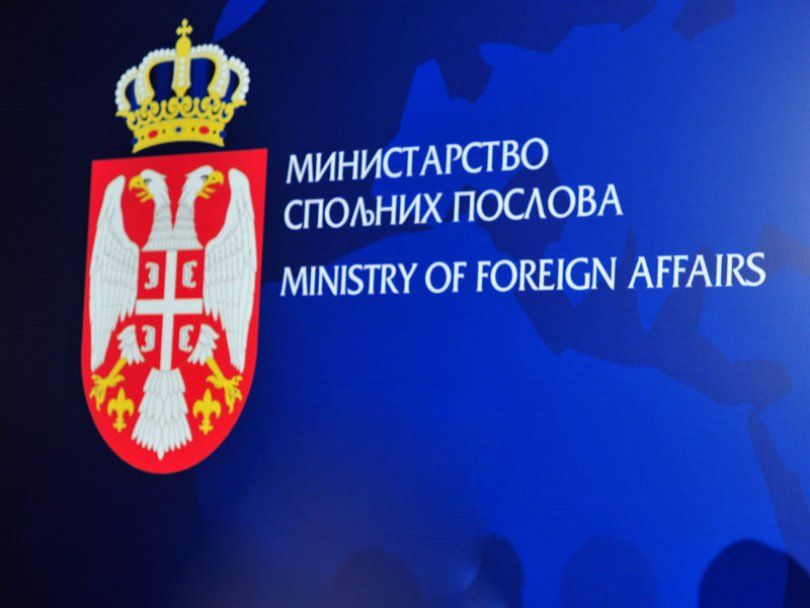
On the occasion of 10 December, the international Human Rights Day, the Ministry of Foreign Affairs of the Republic of Serbia reaffirms its commitment to the principles and values of the Universal Declaration of Human Rights, adopted on this day in 1948.
The principles enshrined in the Universal Declaration of Human Rights have been the foundation for the development of international law in this field, and of the international system for the promotion and protection of human rights, as a unique achievement of modern civilization. It is incumbent upon us today to safeguard and strengthen the international system ensuring respect for human rights, to develop human rights standards, control the implementation of commitments, and also to continue cooperating with international and regional institutions on the protection of human rights.
Serbia is fully committed to the universal values of human rights and implementing in practice the international legal instruments relating to human rights. Our continued cooperation with the Human Rights Council mechanisms in the framework of the United Nations, with the Council of Europe and the mechanisms of the OSCE human dimension, represents an important segment of activities carried out by all state authorities, thus demonstrating our consistent commitment to the implementation of international human rights standards.
The international Human Rights Day is an opportunity to point out once again that Serb and other non-Albanian population is being deprived of its rights in Kosovo and Metohija and to call again on the international community to ensure the respect for the guaranteed international human rights norms and contribute to creating conditions for the return of internally displaced persons and giving them back their usurped property. |
|
|
| President meets the ambassadors of the EU member states accredited to Serbia and the head of the European Union Delegation |
|
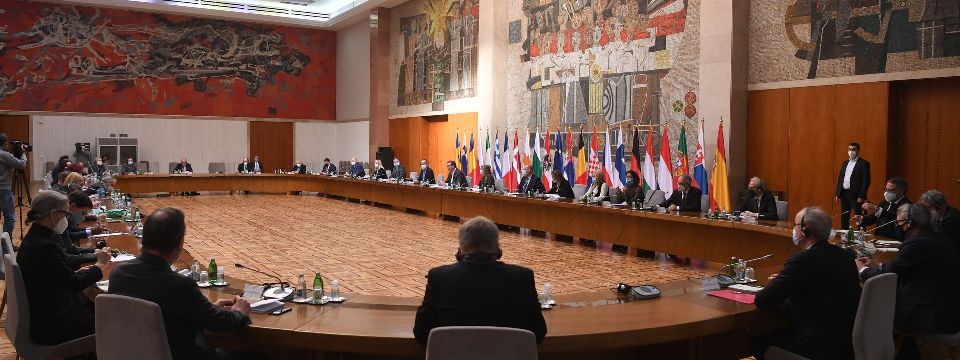
The President of the Republic of Serbia Aleksandar Vučić met today the ambassadors of EU Member States accredited to Serbia and the Head of the EU Delegation Sem Fabrizi in the Palace of Serbia, to talk to them about topics such as dynamics of the accession negotiations between Serbia and EU, stability in the region, regional projects, as well as the Economic and Investment Plan presented by the European Commission together with the Enlargement package.
President Vučić once again confirmed that cooperation with the European Union and fully-fledged membership of Serbia remain one of the key foreign policy priorities of our country. He particularly emphasised that in this respect Serbia is honestly dedicated to further and deeper reforms, approaching them with responsibility and seriousness, and that it tries to adopt and apply the best practice through cooperation with institutions of the EU and its member states.
"Serbia will continue being dedicated to the promotion of peace and stability in the region, by improving bilateral relations with neighbours, and by strengthening regional cooperation while respecting all concluded agreements", President Vučić stated, adding that the European future of the Western Balkans is of utmost importance for both stability of the entire region and security and further prosperity of the EU.
Ambassadors pointed out that declarations on the common regional market and the Western Balkans green agenda, which were signed by Serbia and all leaders of the region, received a warm welcome in Brussels and EU Member Stated, and that good and solid connectivity and integration of the region largely facilitates the cooperation of the very Union with the Western Balkans in all areas of joint interest.
"As much as 70% of foreign investments come from the countries whose representatives are sitting here today", Head of the EU Delegation to Serbia Sem Fabrizi said, adding that Serbia can rest assured the EU will continue supporting and investing in the Serbian economy. While Covid-19 has put all economies under stress, Serbian economy has resisted and proved its resilience. With the Economic and Investment Plan for the Western Balkans, the EU will remain Serbia's strongest partner for economic recovery which will support infrastructures, green and digital transition. We welcome the announced reforms in the areas of rule of law, including judiciary reforms and media freedom. This is precisely the base for acceleration of the accession process and we encourage the new government to keep working and implementing in this direction", Fabrizi said.
President Vučić pointed out that Serbia highly appreciates that the EU, despite numerous challenges it is facing has managed to preserve the enlargement issue on its agenda, especially through the recent adoption of a new, changed methodology of the negotiation process.
"In this respect, we expect from the EU that Serbia's accession negotiation dynamics follows and values our reform efforts", President Vučić said pointing out that Serbia is ready to continue working with its European partners on implementation of the reforms and numerous joint projects.
President Vučić particularly noted that Serbia welcomes the Economic and investment plan presented by the EC together with the Enlargement package, and expressed our country's readiness to continue working with the partners in the region on the implementation of this Plan so as to improve the economic potential of the region and achieve better infrastructure connection, which would bring us closer to the single European market.
"In this context, we hope the Multiannual financial framework 2021-2027 will be adopted soon, because that will mean a possibility to use funds designed for reform implementation in Serbia and in the region", President Vučić said, reiterating that Serbia remains on its European path with an honest faith in cooperation with the European partners.
"2020 has been an extremely difficult year for all, especially the impact of COVID–19. When I look at new Government's commitment to implement reforms, the Economic and Investment Plan of the EU, the new methodology and increased cooperation to fight COVID-19, I see 2021 with a much more favourable perspective for progressing the enlargement", Fabrizi concluded.
President Vučić also pointed out that Serbia is prepared to work intensively with the EU Member States on finding an adequate response to the new challenges, such as COVID-19 pandemic.
Belgrade, 8th December 2020 |
|
|
| Non-working day in the embassy |
|
The Embassy of the Republic of Serbia will be closed on Wednesday, 11 November 2020 in observance of Armistice Day. |
|
|
| The Government of the Kingdom of Sweden has decided to introduce a temporary entry ban to Sweden for the citizens of the Republic of Serbia. The decision will apply until 22 December 2020. |
|
The Swedish Government has decided on 17 July 2020 that the citizens of Serbia and Montenegro are not allowed to entry the Kingdom of Sweden due to Covid-19. The Decision has taken effect on 19 July 2020 and it will apply until 22 December 2020, when there will be a possibility for its reconsideration. |
|
|
| Non-working day in the embassy |
|
The Embassy of the Republic of Serbia will be closed on Friday, 19 June 2020 in observance of Midsummer Day. The consular section of the Embassy will be opened only for urgent matters. |
|
|
| THE TEMPORARY BAN ON ENTRY INTO THE REPUBLIC OF SERBIA HAS BEEN ABOLISHED |
|
The Government of the Republic of Serbia passed the Decision on termination of the Decision on closing all border crossings for entry into the Republic of Serbia, as well as the Decision on amendments to the Decision on declaring the disease COVID - 19 caused by SARS-CoV-2 infectious disease.
With the mentioned decisions, which entry into force today, 22 May, 2020, all border crossings of the Republic of Serbia have been opened and from today function in the usual regime for all categories of Serbian and foreign citizens.
Epidemiological measures for all categories of Serbian and foreign citizens have been abolished. Instead of previous measures (home isolation and the obligation to have a negative PCR test), passengers will be given a written notice, during passport control - a health warning about the measures to be followed to prevent the spread infectious diseases of COVID-19. |
|
|
| Non-working day in the embassy |
|
The Embassy of the Republic of Serbia will be closed on Thursday, 21 May 2020 in observance of the Ascension Day. The consular section of the Embassy will be opened only for urgent matters. |
|
|
| Non-working days at the Embassy |
|
The Embassy of the Republic of Serbia will be closed from Friday, 17 April until Monday, 20 April 2020 and on Friday, 1 May in observance of Easter and International Labour Day. |
|
|
| INSTRUCTIONS FROM THE SWEDISH MIGRATION OFFICE IN CASES OF EXCEEDING A PERMITTED RESIDENCE IN SWEDEN |
|
To see the Swedish Migration Office Guidelines for overstaying in Sweden, please click HERE
|
|
|
| Non-working days at the Embassy |
|
The Embassy of the Republic of Serbia will be closed for services with clients Friday 10th of April and Monday 13th of April 2020 in observance of Eastern holidays. |
|
|
| DIGITIAL CONTENTS – SERBIAN CULTURAL INSTITUTIONS 2020 |
|
Digital contents – Serbian cultural institutions 2020, press HERE |
|
|
| COVID-19 virus |
|
IMPORTANT NOTICE!
In order to combat the spread of infectious disease caused by the COVID-19 virus, the Consular Section of the Embassy of the Republic of Serbia in Stockholm informs all citizens of the Republic of Serbia residing in the jurisdiction of this diplomatic-consular mission that work with the visitors shall be limited to emergencies only, starting from 17 March 2020 until further notice.
Working on biometric acquisition, applying for a new passport and handing over travel documents are limited to emergencies, too.
In case of emergency, citizens are kindly requested to contact us by e-mail konzul.rs@telia.com as well as by the telephone number of the Embassy of the Republic of Serbia in Stockholm.
This measure will remain in force for as long as the risk of infection persists, and the public will be informed once it is not implemented any more through the website of the Embassy of the Republic of Serbia in Stockholm.
In accordance with the recommendations of the Government of the Republic of Serbia we kindly ask citizens who live and work in Sweden or Latvia to postponed traveling to the Republic of Serbia, which are not necessary. Please note that to all Serbian citizens that are coming from abroad will be given the mandatory self-isolation (14 or 28 days). Dual citizens can enter the Republic of Serbia only with a valid passport of the Republic of Serbia or travel document of the Republic of Serbia.
Information about the measures taken by the Republic of Serbia in order to prevent the spread of infection with the virus Covide -19 you can find on sajtu Vlade Republike Srbije i Ministarstva zdravlja Republike Srbije.
Thank you for your understanding.
|
|
|
| Reception on the occasion of the National Day of the Republic of Serbia, Stockholm, February 18, 2020 |
|
The Embassy of the Republic of Serbia in the Kingdom of Sweden has organized a reception to celebrate the National Day of the Republic of Serbia, on the 18th of February, at the European House - the headquarters of the EU Delegation in Stockholm. The event was attended by 207 guests, including representatives of the Swedish institutions, headed by the First Deputy Speaker of the Riksdag Ms. Åsa Lindestam and General Director for EU at the Swedish Ministry for Foreign Affairs Ms. Helen Eduards, diplomatic corps, Serbian Orthodox Church and Serbian diaspora (members of associations and clubs in Stockholm and Gothenburg, businessmen and artists).
After performance of the Swedish and Serbian anthems, Ambassador Momčilović has opened the ceremony. The Ambassador has briefly recalled the history of Serbian-Swedish diplomatic relations, which this year marks the 103rd anniversary of its establishment, with a focus on situation in the Western Balkans region and current bilateral cooperation, visits of Serbian officials to Stockholm over the past year and the expectation of continued successful cooperation through the organization of high-level visits of the Swedish officials to Belgrade in the upcoming period.
As in previous years, this year reception on the occasion of the Statehood Day was a good opportunity to gather and exchange views with representatives of the Serbian diaspora coming from different parts of Sweden.
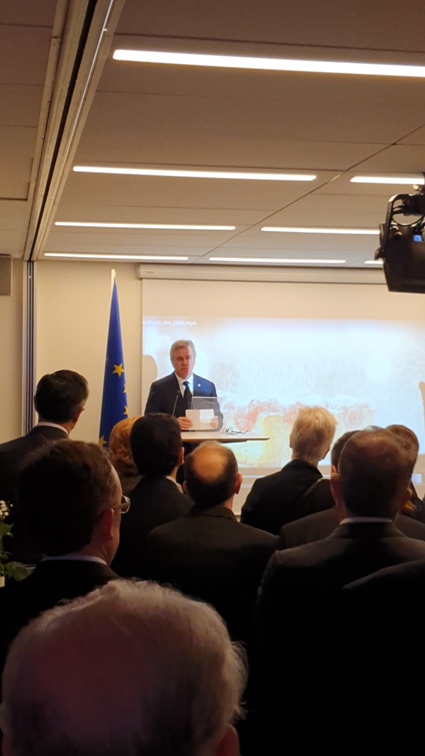 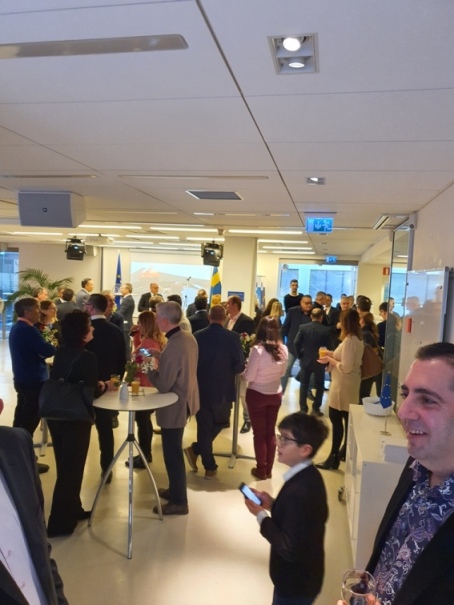 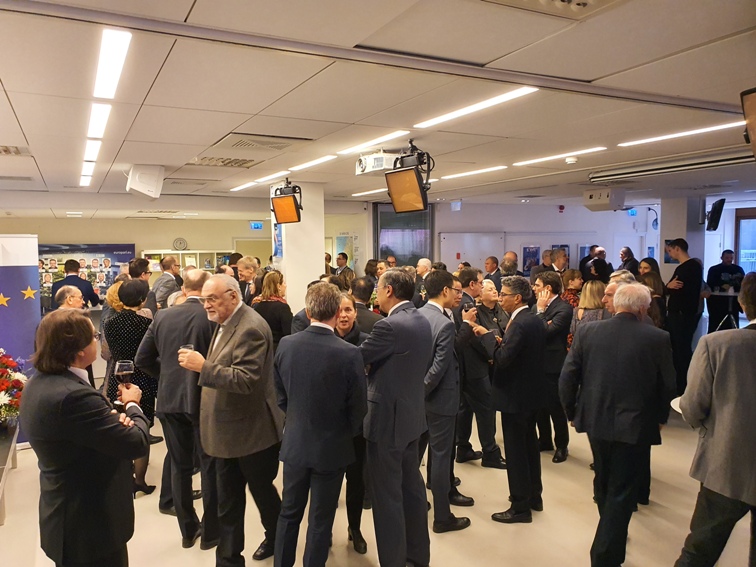 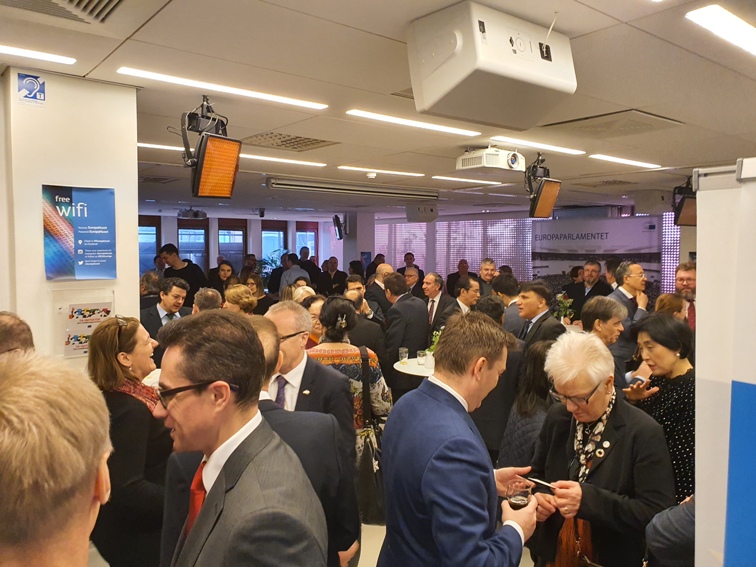 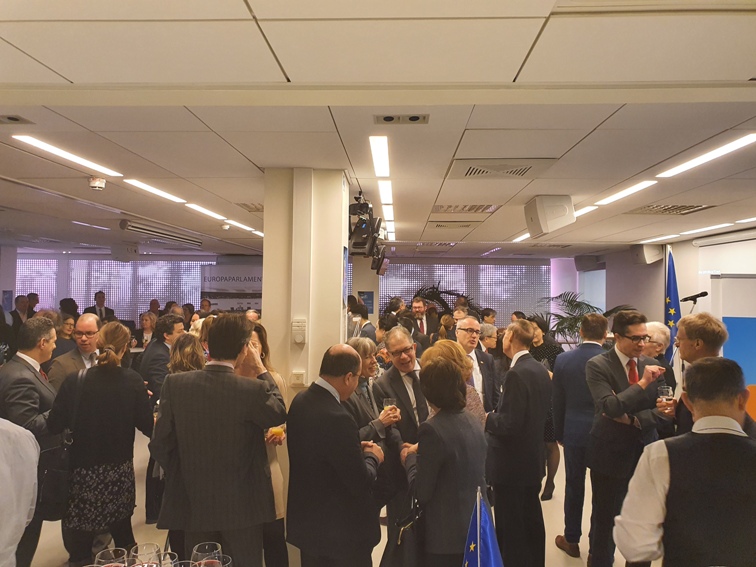 |
|
|
| The XXII International Drawing and Painting Competition Joy of Europe |
|
City Administration of Belgrade – Secretariat for Culture and Children’s Cultural Centre Belgrade are organizing The XXII International Drawing and Painting Competition Joy of Europe.
The competition is open to individuals, preschools, schools, children’s art studios, children’s cultural centres and similar children’s institutions and associations. Competition is open to all children from 4 to 18 years of age. The topic is free. Works must be original and done without any help, created in 2019 or 2020, and never shown at another international competition or exhibition. Submitted works will not be returned. Deadline for submissions is July 1st, 2020
Send your works to the following address:
Dečji kulturni centar Beograd, Takovska 8, 11000 Belgrade, Serbia
Application and further information can be fined
https://www.dkcb.rs/radost-evrope/radost-evrope-likovni-konkurs/ |
|
|
| Non-working day in the embassy |
|
The Embassy of the Republic of Serbia will be closed on Monday, 17 February 2020 in observance of National Day of the Republic of Serbia. The consular section of the Embassy will be opened only for urgent matters. |
|
|
| Ambassador Momcilovic's participation in the event dedicated to Swedish composer Bellman, Stockholm, February 3, 2020. |
|
The lecture, accompanied by concert dedicated to one of the Swedish most famous composer Carl Michael Bellman, was held in the overfull hall of the Swedish Royal Academy, on 3 February. It was about a prominent Swedish artist from the 18th century who, in addition to composing classical music pieces, was also their performer on the lute.
During the artistic part of the program, when Bellman's compositions were played, a diplomatic trio has performed, including Christian Schoenenberger, piano (Swiss ambassador), Dragan Momčilović, classical guitar (ambassador of Serbia) and Bernard Graf, violin (husband of the Austrian ambassador). Diplomatic trio was followed by Charlotta Huldt, distinguished Swedish opera singer. They played five Bellman's compositions, which were warmly welcomed by the Swedish audience.
Nevertheless, more than two centuries ago, Bellman himself performed in the hall of the Swedish Royal Academy, and every year this prestigious venue is the center of a gathering of Nobel laureates who make their opening keynote speeches.
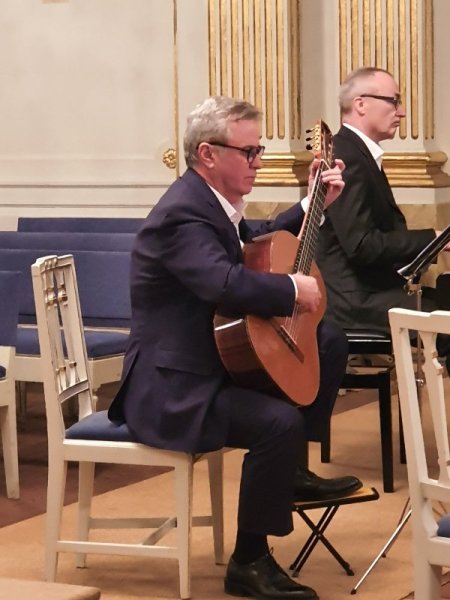 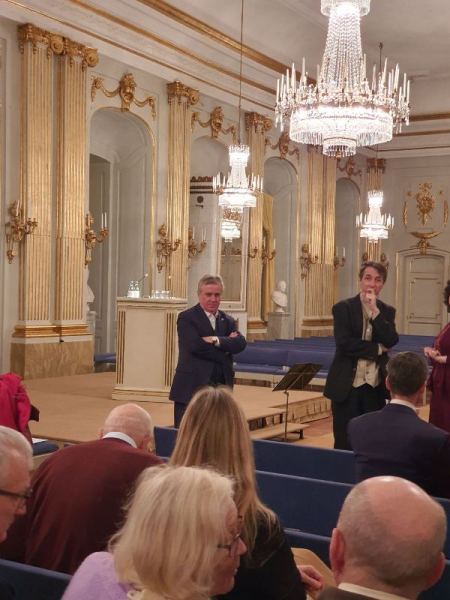 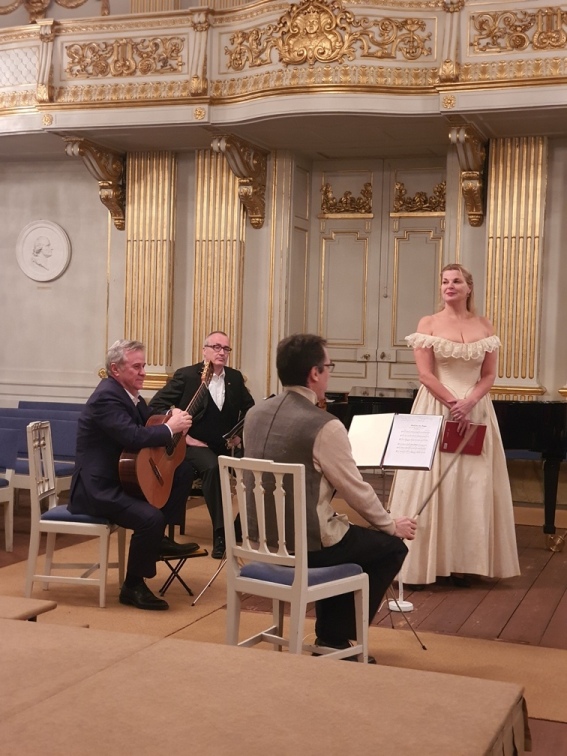 |
|
|
| Non-working day in the embassy |
|
The Embassy of the Republic of Serbia will be closed on Wednesday, 1 January and on Thursday, 2 January 2020 due to New Year holidays. The consular section of the Embassy will be opened only for urgent matters. |
|
|
| Non-working day in the embassy |
|
The Embassy of the Republic of Serbia will be closed on Tuesday, 24 December, Wednesday, 25 December and Thursday, 26 December 2019 as well on Tuesday, 7 January 2020 due to Christmas celebrations. The consular section of the Embassy will be opened only for urgent matters. |
|
|
| Visit of the Minister of Environmental Protection Goran Trivan to Stockholm, 25-26 November 2019. |
|
Minister of the Environmental Protection of the Republic of Serbia Goran Trivan paid a visit to the Kingdom of Sweden, 25-26 November 2019, during which he met with the Swedish Minister for the Environment and Climate and Deputy Prime Minister Isabella Lövin, Director General of the Swedish Environmental Protection Agency Björn Risinger and Director General of the Swedish Chemicals Agency Per Ängquist. Also, the delegation of the Serbian Ministry of Environmental Protection held a meeting with the Deputy Director for Europe and Latin America at the Swedish Agency for International Development Cooperation Christina Hartler.
During the talks, it has been confirmed that Serbia and Sweden have good bilateral relations and that both countries are dedicated to develop even closer cooperation on environmental issues. At the meeting with Minister Lövin, Minister Goran Trivan has presented the activities and results of the work of the Ministry in the context of preparations for the opening of Chapter 27 (Environment) within the process of Serbia's accession towards the EU. Swedish Minister Isabella Lövin has positively assessed Serbia's achievements in improving the environment, expressing support for further efforts in this area as well as for the realization of Serbia's European perspective. At meetings with the representatives of the competent Swedish agencies, it has been concluded that opportunities for strengthening Serbian-Swedish cooperation in the field of environmental protection exist within the framework of the implementation of actuel projects in Serbia, mainly for waste water treatment and municipal waste management, but also of the new projects on a regional, national and local level.
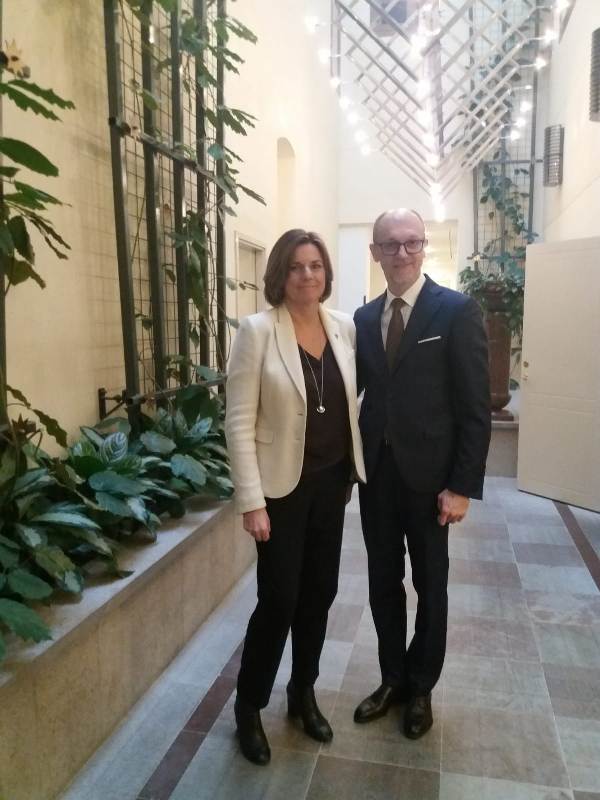 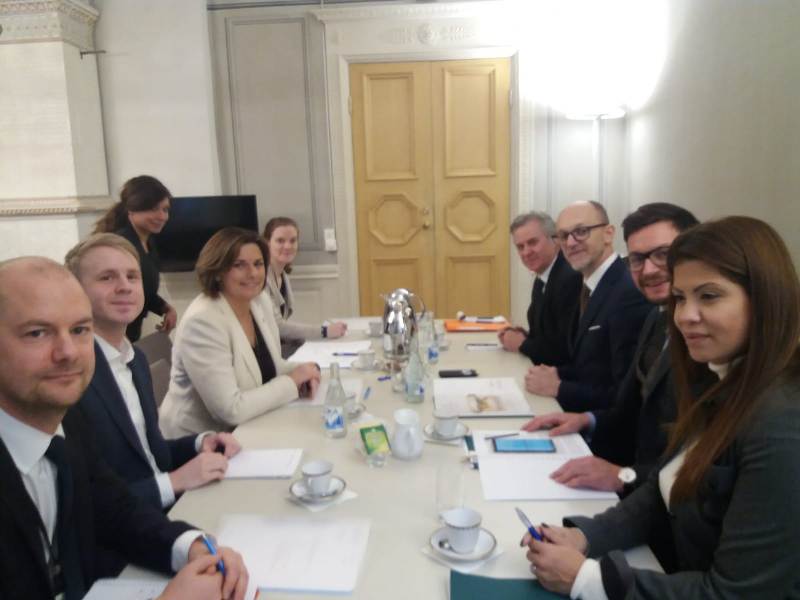 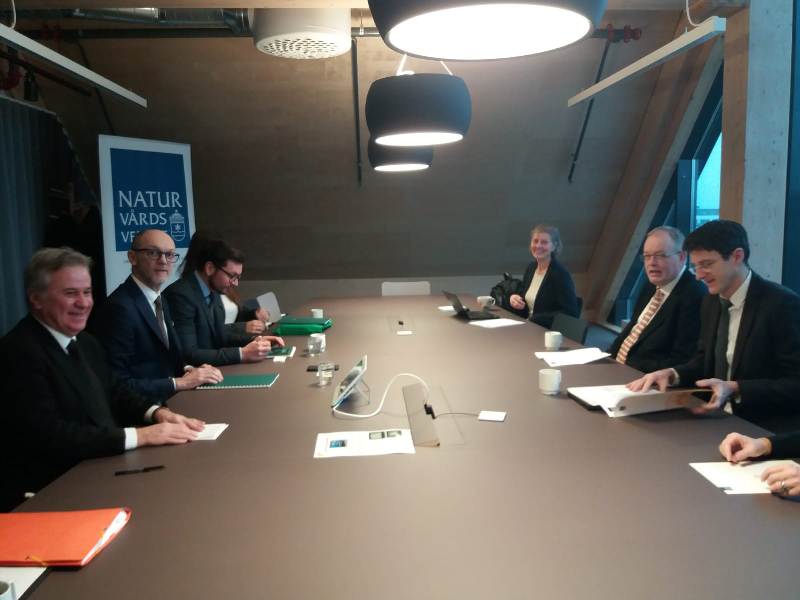 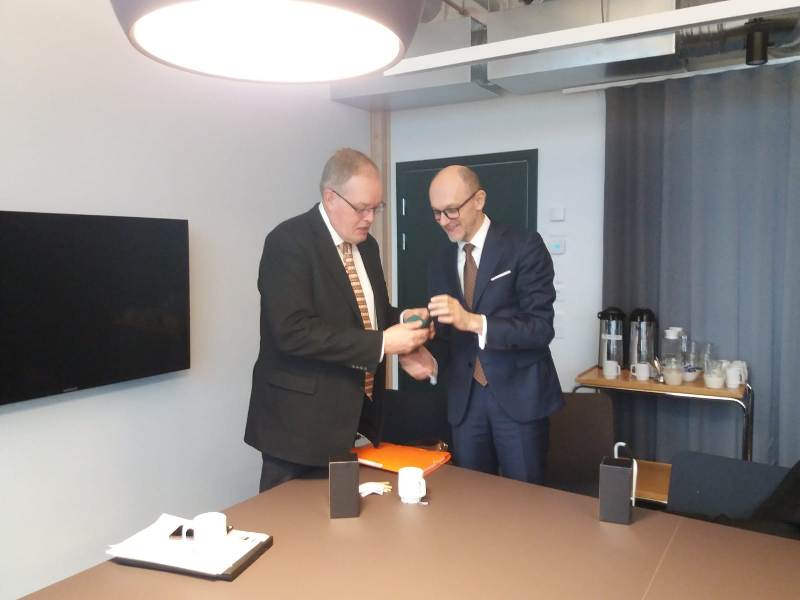 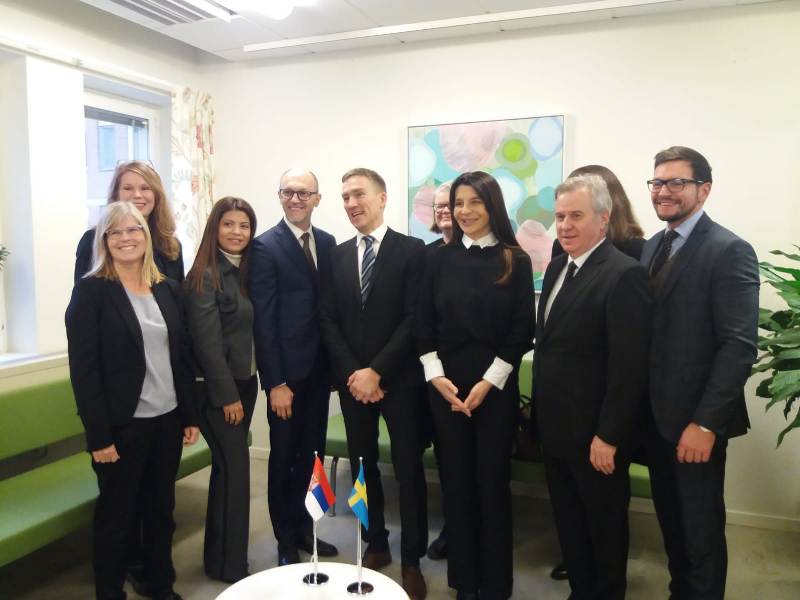 |
|
|
| STOCKHOLM: Literary evening dedicated to Peter Handke |
|
Literary evening dedicated to Peter Handke, winner of the 2019 Nobel Prize in Literature, took place at the Pygméteatern in Stockholm, on the 4th of November 2019. The event was organized by Jelena Mila, founder of Stockholm's "New Balkan Film Festival - BaNeFF". Embassy of the Republic of Serbia in the Kingdom of Sweden has also supported and cooperated in realization of this project.
During this literary gathering called "Poem to Duration", Jelena Mila, who is also a dramatic artist, read fragments from Handke's works in Serbian and Swedish languages, accompanied by concert soloist Ljubica Sekulic (Bach's compositions for viola).
After this literary evening attended mostly by representatives of the Serbian diaspora in Sweden, as well as representatives of the Embassy of the Republic of Serbia in Stockholm, there was also a screening of the 1987 movie "The Sky Above Berlin" directed by Wim Wenders, with the screenplay written partially by Peter Handke.
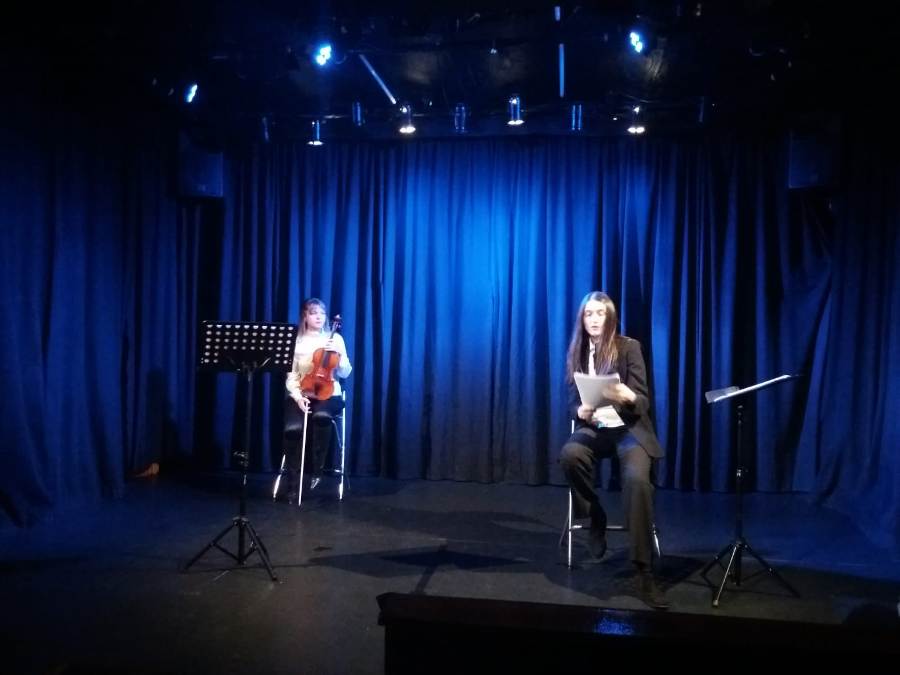 |
|
|
| Non-working day in the embassy |
|
The Embassy of the Republic of Serbia will be closed on Monday, 11 November 2019 in observance of Armistice Day. |
|
|
| DECISION OF THE GOVERNMENT OF THE REPUBLIC OF SERBIA ON ABOLISHING VISA REGIME WITH THE REPUBLIC OF ARMENIA |
|
Citizens of the Republic of Armenia, holders of the ordinary passports can enter, transit and stay on the territory of the Republic of Serbia until ninety (90) days from the date of their entry into the Republic of Serbia, for a period of one hundred and eighty (180) days, if there are no obstacles under the Article 15 of the Foreigners Act. A decision will come into force on 2nd November 2019. |
|
|
| Visit of Minister of Agriculture, Forestry and Water Management of the Republic of Serbia Mr. Branislav Nedimović to the Kingdom of Sweden, 19-20 September 2019 |
|
Minister of Agriculture, Forestry and Water Management of Serbia Mr. Branislav Nedimović has paid a bilateral visit to Sweden, on the 19-20th of September 2019. On that occasion, he had a meeting with Swedish Minister for Rural Affairs Ms. Jennie Nilsson, Director-General of the Swedish International Development Cooperation Agency (Sida) Ms. Carin Jämtin and collaborators, Director-General of the Swedish National Food Agency Ms. Annica Sohlström, as well as the representatives of the University of Agricultural Sciences (SLU) in Uppsala - Rector at SLU Ms. Maria Knutson Wedel, Rector for International Cooperation Ms. Ylva Hillbur, Heads of Departments for Ecology and Crop Production Ms. Anna Lundhagen and Ms. Carolyn Glinn and Professor Velemir Ninković.
During the talks, Minister Nedimović and Minister Nilson discussed the possibilities for improving cooperation between the two countries in the field of agriculture, especially in the domain of production and export of the Serbian organic agricultural products to the Swedish market. The main topics at the meetings with the high officials of the Swedish National Food Agency and Sida covered comparative practices in the area of product certification and the potential for strengthening trade in agricultural products with Sweden, in particular, the export of Serbian organic dried berries. Meetings at SLU were an opportunity to get information about the model of functioning and organisation of this academic institution, as well as to intensify the existing bilateral exchange of students and academic staff with the respective universities in Serbia.
During the visit, Minister Nedimovic also met with potential Swedish importers of Serbian organic food, who announced a visit to Belgrade in order to get in contact with Serbian fruit-producing and fruit-processing companies.
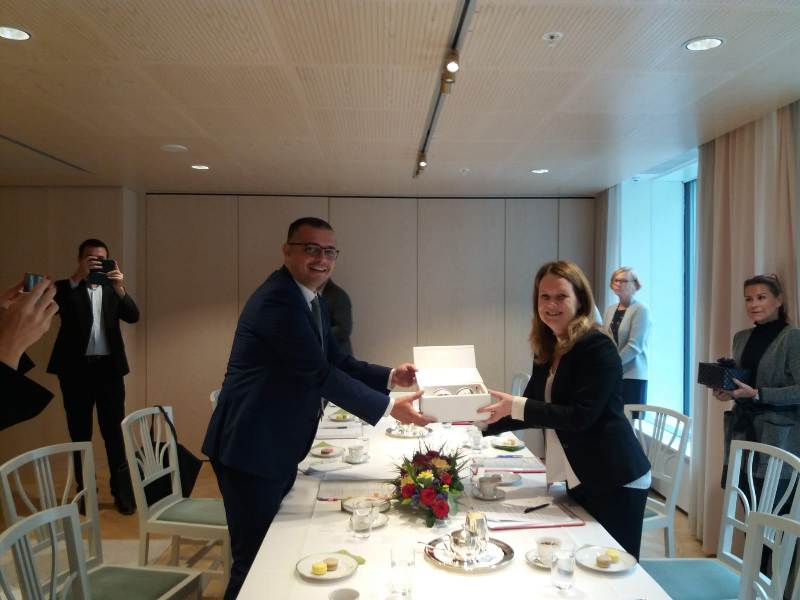 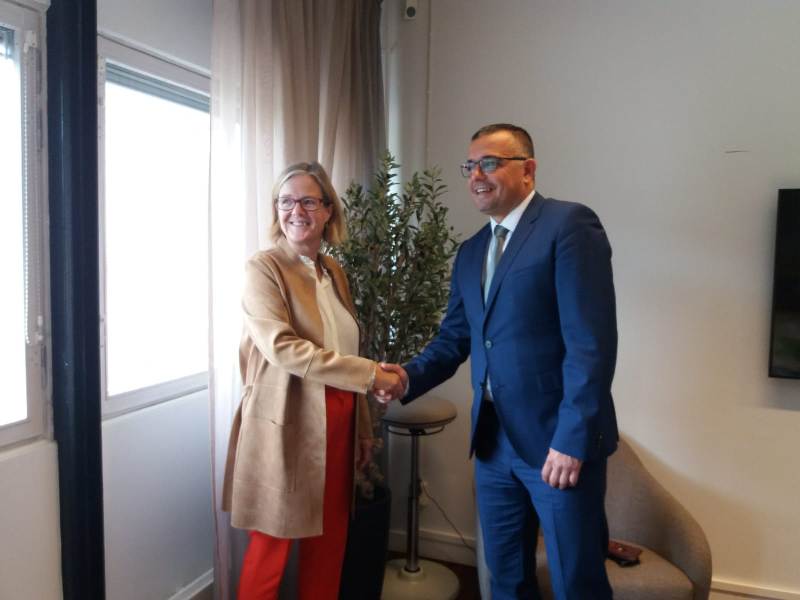 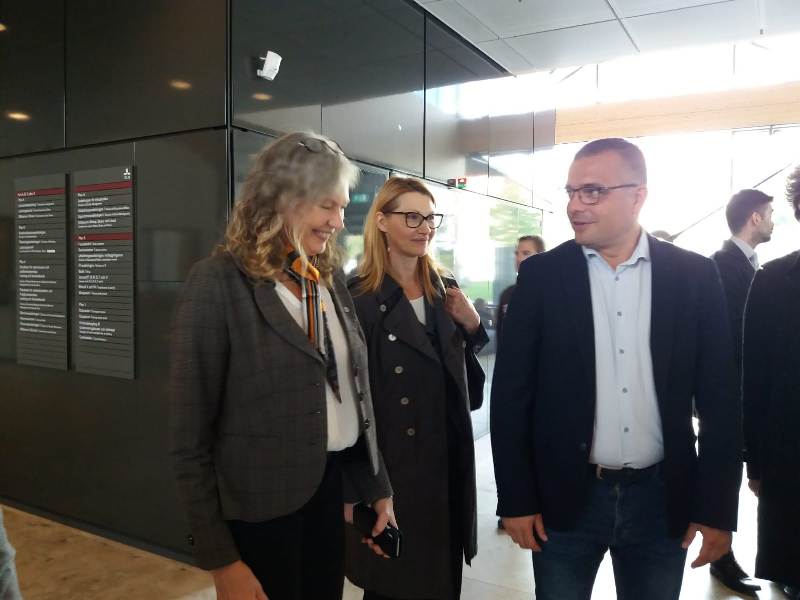  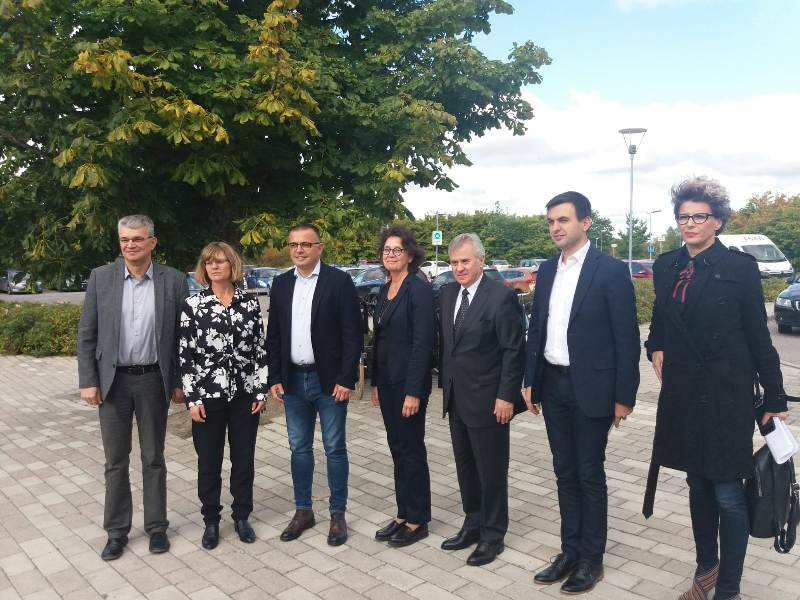 |
|
|
| Meeting of Ambassador Dragan Momčilović with Assistant Minister for Environmental Protection of the Republic of Serbia Biljana Filipović Đušić and National Coordinator of the Ministry of Health for the Protocol on Water and Health Dragana Jovanović, who have participated at the international conference „World Water Week“ in Stockholm, 24-28 August 2019. |
|
 |
|
|
| State Secretary at the Ministry of Foreign Affairs of the Republic of Serbia Nemanja Stevanovic participated in the High Level Ministerial Conference on the Western Balkans in Stockholm |
|
State Secretary of the Ministry of Foreign Affairs of the Republic of Serbia Nemanja Stevanovic participated in the High Level Ministerial Conference on the Western Balkans, held in Stockholm on 24 June 2019. The conference was organized jointly for the third time by the Ministry of Foreign Affairs of the Kingdom of Sweden and the European Commission’s Representation in Stockholm. Previous conferences with a focus on the Region were held in Stockholm, in December 2015 and in May 2017.
On this occasion, as part of the High Level Ministerial Conference, the panel discussion on the European perspective and development of the Western Balkans region was held at the European House, with the introductory addresses by the Swedish Foreign Minister Margot Wallström and the EU Commission Director for the Western Balkans Ruiz Calavera, as well as the presentations of the ministers of foreign affairs, state secretaries and other representatives from the Western Balkans region.
In his address at the panel, State Secretary Stevanovic highlighted Serbia’s dedication to the achievement of the full-fledged EU membership, concrete results of Serbia’s progress in implementing reforms, with a focus on further strengthening good neighborly relations and enhancing regional co-operation. He particularly pointed out the importance of resolving the issue of Kosovo and Metohija as a precondition for the long-term stability in the Region. In this context, in order to return to the Bruxelles dialogue, he underlined the necessity of withdrawing Pristina’s decision on taxing goods from Serbia, as well as to refrain from undertaking other provocative, unilateral measures.
On the margins of the conference, State Secretary Nemanja Stevanovic had a tête-à-tête meeting with the host, Foreign Minister of the Kingdom of Sweden Margot Wallström, during which Swedish support to the European path of Serbia and the Western Balkans region was confirmed. It was pointed out that the realization of the European perspective of the Western Balkans is important for its stability and prosperity, but also that it is in the long-term interest of the EU. Both sides have identified the need to further strengthen bilateral cooperation between Serbia and Sweden on the economic and investment level.
After the political part of the Ministerial Meeting on the Western Balkans in Stockholm, the business forum was held with the participation of Swedish Minister for trade and Nordic cooperation Ann Linde, representatives of the Swedish Investment and Trade Council – “Business Sweden”, relevant ministers of economy from the Western Balkans and officials of important Swedish companies interested in investing in the Region. In this part of the conference, under the title “Economic development in the Western Balkans – prioritised sectors for the EU and the IFIs funded support”, Serbia was represented by Minister without portfolio in charge of innovation and technological development Nenad Popovic, who presented the development of the innovation environment in Serbia and pointed out the role of the younger generation.
  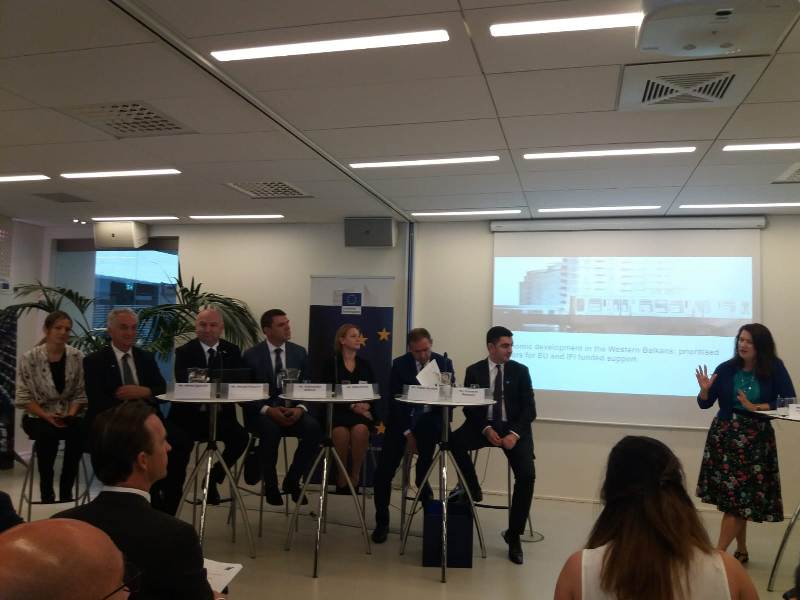 |
|
|
| Non-working day in the embassy |
|
The Embassy of the Republic of Serbia will be closed on Friday, 21 June 2019 in observance of Midsummer Day. |
|
|
| Non-working day in the embassy |
|
The Embassy of the Republic of Serbia will be closed on Thursday, 6 June 2019 in observance of the National Day of the Kingdom of Sweden. |
|
|
| Non-working day in the embassy |
|
The Embassy of the Republic of Serbia will be closed on Thursday, 30 May 2019 in observance of the Ascension Day. |
|
|
| The Agreement between the Government of the Republic of Serbia and Government of the United Arab Emirates |
|
The Agreement between the Government of the Republic of Serbia and Government of the United Arab Emirates on mutual visa exemption for holders of diplomatic, services, special and ordinary passports
The Agreement between the Government of the Republic of Serbia and Government of the United Arab Emirates on mutual visa exemption for holders of diplomatic, services, special and ordinary passports, enters into force on 12th of May 2019.
Based on this Agreement, nationals of the Republic of Serbia and of the United Arab Emirates, who are holders of above mention passports, will have the right to enter into, transit through and stay on the territory of the other Party without visa in the period not exceeding 90 (ninety) days during a 6 (six) month period. |
|
|
| Balkan New Film Festival |
|
News related to the upcoming events within the „Balkan New Film Festival“, that will take place in Stockholm, Norrköping and Västerås, 9-14 May 2019, can be found at the web site http://www.baneff.com |
|
|
| Rules on the conditions for the non-commercial movement of pet animals |
|
The Embassy of the Republic of Serbia would like to inform that the "Regulation on conditions for the non-commercial movement of pet animals (entry in the Republic of Serbia) that do not require a solution for import and transit, as well as the appearance and content of the form of certificates to these shipments" (the Official Gazette of the Republic of Serbia no. 20/19 of 03/22/2019) has entered into force. The necessary information and certificates can be found on the website of the Veterinary Department of the Ministry of Agriculture, Forestry and Water Management of the Republic of Serbia:
http://www.vet.minpolj.gov.rs/srb/movement-of-pets |
|
|
| Promotion of tourist potential of Serbia and Belgrade, Stockholm 15 April 2019 |
|
Promotion of tourist potential of Serbia and Belgrade was organized in Stockholm on the 15th of April 2019 by National Tourism Organization of Serbia, Tourist Organization of Belgrade, SVT journalist Jovan Radomir and in cooperation with the Embassy of the Republic of Serbia in the Kingdom of Sweden.
The reception on this occasion, that took place at the restaurant „Sjö och Land” in central Stockholm, was attended by 70 guests, including the Swedish media representatives, Swedish business community as well as the representatives of Serbian diaspora in Sweden.
At the beginning of the event, Ambassador of the Republic of Serbia to the Kingdom of Sweden Dragan Momčilović has welcomed the guests with a brief summary of the historical sites of Belgrade and eminent figures in Serbian history.
In addition, the representatives of National Tourism Organization of Serbia and Tourist Organization of Belgrade, Željka Pudar and Jelena Stanković have pointed out the advantages of Belgrade “as the city with a soul”, and of Serbia as an attractive destination with a wide range of offers, from Kopaonik ski center, natural beauties of Stara planina, Novi Sad as the European cultural capital in 2021, to the music festivals like Exit, Beer fest and Guča.
During the evening, the guests have seen a few short promoting movies about Serbia („See Serbia“, „Soulfood Serbia“) and Belgrade („Visit Belgrade - feel its love“), with journalist Jovan Radomir as moderator of the evening. They also have had an opportunity to try traditional Serbian food and wines from winery “Toplički vinogradi”.
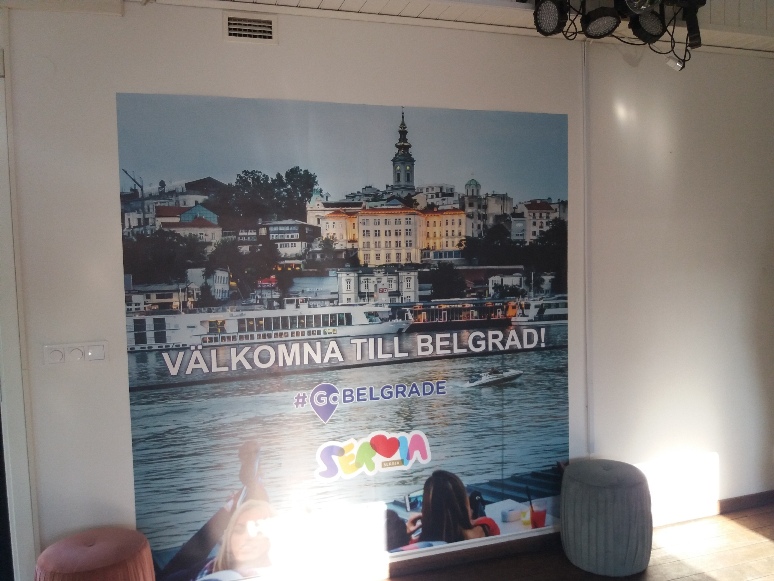 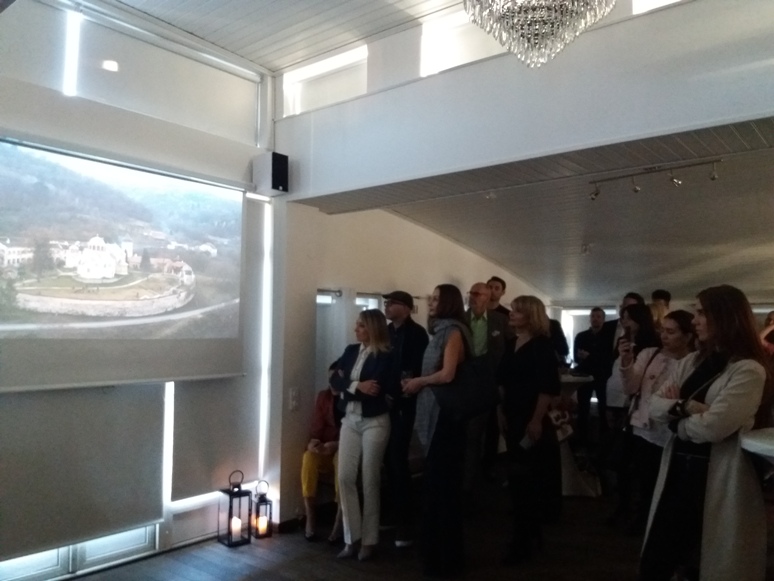 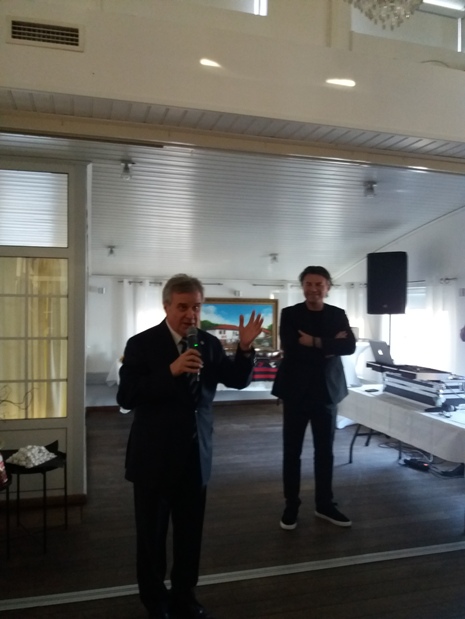 |
|
|
| The 21 International Drawing and Painting Competition Joy of Europe |
|
City Administration of Belgrade – Secretariat for Culture and Children’s Cultural Centre Belgrade are organizing The XXI International Drawing and Painting Competition Joy of Europe.
The competition is open to individuals, preschools, schools, children’s art studios, children’s cultural centres and similar children’s institutions and associations. Competition is open to all children from 4 to 18 years of age. The topic is free. Works must be original and done without any help, created in 2018 or 2019, and never shown at another international competition or exhibition. Submitted works will not be returned. Deadline for submissions is July 1st, 2019
Send your works to the following address:
Dečji kulturni centar Beograd, Takovska 8, 11000 Belgrade, Serbia
Za sve dodatne informacije javite se na: е- мail: lidija.senicar@dkcb.rs
Ili na link: https://www.dkcb.rs/ |
|
|
| Ambassador Dragan Momčilović with the Speaker of the Riksdag Andreas Norlén |
|
Ambassador Dragan Momčilović with the Speaker of the Riksdag Andreas Norlén, at the meeting on the 14th of March 2019. |
|
|
| 20 years after NATO bombing |
|
den 24 mars 2019, kl. 12.00,
ABF Stockholm, Sveavägen 41, Sandlersalen
Välkomna till föredrag som ger oss en närmare bild av händelserna på Balkan 1999, samt dess långsiktiga hälso- och miljöförstörelser
NATO bombningen аv Förenta Republiken Jugoslavien (Serbien och Montenegro) började den 24 mars 1999 kl. 19.45. Bombningarna pågick i 78 dagar, till den 10 juni. Den materiella förstörelsen var enorm medan tusentals civila dödades och skadades.
20 år efter, fortsätter Serbien och Montenegro leva med stora långsiktiga hälsoskador, inte minst miljöförstörelse som är resultatet av NATO:s användande av ammunition av utarmat uran.
Historiskt perspektiv presenteras av
PhD Slobodan Jankovic, Head - Centre for Neighbourly and Mediterranean countries, Research Fellow, Institute of International Politics and Economics
Hälsö- och miljöpåverkan presenteras av
PhD Srdjan Aleksic - Lawyer, owner of Aleksic Law Office
Under kvällen visas två dokumentärfilmer
Бомбы которые взорвали мир/The bombs that blew up peace 2017 documentary, Ukraine, 41′
Uranium 238 Moja priča/Uranium 238 My Story, 2018, documentary, Serbia, 21' - båda textade på engelska.
Föredraget är på engelska med möjlighet till översättning till serbiska och svenska.
FRI ENTRÉ med biljettbokning via mail:
info@srpstvo.com
(ange namn och antal platser)
Arrangör Foundation Empress i samarbete med ABF Stockholm
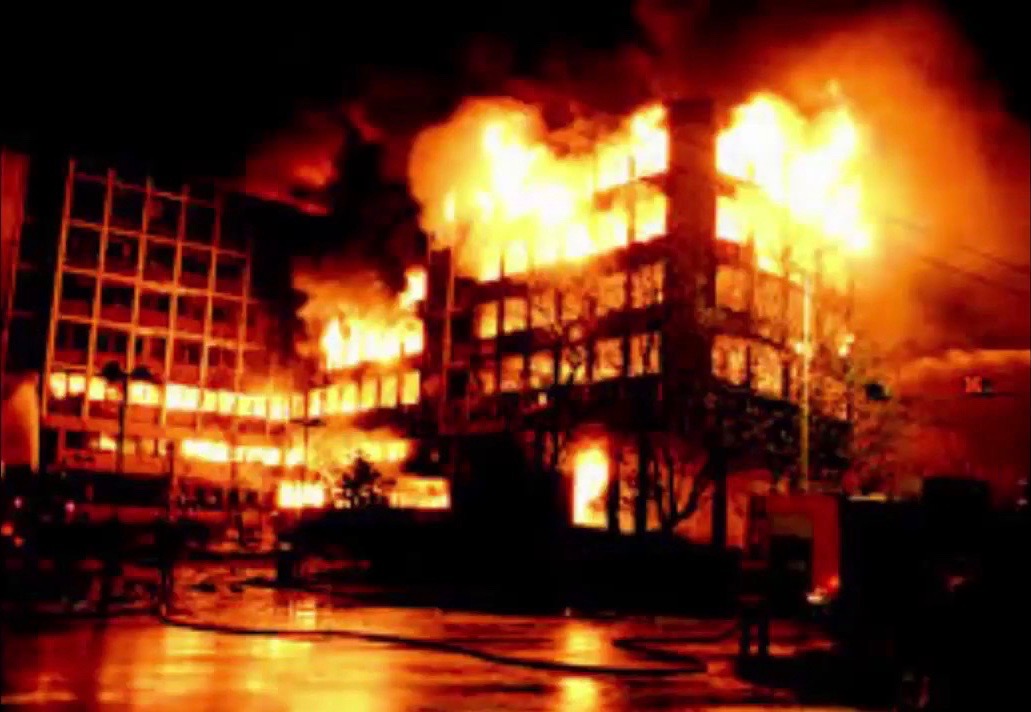 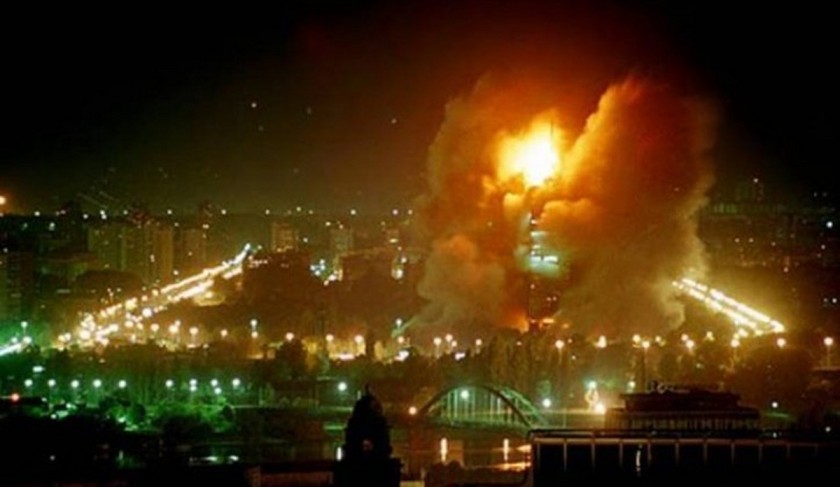
(Photo: WEB archive) |
|
|
| Swedish Minister for Foreign Affairs Margot Wallström with the Ambassadors of the EU member states and candidate countries for the EU membership |
|
Swedish Minister for Foreign Affairs Margot Wallström with the Ambassadors of the EU member states and candidate countries for the EU membership, at the meeting at the Embassy of Romania in Stockholm, on the 6th of March 2019. Ambassador Dragan Momčilović has also attended the meeting.
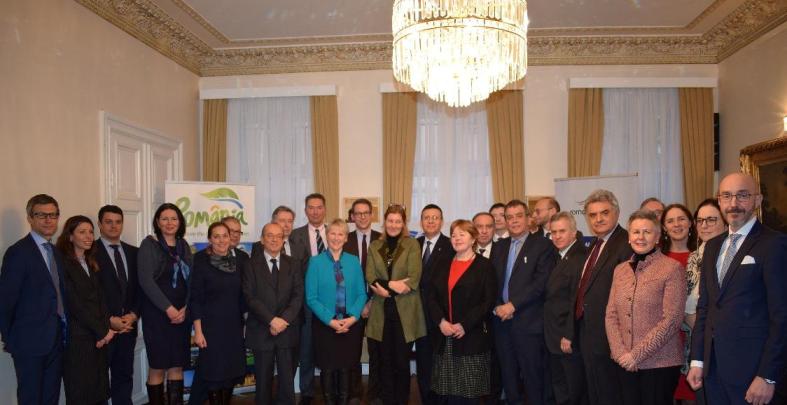 |
|
|
| Reception dedicated to the celebration of the Statehood Day of the Republic of Serbia, February 2019 |
|
Embassy of the Republic of Serbia in Stockholm has organized the Reception on the occasion of celebration of the Statehood Day of the Republic of Serbia, at the “Europahuset” (EC Delegation Headquarters in Stockholm) on the 28th of February 2019. The ceremony was attended by 150 guests, including the representatives of the Swedish institutions (Ministry of Foreign Affairs, Swedish International Development Cooperation Agency - SIDA, Business Sweden), Embassies accredited to the Kingdom of Sweden from the EU member states, Russia, USA, China, India and other countries from Asia, Africa and Latin America (remarkable attendance at the ambassador level), Serbian diaspora (Serbian clubs, businessmen, journalists and artists), Serbian Orthodox Church and Swedish NGOs.
On that occasion, Ambassador of the Republic of Serbia to the Kingdom of Sweden Dragan Momčilović has delivered a welcome speech to the guests, presenting historical facts about the Serbian Statehood celebration, with the view on Serbian – Swedish bilateral relations and the mainstreams of the Serbian foreign policy. Ambassador Momčilović has particularly stressed out our orientation to the achievement of the full-fledged EU membership, regional stability, as well as the Serbian contribution to the European security, proven by significant participation of the Serbian Army personnel in the EU and UN peacekeeping missions during 2018. The reception has got a positive evaluation by the representatives of the Serbian diaspora and by the Swedish invitees who used this ceremony for making mutual acquaintances and conversations.
   |
|
|
| DECISION OF THE GOVERNMENT OF THE REPUBLIC OF SERBIA ON ABOLISHING VISA REGIME WITH FEDERATION OF ST. KITTS AND NEVIS AND REPUBLIC OF PALAU |
|
Citizens of the Federation of St. Kits and Nevis and the Republic of Palau, holders of all passports, can enter, transit and stay on the territory of the Republic of Serbia until ninety (90) days from the date of their entry into the Republic of Serbia, for a period of one hundred and eighty (180) days, if there are no obstacles under Article 15 of the Foreigners Act.
A decision will come into force on January 25th 2019. |
|
|
| Bilateral consultations in security policy between the Ministry of Foreign Affairs of the Republic of Serbia and the Ministry of Foreign Affairs of the Kingdom of Sweden |
|
Ambassador Branimir Filipović, Acting Assistant Minister of Foreign Affairs of the Republic of Serbia for Security Policy, has held bilateral consultations in security policy with Mr.Julius Liljeström, Deputy Director-General and Head of the Department for European Security Policy at the Ministry of Foreign Affairs of the Kingdom of Sweden, on the 31st of January 2019 in Stockholm.
During the meeting, as a follow-up of the previous consultations that took place on the 5th and 6th of March 2018 in Belgrade, the officials have shared the experiences about partnership cooperation of Serbia and Sweden within the NATO Partnership for Peace programme, cooperation of Serbia with the EU in security policy, as well as in the field of combating the comtemporary security challenges, participation in multinational peacekeeping operations and missions and cooperation in disarmament, non-proliferation and arms control issues.
During the working lunch, co-hosted by Deputy Director-General for European Security Policy Mr. Julius Liljeström and Deputy Director-General for European Affairs at the Swedish Ministry of Foreign Affairs Ms. Helen Eduards, the counterparts have exchanged views on security situation in the Western Balkans, actuel developments within the dialogue between Belgrade and Pristina, as well as on the Serbia’s endeavours in the EU Accession process and cooperation with the EU in common security and defence policy.
While visiting Stockholm, Ambassador Filipović has also had a meeting with the officials of the eminent Stockholm International Peace Research Institute -SIPRI.
31st of January 2019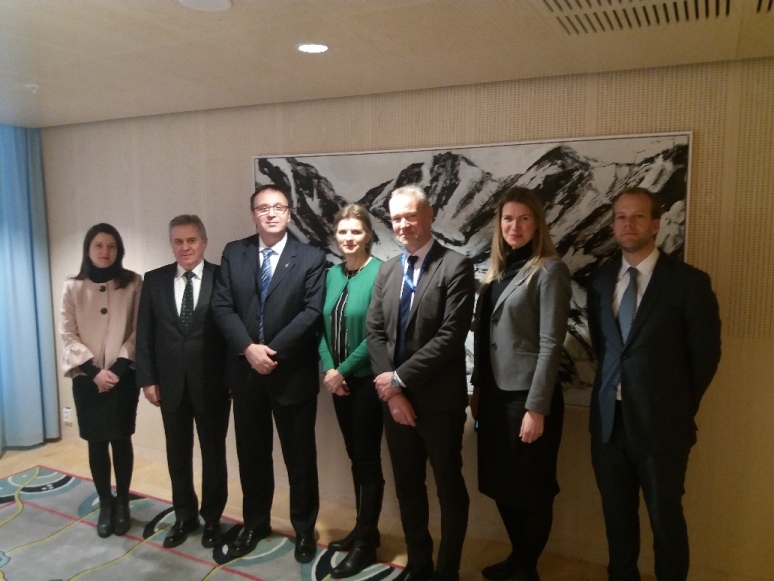 |
|
|
| New Balkan Film Festival – BaNeFF |
|
The seventh „New Balkan Film Festival – BaNeFF“ was held in Stockholm, 19-21 December 2018. The guests of the Festival were directors: Olga Lazebnik from Ukraine, Aleksandar Vujović from Montenegro, Aleksandar Reljić and Miloš Škundrić from Serbia and Milan Petković from Bosnia and Herzegovina.
Within the celebration of the Centennial of the First World War and Serbia’s participation, on the proposal of the Serbian Ministry of Culture and Information, programme of the Festival included movies from Serbia – „DUGO PUTOVANJE U RAT/Long road to war“, directed by Milos Skundrić and „SRBI NA KRFU- STO GODINA OD ALBANSKE GOLGOTE/ Serbs on Corfu – A Hundred Years since Albanian Golgotha“, directed by Sladjana Zarić.
The movies’ performances were attended by Swedish public, particularly artists and scholars, as well as by the Ambassador of the Republic of Serbia to the Kingdom of Sweden H.E. Dragan Momčilović, who participated in the debate after the films projection.
The jury of the BaNeFF 2018 documentary and short film festival, presented by Mikael Ruttkay (director), Hylin Håkan Pieniowski (director) and Olgica Lindquist (publicist), have decided to give the „Prize for the Best film“ to two movies: „ISTI/ The Same“ directed by Dejan Petrović, and to „DUGO PUTOVANJE U RAT/Long road to war“ directed by Miloš Škundrić.
The „Prize for the Best Female Achievement“ goes to the director of the „OKUPIRANI BIOSKOP/ Occupied cinema“ Senka Domanović.
Jury decided to give a “Special Prize” to movie „Veruda/ A Film About Bojan“ by Igor Brzinović.
“FESTIVAL special AWARDS for filmmakers courage to observe” go to:
1)”Бомбы кото рыевзорвали мир/ The bombs that blew up peace”, 2017, documentary dedicated to bombing of Belgrade in 1999, Ukraine, director Olga Lazebnik,
2) “Enkel/Grandson”, 2018, documentary, Serbia, director Aleksandar Reljić and
3)”Južni potez/ Southern Move”, 2018, documentary, Bosnia and Hercegovina, director Milan Petković.
“Festival Diploma” goes to “The Last Gift”, 2011, short film, Montenegro, directed by Aleksandar Vujović.
|
|
|
| New Balkan Film Festival – BaNeFF |
|
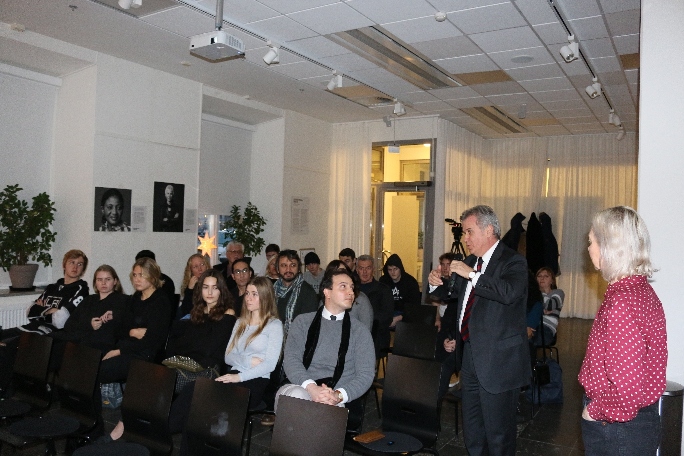 |
|
|
| New Balkan Film Festival – BaNeFF |
|
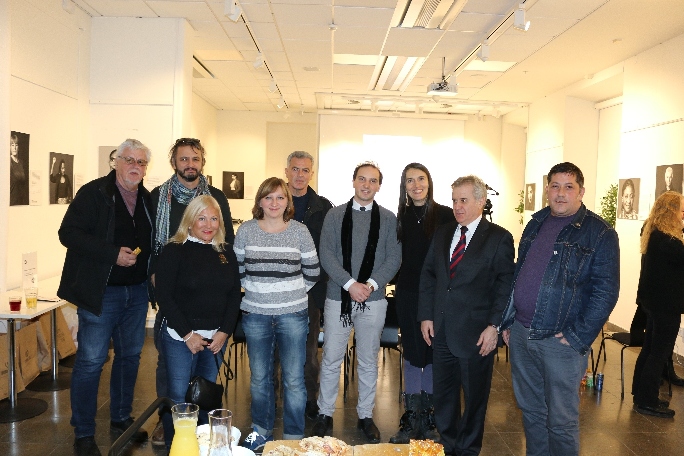 |
|
|
| REMINDER! BaNeFF doc.short 19-21 dec. |
|
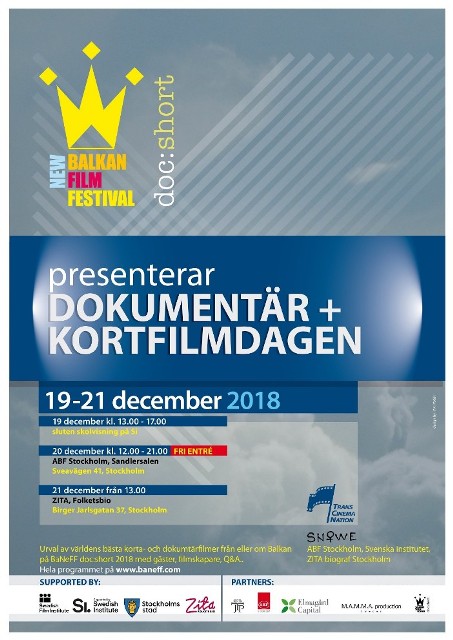 |
|
|
| Programme of the „Balkan New Film Festival – BaNeFF“ |
|
Programme of the „Balkan New Film Festival – BaNeFF“, that will take place in Stockholm, 19-21 December 2018
Ordning på filmvisningar 19 – 21 december 2018, SI, ABF, ZITA
den 19 december 13-17 (sluten visning för skolor)
13.00
The Last Church Bells, 2017, short films, Macedonia, 13'
director Nikolce Popovski
Wieczne Cienie/Nuclear Shadows, 2017, short film, Poland, 15'
director Marek Leszczewski
Enkel/Grandson, 2018, documentary, Serbia, 53'41''
director Aleksandar Reljic
Q&A - GUEST DIRECTOR
15.00
The Last Gift, 2011, short film, Montenegro, 7'
director Aleksandar Vujović
Q&A - GUEST DIRECTOR
Okupirani bioskop/ Ocupied Cinema, 2018, film, Serbia, 87'
director Senka Domanović
Q&A via SKYPE with Director
den 20 december ABF Stockholm 12.00 - 21.00, Sandlersalen
12.00
Kako smo matirali "Žutu damu"/How we checkmatted the "Yellow Lady", 2017, documentary, Serbia, 52'
director Nada Vasić
Veruda - A Film About Bojan, 2017, Croatia 33'
director Igor Brzinovic
Skeftome ta koritsia pou agapisan/I think about the girls who fell in love, 2017, documentary, Greece, 18'
director Giorgos Bougioukos, Spyros Skandalos
13.50
Kraljevski top – istorija srpske krune/The Royal cannon – History of Serbian crown, 2017, documentary, Serbia, 44'
director Velimir Stojanović
Isti/The Same, 2017, documentary, Serbia, 17'
director Dejan Petrović
15.00
Južni potez/ Southern Move, 2018, documentary, Bosnia and Hercegovina, 55'
director Milan Petković
16.00
Srbi na Krfu - sto godina od albanske golgote / Serbs on Corfu - A Hundrad Years Since the Albanian glogotha 2016, documentary, Serbia, 99'
director Sladjana Zaric
18.00
Бомбы которые взорвали мир/ The bombs that blew up peace, 2017, documentary, Ukraine, 41'
director Olga Lazebnik - Q&A - GUEST DIRECTOR
19.00
DUGO PUTOVANJE U RAT/ Long road to war, 2018, documentary, Serbia, 117'
director Milos Skundric , Q&A - GUEST DIRECTOR
21 december ZITA, Salong 2
ZITA BANEFF
The Last Church Bells 2017, Makedonia, 13', no text
director Nikolce Popevski
The last remaining occupant of an old abandoned village communicates with the last remaining occupant of the neighbouring village via the church bell.
The Last Gift, 2011, Montenegro 7', English
director Aleksandar Vujovic gäst
A film about a young mother, who is tempted to abandon her child, due to a set of different life circumstances.
GUESTS:
Olha Lazebnik - Ukraina
Aleksandar Vujovic - Montenegro
Aleksandar Reljic - Serbia
Milos Skundric - Serbia
|
|
|
| Cultural activities of the Serbian artists who are active in Sweden |
|
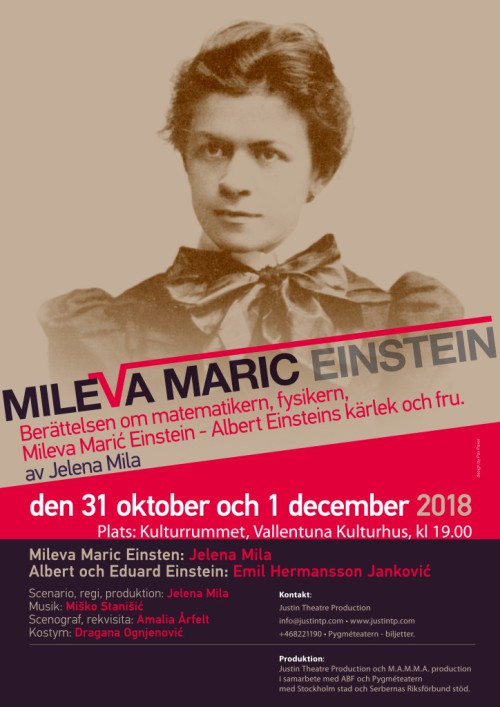 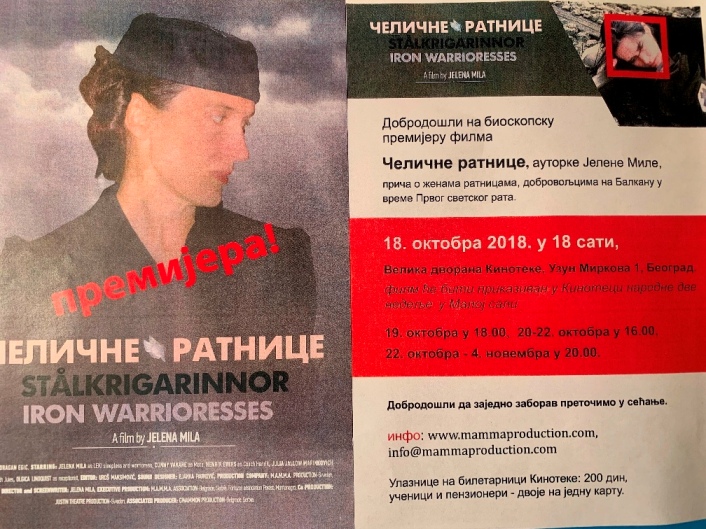 |
|
|
| Visit of Minister without portfolio responsible for innovation and technological development of the Republic of Serbia Mr. Nenad Popović to Stockholm, 12-13 June 2018 |
|
Minister without portfolio responsible for innovation and technological development of the Republic of Serbia Mr.Nenad Popović has paid a working visit to the Kingdom of Sweden, 12-13 June 2018. On that occasion he has held meetings with Swedish State Secretary for the EU and trade Mr.Oscar Stenström, Acting Director-General of the Swedish Innovation Agency – Vinnova Mr.Leif Callenholm, CEO of the Royal Swedish Academy of Engineering Sciences Ms.Tuula Teeri, CEO of Verisec Mr.Johan Henrikson and Vice-President of Ericsson Mr.Ulf Pehrsson. At these meetings, Minister Popović has presented the activities that are undertaken by Serbia in order to develop its innovation infrastructure and entrepreneurship. During the detour at the Ericsson company, Minister Popović held talks with Vice-President Pehrsson and Swedish experts on the possibilities for further investments of this company in Serbia as well as on the application of „5G technology“ that should be demonstrated in Belgrade by the end of this year.
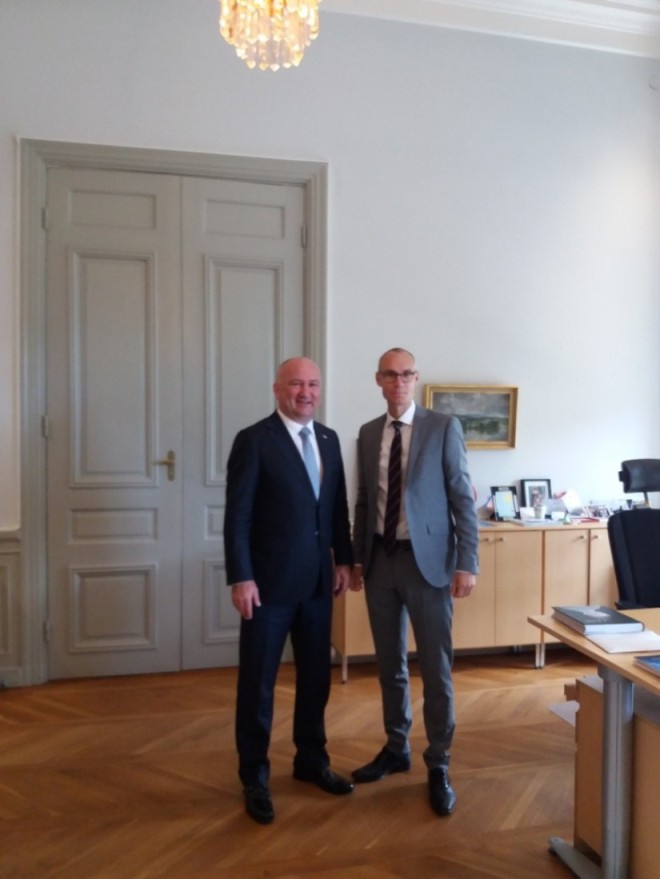
Meeting of Minister Popović with Swedish State Secretary for the EU and trade Mr.Oscar Stenström on the 12th of June 2018
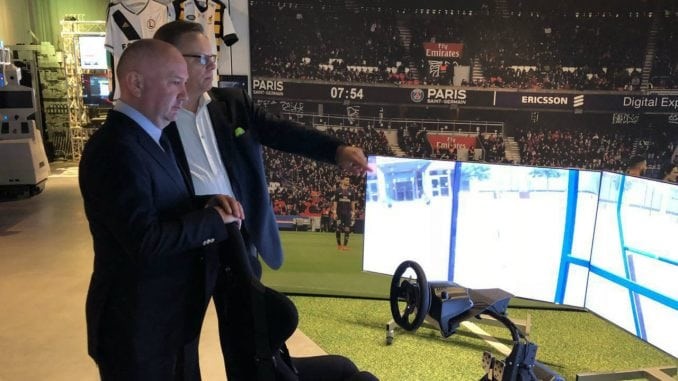
Meeting of Minister Popović with Vice-President of Ericsson Mr.Ulf Pehrsson and detour at the Ericsson Studio, 13 June 2018
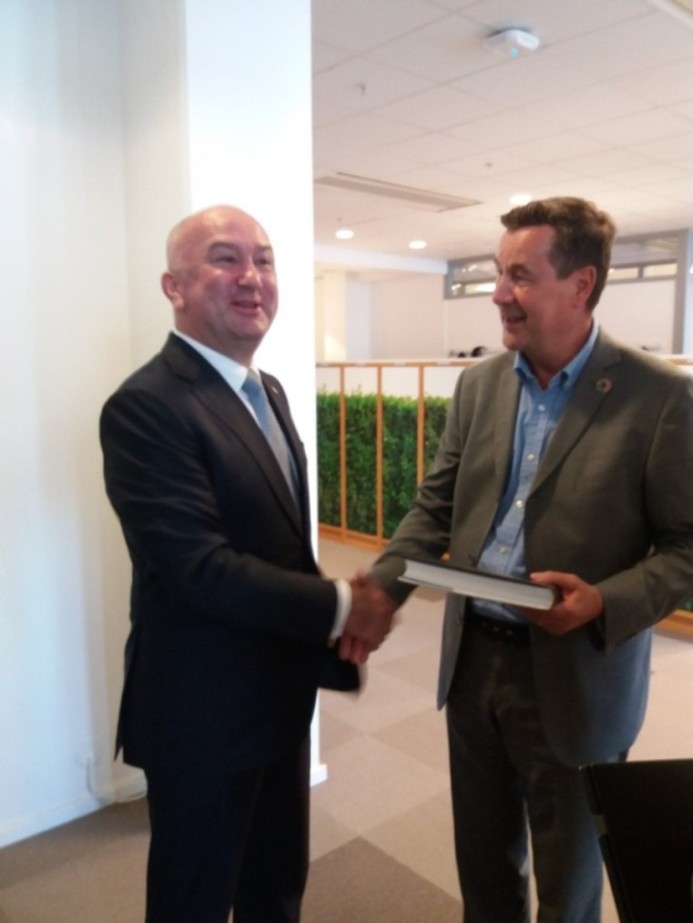
Meeting of Minister Popović with Acting Director-General of the Swedish Innovation Agency – Vinnova Mr.Leif Callenholm, 12 June 2018
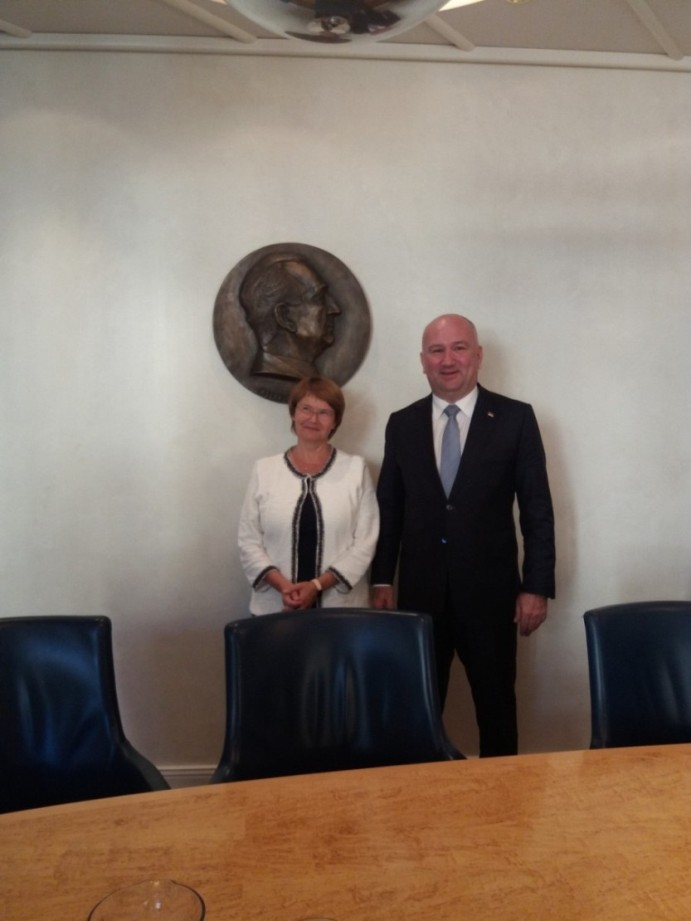
Meeting of Minister Popović with CEO of the Royal Swedish Academy of Engineering Sciences Ms. Tuula Teeri, 12 June 2018
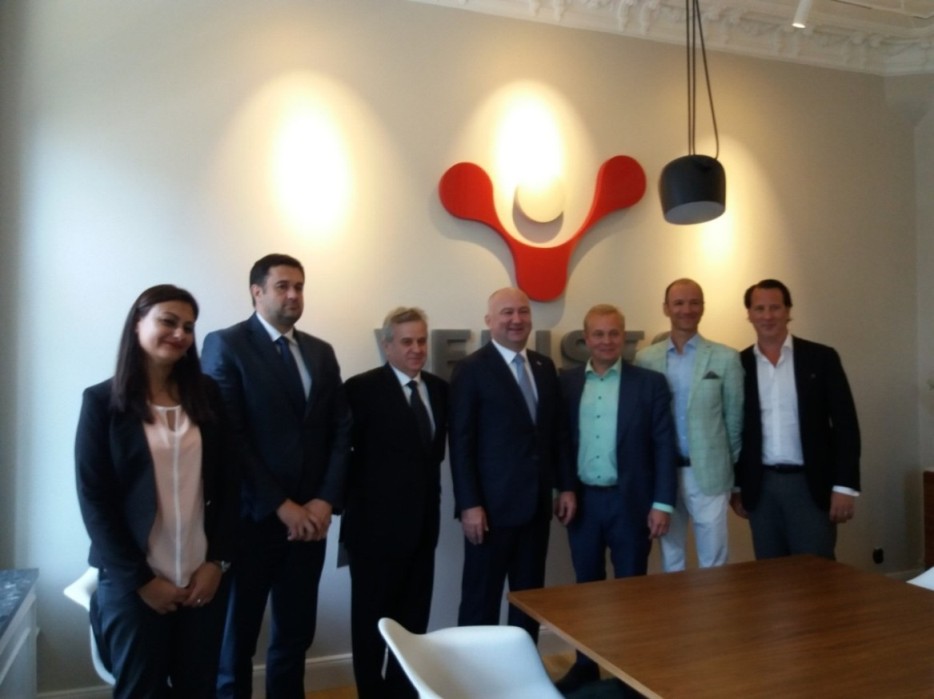
Meeting of Minister Popović with CEO of Verices Mr. Johan Henrikson on the 12th of June 2018 |
|
|
| Embassy closed for Midsummer Day |
|
Med anledning av Midsommardagen har konsulära avdelningen stängt fredagen den 22 juni 2018.
* * *
The consular section of the Embassy will be closed on Friday, 22 June 2018 in observance of Midsummer Day. |
|
|
| Visit of Ms. Maja Gojkovic, President of the National Assembly of the Republic of Serbia to Sweden |
|
President of the National Assembly of the Republic of Serbia Ms. Maja Gojković has paid an official visit to the Kingdom of Sweden on the 20th and 21st of March 2018, at the invitation of the Speaker of the Riksdag Mr.Urban Ahlin.
On that occasion, Speaker of the Serbian Assembly Ms. Gojković had an official audience with the King of Sweden Hiss Royal Highness Carl XVI Gustav, meetings with the Speaker of the Riksdag Mr.Urban Ahlin and Minister of Foreign Affairs Ms. Margot Wallström, as well as with the Chairman of the City Council in Stockholm City Ms. Eva-Louise Erlandsson Slorach, Chairman and members of the Committee for EU affairs at Riksdag and the Third Vice-Chairman of Riksdag Ms. Esabelle Dingizian. Issues discussed during the visit were related to the Swedish support for the Serbia’s accession process and reforms being implemented on its European path, bilateral cooperation, gender equality implementation and the dialog between Belgrade and Pristina.
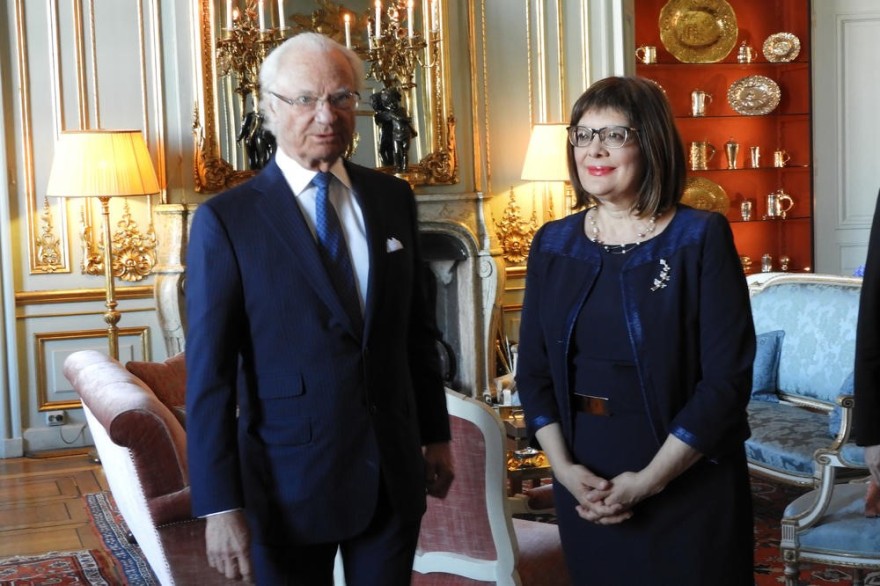
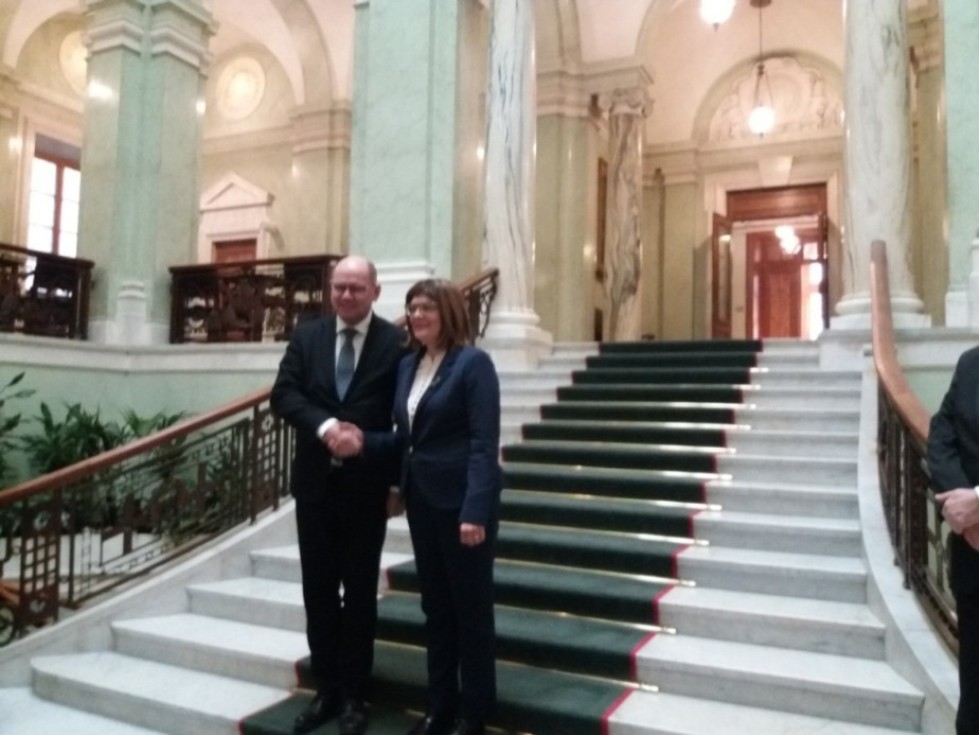
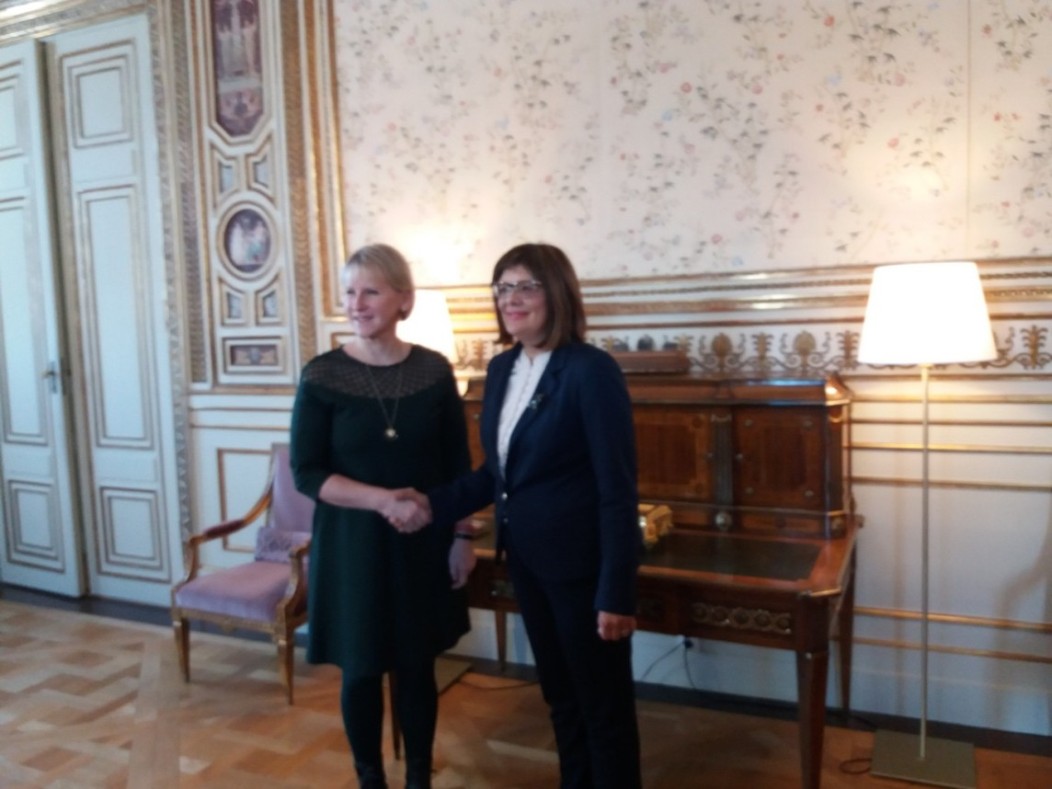
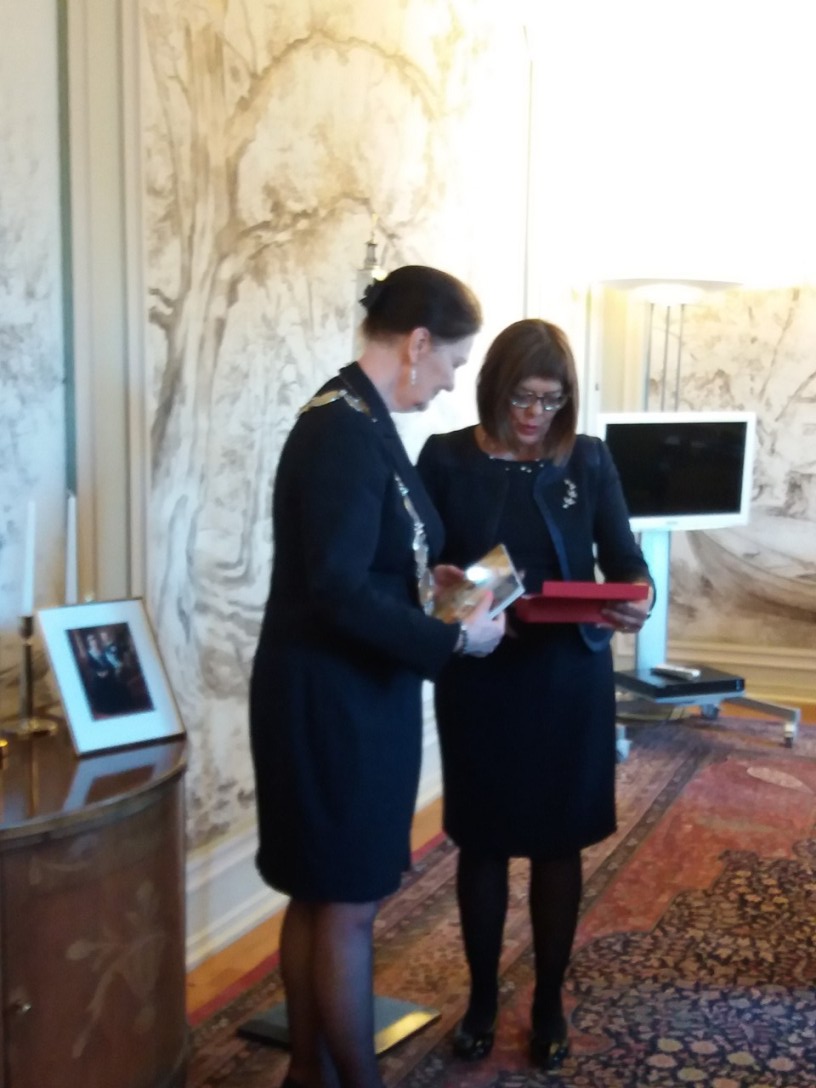 |
|
|
| OPEN CALL for the Co-Financing of Projects for the Translation of Representative Works of Serbian Literature into Foreign Languages in 2018. |
|
Ministry of culture and Media, Department of Contemporary Artistic Production and Creative Industries announce this OPEN CALL for the Co-Financing of Projects for the Translation of Representative Works of Serbian Literature into Foreign Languages in 2018. Call is open until 16th March 2018. All information on www.kultura.gov.rs link Konkursi, or can be seen here. |
|
|
| Visas are abolished for Indonesia citizens |
|
The Government of the Republic of Serbia adopted the Decision on visa free entry to the Republic of Indonesia, for holders of ordinary passports.
By this decision, the above-mentioned categories may, without prior visa application, enter, transit or stay in the Republic of Serbia up to 30 days during a twelve-month period. |
|
|
| Meeting with the Chairman of the Foreign Affairs Committee of the Riksdag |
|
Ambassador of the Republic of Serbia to the Kingdom of Sweden, H.E. Dragan Momcilovic met with the Chairman of the Foreign Affairs Committee of the Riksdag Mr. Kenneth Forslund, on the 7th of December 2017. The meeting was dedicated to the improvement of bilateral parliamentary relations between Sеrbia and Sweden.
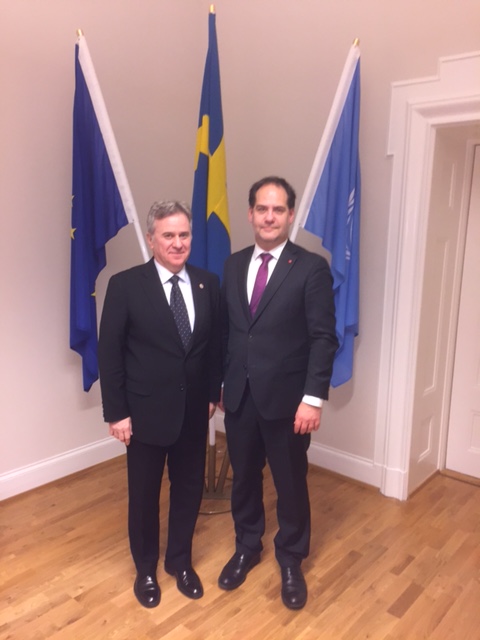 |
|
|
| Reception hosted by His Royal Highness the King of Sweden |
|
Ambassador of the Republic of Serbia to the Kingdom of Sweden, H.E. Dragan Momcilovic attended the diplomatic reception hosted by His Royal Highness the King of Sweden, Mr. Carl XVI Gustav and Her Royal Highness the Queen Silvia, on the 31st of May 2017.
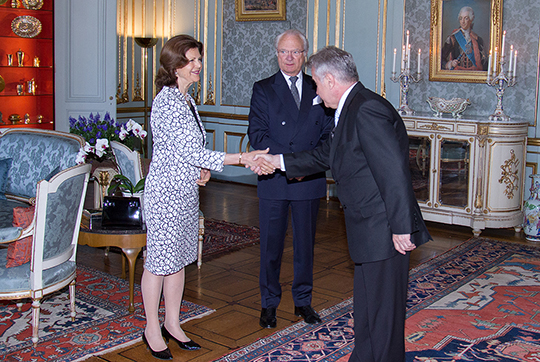 |
|
|
| The Exhibition on the occassion of the Centennial Anniversary of the establishment of Serbian-Swedish diplomatic relations on the 1st of November 2017. |
|
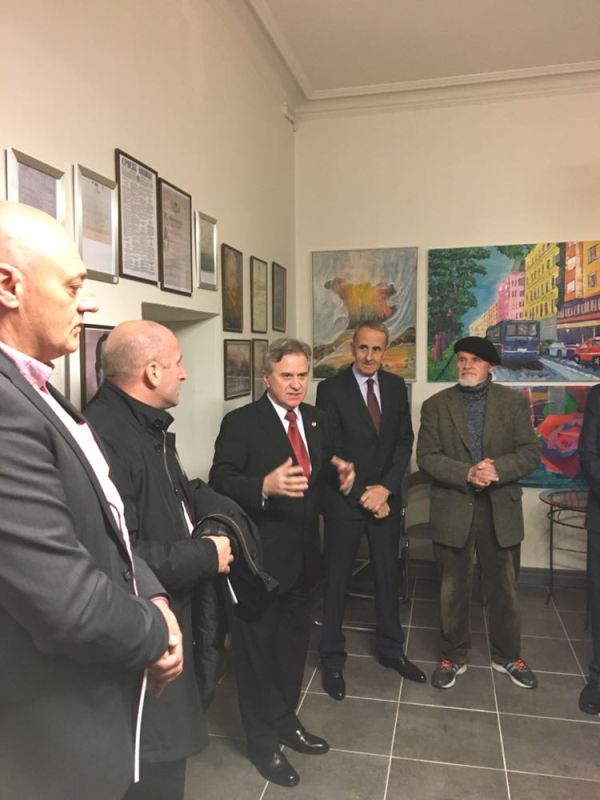
The Exhibition on the occassion of the Centennial Anniversary of the establishment of diplomatic relations between the Kingdom of Serbia and the Kingdom of Sweden was organized on the 1st of November 2017 at the Art Gallery in the center of Stockholm. The Ambassador of the Republic of Serbia in Stockholm, H.E. Mr. Dragan Momcilovic welcomed by openning remarks present Serbian and Swedish citizens who were very interested in the concept of the Exhibition as well as the questiones related to the history of the diplomatic relations between the two countries.
The Exhibition encompasess the archivic documents and photographs as the evidence of the development of Serbian-Swedish bilateral relations during a period of time commencing by the Swedish recognition of the Kingdom of Serbia 1882 until the end of the Great War. The openning of the first Embassy of the Kingdom of Serbia in Sweden at the Narvavägen 35 Street in the central Stockholm area on the 1st of November 1917 gave a huge contribution to its further intensity.
|
|
|
| Meeting of the Ambassador of the Republic of Serbia in Stockholm, H.E. Mr. Dragan Momcilovic with the President of the Stockholm City Assembly Mrs. Eva -Louise Erlandsson Slorach on the 14th of August 2017. The possibility of improvement of cooperation between Belgrade and Stockholm was disscused during the meeting. |
|
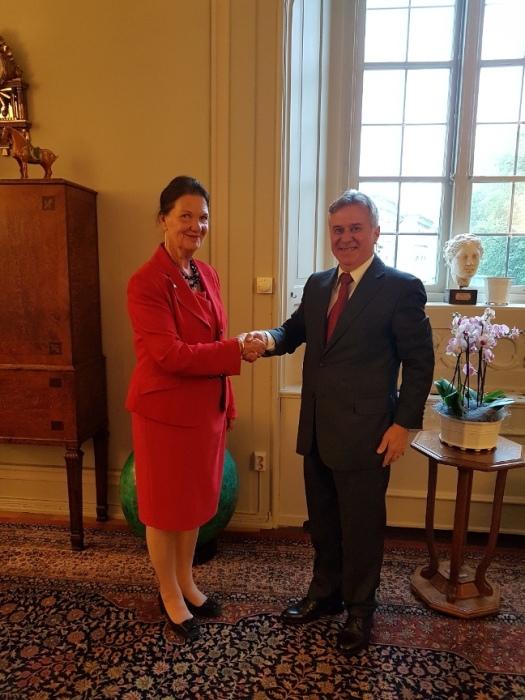 |
|
|
| Why Kosovo is ineligible for membership in UNESCO? |
|
Here you can find the Non-paper with arguments of the Republic of Serbia why Kosovo is ineligible for membership in UNESCO. |
|
|
| THE PROCEDURE FOR IMPORTING HUMANITARIAN AID |
|
More details about supporting humanitarian work of the Red Cross of Serbia in its response for the humanitarian refugee and migrant crisis in Serbia you may find here. |
|
|
| Embassy of the Republic of Serbia in Stockholm won SWETURK Partner of the Year Award 2015 |
|
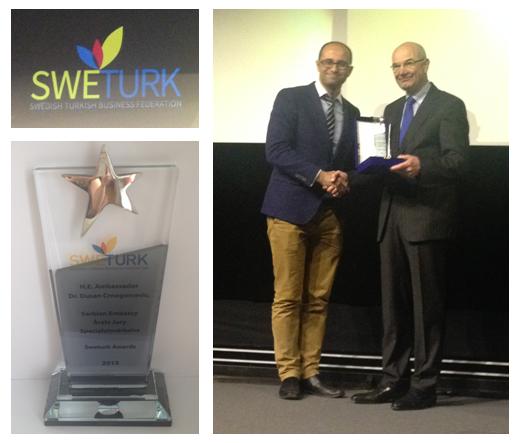
On 24th May Embassy of the Republic of Serbia in Stockholm has been awarded Swedish Turkish Business Association SWETURK Partner of the Year 2015. Embassy of the Republic of Serbia has achieved successful cooperation with SWETURK aiming to better inform and promote Swedish companies about investment and trade opportunities in Serbia. This includes promotional events, business delegation visit and open communication with potential business partners in Sweden.
Mr. Dusan Crnogorcevic said: ”Serbia remains committed to progress towards EU accession since the strategic goal is a full-fledged membership of the European Union. EU is Serbia's biggest trading partner with more than 62 per cent of Serbia's foreign trade volume. Today, more than 70 Swedish companies are present in the Serbian market. Tetrapak factory in Serbia has won the title of the best factory of Tetra Pak group in the world”.
The SWETURK Awards have been held since 2013 to reward outstanding individuals and companies. |
|
|
| Conference “Doing Business in Western Balkans: Investments, Suppliers and Trade Opportunities” on 22nd May in Linköping |
|
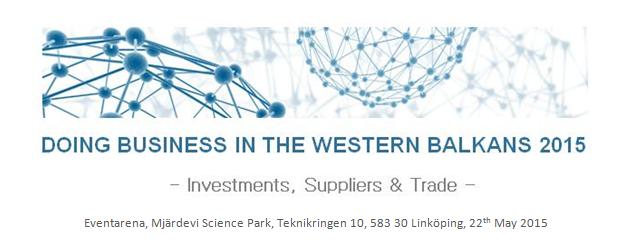
Doing Business in the Western Balkans: Investments, Suppliers & Trade” is a unique and valuable event that will present suppliers’ database and outsourcing opportunities in manufacturing and ICT industry in Serbia, Macedonia and Bosnia and Herzegovina. If you are a machinery or equipment manufacturer or supplier, or involved within ICT technologies, this is a conference you don’t want to miss. The event is created to provide attendees with a full understanding of the Western Balkan supplier’s network and outsourcing potentials.
The event is jointly organized by the Chamber of Commerce of East Sweden and Serbian Swedish Business Council in cooperation with the Embassy of Bosnia and Herzegovina, the Embassy of Macedonia and Embassy of the Republic of Serbia to the Kingdom of Sweden.
For more information and registration please check here: http://www.ostsvenskahandelskammaren.se/article.aspx?a=3105185 |
|
|
| Serbia ICT Talks in Stockholm: Platform for discussion and networking among ICT professionals |
|
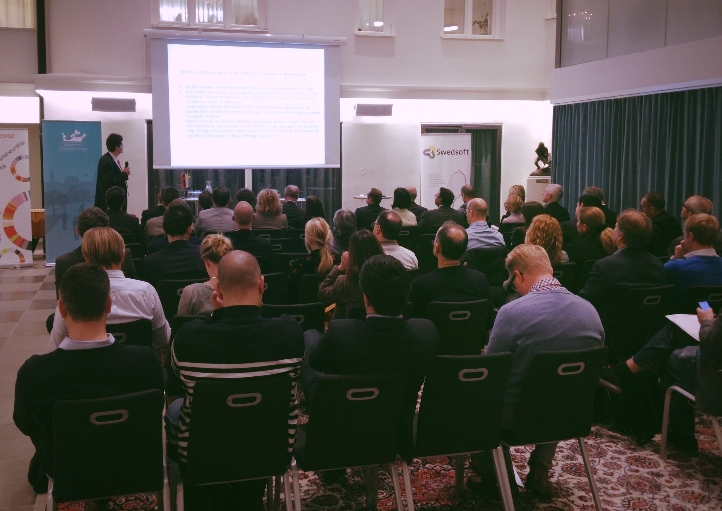
Great success for the event “Serbia ICT Talks” carried out on 25 November in Stockholm by joint organization of the Embassy of Serbia in Stockholm, Serbian Swedish Business Council and Stockholm Chamber of Commerce. Event, inaugurated by H.E. Mr Dusan Crnogorcevic, Ambassador of the Republic of Serbia in Stockholm, provided a perfect opportunity for discussion about Serbia`s outsourcing potentials and, furthermore, networking among ICT professionals.
Speakers at the conference were set to include Sava Savic, Assistant Minister and Nebojsa Vasiljevic, Senior Advisor from the Ministry of Trade, Tourism and Telecommunications of the Republic of Serbia, Ulf Persson, Vice President, Government & Industry Relations, Ericsson, Dragoljub Nesic, SVP Strategy and Business Development, Versic AB and Andrija Bednarik, CEO of Serbian Business Angels Network and Managing Partner at High Tech Engineering Center.
With inspirational and informational talks from our key speakers, “Serbia ICT Talks” communicated both potentials and challenges of Serbian ICT sector in the outsourcing context. Sava Savic, Assistant Minister and Nebojsa Vasiljevic, Senior Advisor from the Ministry discussed why doing business and outsourcing to Serbia has a number of advantages. They also discussed Serbian strong educational system, as well as improving legislation framework that is increasingly becoming easier and more accessible for investors.
Ulf Persson, Vice President, Government & Industry Relations, Ericsson claims that “Network society is happening in Serbia right now. Serbia has great ICT potential”. Furthermore, Dragoljub Nesic, SVP Strategy and Business Development, Versic AB and Andrija Bednarik, CEO of Serbian Business Angels Network and Managing Partner at High Tech Engineering Center talked about business potentials and risks while being practical and offering readymade business models to make outsourcing to Serbia a successful story.
Serbia ICT Talks is the first event about Serbian ICT market organized in Stockholm aiming to inform and communicate Serbia`s potentials as a trendy nearshoring market with great opportunities for growth and development.
|
|
|
| Ambassador Crnogorcevic lecture at Stockholm University |
|
The Ambassador of Serbia to Sweden H.E. Mr. Dusan Crnogorcevic delivered a lecture to students at Stockholm University on Monday, 17th November. Students, attending the Masters course in Public Diplomacy and Nation Branding, had an opportunity to listen to the ambassador's views on Serbian history, media influence, foreign relations policy including full-fledged membership of the European Union and relations with big powers, the challenges facing the country today. The ambassador's lecture provided the starting point for an ongoing project in which students will analyze the perception of Serbian national identity in Sweden and, further, develop appropriate strategies in the area of public diplomacy.
Dr. Ian Richardson, Director of the MSc programme in Strategic Public & Political Marketing at Stockholm University, commented "We're delighted that the ambassador, and his team at the Serbian Embassy, have agreed to work with us on this project. It's a unique opportunity for students on the programme to experience the real world challenges of contemporary diplomacy. Our sincere gratitude goes to the ambassador and everybody at the Serbian Embassy here in Stockholm".
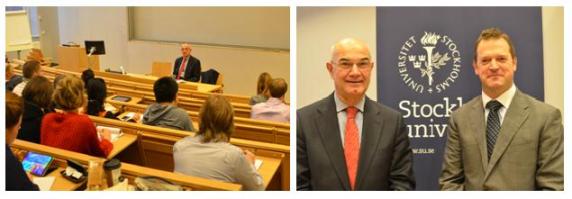 |
|
|
| Serbia ICT Talks: How Serbian Gaming Industry Achieved Global Success? |
|
Taking into consideration the fact that hundreds of million people worldwide spend hours on playing games, it comes as no surprise that gaming industry has become exceedingly popular nowadays.Serbian gaming companies have already achieved global success with their creativity, enthusiasm and talented professionals. Serbia ICT Talks will give interesting insights into the most successful companies who have contributed to gaming development in Serbia and once more have demonstrated big talent that exists in this region. Read more...
 |
|
|
| Serbia ICT Talks in Stockholm |
|

Serbia ICT Talks is all about one of Europe’s attractive and vibrant hot spots. Aiming to inform and inspire, Serbia ICT Talks 2014 will communicate Serbian ICT market potentials and business perspectives in the outsourcing context. With an insight from the Swedish ICT companies Ericsson and Verisec, already established in the country, and Serbian ICT professionals, the event aspires to facilitate and enhance cooperation possibilities.
Serbia ICT Talks 2014 is jointly organised by the Stockholm Chamber of Commerce, Embassy of the Republic of Serbia and Serbian Swedish Business Council. H.E. Mr. Dusan Crnogorcevic, will inaugurate the event. Breakfast Meeting will take place on 25 November at the Stockholm Chamber of Commerce Premises, Brunnsgatan 2. Register here: http://www.chamber.se/evenemang/serbia-ict-talks.htm

World Bank: Serbia's comparative advantages are in ICT services, transport services, and food production
A new World Bank policy note for Serbia highlights key areas of reform that could help the country further benefit from its comparative advantages in several key sectors, expand and diversify its export potential, and increase the role of the private sector.
Although Serbia maintains a strong comparative advantage in ICT services, transport services, and food production the country is not exploiting these advantages and continues to lag regional competitors, claims World Bank. Food production represents the largest subsector of manufacturing and accounts for nearly 20% of employment in this sector, while ICT services comprise about half of services exports. Read more here: http://www.worldbank.org/en/news/feature/2014/10/02/start-your-engines-unlocking-potential-of-serbian-economy
|
|
|
| SEEBA presents new IT/Media event “Outsource to Europe 2014” |
|

South Eastern European Business Agency SEEBA is proud to announce the next seminar and matchmaking event “Outsource to Europe 2014” taking place at the Royal Coin Cabinet in Stockholm on November 28, 2014. SEEBA is inviting IT/Media companies from South-East Europe to meet Nordic potential partners in Stockholm in November this year.
SEEBA has established several important relations between companies from South-East Europe and Scandinavia in the recent period. The last event “Outsource to Europe 2013” represented a good platform for building connections between these two markets. In order to continue creating and supporting the outsourcing process between these two regions it has been decided to organize the next “Outsource to Europe” event. This year´s topic will be “Collaborate securely” with focus on building secure and trustful relations between Scandinavian and South-East European companies.
For more information about the event, please visit the website: www.outsource2.eu, or watch the promo video for “Outsource to Europe 2014” event. |
|
|
| City of Niš Announces New Investment Projects |
|
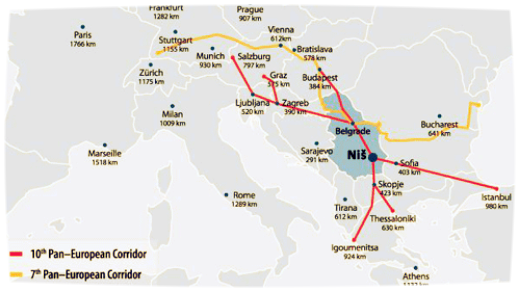
Office of Mayor has announced four investment projects in City of Niš as part of broader efforts to enhance agricultural development, create new jobs and increase economic activities in the City. All investment projects - including Development of Fruit Growing, Center for Medical Herbs, Production of Compost, Development of Livestock Breeding - are designed to support foreign direct investments in form of public-private partnerships. Agriculture represents a large, untapped resource for the City and creates great Greenfield investment opportunity.
Find more information on these projects please contact Ms Marija Petkovic, Mayor’s Office, City of Niš at marija.petkovic@gu.ni.rs. |
|
|
| Belgrade calls for a dance |
|
The Swedish magazine for tourism "Res" has published an article about Belgrade entitled "Belgrade calls for a dance" which presents hot spots, night life and cuisine of our capital... more you can find here |
|
|
|
|
|